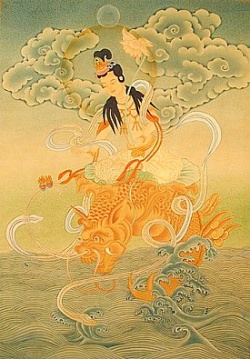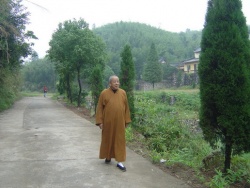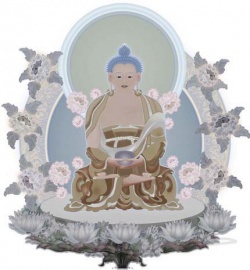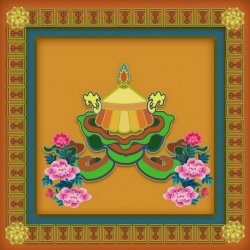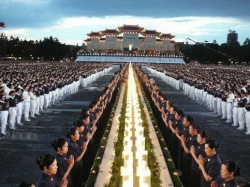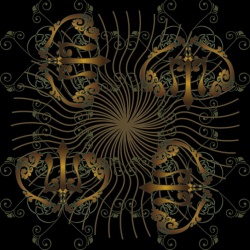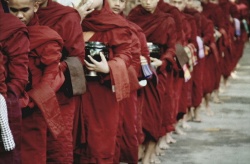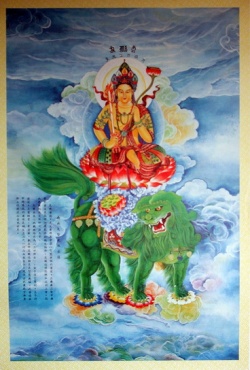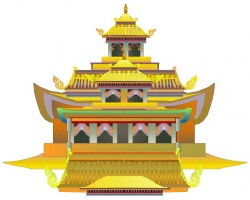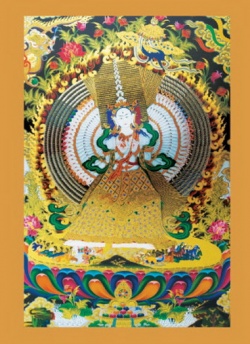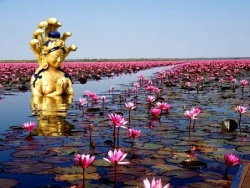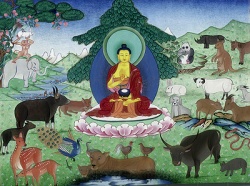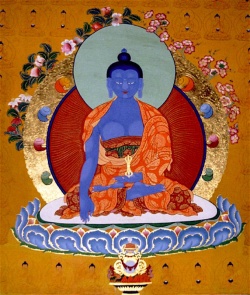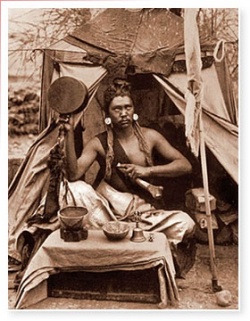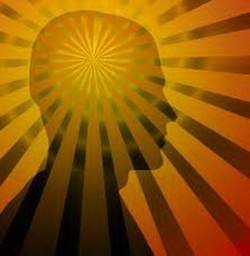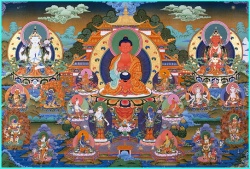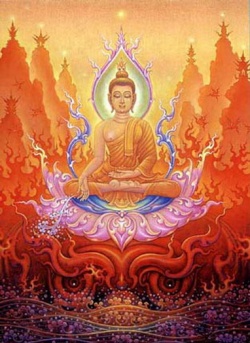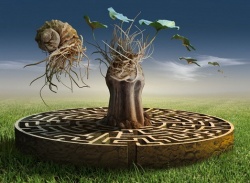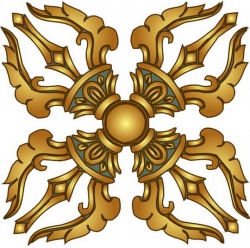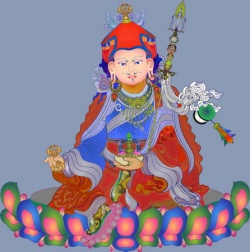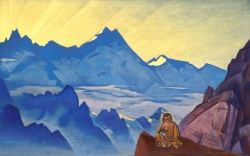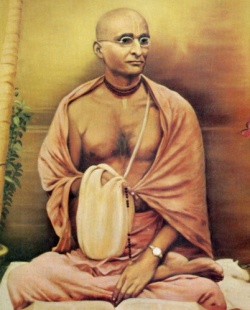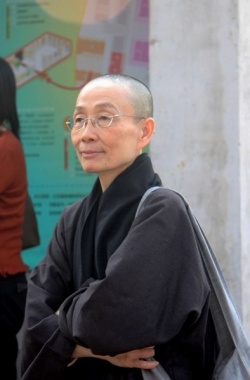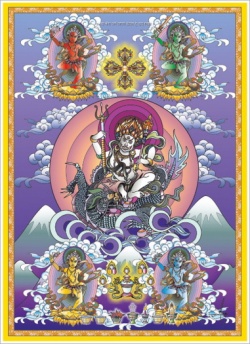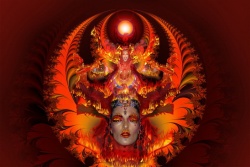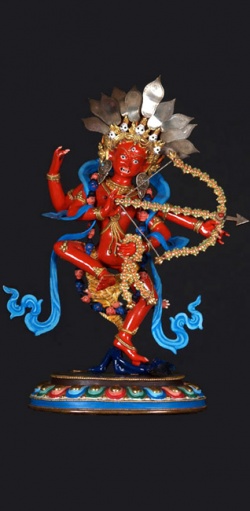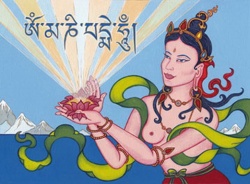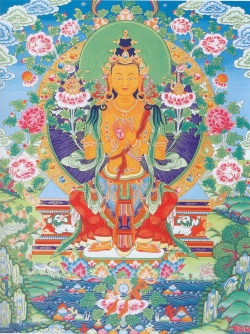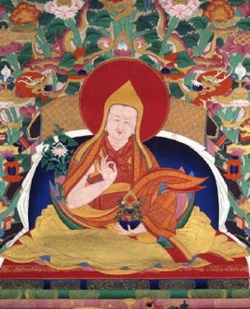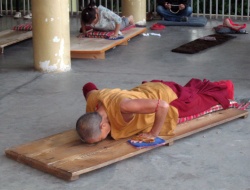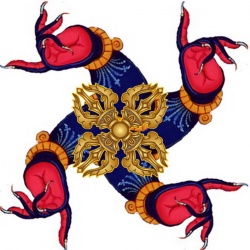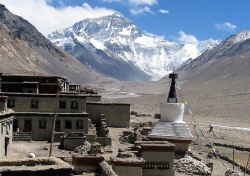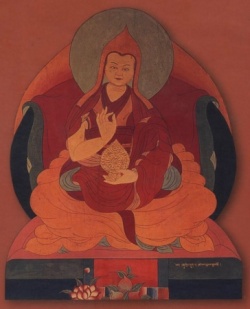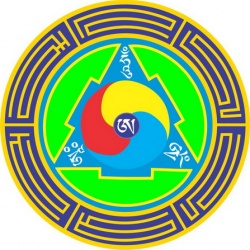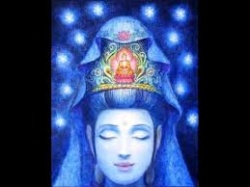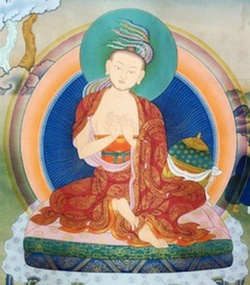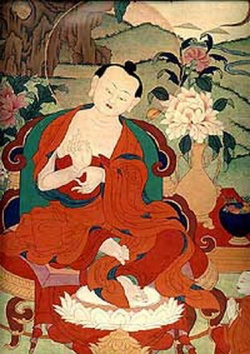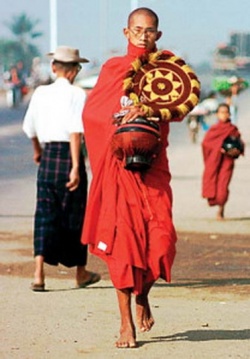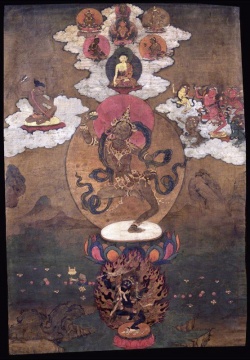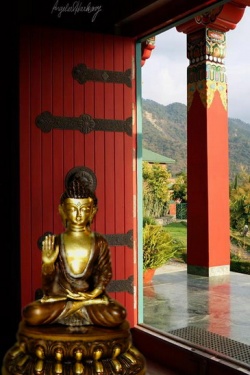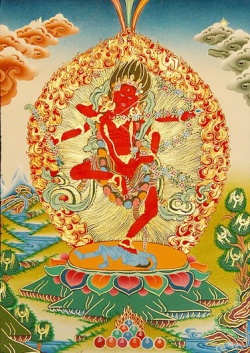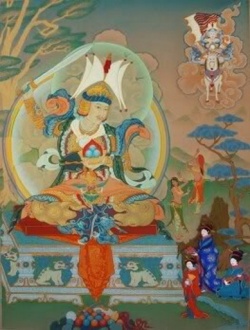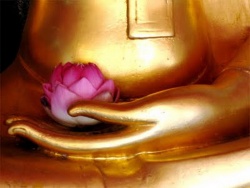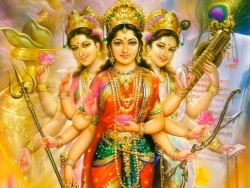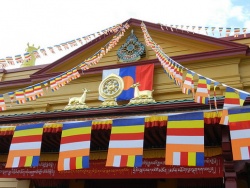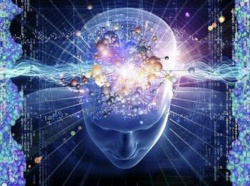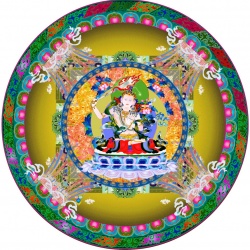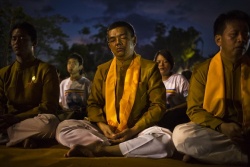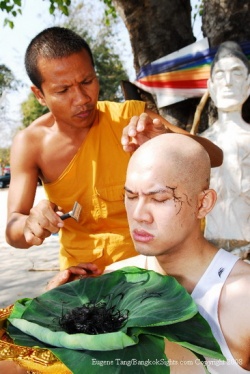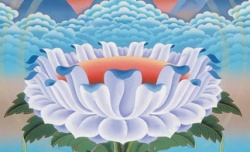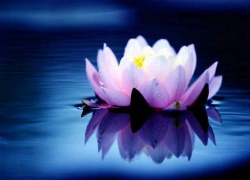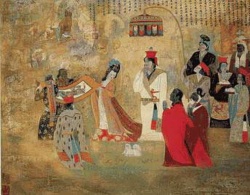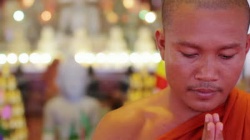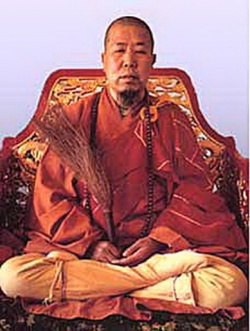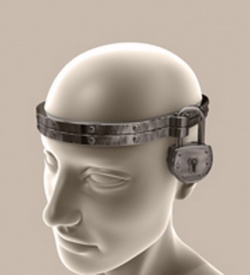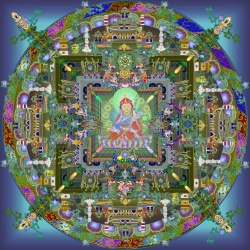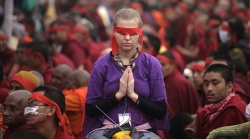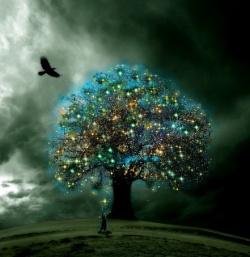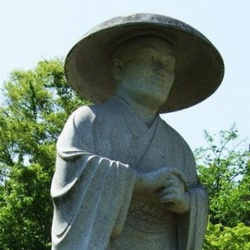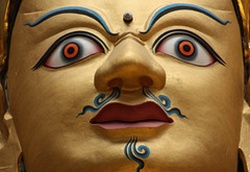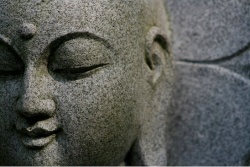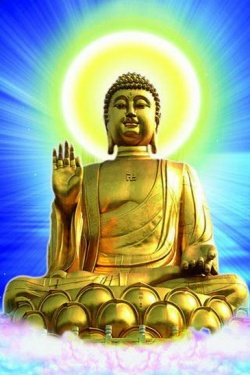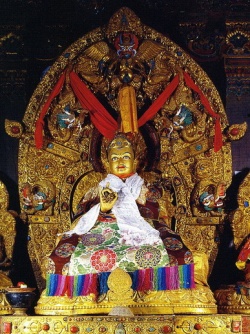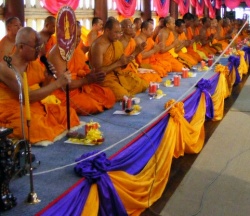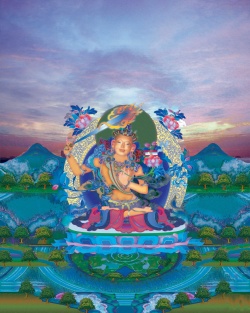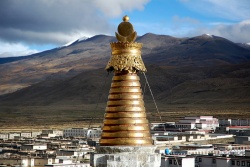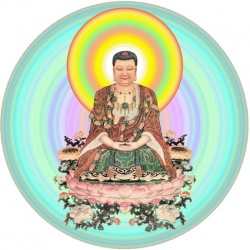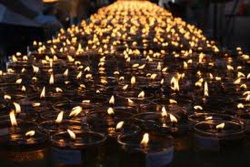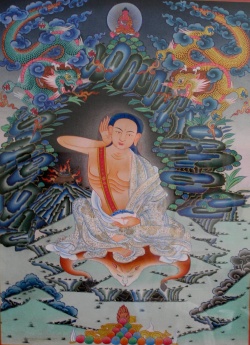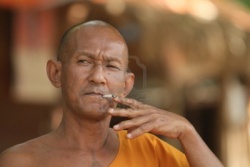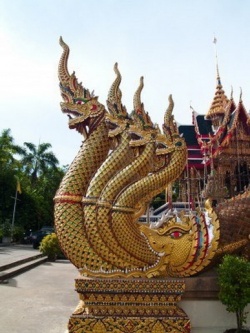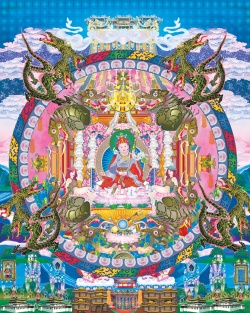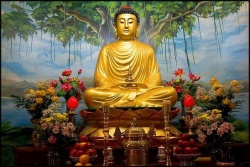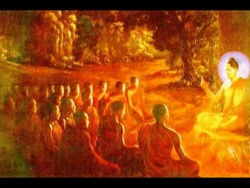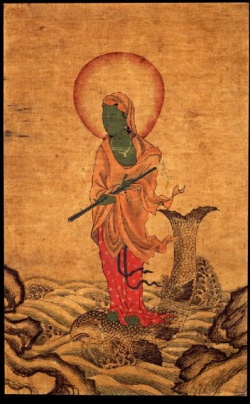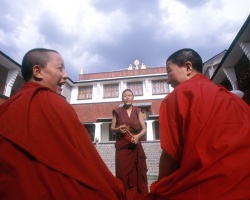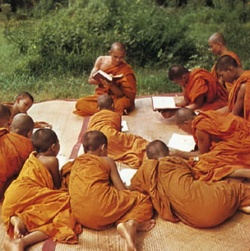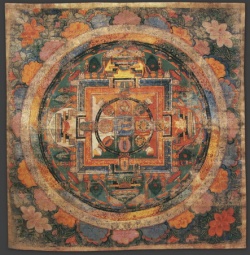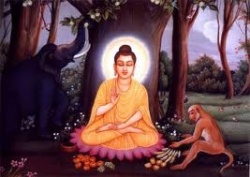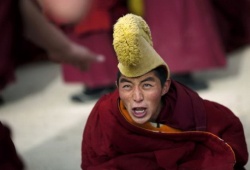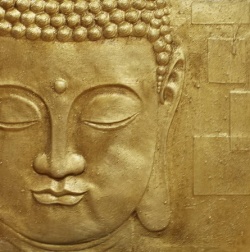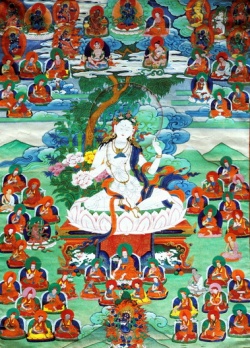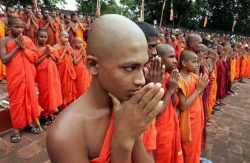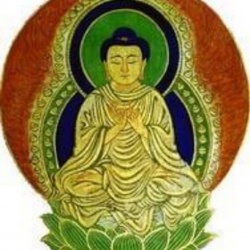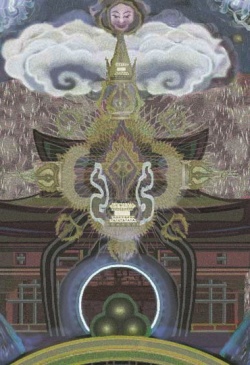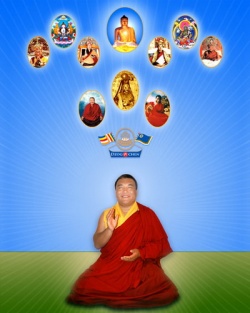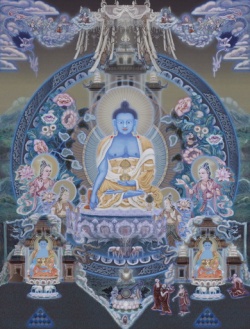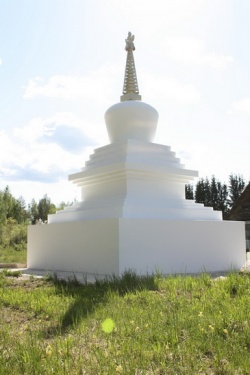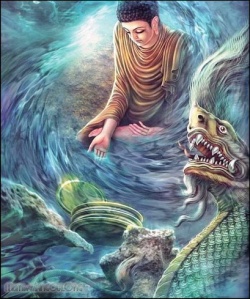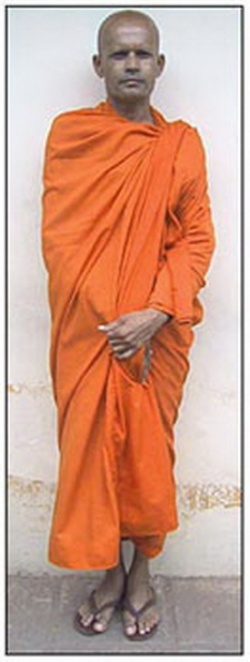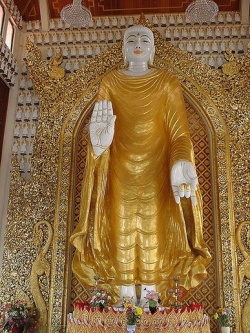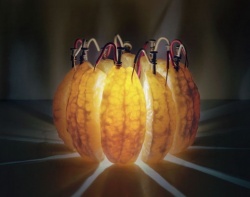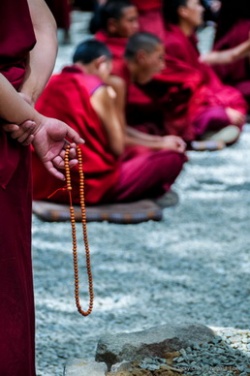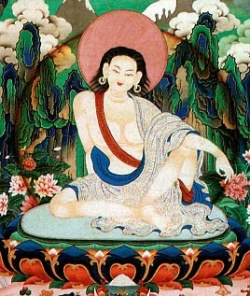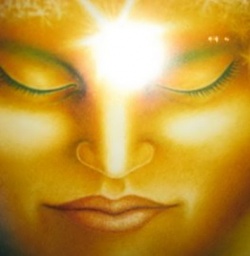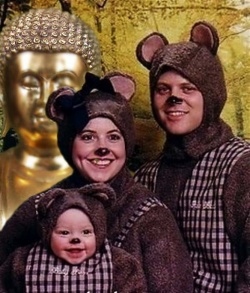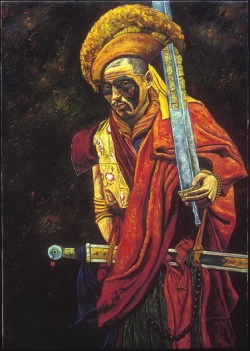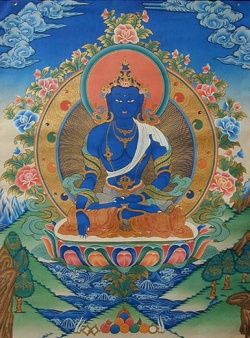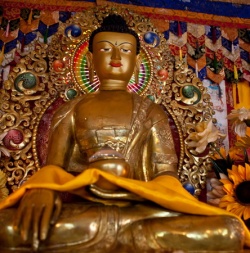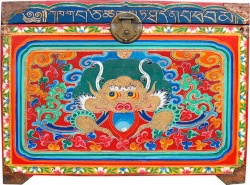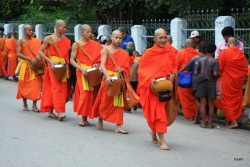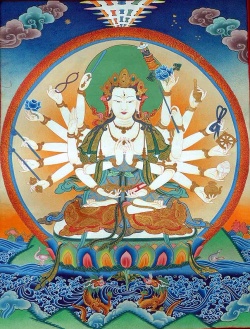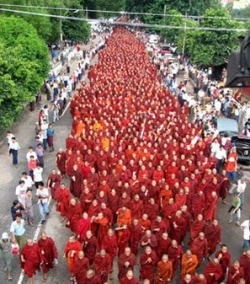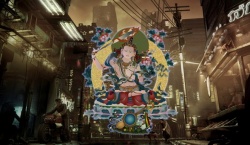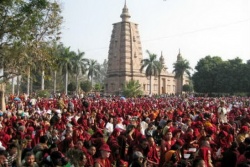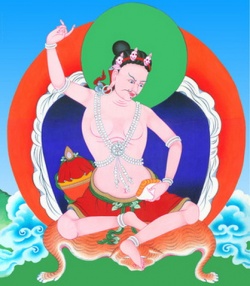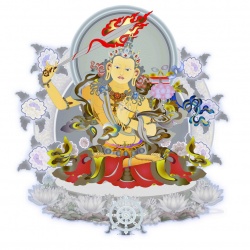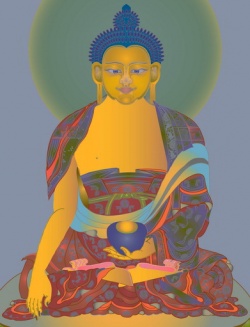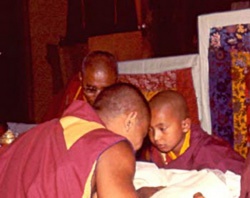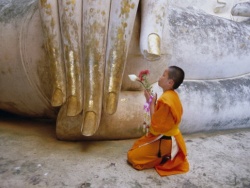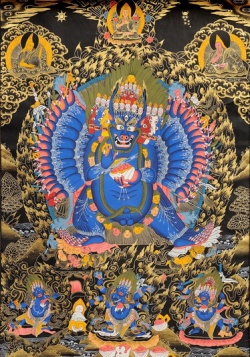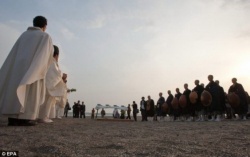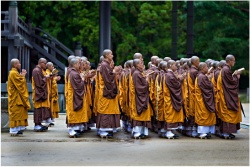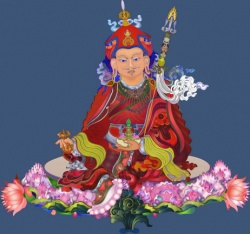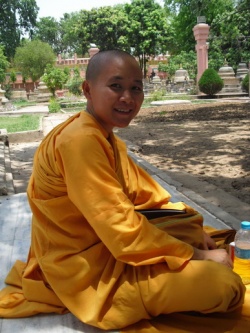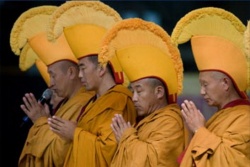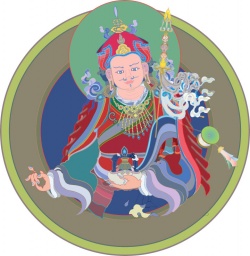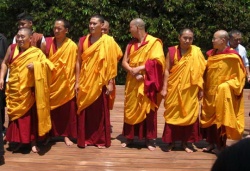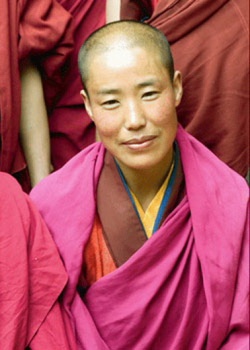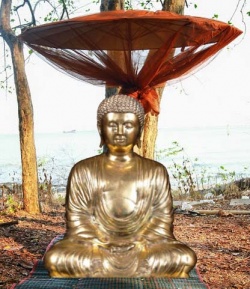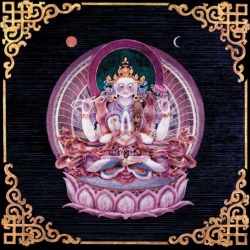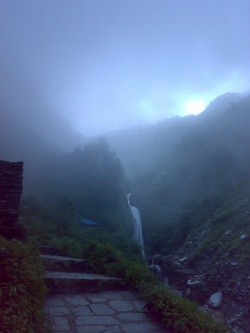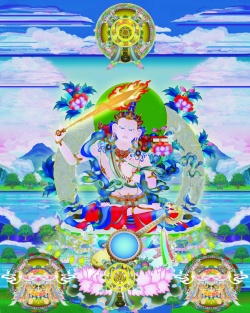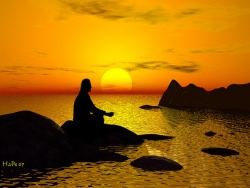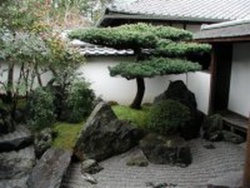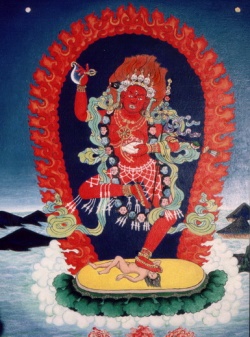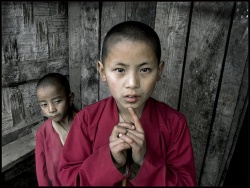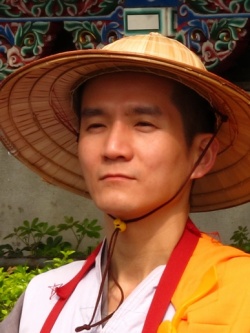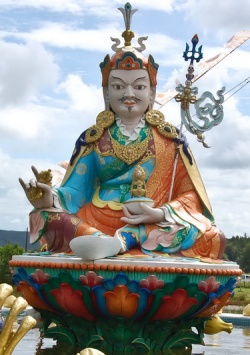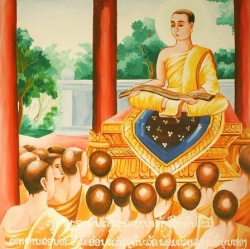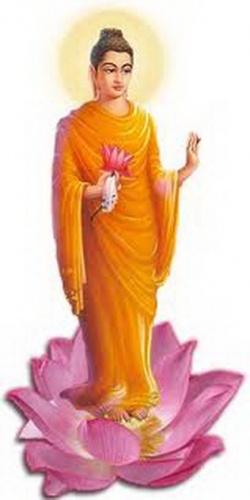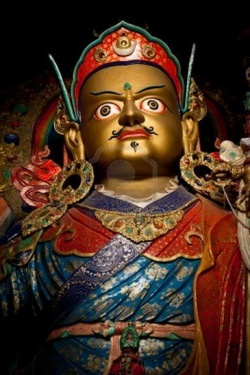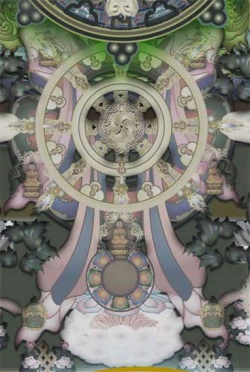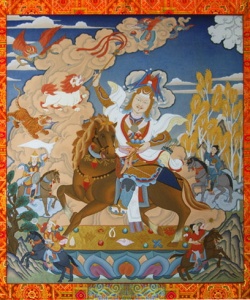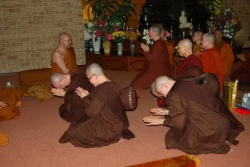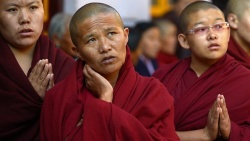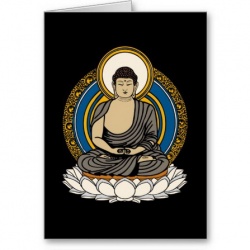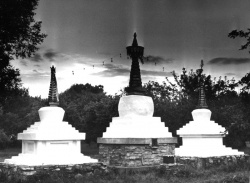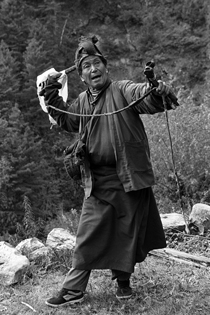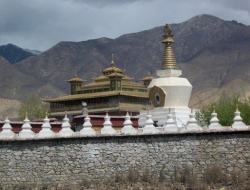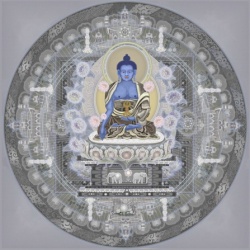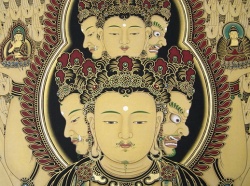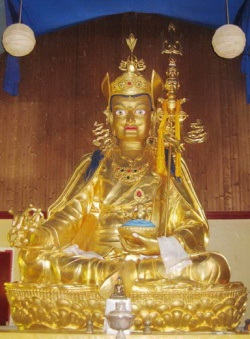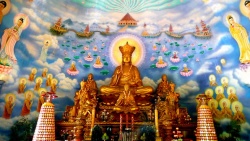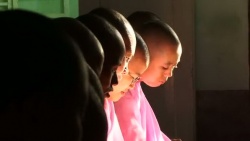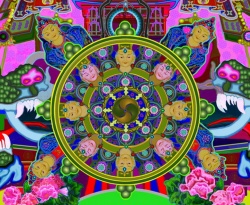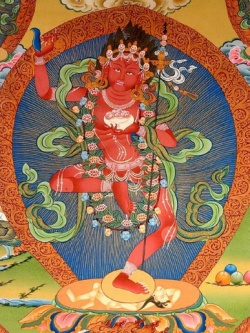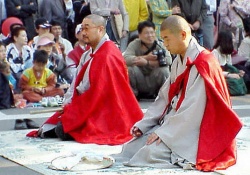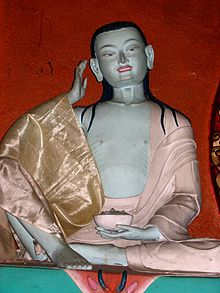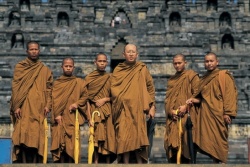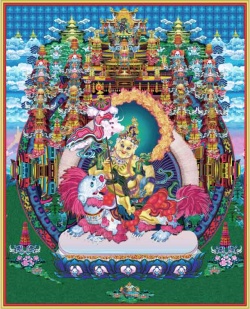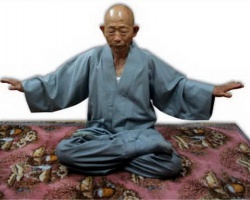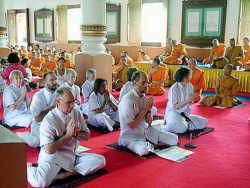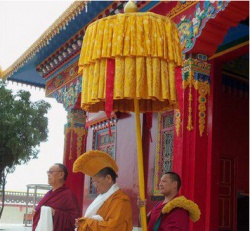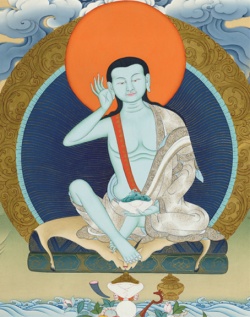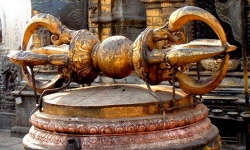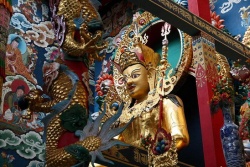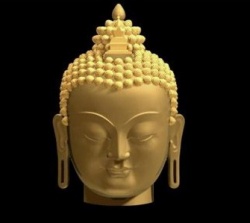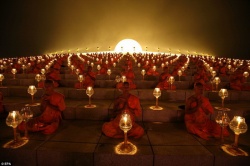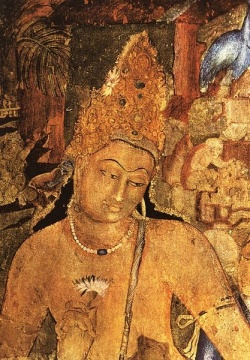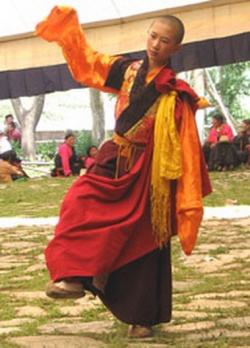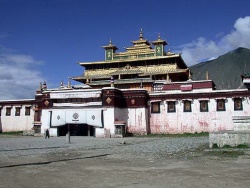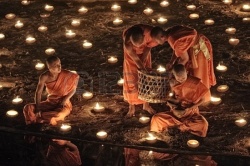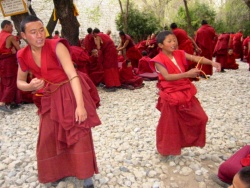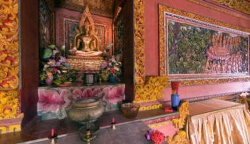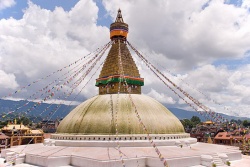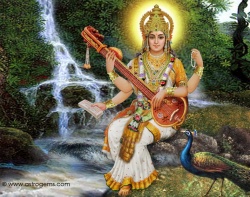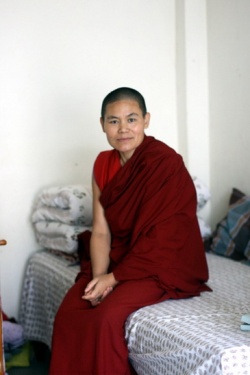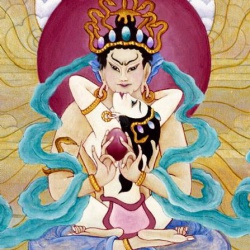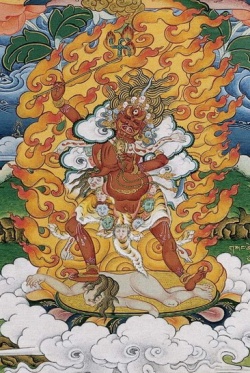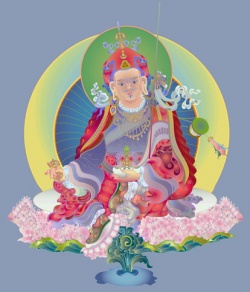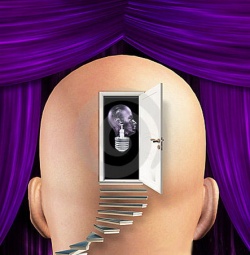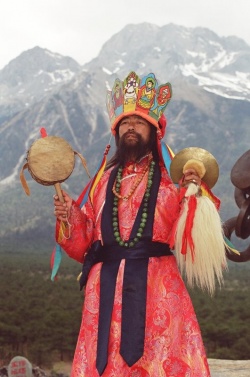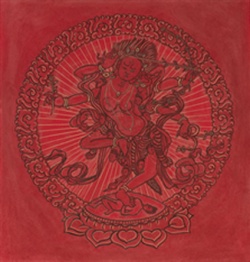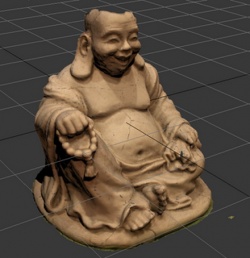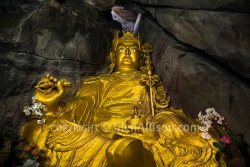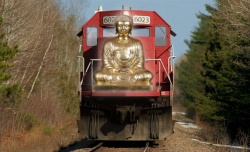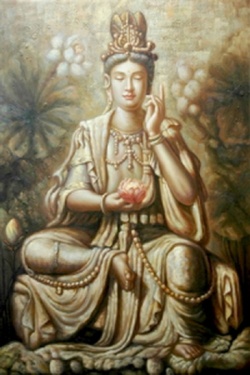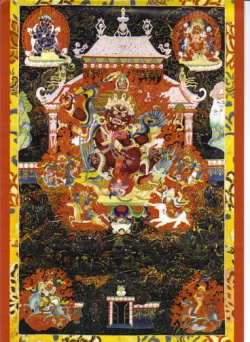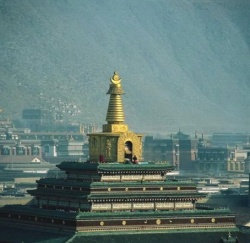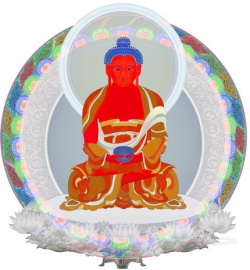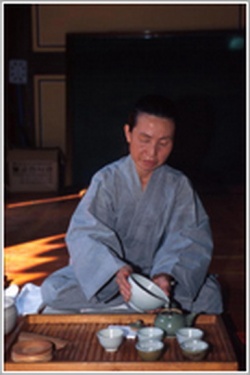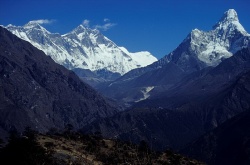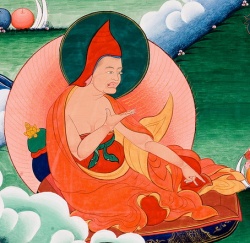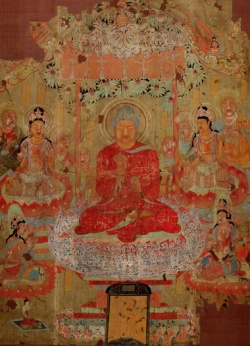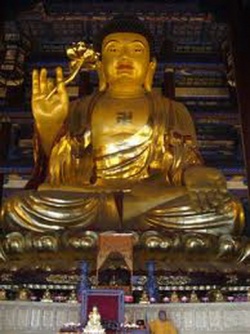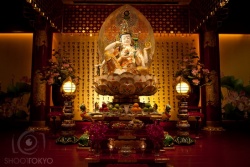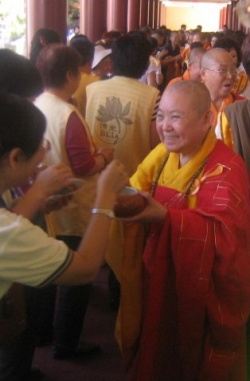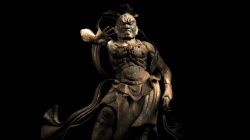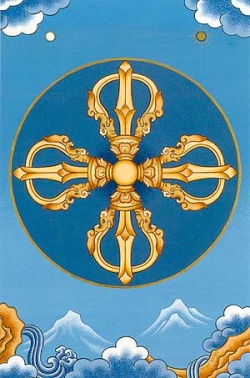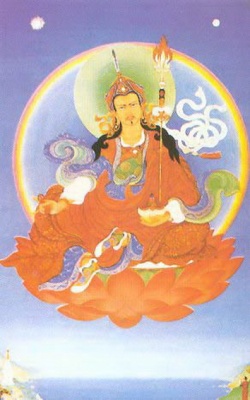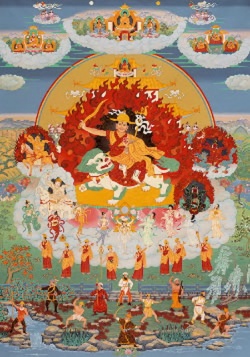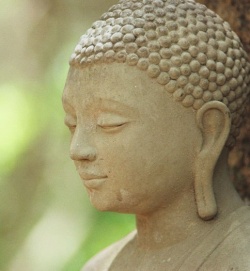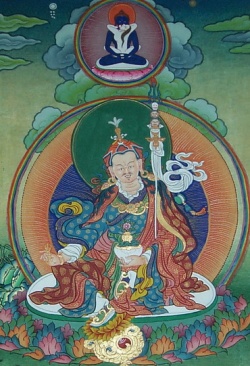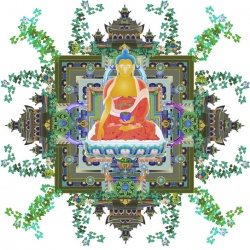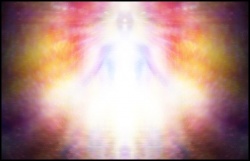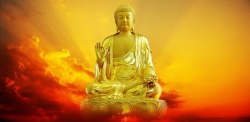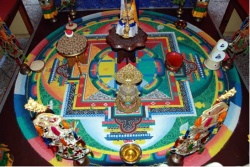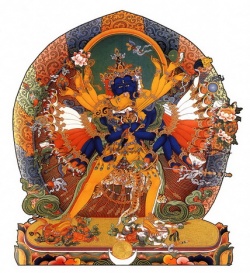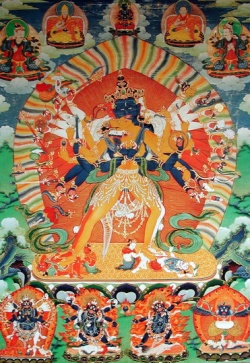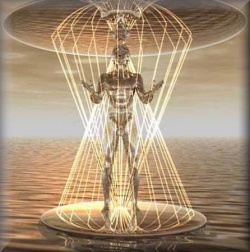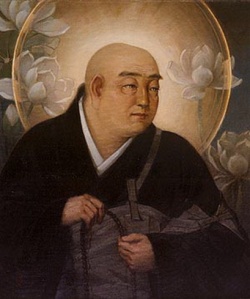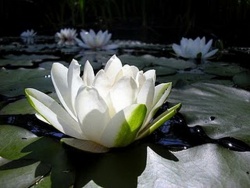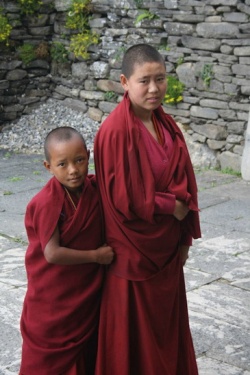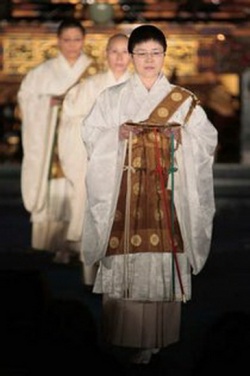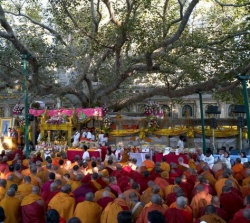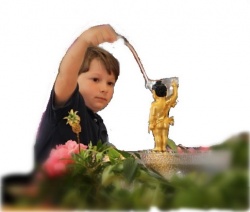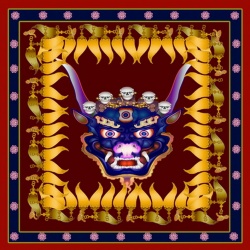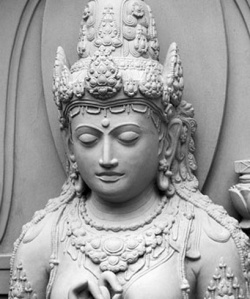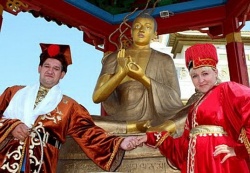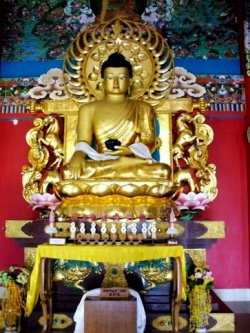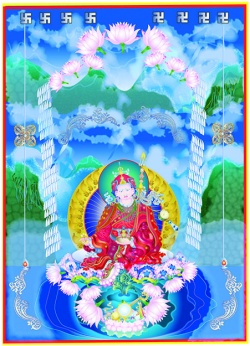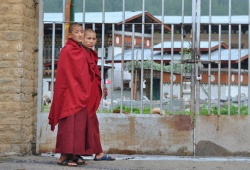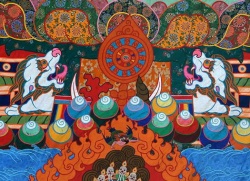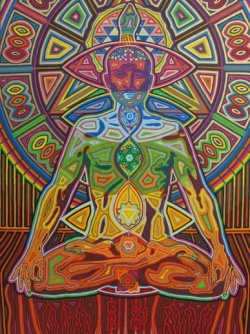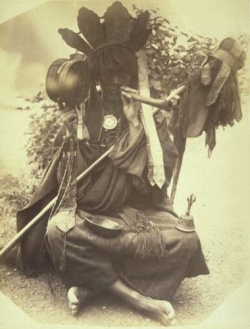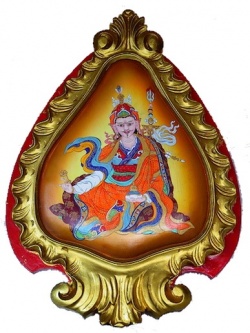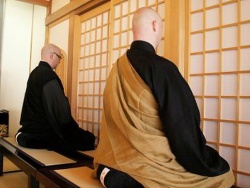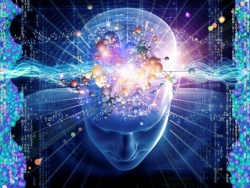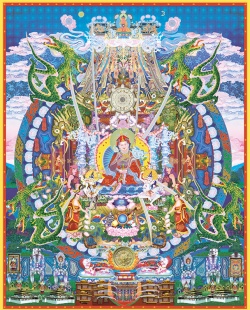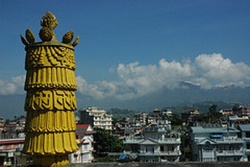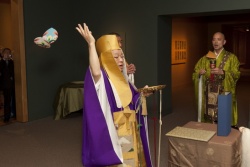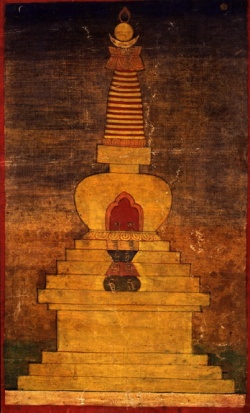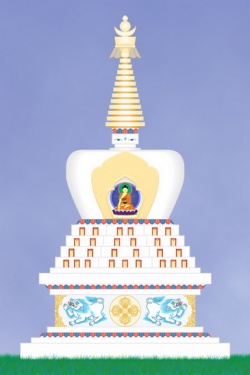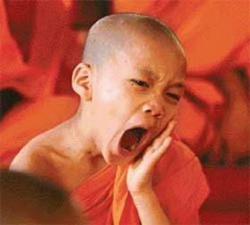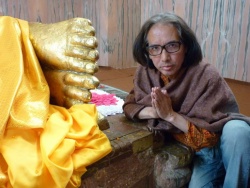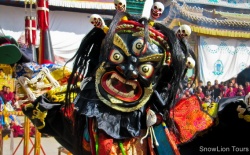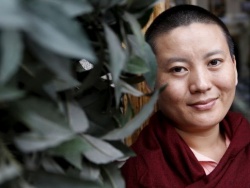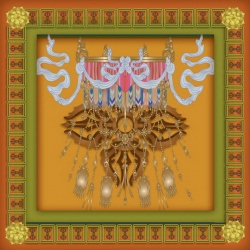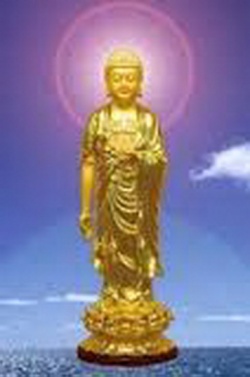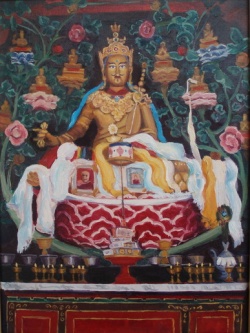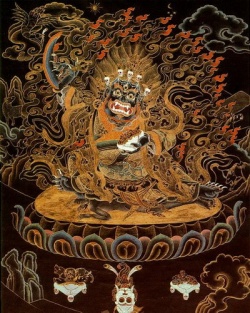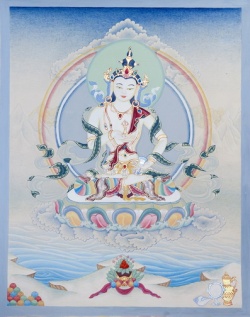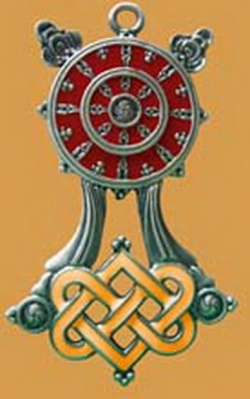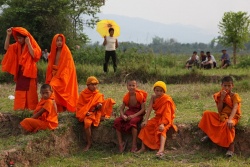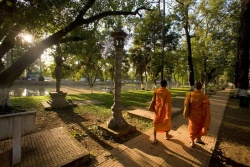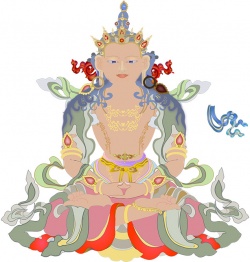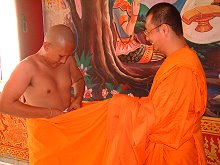The Flower Adornment Sutra: A Commentary by the Venerable Master Hsuan Hua: Chapter Forty
The Flower Adornment Sutra:
A Commentary by the Venerable Master Hsuan Hua
Chapter Forty: Universal Worthy's Conduct and Vows
Translated in the Tang Dynasty by the Tripitaka Master Srãmana Siksananda of Khotan
The Chapter on Entering the Inconceivable State of Liberation of the Conduct and Vows of Universal Worthy
Sutra:
Translated on imperial command by the T’ang Dynasty Tripitaka Dharma Master Prajna of Kubha.
Commentary:
In listening to the explanation of a Sutra, one should become familiar with the Sutra: in this Sutra of the Great Vehicle or the Small Vehicle? I will use a matter of public record to point out the differences between the two. In India there were two brothers who were Bodhisattvas, Asanga and Vasubandhu. Vasubandhu Bodhisattva, because of some unfortunate causes and conditions, had followed the Small Vehicle teachings while his older brother, Asanga Bodhisattva, studied the Great Vehicle. Although Vasubandhu was especially intelligent, Asanga nevertheless wished to convert him to understanding and believing the Dharma of the Great Vehicle, but he did not have the power to cause his brother to believe. Vasubandhu was intent on his praise of the Small Vehicle and said that the Great Vehicle Dharma was incorrect.
Filled with dismay at his brother’s refusal to even consider the Great Vehicle Sutras, Asanga Bodhisattva then devised an expedient method. He feigned a severe illness and asked his brother to come to look at him and see him for the last time. He wrote: “I am very old and will soon die. If you don’t come to see me now, we will never see one another again.” His brother came at once to see him.
Asanga said, “I will certainly die. Would you read the Great Vehicle Sutras to me? Then I can die with my eyes closed (that is, to die having taken care of all his affairs in the world).”
Although his younger brother did not feel that his brother’s illness was very serious, nevertheless, he decided to humor him and began reading a Great Vehicle Sutra to him. Which Sutra did he read? He read this Flower Adornment Sutra, and the more he read the more inconceivable it became. Then he knew that the Flower Adornment experience was wonderful and inexplicable, just like the sun in space illumining all things, or like great Indra’s Net wherein the infinity of jewels emit light and each jewel reflects the light from all the other jewels. Then he realized his previous mistakes, and engulfed with uncontrollable remorse, said, “Quickly give me a sword.”
His older brother asked, “Why do you want a sword?”
“Because I want to cut out my tongue,” he said.
“Why do you want to cut out your tongue?” Asanga asked.
“Because in the past,” he said, “I used it to praise the Dharma of the Small Vehicle and slander the Sutras of the Great Vehicle. This is an offense. So now that I realize this, I should cut out my tongue.”
When his older brother heard this he said, “That is not necessary.”
“Why is that?” asked Vasubandhu. “My offenses are too great. Now I wish to cut out my tongue.”
His brother said, “If you were standing on the ground and you fell down, would you not stand up again? You would not continue to lie on the ground, would you? You would put your hands on the ground and push yourself up. Previously you slandered the Great Vehicle and praised the Small Vehicle with your tongue. Now you can use your tongue to praise the Great Vehicle.”
Vasubandhu thought that this was reasonable and refrained from cutting out his tongue, and from that day on, he put his strength into cultivating in accord with what is right, studying the Sutras of the Great Vehicle, including the Flower Adornment Sutra. Later he wrote the Shastra on the Ten Grounds and upon completing his work, the earth quaked and his mouth emitted light.
When this happened, the King came to visit him and asked, “Have you been certified to the fruition of Arhatship?”
Vasubandhu Bodhisattva said, “No.”
The King said, “If you have not been certified to the fruition of Arhatship, then how is it that the earth has quaked and light comes forth from your mouth?”
Vasubandhu Bodhisattva said, “When I was young I studied the Small Vehicle and slandered the Great Vehicle. Now I have changed and study the Flower Adornment Sutra. I have written the Shastra on the Ten Grounds and after I finished it, the earth quaked and my mouth emitted light. It is not that I have been certified.” Then the king decided that the Flower Adornment Sutra was very subtle and wonderful, and he began to study it.
Here is another matter of public record. The translator of the Eighty roll edition of the Flower Adornment Sutra was named Shikshananda, whose name, very appropriately, means “delight in study.” After he translated the Flower Adornment Sutra into Chinese, he delivered lectures on it, and when he came to the sentence, “seas of Buddha lands as numerous as dust motes in world systems,” the ground quaked in the lecture hall in which he was speaking.
His work on this Sutra took place during the T’ang Dynasty, during the time of Empress Wu Tse-T’ien, also known as T’ien Hou (623-705). One night she dreamed that the heavens sent down sweet dew and the next day following her dream it rained, and it rained sweet dew. That was another sign that the translation of the Flower Adornment Sutra was very important.
After he completed his translation of the Flower Adornment Sutra, Shikshananda lectured it, and when he was lecturing, the great earth quaked. At that time the Empress Wu Tse-T’ien wrote a letter to praise Shikshananda’s work. Therefore, the inconceivable states of the Flower Adornment Sutra are extremely many and it is difficult to explain them in a few words.
Translated on imperial command. Imperial command means the Emperor ordered the translation of this Sutra from the Indian language into Chinese, during the T’ang Dynasty.
Tripitaka. There are three pitakas or “stores” in the Buddhist canon: the Sutra store, the Vinaya store, and the Shastra store. In the Sutras the Buddha taught the path of cultivation. The Vinaya contains all the moral precepts, while the Shastras include all the exegeses This is the meaning of Tripitaka or “three stores.”
Dharma Master. Some explain Dharma Master as one who takes the Dharma as his master; that is, one’s master is the Buddhadharma. Some explain it as one who gives the Dharma to others. These are the meanings of Dharma Master.
Who was this Tripitaka Dharma Master? He was called Prajna. Prajna is a Sanskrit word which is translated as “wisdom.” Why is it transliterated instead of translated? Because it is one of the Five Untranslated Terms. It was not translated because it has many meanings which cannot be translated in one word. The other four kinds of untranslated terms are esoteric terms, terms which refer to something not existing in the translator’s country, terms that traditionally have not be translated, and terms of respect.
Kubha, known today as Kashmir, was the name of a country during the T’ang Dynasty where Master Prajna was born.
Sutra:
The Chapter on Entering the Inconceivable State of Liberation on the Conduct and Vows of Universal Worthy.
Commentary:
Entering means “to reach to” the inconceivable state of liberation which cannot be thought of. Basically, liberation has no state; if there was a state it could not be liberation. Why does it say, “state of liberation?” The word “state” is used to express emptiness, because basically, when one is liberated, there is nothing at all.
Conduct and vows. “Conduct” is the great practice which the Bodhisattva Universal Worthy cultivates, and “vows” are the vows that he makes. His cultivation and vows surpass all others’ and so he is called Universal Worthy Bodhisattva of Great Conduct and Vows.
Universal Worthy. What is “Universal?” It means “his Way pervades everywhere.” What does “Worthy” mean? It means “his virtue is a sage’s virtue.” His conduct is identical to the conduct of foremost sages.
There are four great Bodhisattvas. Manjushri Bodhisattva is foremost in wisdom; the Bodhisattva Who Observes the Sounds of the World (Avalokiteshvara) is foremost in great compassion; Earth Store (Kshitigarbha) is foremost in the strength of vows; Universal Worthy (Samantabhadra) is foremost in practice.
In the sea of the Flower Store World, in the Flower Adornment Sutra, Universal Worthy Bodhisattva acts as the Dharma host. Dharma is spoken on request, so to hear the Dharma, a disciple must ask the Buddha to speak. Shariputra was the one who requested the Dharma in the Wonderful Dharma Lotus Flower Sutra, and Ananda requested the Dharma of the Shurangama Sutra. It was Universal Worthy Bodhisattva who, on behalf of the Assembly, requested the Dharma of the Flower Adornment Sutra. This concludes the explanation of the title of this chapter.
Sutra:
At that time, Universal Worthy Bodhisattva Mahasattva, having praised the Thus Come One’s merit and virtue,
Commentary:
At that time refers to the time following the explanation of the previous chapter. Universal Worthy is the Bodhisattva whose Way pervades everywhere, and who possesses virtue of the sages.
What is Bodhisattva? Those who have studied Sutras already understand this term, but there are those for whom this material is new and who do not understand the word Bodhisattva. Bodhisattva is a Sanskrit word. Bodhi means “enlightenment” and sattva means “sentience.” That is, a Bodhisattva is a person who enlightens sentient beings. What does “sentient beings” mean? Sentient beings include living creatures who have feeling and perception.
Today someone asked me if flowers are not sentient, ow can they make sounds? This is a good question, so now I will explain it clearly. Trees and plants have no feeling. Although they are without feeling they do have a nature, the nature of life. What is the nature of life? It is the life-energy (jen) discussed in Confucianism. This life-energy is a nature, and this nature can be said to be the Way. It can also be called the mother of the ten thousand things. Do humans have life-energy? Of course they do. If they were without it, then they would not be called humans. If they were not called humans, then what would they be called? You can call them anything you wish. For a human to have life-energy means to be human, or to speak it more correctly, “to be of the Way.” The phrase “life-energy” was coined by Confucius, and all plants and trees possess it. How can you say that plants and trees have life-energy? In the spring their limbs, branches, and leaves grow, flowers blossom and fruits come forth. This is because they have the nature of life. Not only do they have the nature of life, all plants, flowers, and trees have a minute amount of knowledge. So someone asked me, “When you cut a flower it emits a sound which we cannot hear, but if you use scientific means, then it can be heard.” This is really common.
Why is it that plants and trees can make sounds? It is because they have a nature. This nature is not full, but only exists in a minute amount. For example, if a person were said to have one hundred pounds of nature, the flowers, plants, and trees by comparison, would not have even an ounce, but would have about as much as a hair. Now this is a comparison, so do not take it literally. Basically, plants, flowers, and trees do experience some kind of sensation. I have said this before.
In China, a camphor and gingko tree received the precepts. You ask, “How is it that they could take the precepts? Since they are not sentient, how is it that they can have the nature of humans and receive the precepts? This is too contradictory.”
This is not the least bit contradictory, because if you understood it, you wold see it is very ordinary. Because the trees were old and they had experienced much, and because they had lived among people in the world, gradually they acquired the nature of humans. They had life-energy. After they had life-energy, then they acquired a little feeling. Because of this feeling, they wished to take the precepts. For a long time they did not realize how many improper things they had done, but after a while, they recognized their mistakes, took the precepts, and even thought about leaving the home-life. We should be aware of this point. Not only does he cross over sentient beings, but he also crosses over those without feelings. So it is said, “both those with and without feelings can accomplish the Way.” All of them can accomplish the Buddha’s Way. It is for this reason that he is called Universal Worthy; not only does he want to save people, but he also wants to cross over all flowers, plants, and trees. How can we not admire the vastness of his practices? At their best, most people are only aware of crossing over other people, crossing over other sentient beings, but Universal Worthy Bodhisattva even crosses over those without life, and so he is called Universal Worthy Bodhisattva.
The word Bodhisattva can also be translated as, “a living being with a great mind for the Way.” Although still among living beings, his mind of the Way is great, because he is open to all, with no thoughts of jealousy, selfishness, self-benefit, or obstruction. A Bodhisattva is also called “one who is open.”
Following the word Bodhisattva, the text says Mahasattva. A Mahasattva is a great Bodhisattva. Universal Worthy Bodhisattva is a great Bodhisattva among Bodhisattvas. If he is great, then who is a small Bodhisattva? When you first bring forth the mind to cultivate the Bodhisattva path, you are a small Bodhisattva. After you have brought forth the mind of a Bodhisattva for a long, long time, then you become a great Bodhisattva. Upon first receiving the Bodhisattva precepts, you become a small Bodhisattva; after you have held and practiced according to these precepts for a long time, then you are considered a great Bodhisattva. When you have done this for hundreds of years, then you can be considered an old Bodhisattva.
Universal Worthy Bodhisattva praised and paid homage to the Thus Come One’s merit and virtue. What does “praise” mean? It means “to laud.” To laud whom? It means to laud the Buddha, the World Honored One. “Pay homage” means “to worship,” to pay homage to the supremacy of the Thus Come One’s merit and virtue.
What is “Thus Come One?” It is one of the ten names of the Buddha. A long time ago, all Buddhas were known by many names, but it was difficult for people to remember them all, so the number was reduced to 10,000 names. It became difficult for people to remember all 10,000 names, and so they were further reduced to 1,000 names for each Buddha. But even this was still too many to remember, so the number of names was reduced to one hundred. Because the memory of living beings today is very poor, now we learn only ten names for the Buddha, of which Thus Come One is one.
“Thus” ‘means “unmoving,” or “still.” “Come” means “movement.” This means that in stillness there is movement, and in movement there is stillness. “Thus Come One” includes the “suchness of the Way,” which is stillness, and “comes to accomplish the Right Enlightenment,” which is movement. Although within this name there is movement and stillness, there is no movement or stillness in the Buddha’s original substance. It does not move, and it is not still; movement and stillness are not different; movement is stillness, and stillness is movement. How can I say this? Movement is born from stillness, and stillness manifests out of movement, and therefore stillness and movement are not two. This is the meaning of Thus Come One.
In the previous chapter, Universal Worthy Bodhisattva praised the Thus Come One’s supreme merit and virtue, a merit and virtue which is superior to all other kinds, and to which none other can compare. It is so great that you could never finish describing it. Although no discussion can ever totally describe it, nonetheless Universal Worthy praises the Thus Come One’s especially supreme merit and virtue with his vast and great practice and vows.
What is merit and virtue? Merit is what is established, and virtue is something that one does. I will give you an example. In schools, teachers exhaust their hearts and strength to teach, and besides earning their salary, they do much work which is not expected of them. Diligently doing more than what is expected of you is merit.
Virtue is good one does for others. It means to help others without seeking any recompense. For example, if I were to give someone $50,000 without any conditions, without any thought or hope of getting anything in return, this would be a virtuous act. If you wish for something in return, your actions are without virtue. You should be kind to others and not seek anything in return, doing good for everyone, and not hoping for a reward or self-benefit. This is what is mean by virtue.
Although there is great virtue and small virtue, it should not be the case that you only do greatly virtuous deeds and neglect small acts of goodness Small virtue comes about when you benefit people just a little, but if you do this often, then your virtuous conduct will become great. If you do not do small virtuous acts, you will never accumulate virtue. So it is said, “The Way must be practiced;” you must cultivate the Way in order for it to be the Way. Don’t talk from morning till night about cultivating the Way, while never really doing it. This amounts to nothing but “intellectual talk-Zen.” It is useless.
Merit is also something that someone does. If you do not do it, you will not have it. So it is said,
The Way must be practiced; if you do not practice it, what use is the Way?
Virtuous deeds are to be done; if you do not do them, how is there any virtue?
Therefore, the merit and virtue of the Thus Come One can never be adequately praised.
Sutra:
Told all the Bodhisattvas and Good Wealth.
Commentary:
Universal Worthy Bodhisattva spoke to all the immeasurable and boundless numbers of Bodhisattvas in the Flower Adornment Dharma assembly. Since “all” might mean many or few, in this case does it represent many or few Bodhisattvas? Here it means many, the infinite number of Bodhisattva in the Flower Adornment Dharma Assembly. In addition to Bodhisattvas, Universal Worthy spoke to the Youth Good Wealth. Although he is a child, the Youth Good Wealth, whose Sanskrit name is Sudhana, is most inconceivable.
The Youth Sudhana had fifty-three teachers, a matter which has caused complications in Chinese Buddhism. Disciples of the Buddha in China, wishing to practice along with the Youth Sudhana, would say, “The Youth Sudhana had fifty-three teachers, but I have only ten or twenty. That is not too many.”
This is one of the most deluded and improper practices of Chinese Buddhists, one which I have always opposed vehemently. I am certainly not afraid that my disciples will take other Dharma Masters as their teachers; but nevertheless, I oppose this kind of custom because it is very detrimental.
Someone may ask, “Why do you feel that Chinese Buddhists who have ten or twenty teachers are very bad, while you consider the conduct of the Youth Good Wealth, who had fifty-three teachers, acceptable?”
Everything must be based on true principle. The Youth Good Wealth’s first teacher told him to go on to his second teacher, and his second teacher told him to go on to his third teacher. That is the only reason he went to another teacher: he was told to do so. It is not the case that he heard about a particular person who was adept in cultivation, and so he stole away from his first teacher without advising him of his intentions to study with this new person. This is called “bowing to a new teacher, while turning your back on your old Master.” If you want to treat your teacher well, why do you bow to a new teacher?
For example, everyone has a father. One’s second father could be Shakyamuni Buddha, but there is no need to look for a third, fourth, fifth, sixth, seventh, or eighth father. Your teacher is your mother and father of your transcendental Dharma Body. What is the use of having so many teachers?
After the Youth Sudhana had studied all of the virtue, knowledge, and wonderful functions of the spiritual penetrations of his first teacher, this teacher told him to go south and take a particular person for his teacher. And so on he went to his next teacher. After he had learned all the skill of a teacher, then that teacher would tell Sudhana “Go south and take as your master a particular worthy sage, Bodhisattva, or Bhikshu, because his conduct in the Way is superior to mine.” So in each case, his previous teacher sent him off to a new teacher; he did not steal off to bow to another teacher. Each teacher instructed him to go on to the next, until he came to the fifty-third one. Because he had studied the spiritual penetrations of fifty-three teachers, he had the wonderful function of spiritual powers which are extremely great. You should not look upon him as being just a common child, because he is very capable.
Nevertheless, because he had so many teachers, Chinese Buddhists now go everywhere bowing to different teachers. This has come to be known as “recklessly bowing to teachers.” You bow to one teacher, and then you bow to another teacher, sneaking from one to another to bow to different teachers. Someone like this is quite detrimental to Buddhism. When I was in China and Hong Kong, if people had already taken refuge with the Triple Jewel, I would not accept them as a disciple. Why? Because I considered them to be the weak links in Buddhism: the worst kind of Buddhists. They were not told by their former teacher to take me as their master; they snuck off to study with me. This is called “turning your back on your good teacher.”
Taking refuge can only be done once. You cannot take refuge again and again. You can take the precepts more than once: the Three Precepts, the Four Precepts, the Five Precepts, the Eight Precepts, or the Ten Major and Forty-Eight Minor Bodhisattva Precepts. Precepts can all be taken more than once. But you cannot take one teacher in the East, one in the South, one in the West, and one in the North. When you finally die, whose disciple will you be? There will be no place to go.
Basically, taking refuge many times is equivalent to not having taken refuge at all. You have had so many teachers, you end up having none. In Buddhism we want to be true, but in China there are still elder Buddhists who run around taking refuge many times, perhaps even a few hundred times in one life. But if you ask them what it means to take refuge, their eyes become blank, and they do no know what to say. They do not know what it means. They have taken refuge hundreds of times, and they do not know what it means to take refuge. Is this not pitiful? They say, “All those who have left the home-life are my teachers.” They have taken refuge with everyone who has left the home-life, and yet I believe that they do not even have one teacher. Why? Because they do not truly believe. They must believe to be rescued. If they do not believe, then they cannot be rescued.
In China, the bhikshus quarreled over disciples. For example, the disciples of one Dharma Master would secretly run off to another Dharma master, unaware they were doing wrong. This indicates that a Dharma Master has no virtue, because if he had virtue, why would his disciples leave for another teacher? Because of this, the two Dharma Masters involved would get into an argument. “You’ve snatched my disciples!”
They would fight over the Dharma like this, and as soon as they began arguing, their bad aspects would become apparent. The fire and ignorance would flare up. For example, in china, Dharma Master T’ai Hsu and Dharma Master Yuan Ying would fight over disciples just like the clashing of water and fire. They were often unkind to one another, all because their disciples ran way to take refuge; they were afraid of losing their disciples to one another. They went to extremes to prevent this.
Even though the Youth Good Wealth has a very important position in the Flower Adornment Sutra, he has, nevertheless caused complications within Buddhism. Why do Dharma Masters accept disciples of other masters as their own disciples when they know that it is incorrect and not in accord with the Dharma? Now I will reveal their innermost intentions. It is because they wish to take advantage of the conditions. If they have more disciples, then they can get more red envelopes which they appreciate more than anything, because in China, these red envelopes always contain donations of money. So if they do not accept disciples, they will be losing money.
As soon as they accept a disciple, the disciple thinks, “This is my teacher, and I should do my best to make offerings to him.” So these Dharma Masters get money, which causes their hearts to move. Even though they clearly know they are incorrect, they still do this. Now is this not a complication?
Why did this happen? First, it is because of the Youth, and second it is because of Good “Wealth.” Since he was wealthy, he moved everyone. Everyone is fond of wealth. The Youth was just a child, and this child was very wealthy. Almost all people feel that money is very flashy and nice to have, and so some cultivators are moved to such extremes that they do things they know are incorrect. This is one of the worst aspects of Buddhism, one which I hope will not arise in America. Do not take refuge with one teacher and then take refuge with another. If you find a good teacher, after you take refuge with him, do not rebel against him. Rebel means to “renounce your religion, and turn your back on your teacher.”
The Youth Good Wealth had fifty-three teachers, and caused many improper, confusing customs to evolve in China. Before American Buddhism spreads everywhere, we should prevent this custom from taking root. For example, in Christianity, people are baptized only once. No one says, “You weren’t baptized clean the first time, and so you should be baptized again,” telling you that you have not been baptized and that you need to do it again and again.
Buddhism should also be the same. One does not need to take refuge again and again, each time making excuses, “Oh, the first time I took refuge, the Buddha probably did not know, so I’ll do it a second time.” If the Buddha did not know the first time, then he would not know about your taking refuge the second time either. How will he know about the third time up to the thousandth time? Why? The Buddha does not sleep all the time, and he sees when you take refuge. The Buddha is the Greatly Enlightened One. All you have to do is sincerely think that you want to take refuge in Buddhism, and he knows. So it is said, “The link between the request and the response is inconceivable.”
If you say the Buddha does not know about you, you do not really believe in Buddhism, and in actuality you have not taken refuge at all. Even if you have taken refuge hundreds of millions of times, it is of no use. When you take refuge with a Master, you should certainly respect him and honor the Way. You should be very respectful towards your teacher. I am not telling my disciples to respect me, because they already do; rather, I am just explaining this principle for you. I do not need to tell my disciples to be more respectful.
After one takes refuge, one absolutely must remember not to turn one’s back on one’s teacher, or to show disrespect to him. Those who are not respectful to their teachers may fall into a hell. Which hell? The Thousand Blades Hell which is explained in the Earth Store Bodhisattva Sutra. Disciples who are not filial to their teachers fall into this hell.
There are some people who do not follow the teachings of their teachers but who wish to strike out on their own. These people like to follow their own inclinations and do not like to hear their teachers’ instructions. Not only that, but to compensate, they slander and scold their teachers. Do not think that this is a joke. There are all kinds of beings in this world. Some will poison their teachers and use various methods to harm them. To sit in the teacher’s chair is a mistake, and to play with hi bowl is a mistake. These acts are very dangerous, and only if your teacher tells you to use them, is it permissible to do so. If you recklessly do these things, then it is a mistake. This relationship is very important, and you cannot do whatever you wish, because a disciple has no freedom when it comes to his teacher. You should never slander your teacher or talk about him behind his back. These kinds of actions are offenses created with the mouth.
Sutra:
“Good men, if all the Buddhas of the ten directions spoke continuously of the Thus Come One’s merit and virtue for kalpas as many as fine motes of dust in ineffably ineffable numbers of Buddha lands, those virtues could not fully be described.
Commentary:
This section of Sutra says that the merit and virtue of the Buddha can never be totally explained. The text says, good men, those of you who have taken refuge with the Triple Jewel, who have received the Five Precepts and who cultivate the Ten Good Acts, I will now tell you about the Thus Come One, the Buddha’s, merit and virtue. If all the Buddhas of the ten directions spoke continuously of the Thus Come One’s merit and virtue for kalpas as many as fine motes of dust in ineffably ineffable numbers of Buddha lands. “Fine” means extremely small, as small as a dust mote which borders on emptiness. It is something that cannot be seen with the eyes, unlike the particles in a ray of sunlight, which can be seen. If a fine dust particle, which is visible, is divided into seven pieces, one of the pieces is called a dust mote bordering on emptiness, which cannot be seen. This kind of dust particle is called a fine mote of dust.
“If all Buddhas of the ten directions spoke continuously” means, if they spoke without ceasing for as many kalpas as there are fine dust motes, perpetually speaking “of the Thus Come One’s merit and virtue,” those virtues could not fully be described. There is not way to describe the merit and virtue of the Buddha.
Sutra:
Those wishing to perfect the doors of this merit and virtue should cultivate ten vast and great conduct and vows.
Commentary:
The Buddha has immeasurable and boundless merit and virtue which cannot be fully described. Is it the case that only he possesses such merit and virtue, and no one else has any? No. You will not find prejudiced, despotic doctrines within Buddhism. In Buddhism every living being has the potential to become a Buddha; all living beings who fly, who walk on the ground, who swim in the water, all creatures who move, and all stationary living things-trees, flowers, and grasses-all can become Buddhas. Those beings born from wombs, born from eggs, moisture-born, and born by transformation, and all the rest of the twelve kinds of beings can all become Buddhas. Within Buddhism, you will not find cases where one can become a Buddha, but another cannot. And Buddhism is not like some other religions in which there is a being who says, “Only I am the true Spirit; all others are false.”
It is only to be feared that you will not work hard to become a Buddha. If anyone becomes a Buddha, that Buddha is the true Buddha. There are no false Buddhas. All Buddhas are true Buddhas, and all beings can become true Buddhas. It is not the case that I alone can become a Buddha, but you cannot. This doctrine is too narrow, and nowhere in Buddhism will you find the teaching that “I am thee true Spirit and all others are false.” What reason is there to have only one Spirit? This would certainly be a solitary spirit. In Buddhism, all beings can become Buddhas; there are many, many Buddhas who were once living beings, and the path they all took to become Buddhas is the same. Not one of them took a different path.
So those wishing to perfect the Buddha’s doors of this merit and virtue should cultivate ten vast and great conduct and vows. If they accomplish cultivation of these ten, they will obtain the merit and virtue of the Buddha.
Sutra:
What are the ten? The first is to worship and respect all Buddhas; the second is to praise the Thus Come Ones; the third is to extensively cultivate making offerings; the fourth is to repent of karmic obstacles and reform; the fifth is to follow along with and rejoice in merit and virtue; the sixth is to request the turning of the Dharma wheel; the seventh is to request that the Buddhas remain in the world; the eighth is to always study with the Buddhas; the ninth is to constantly accord with living beings; the tenth is to universally transfer all merit and virtue.
Commentary:
What are these ten vast and great doors of practice? This is a question about the methods and names of these ten great vows and practices. Just what are these ten doors, and how are they put into practice?
The first is to worship and respect all Buddhas. “To worship” means “to have the proper propriety;” you could say that it means “to show the proper etiquette” towards the Buddha. Worship brings about mutual respect. If you are polite to others, then others will be polite to you. Why do we want to be polite? Because we want to be respectful to whomever we meet. Therefore, we practice worship.
Worship is one of the Five Constant Virtues: benevolence, righteousness, propriety (also translated as worship, rites, and ritual), wisdom, and faith. People differ from animals because of propriety. If we are lacking in propriety, we are no different from animals. When we are respectful to someone, we must have proper comportment, and when respecting the Buddha, we should be even more attentive to proper comportment: we should have proper comportment and be respectful.
In the past, the Chinese people did not like to bow to the Buddha, somewhat like Americans of today. When I came to the United States, people told me that it really goes against the nature of Americans to bow to the Buddha. I replied, “Good. If they dislike bowing, then I will definitely want them to bow. If they don’t, I won’t teach them.”
If you want to study Buddhism with me you must bow. If you do not, then I will not teach you. Why? Because you do not have the proper attitude and comportment towards the Buddha. Without that, how could I teach you? The Chinese were this way in the past, too. Believing in the Buddha is one thing, but not bowing to the Buddha is comparable to being a monkey. Monkeys do not understand about bowing to the Buddha, and if you tell them to bow, they will not do it. Horses and cattle do not know about bowing to the Buddha either. They may be respectful to the Buddha in their minds, but they do not know how to bow.
Chinese people were the same way; they believed, but did not worship. They did not bow to the Buddha even though they believed in him. Ratnamati Bodhisattva (ca. 500 A.D.), saw this situation and thought, “What use is it to believe in the Buddha yet not bow to him?” Thereupon, he went to China to establish and teach seven types of worship, the seven ways to bow to the Buddha. He went to China to instruct and transform the people there and to lead them to bow to the Buddha.
Wherever Buddhism goes, the response is generally the same. When it was first taken to China, the Chinese did not like to bow to the Buddha either. Why did they not like to bow? Because in the past they never bowed, and they had a mark of a self which is a kind of arrogance which caused them to consider themselves as being larger than Sumeru. If they were more magnificent than Mount Sumeru, how could they bow to the Buddha?
So in the Buddha Hall, when everyone is bowing, some people stand there like hunks of wood, and some sit there like stones. Everyone acts in a different way, but those who believe in the Buddha must bow to the Buddha. If you do not bow, how can you insist that you believe? So you must bow to the Buddha images.
There are those who think that because Buddha images are carved from wood, there is no use in bowing to them. Do not mistakenly think that a Buddha image is actually a Buddha. The Buddha pervades everywhere. The Buddha’s Dharma body is omnipresent. A Buddha image is only a symbol of the Buddha, and nothing more. For example, each country in the world has its own flag, and the citizens of each country perform something like a pledge of allegiance to their flag. Even though flags are just made out of a piece of cloth, or pieces of cloth sewn together, they represent the country. We perform our pledge of allegiance to the flag as a way of embodying our respect for our country.
Showing respect to an image of the Buddha works in the same way. The symbolic images of the Buddhas are definitely not the Buddhas, and so why do we bow to them? The fact that the Buddha pervades everywhere suggest that we should bow to all the four directions and the eight points on the compass, but that is impractical. What is needed is something to which one can return and rely; a symbol is needed to represent the Buddha. You do not run off to all the different provinces and countries to show your respect to the country. This would not be practical. So a flag is considered sufficient as an object of respect. Bowing to the Buddha works in the same way.
There are seven different ways that people bow to the Buddha. The first is “arrogant bowing,” and describes a person who, although he or she bows to the Buddha, still has a mark of a self. When someone like this bows to the Buddha, it is forced, and is accompanied by thoughts like this: “What am I doing bowing to the Buddha? Why do I have to bow to him?” A person like this becomes annoyed at being forced to put his head down. He sees everyone else bowing and feels that if he does not bow along with them, he will stand out, and so out of embarrassment he bows to the Buddha. Although he bows, his mark of self is still not empty; on the contrary, he is filled with arrogance. This describes the first kind of bowing which is called “arrogant bowing.”
The second kind of bowing is called “seeking for fame.” This category describes someone who hears others praising a cultivator saying, “That person bows often and really cultivates vigorously; he bows to the Buddhas, he bows to Sutras, and he bows repentance ceremonies. He is truly a diligent cultivator. Upon hearing the praise of this cultivator, he also wishes to be recognized as a cultivator, so he begins vigorously bowing to the Buddha, and although he find pleasure in bowing, he does not truly bow to the Buddha; he is bowing for recognition. He is seeking recognition as a cultivator, and the pleasure he finds is in that recognition, and his dreams of fame. This is the category of bowing called “seeking for fame.”
With the first, arrogant bowing, you see others bowing so you bow along, but you think to yourself, “Oh, this is really superstitious. Of what possible use could it be?” The second, seeking for fame, is not performed because you believe or do not believe; you bow because you see someone else bowing and receiving offerings, respect and others’ praise. Since you too wish to receive offerings, respect, and praise, you bow to the Buddha.
The third is called “bowing with a body and mind concurring.” What does this mean? It describes a person who bows when he sees others bowing. Both his body and mind go along with what everyone else is doing in mindless imitation, without the slightest concern as to whether bowing to the Buddha is beneficial or not, or whether it is reasonable or superstitious. You do not seek for recognition; you just follow along with everyone else, your body and mind concurring. This kind of bowing has no real benefits and no real faults.
The fourth kind of bowing is called “wise and pure.” “Wise” refers to the function of wisdom, and “pure” refers to the development of purity. It describes one who uses true wisdom to purify his body and mind. People who are wise use their method to bow to the Buddha, and by so doing, they purify the Three Karmas of body, mouth, and mind.
When someone uses this fourth method to bow to the Buddha, his body karma is correct inasmuch as he does not kill, steal, commit sexual misconduct, and so in this way his body karma is purified. When he uses this method to bow to the Buddha, he entertains no thoughts of greed, hatred, or stupidity, but rather possesses the wisdom born from single-mindedly and respectfully bowing to the Buddha, and so the karma of mind also becomes pure. When someone bows to the Buddha, he also recites the Buddha’s name, and by doing so, or by holding and reciting Sutras and mantras, his mouth karma is also correct and devoid of any harsh speech, false speech, irresponsible speech or duplicity, and is thereby purified. When the Three Karmas of body, mouth, and mind are pure, this is called “wise and pure bowing,” with which one uses true wisdom to bow to the Buddha.
The fifth kind of bowing is called “pervading everywhere throughout the Dharma Realm.” What does this mean? It describes one who, when bowing, contemplates: “Although I have not yet become a Buddha in body, my mind’s nature fills the Dharma Realm. As I bow before this one Buddha, I bow everywhere before all Buddhas. I am not just bowing before one Buddha; my transformation bodies bow before each Buddha, simultaneously making offerings to all Buddhas and Bodhisattvas.”
Consider that “Everything is made from the mind alone,” and so one’s mind totally pervades the Dharma Realm. One’s bowing practice totally pervades the Dharma Realm. What is the Dharma Realm? All of the Three-thousand Great-thousand worlds are contained within it. In fact, nothing is outside of the Dharma Realm. With this kind of bowing, you contemplate your respectful bowing as it totally pervades the Dharma Realm. This bowing is called “pervading everywhere throughout the Dharma Realm.”
The sixth is called “sincerely cultivating proper contemplation.” One who cultivates proper contemplation is one who concentrates his mind and contemplates bowing to the Buddha. “Bowing to the Buddha is bowing to the Buddhas of the Dharma Realm; bowing to the Buddhas of the Dharma Realm is just bowing to one Buddha.” This is because all Buddhas of the ten directions and the three periods of time share one Dharma body in common, and all Buddhas countries and Ways are identical.” A concentrated mind must be used to bow to the Buddha, to contemplate the Buddha, and to cultivate, so that you will not have false thoughts.
It is not considered to be proper contemplation if when you are bowing, your mind runs off to the movies, or to the race track, or goes off hunting, or to a dance hall, a bar, or a restaurant. You do not need to purchase a ticket for your mind to travel off in all directions. With no travel arrangements at all, suddenly it is in the heavens, and suddenly it is on the earth. Sometimes your mind will fly off to New York and then for no apparent reason, it comes back to San Francisco. You think, “Oh, I was here bowing to the Buddha, and then I went to New York, only to fly back to San Francisco again. This must be a spiritual power!”
Now in fact, this is not even a ghostly power, let alone a spiritual power. It is nothing more than false thinking, and is called deviant contemplation or improper contemplation. If you cultivate with proper contemplation, then you will not have these false thoughts. You would bow to the Buddha with one mind which is not divided.
“Sincerely cultivating” means that when you bow once, it surpasses bowing one million bows made by someone who bows while false thinking. So, in cultivating, “When you reach the gate, then you enter.” You should understand this dharma door, because if you do not, then when you see others bowing to the Buddha, you will not bow the way they do, but instead will think, “Oh, as soon as I’m finished bowing, I’m going to have a cup of coffee, or perhaps I’ll have a drink.” People like this have no control over their minds, and after they have finished bowing, they run off to have a drink.
The problem is that not only do they themselves go out to drink, but they drag everyone else out with them. This is really pitiful. This is not “cultivating purely with proper contemplation,” but is a form of deviant contemplation, because if you have false thoughts while you are bowing, your worship is devoid of any merit and virtue.
The seventh is called the “true mark of impartial bowing.” It describes a person who bows and yet does not bow; who does not bow while he bows. When I say this, some of you are thinking, “You say we should bow and yet not bow, and not bow and yet bow. Therefore, if I don’t bow to the Buddha, won’t I be bowing to the Buddha?” This is not what I mean. Wit this kind of bowing, although you bow to the Buddha, you are not attached to a mark of bowing to the Buddha. You cannot distort the meaning and say that while you are not bowing to the Buddha, it counts as bowing to the Buddha. One who speaks like this is mentally disturbed.
For example, recently someone told me that he had attained the void. This is an extremely stupid thing to say. What is more, people like this cannot be helped, and there is no way to save them because their heavy attachment-nature makes them too stupid.
The “true mark of impartial bowing” means that “I am bowing to the Buddha, I am impartially bowing to the Triple Jewel; I am reverent to the Buddha; reverent to the Dharma; and reverent to the Sangha. Although I bow in this way, I nevertheless do not discriminate that I am bowing and “not one thought is produced, nor is one though destroyed.” This is the dharma of the “true mark of impartial bowing.” It is a dharma which involves neither production nor destruction: “When not even one thought arises, the entire substance appears.” When you bow to the Buddha to the point that not even one thought is produced, you manifest your body throughout the entire Dharma Realm. Although your body is bowing here, it is the same size as the Dharma Realm. This is just the true mark, which has no mark. You bow until there are no people, no self, no living beings and no life-span. You become one and the same substance with the Dharma Realm. Your body is just the Dharma Realm; the Dharma Realm is your body.
Is this not wonderful? Before your body was just a speck on Mount Sumeru, and Mount Sumeru was the size of a dust mote in the Dharma Realm. But when you reach the point of the “true appearance which has no appearance,” Mount Sumeru is contained within your Dharma body. You now contain Mount Sumeru. Is this not wonderful? You totally contain everything; everything in the universe is contained within your nature, and you understand everything. The true mark of impartial bowing is an inconceivable state. If you can reach this state while bowing to the Buddha, can you then explain all of its wonderful aspects? No, they are ineffable.
This has been a simple explanation of the Seven Kinds of Bowing which describe the proper etiquette or propriety one should observe while bowing to the Triple Jewel. If you wish to discuss these in more detail, there are three hundred forms of propriety, and the three thousand awesome deportments. In China there is a book called the Book of Rites which describes propriety: how one should conduct oneself. It describes the proper etiquette for different situation; for example, it says that everyone should take his proper position when sitting down. Adults should sit in the places for adults, and children should sit in their place. Men have a proper place, women have a proper place, and elder people sit in their place. No one can sit at random. I will give you a more specific example. The Book of Rites says, “Youths should sit in the corners.” Children should not sit in the middle of a room but should sit in the corners.
In the past when I was a child, I talked a lot about propriety. What kind of propriety did I advocate? I liked people to respect me. When I was a child, we had an emperor in China and I wished to be an emperor; so under my system of propriety, all the children in the town, perhaps fifty or a hundred, had to follow my orders. I had them build a mound of dirt, upon which I saw and told all of them to bow to me. This was before I had reached the age of twelve, and strange enough, these children were not opposed to bowing to me, but obediently listened to my orders.
When I was young I wanted people to bow to me, but after my twelfth birthday, I saw a dead child and realized that people die. After that I changed this bad practice, and did not wish people to bow to me anymore; in fact, on the contrary, I wished to bow to others. Whom did I bow to first? My parents. In the morning I bowed to my parents three times, and in the evening I bowed to them again, bowing a total of six times per day. But then I thought, “My parents are the only people in the world. There is heaven and earth, and the emperor, and my teacher. At that time I did not know who my teacher would be, but I knew I would meet him in the future, and so I wished to bow to him beforehand. Most people would think that all this bowing was really idiotic, but again I thought, “This world has sages so I will bow to them, and it has immortals so I will bow to them too.” Then I discovered that there are Buddhas in the world, so I bowed to them. I bowed to Bodhisattvas, Sound Hearers, Those Enlightened to Conditions, and then I thought, “The world has very many good people living in it,” so I bowed to the good people. And there are also kind people, so I bowed to the kind people, because they do what is proper, and I wanted to represent everyone to thank them for their proper actions. For example, I would wonder why they did kin things like helping the poor, and so I thanked them for the poor people by bowing to them.
By this time, I was bowing quite a lot when I thought, “I bow to the kind people, but since evil people are pitiful, I should bow to the Buddha on their behalf and ask the Buddha to cause them to forsake their offenses and do good instead of evil.” So I bowed to the Buddha for all those in the world who have offenses, repenting to the Buddha on their behalf. Moreover, I repented to the Buddha for all those who were not filial to their parents, and bowed in repentance for all the evil people of the world because I felt I was the worst of them.
When all was said and done, I was bowing more than eight hundred thirty times and I will tell you, my practice was very strange I got up before anyone else, go dressed, an washed my face. I lit a stick of incense and went outside to bow. Regardless of whether or not it was windy, rainy, or snowing, I bowed outside. When it snowed, I placed my hands I the snow and bowed, not caring whether or not it was cold. I would bow more than eight hundred thirty times which would take about an hour and a half. I bowed before everyone work up and again after everyone had gone to bed, practicing like this for many years. Later, when I cultivated filial practices by my mother’s graveside, I decreased the bows to nine, because it used up too much time. This is how I bowed to the Buddha and practiced in my youth.
What does “respect” mean? It means “to act in accord with the rules of propriety governing the circumstances of the situation at hand.” To always act according to the proper etiquette shows respect, whereas to disregard the proper etiquette is disrespectful. For example, if you respect someone, you will act in accordance with the proper rules when you are in their presence. If you do not wish to act respectfully towards a person, then you would be very lax in their presence, doing whatever you want.
Now we wish to worship and respect all Buddhas. “All Buddhas” refers to all the Buddhas of the ten directions and the three periods of time. “Buddha” means “greatly enlightened,” a person who is greatly enlightened. Common people are born in a stupor and die in a dream. Without the understanding that the Three Realms are suffering, they do not wish to transcend them. This is called being unenlightened.
Among common people, there are some who are considered to be enlightened. Called “Those of the Two Vehicles,” they have awakened to the fact that birth and death are impermanent and very dangerous, and so they cultivate and achieve understanding based on the principle of emptiness-a one-sided prejudice for emptiness. By virtue of understanding this principle, they enlighten to the Dharmas of the Twelve Links of Causes and Conditions and the Four Noble Truths. They are called Arhats and Those Enlightened to Conditions and can be considered as enlightened ones, when speaking form the point of view of common people. Their enlightenment, however, is one-sided and incomplete because they only know how to benefit themselves, and cannot benefit others; they are only capable of enlightening themselves, and cannot guide others to the realization of enlightenment.
Bodhisattvas are different from Arhats inasmuch as they are not only able to enlighten themselves, but they can also enlighten others, benefiting both themselves and others. Buddhas are different from Bodhisattvas. Although Bodhisattvas are able to enlighten themselves and others, their enlightenment is imperfect. The enlightenment and practices of the Buddha, however, are perfect, since the Buddha has perfected his enlightenment, the enlightenment of others, and enlightenment and practices. So only a Buddha is called a Greatly Enlightened One, having practiced these three aspects of enlightenment. When person has perfected the 10,000 kinds of merit and virtue, he becomes a Buddha.
Small Vehicle Buddhism only recognizes one Buddha, Shakyamuni, and does not acknowledge other Buddhas in the world systems of the other directions. The Dharma of the Small Vehicle was taught in the Deer Park for the Five Bhikshus, and as a consequence, those of the Small Vehicle only know of Shakyamuni Buddha becoming a Buddha, and know nothing about all the immeasurable Buddhas in the other world systems. Because of this, they say that there are no Buddhas throughout the ten directions and the three periods of time other than Shakyamuni.
Now is it true that there are no other Buddhas, since they say that there are no others? No. If they recognize the other Buddhas throughout the ten directions, then those Buddhas exist, but if they do not recognize those Buddhas, those Buddhas, nonetheless, still exist. The Buddhas of the ten directions are only with Shakyamuni Buddha, and so it is said, “The Buddhas of the ten directions and the three periods of time share one Dharma Body in common.”
Universal Worthy Bodhisattva made these ten far-reaching vows to guide his practice. All of the vows are extremely great, to the point that they are inconceivable, so that there is no way one can know how great they are. It is because of this that Universal Worthy Bodhisattva is called the King of Vows.
The first vow is to worship and respect all Buddhas. To worship and respect all Buddhas does not mean to worship only Shakyamuni Buddha or Amita Buddha.
Worshiping one is worshiping all;
One Buddha is all Buddhas.
Worshiping all Buddhas without becoming attached to all Buddhas, and worshiping one Buddha without becoming attached to one Buddha, is the practice of the “true mark of impartial bowing.” Although you bow to the Buddha in worship, regardless of whether it is one Buddha or all Buddhas, you should not become attached to the mark of worship. For example, you do not want to say, “My merit and virtue is great indeed since I bow to so many Buddhas. No one else can match such practice as mine.” Do not become attached to marks in this way, or any other way, and then you will truly be able to practice the first vow, to worship and respect all Buddhas.
The second is to praise the Thus Come Ones. When we worship and respect all Buddhas, do we do so because they want the respect of others? Regardless of whether we worship the Buddhas or not, they are still Buddhas. If we worship the Buddhas, they do not obtain more benefit, or get larger, and if we do not worship the Buddhas, they do not lose any benefit, or get smaller. When we worship the Buddhas, it vitalizes our heart and spirit, but it does not affect the Buddhas. So when you worship the Buddhas, do not become attached to any mark.
Why should we praise the Thus Come Ones? They do not need our praise. They are not like us; when we are praised we become so happy our eyes and nose wrinkle up with laughter. But if we are not praised, our eyes and ears get angry. If the Buddhas were like this, they would be no different from common people. So it is not necessary to praise or worship them. Moreover, if they were the same as common people, what value would there be in worshiping them. Moreover, if they were the same as common people, what value would there be in worshiping and praising them? On the other hand, since Buddhas do not need our praise, then why praise them? It this not a contradiction?
It certainly is not a contradiction. When we praise the Buddhas, we obtain merit and virtue for our self-nature. How can this merit and virtue be described? Every person’s self-nature has light, and when you praise the Buddhas, your Yang light radiates and shines through the darkness of your ignorance. The merit and virtue which comes from praising the Buddhas is invisible and is brought about because you commit no offenses. To obtain this merit and virtue, you cannot indulge in false thinking, and the fewer false thoughts you have, the more the light of your wisdom flows forth. Cultivators of the Way fear having false thoughts because false thoughts defile the self-nature with darkness. If you are without false thoughts, the light of your self-nature shines through brighter and brighter. When you praise the Buddhas, you cherish the Buddhas, and when you cherish the Buddhas, you unite with the wisdom light of the Buddhas. Then the light of your self-nature spills forth.
What does it mean to praise the Thus Come Ones? You can say:
In the heavens above and the earth below, there is no one like the Buddha.
No one in the worlds of the ten directions equals him.
I have seen everything in the world, and nothing compares with the Buddha.
This is an example of praising the Thus Come Ones. In the heavens, in the earth, and in between, no one is like the Buddha. There are no spirits, Bodhisattvas, Arhats, or Pratyekabuddhas who compare with the Buddha, so the verse reads, “In heaven above and the earth below, there is no one like the Buddha.” No one can compare with the Buddha. Not a single being in all the world systems of the ten directions compares with him. Not only is there no one found in the heaven above and the earth below who can compare with the Buddha, the same is true throughout the worlds of the ten directions.
Our world has five continents: Africa, the Americas, Europe, Asia, and Australia. Although it is made up of these five, it is still just one world. Beyond this world there are still an immeasurable and boundless number of worlds throughout the ten directions. Now we send people to the moon in rockets. The moon may be considered one of those other worlds, but it is just one minute world among an infinity of other worlds. None of the great number of people and creatures in all the worlds throughout the ten directions compares with the Buddha. “I have seen everything in the world,” and within it all, “nothing compares with the Buddha.” This is what is mean by “praising the Thus Come Ones.”
Another example of praise of the Thus Come Ones is the hymn in praise of Amita Buddha:
Amitabha’s body is the color of gold,
The splendor of his hallmarks has no peer.
The light of his brow shines round a hundred worlds,
Wide as the seas are his eyes pure and clear.
Shining in his brilliance by transformation
Are countless Bodhisattvas and infinite Buddhas.
His forty-eight vows will be our liberation,
In nine lotus-stages we reach the other shore.
“Amitabha’s body is the color of gold.” Amita Buddha, who created the Land of Ultimate Bliss, has a golden body. “The splendor of his hallmarks has no peer.” The light shining from Thirty-two Marks and Eighty Subtle Characteristics illumines the universe and is everywhere without equal. “The light of his brow shines round a hundred worlds.” See how vast is the fragrant light which radiates from the white hair tuft between Amita Buddha’s eyebrows! And how big are Amita Buddha’s eyes? “Wide as the seas are his eyes pure and clear.” His purple colored eyes are clear and as large as the world’s great oceans.
“Shining in his brilliance by transformation / are countless Bodhisattvas and infinite Buddhas.” Amita Buddha makes immeasurable and boundless numbers of Buddhas and Bodhisattvas appear in his light. He does not just manifest Buddhas, but he also manifests Bodhisattvas. Not only that, he further manifests Sound Hearers and Those Enlightened to Conditions. Nor does he only manifest Sound Hearers and Those Enlightened to Conditions, but he also manifests immeasurable and boundless numbers of beings in the Six Paths of rebirth.
“Hi forty-eight vows will be our liberation.” Amita Buddha made forty-eight great vows to rescue living beings. “In nine lotus-stages we reach the other shore.” The lotus flowers of Amitabha’s land are divided into nine grades, each one of which is again divided into nine grades for a total of eighty-one grades. These eighty-one grades enable everyone to reach to the other shore of enlightenment and be reborn in the Land of Ultimate Bliss.
Now I have explained one aspect of praising the Thus Come Ones. Universal Worthy Bodhisattva’s second vow is to cultivate the merit and virtue of praising the Thus Come Ones.
The Vajra (Diamond) Sutra says, “The Thus Come One does not come from anywhere, and does not go anywhere; therefore he is called the Thus Come One.” “Thus” is stillness, and “come” is movement. Thus Come One can also be explained as “like one who has come, yet his basic nature has not moved.” This is the Thus Come One.
“Come” refers to the fact that there is no place from which he comes, and “go” refers to the fact that there is no place to which he goes. “Thus” is the noumenon (principle), and “Come” is phenomena (specifics), an expression of the unobstructed state of the interpenetration of noumenon and phenomena found in this Sutra. This Sutra discusses the Dharma Realm of noumenon, of phenomena, of the unobstructed state of interpenetration of noumenon and phenomena, and the Dharma Realm of the unobstructed state of the interpenetration of phenomena and phenomena. The Thus Come One is just the Dharma Realm of the unobstructed state of the interpenetration of noumenon and phenomena. Thus Come One is also one of the ten names of the Buddha. This is also an aspect of praising the Thus Come One.
The third vow of Universal Worthy Bodhisattva is to extensively cultivate making offerings. “Extensively” means “on a vast scale,” and “cultivate” means “to improve and develop;” that is, one develops the ability and improves the quality of making offerings without limit.
There are many kinds of offerings. One might give his body as an offering; another might give his mind; still another could give both his body and mind as an offering. What does “giving one’s body as an offering” mean? There are two kinds of disciples who give their bodies as offerings to all Buddhas. The first leave the home-life and use their bodies to do the Buddha’s work: to cultivate the Buddhadharma. The second are laypeople who are not able to leave the home-life, but who take time out of their busy schedules to come to the monastery, light incense, and bow to the Buddha. This is giving the body as an offering. If you are busy or for some other reason cannot go to a temple, then you may daily, with a pure and clean mind, light incense and contemplate the Buddha in your home. Perhaps you are in a remote place or in some other unusual circumstance, in which case you can still give your mind or body as an offering, by giving offerings of incense and flowers, or by lighting lamps before the Buddha, or by buying fruit or new clothing as an offering, or by offering lighted candles to the Buddha. One can also give his mind as an offering by cultivating the Buddhadharma with a true mind, daily bowing to the Buddhas, worshiping and reciting Sutras, always being mindful, and always doing wholesome things for the sake of the Buddhadharma. These are doing various kinds of offerings.
Originally there were ten different kinds of offerings, but in time the ten became one hundred, and the one hundred has finally become 10,000. When we make offerings to one Buddha, we contemplate ourselves making offerings to uncountable and unlimited numbers of Buddhas everywhere throughout the Dharma Realm, and in this way we make offerings before each one of these Buddhas. If you contemplate in this manner, you are doing what is called “making offerings throughout the Dharma Realm.” By making offerings throughout the Dharma Realm, you accumulate the merit and virtue of the Dharma Realm and obtain the wisdom of the Dharma Realm. By obtaining this wisdom, you totally perfect the resultant position of the Dharma Realm. Therefore we should extensively cultivate making offerings.
“Extensively cultivate making offerings,” means exhausting your strength to make offerings using whatever strength you have to make offerings to the Triple Jewel-the Buddha, the Dharma, and the Sangha. Universal Worthy Bodhisattva extensively cultivates the practice of making offerings as his third vow.
The Bodhisattva’s fourth vow is to repent of karmic obstacles and reform. “Repent” means to “regret previous offenses, to be contrite and self-reproachful.” “To reform” means “to correct oneself so that the same offense is not committed again.” To repent means that one wishes to change one’s previous offenses, and to have reformed means that one does not again make such mistakes. This means that evil acts that have already been done will not be done again, and that the potential for evil acts that have not yet been done is totally eradicated. It also means to cut off the continuing effect of evil acts which have already been done.
To reform means to increase ones good deeds and to do the good deeds which have not been done. You can also say it means to continuously do the kinds of good deeds that one has already done, and to cause the kinds of good deeds that have not yet been done to be done and continuously increase.
There are many kinds of karmic obstacles, and karmic obstacles are one of the three fundamental kinds of obstacles, which are: karmic obstacles, retribution obstacles, and the obstacles stemming from afflictions. Now we are discussing how to repent of karmic obstacles and reform. To repent of one’s karmic obstacles and reform involves repenting of one’s retribution obstacles and reforming the obstacles that come from afflictions.
In general, there are three kinds of karmic obstacles which are simply the karmas of body, mouth, and mind. The body creates three kinds of karma-killing karma, stealing karma, and the karma of sexual misconduct. When you discuss “killing” in terms of its broader aspects, it refers to killing larger animals, but in terms of its subtler aspects, killing refers to the killing of even the smallest creatures, like ants, mosquitoes, and flies. This broadly describes killing in its grosser and subtler forms, but there are also thoughts of killing. Although one does not actually kill, having the thought to kill is an offense in the realm of one’s self-nature. To have the thought to kill breaks the Bodhisattva Precepts. The cause of killing, the conditions of killing, the dharma of killing, and the karma of killing all break the precept against killing.
When we discuss “stealing” in its broadest sense, it means to steal a person’s country; on a smaller scale, it refers to stealing a person’s livelihood; and on a fine scale, it involves pilfering nothing more than a needle, a thread, a sliver of wood, or a blade of grass. In general, if you obtain something which is not given to you, you are stealing.
“Sexual misconduct” also has its grosser and finer aspects. Even a thought of sexual desire in your mind causes your self-nature to be impure and breaks the Bodhisattva Precepts.
The previous discussion is a general description of the karmic obstacles of the body: killing, stealing, and sexual misconduct.
There are also the three karmic obstacles created by the mind: the evil acts of greed, hatred, and stupidity. Karma is created from thoughts of greed, karma is created from thoughts of hatred, and karma is created from thoughts of stupidity.
Finally there are four evil acts of the mouth; the mouth creates karmic obstacles by irresponsible speech, false speech, harsh speech, and duplicity.
There are many ways in which one may create offense karma, and so now we should resolve to repent, because we do not want to allow new mistakes to arise. This is the meaning of repenting of karmic obstacles and reforming.
How does one repent? Before the Buddha, one may feel deep sorrow, a pain for past mistakes so deep that one cries before the Buddha in a sincere wish to repent and reform. If you earnestly repent, your karmic obstacles will be spontaneously destroyed. This describes the fourth of Universal Worthy’s vast vows, “to repent of karmic obstacles and reform.”
The fifth of his vows is to follow along with and rejoice in merit and virtue. “To follow along with” means “to accord with and to comply.” “To rejoice” means “to be happy.” “Merit” is what one establishes by benefiting others, and “virtue” is the result of the wholesome good deeds one does. One both accords with and rejoiced in one’s own merit and virtue, and one also accords with and rejoices in one’s own merit and virtue, and one also accords with and rejoices in the merit and virtue done by others.
If you wish to repent of karmic obstacles and reform, then you must follow along and rejoice in merit and virtue by doing many kinds of meritorious and virtuous acts. In fact, doing meritorious and virtuous acts is just repenting of one’s karmic obstacles and reforming. Therefore it is said, “To follow and rejoice in merit and virtue is to repent of karmic obstacles and reform. And to repent of karmic obstacles and reform is to follow and rejoice in merit and virtue.”
If this is the case, then are not the fourth and fifth vows redundant, and if they are, then why do we have this fifth vow?
The fourth vow instructs us to repent of karmic obstacles and reform, and if one wishes to repent of karmic obstacles and reform, one should also fulfill the fifth vow and follow and rejoice in merit and virtue. But in fact there are two separate and distinct things that one must do to practice these vows.
To follow and rejoice in merit and virtue includes doing all kinds of good deeds, and not crimes or evil acts. To follow and rejoice in merit and virtue, one may do something which benefits others, and this action is called a good deed. Merit is established by doing things for everyone, by acting for the general good.
For example, the Chinese character which means “merit,” kung, is made up of the characters which means “work,” kung, and the character which means “strength,” li. You should use your strength when doing acts of merit and virtue, and be sure that you are working for everyone, for the general good, and not for your own selfish interests. At present, the government takes care of most public work projects, but in earlier times, government were not involved in projects like fixing bridges, and so those who did this work established merit. This is an example of how to establish merit; whatever you do that is for the general good is called merit.
Meritorious acts are readily apparent to everyone. They have obvious characteristics, and everyone knows who did a meritorious deed. For example, schools have peoples’ names carved into plaques to show who helped make the building possible. This describes establishing merit.
By practicing what is good, one improves oneself. This is “virtue.” Whatever good you do that delights your mind is called virtue. Most people will not necessarily know about a person’s virtuous acts, but establishing merit is something everyone knows about. There are the two kinds of virtue: apparent and hidden. Apparent virtue is known by all and causes everyone to be happy, and hidden virtue is done to benefit everyone, but rarely is anyone aware of it. For example, spiritual powers can help all living beings in an invisible way, but no one is aware of them. This is an example of hidden virtue.
When one follows and rejoices in merit and virtue, one should reveal one’s good deeds and cause others to do similar acts, so that they too can follow and rejoice in merit and virtue of others.
Not only does this vow involve following and rejoicing in the merit and virtue of oneself and others, but it also includes following and rejoicing in the merit and virtue of all good deeds that bring joy to all living beings of the Dharma Realm. You follow them and rejoice by helping them do their joyful and wholesome acts. You can also follow and rejoice in the merit and virtue of Buddhas, Bodhisattvas, the Sound Hearers, and of Those Enlightened to Conditions, as well as the merit and virtue created by all living beings.
What does it mean to follow and rejoice in the merit and virtue of the Buddhas? To explain Sutras and speak Dharma and to teach and transform living beings is to follow and rejoice in the merit and virtue of the Buddhas. If you teach people to practice the Six Perfections and the 10,000 Practices, and to cultivate the Bodhisattva Way, then you are following and rejoicing in the merit and virtue of Bodhisattvas. When you teach people to cultivate the Twelve Links of Causes and Conditions, then you follow and rejoice in the merit and virtue of Those Enlightened to Conditions. To cause others to become aware of the Four Noble Truths is to follow and rejoice in the merit and virtue of the Sound Hearers. To follow and rejoice in the merit and virtue of gods and humans you must teach the practices of the Five Precepts and the Ten Wholesome Acts. This has been a general explanation of Universal Worthy Bodhisattva’s vow to follow and rejoice in merit and virtue; in actuality, the possible explanations are inexhaustible in number.
The Bodhisattva’s sixth great vow is to request the turning of the Dharma wheel. What is the “Dharma wheel?” Wheels roll over things, and the Dharma wheel rolls over gods, demons, and those of outside ways. It enables the proper Dharma to exist eternally. After Shakyamuni became a Buddha, he turned the Dharma wheel of the Four Truths three times and crossed over the Five Bhikshus. This is an example of turning the Dharma Wheel, which basically means to “explain the Dharma.” To request the turning of the Dharma wheel means to respectfully and sincerely ask the Buddha to speak Dharma, or to ask various Dharma Masters to explain the Buddha’s teachings. All of these exemplify Universal Worthy’s vow to request the turning of the Dharma wheel. For example, we explain Sutras here everyday, and each time the Dharma assembly convenes, lay people or Dharma Masters who request the Dharma are fulfilling one of the vows and performing one of the practices of Universal Worthy Bodhisattva.
What value does requesting the turning of the Dharma wheel have? We need to have people turning the Dharma wheel in this world so that the demon kings will not dare emerge. If no one explains the Dharma, then the demon kings will come out. A second reason is that when you request the turning of the Dharma wheel, the merit and virtue crated by this wholesome act arises because of you, and is obtained by you, and you thereby follow and rejoice in merit and virtue. Furthermore, if you request the turning of the Dharma wheel, you will expand your wisdom, but this brings benefit not just to you, because your request is that a Dharma Master speak the Dharma for everyone, and so it benefits everyone. This is also following and rejoicing in merit and virtue.
So you can see that these ten great vows are all related. When you repent of all karmic obstacles and reform, you also rejoice in merit and virtue. If you wish to follow and rejoice in merit and virtue, you may request the turning of the Dharma wheel, for this is the greatest way to rejoice in merit and virtue.
Turning the Dharma wheel is not limited to lecturing on Sutras and speaking the Dharma. Any activity you do for Buddhism is called turning the Dharma wheel. For example, recording the lectures, translating them, and then printing them is turning the Dharma wheel. Taking notes of the explanations of the Sutras is done with the intent of turning the Dharma wheel. First you take notes, then you memorize them, and then you speak them for others. So now you are preparing to turn the Dharma wheel. Reciting Sutras, reading Sutras, and bowing to Sutras also are all forms of requesting that the Dharma wheel be turned.
Therefore, turning the Dharma wheel is not just one special kind of activity. In fact, anything you do which is of benefit to Buddhism is called turning the Dharma wheel. Writing the instructive verses on the front door, participating in the evening lectures, and attending the daytime meditation periods are all considered turning the Dharma wheel. What we do here is to request the turning of the Dharma wheel; if you understand, then in your daily activities you are requesting the turning of the Dharma wheel, but if you do not understand, and just do the work, then all this is just tiresome suffering, and only makes you afraid to turn the Dharma wheel.
The seventh vow of Universal Worthy is to request that the Buddhas remain in the world. The Buddha enters the world, lives in the world, and then enters Nirvana. When the Buddha remains in the world, it is like the sun high in the sky filling the world with light. When the Buddha enters Nirvana, the sun sets and the world becomes dark. Therefore, Universal Worthy Bodhisattva made a great vow to ask the Buddhas to remain in the world-to forgo entering Nirvana and always remain in the world.
Universal Worthy made this vow to request that the Buddhas remain in the world because the Buddhas are able to satisfy desires of living beings. If all living beings realized and sincerely asked the Buddhas to dwell here in the world, then the Buddhas would not leave to enter Nirvana. If you do not ask the Buddhas to continue dwelling in the world, then as soon as they finish teaching and transforming the living beings who should receive their instruction, they enter Nirvana. Therefore the Bodhisattva vowed “to request that the Buddhas remain in the world.” This is the seventh vow.
His eighth vow is to always study with the Buddhas. “To study with the Buddhas” means to study their teachings, the Buddhadharmas, of which there are many. In your study, do not be afraid that there are too many Buddhadharmas, because the more you study, the more extensive your wisdom will become. For example, why was Ananda’s memory so good? “The Buddhadharma is like a great sea which flowed into Ananda’s mind.” It was not that the ocean of Dharma flowed into his mind, for this is just an analogy which means that at all time, in life after life, Ananda emphasized learning and studied diligently, and so his memory was very good. To always follow the Buddhas and continually study with them means that you cannot be lax or lazy, or muddled, but you must diligently cultivate precepts, samadhi, and wisdom, and put your greed, hatred, and stupidity, the three poisons, to rest. If you can do this diligently and cultivate sincerely, perfect in precepts, samadhi, and wisdom and totally free yourself from all greed, hatred, and stupidity, then you are always studying with the Buddhas.
The ninth vow of Universal Worthy Bodhisattva is to constantly accord with living beings, and his tenth vow is to universally transfer all merit and virtue. “Constantly” means “always,” to be forever constant and never change. “Accord” means to “do what is suitable, to respond appropriately to the state of living beings.” Doing this may seem to some to pose a problem. While according with living beings who are deviant, should one accord with their deviant ways?
Basically, living beings are unaware, but if you accord with this lack of awareness, you will end up on the road of stupidity. To accord with living beings means to accord with their customs in order to rescue them from going against the flow. What does this mean? All living beings are topsy-turvy; it is their inverted views and behavior that are called “going against the flow.” For example, if a stream flows from west to east, but you wish to go up the stream from east to west, you are going against the flow. If you literally accord with living beings, then you will not become a Buddha, and if you want to become a Buddha, then you cannot accord with living beings. Then why does Universal Worthy wish to constantly accord with living beings? Did I not just speak about according with the living beings who are going against the flow until you rescue them? One goes against the flow of common people involved with the six sense objects, and enters the sages’ flow of the Dharma Nature. This is “to constantly accord with living beings.”
When living beings wish to create karma, should you accord with them by creating karma along with them? Does a Bodhisattva who constantly accords with living beings also create karma? Does he also create offenses along with living beings? Living beings give rise to delusions, they become confused, and then they create karma. After they create karma, they undergo the retribution. If you give rise to delusion, create karma, and undergo retribution along with living beings, then you are just a living being; you have become a living being. “To constantly accord with living beings” means to always, without the least feeling of distaste, go along with living beings to teach and transform them, and cause them “to turn their backs on confusion and return to enlightenment,” to leave the confused path and obtain enlightenment.
“To constantly accord with living beings” is also the Paramita of vigor. One who truly cultivates vigor never has a feeling of distaste for living beings who create offenses. Although living beings create immeasurable offenses, Bodhisattvas do not forsake them. They do not say, “You creatures have created so many offenses that I refuse to teach you, and even though some of you will fall into the hells, it is none of my business, so go as you wish.” Bodhisattvas do not have thoughts like this, but are always compassionate to living beings in spite of their offenses; they are kind and give to them, and take them across. This is truly the Paramita of vigor.
Once when Shakyamuni Buddha was on the causal ground cultivating the Way, cultivating the Paramitas of giving and vigor in the mountains, it snowed for many days, and everything was covered by a thick white blanket. When a mother tiger and her cubs came out to find something to eat, they could find nothing because of the heavy snow and were about to starve to death. It was then that Shakyamuni Buddha saw them, emaciated and unable to move. He thought, “I will give my body to the tigers and tell them to resolve their minds on Bodhi, and after they eat me, to perfect the unsurpassed Path.” After he made this vow, he covered his head with his clothes, leapt off a mountain cliff, smashing himself to death in front of the tigers. He gave up his body for three tigers. This is one way to constantly accord with living beings and is an example of vigor in cultivating the Paramita of giving. The Buddha always practices vigor and giving in this way and thereby constantly accords with living beings.
When constantly according with living beings, we should take them across. We should not think, “Universal Worthy says to constantly accord with living beings; now some of them take mind-confusing drugs, so I think I will too. Some are doing confused things, so I think I will indulge myself along with them.”
This is not the meaning of constantly according with living beings. “To constantly accord with living beings” means to pull living beings out of confusion, to pull them along with you on the way to enlightenment. It means to cause living beings to cultivate the Way along with you. Do not misunderstand and think that it means to run off and follow the confusion of living beings, running all over until you lose your way so that you don’t know the road back home. This vow reads in Chinese, “to constantly accord with living beings,” but the translation should read, “living beings constantly accord.” Now these are opposite in meaning, but now that I have said that living beings should constantly accord with me on the Path to enlightenment, the vow is more in accord with the Dharma.
The tenth vow is to universally transfer all merit and virtue. “Universal” means “infinitely pervasive, everywhere, and totally.” “To universally transfer all merit and virtue” means “to always make this transference.” To whom? To all Buddhas, like this:
May the merit and virtue accrued from this work,
Adorn the Buddhas’ Pure Lands;
Repaying four kinds of kindness above,
And aiding those suffering in the three paths below.
May those who see and hear of this,
All bring forth resolve for Bodhi;
And when this retribution body expires,
May we be reborn together in the Land of Ultimate Bliss.
This is what is mean by transferring the merit, or performing dedications of merit.
“To transfer” means “to come back,” and “to go out.” It means “to come inside,” and “to go outside.” After you have returned, then you can leave. To what place do you return? To the point where you universally transfer all merit and virtue. “I want to transfer merit and virtue to all common people so they become sages. I want to transfer merit and virtue to living beings so they all become Buddhas.” This is universally transferring merit and virtue. To return the common to the sagely, to return living beings to Buddhahood, to return the small to the great, and to return oneself to others: each of these is a way to transfer all merit and virtue.
What is the meaning of to return oneself to others? To do something good and transfer all the merit derived from this action to a friend, and thus cause the friend to resolve his mind to attain Bodhi and perfect the unsurpassed Way, is to transfer oneself to others.
“To transfer phenomena to the noumenon.” Whatever you do has a mark. But if you transfer it to the noumenon, it no longer has a mark, because the noumenon is without a mark. That is to say, you transfer merit and virtue which has marks and characteristics to the inexhaustible Dharma Realm, the Dharma Realm which can never be exhausted.
“To return the small to the great.” “Previously I studied the Small Vehicle, but now I will study the Dharma of the Great Vehicle.” This is the meaning of returning the small to the great.
The verses above discuss transferring merit and virtue. Everyday at the end of the Sutra lecture, we recite these verses. Explaining the Sutras is the practice of giving Dharma, the highest form of giving, and the merit and virtue accrued from this giving is greater than making offerings of the seven precious jewels in all of the three thousand great-thousand worlds.
“Even though the merit and virtue is so great, I do not want to keep it.”
Then what do you want to do with it?
“I wish that the merit and virtue accrued by explaining the Sutras, speaking the Dharma, and turning the great Dharma wheel will adorn the Pure Lands of the Buddhas.” You should use the merit and virtue which you earn to adorn the Pure Lands of the Buddhas of the ten directions.
“Repaying four kinds of kindness above” means “to repay heaven and earth, the king, your mother and father, and your teachers and elders,” all of whom are kind ones who nurture others’ development.
“Aiding those suffering in the three paths below” means “to rescue animals, hungry ghosts, and beings in the hells.”
“May those who see and hear of this” Sutra being lectured or those who hear this Dharma “all bring forth the resolve for Bodhi.” Everyone should quickly resolve to attain Bodhi, the Path of Enlightenment. “And when this retribution body expires:” Our present body is called a retribution body, and when it reaches its end, when it is exhausted and dies, “may we be born together in the Land of Ultimate Bliss.” All of us together will be born in the Land of Ultimate Bliss. This explanation of transferring merit and virtue, describes the tenth vow of Universal Worthy Bodhisattva as he transfers all the merit and virtue from his deeds to all Buddhas.
Sutra:
Good Wealth asked, “Great Sage! What does it mean to worship and respect all Buddhas, up to and including to universally transfer all merit and virtue?”
Commentary:
The Youth Good Wealth already understood the Ten Great Vows listed by Universal Worthy Bodhisattva, but was afraid that all of us living beings had not yet understood them, and so he intentionally asked, “What does to worship and respect all Buddhas mean? What does to praise the Thus Come Ones mean? What does it mean to extensively cultivate making offerings? How does one repent of karmic obstacles and reform? How does one follow along with and rejoice in merit and virtue and request the turning of the Dharma wheel? How does one request the Buddhas to remain in the world? How does one always study with the Buddhas, and how does one constantly accord with living beings? And what does it mean to universally transfer all merit and virtue?”
The Youth Good Wealth asked about these vows, saying to Universal Worthy Bodhisattva, “Great Sage!” A Great Sage is a great Bodhisattva, a cultivator with great compassion. Therefore he asked the Great Sage, “What does it mean to worship and respect all Buddhas, up to and including to universally transfer all merit and virtue?”
The First Vow: To Worship and Respect all Buddhas
Sutra:
Universal Worthy Bodhisattva told Good Wealth, “Good man, to worship and respect all Buddhas is explained like this: All Buddhas, World Honored Ones, are as numerous as fine mots of dust in all Buddha lands in the ten directions and the three periods of time, to the exhaustion of the Dharma Realm and empty space. Because of the power of Universal Worthy Bodhisattva’s conduct and vows, I have a mind of deep faith and understanding of them as if they were before my eyes.
“With my body, mouth, and mind karma completely pure, I constantly worship and respect them.
Commentary:
Universal Worthy Bodhisattva said to the Youth Good Wealth, “Good man, you are one who cultivates well, and you have asked what it means to worship and respect all Buddhas. Now I will tell you. To worship and respect all Buddhas is explained like this: All Buddhas, World Honored Ones, are as numerous as fine mots of dust in all Buddha lands in the ten directions and the three periods of time, to the exhaustion of the Dharma Realm and empty space.” “Exhaustion” refers to the ultimate end, when there is nothing left. The Dharma Realm and empty space can never cease to exist, and yet he talks about when the Dharma Realm does not exist. “The exhaustion of the Dharma Realm” means “the end of empty space which pervades throughout the Dharma Realm.”
Because of the power of Universal Worthy Bodhisattva’s conduct and vows. Because I cultivates the practices, practices which exhaust empty space and pervade the Dharma Realm, I have a mind of deep faith and understanding of them. I want to use an honest and sincere mind to believe in and understand all Buddhas as if they were before my eyes.
When one bows to the Buddhas one should think, “I am before the Buddhas, and the Buddhas are before me.” There is a verse which everyone should know and contemplate when bowing the Great Compassion Repentance:
The worshiper and worshiped in nature are empty and still.
The response and the Way are intertwined and difficult to conceive of.
My Bodhimanda is like the Imperial Pearl;
Shakyamuni Thus Come One’s body manifests in it;
My body manifests before Shakyamuni Buddha.
Bowing down I return my life in worship.
“The worshiper and worshiped in nature are empty and still.” The one who is bowing to the Buddha is called the worshiper, and the Buddha receiving the bows is the worshiped The original nature of both the worshiper and worshiped is empty and still, and yet that which is empty and still is nonetheless able to respond, and so the next line reads, “The response and the Way are intertwined and difficult to conceive of.” The intertwining of the Way and the response is inconceivable. When you bow to the Buddhas, although you are empty, although everything is empty, there is an intertwining of the response with the Way. That is why the verse says difficult to conceive of. You cannot conceptualize this state; it is inconceivable. “Inconceivable” refers to the state beyond words-you wish to express it but you cannot-and the place where the mind functions is destroyed. You may want to have a false thought in order to know this state, but you cannot. The mind cannot grasp it. So the verse says, “The response and the Way are intertwined and difficult to conceive of.”
“My Bodhimanda is like the Imperial Pearl.” This line explains that the Bodhimanda in which I bow is like the pearl that Shakra has before him in which all forms appear. “Shakyamuni Thus Come One’s body manifests in it.” Shakyamuni Buddha’s body appears in the light of the pearl, and “my body manifests before Shakyamuni Buddha; bowing down I return my life in worship.” I am before Shakyamuni Buddha with my five extremities touching the ground, bowing to the Buddha with this attitude of mind, which is called the mind of deep faith and understanding.
“As if they were before my eyes.” Did I not say earlier that in bowing to the Buddhas, we should visualize them as being right before our eyes, and we should visualize ourselves as being right before the Buddhas, so that we mutually appear before one another? Confucius said:
Sacrifice as if the object of sacrifice were present,
Sacrifice to spirits as if they were present-
As if they were above,
Or as if they were on both sides.
One should sacrifice to spirits as if they were present. When you worship and sacrifice to spirits, you should do so as if they were above you or on your left and right.
“As if” means that you visualize them above and on both sides of you. You should do this when you bow to the Buddhas, as if they were above and as if they were on both sides. If the Buddhas were right in front of you, you would certainly bow to them very respectfully without being the least bit inattentive.
To make this point clear, if we wish to be courteous to a certain person when we see him, then we may be very respectful while in his presence. But when that person is not around, we allow ourselves to become a little more casual. Here the text puts us face to face with the Buddhas.
With my body, mouth, and mind karma completely pure. “Completely” means “totally.” “With” also means “to use,” and so the text can also mean to use pure body, mouth and mind karma in all that you think, say, and do. You cannot commit the Ten Evil Acts and then bow to the Buddhas thinking that you can balance off the karma in that way; it would not work, and so you must be pure in your karma of body, mouth, and mind.
As I have explained before, the body can commit three kinds of evil deeds: killing, stealing, and sexual misconduct. You cannot go out and kill something and then think, “This killing was an offense, so I will go to a temple to bow and repent of it.” You do not ordinarily bow to the Buddhas when you have not killed, but as soon as you kill, you wash the blood off your hands and run to the temple to repent. This is an example of impure body karma.
Further, you cannot steal valuables and then think, “I have stolen, and this has broken the second precept against stealing. I had better go quickly before the Buddhas to bow and repent.” This repentance is impure action.
Whether you are a man or a woman, if you are promiscuous and then think, “Oh, I have used my body incorrectly, I should go quickly to bow to the Buddhas,” and there you repent; this too is to be impure in body, speech, and mind while bowing to the Buddhas. You must not kill, steal, or commit sexual misconduct, and then when you bow to the Buddhas, there will be a response.
The mind can commit three kinds of evil offenses greed, hatred, and stupidity. I often talk about a mind and heart which are greedy. Why are we so hurried and flustered? Why is it that we never rest all day long? It is because of our greed. Hankering after this and that, covetous, and lustful, your greed stirs you up so you can never rest.
Following greed there is a mind and heart which are filled with hatred. If you desire something and you do not get it, if things do not go your way and you want them to, then you become afflicted with anger. Why do people become afflicted?
It is stupidity which allows afflictions to arise. It is because you are so stupid that you can become afflicted. Those who are wise do not become afflicted no matter what difficulties they encounter, even if things do not agree with their wishes.
Stupid people are at the same time the funniest and the most pitiful. How stupid can people be? There might be one who has not gone to elementary school or high school, or college, who meets a person with a Ph. D He notices that most people address the Ph. D as Doctor so and so, praising him in this way. Envious of the Ph. D’s special status, he also wants the same degree. But if he does not go to school, who will give him a Ph. D? No one.
Another person who has not studied the Dharma or attended Sutra lectures hears that the Buddha was the foremost and unsurpassed person in the world, and so he wishes to become a Buddha right on the spot. Is this not stupid? Another wants to start a business without capital. How can you start a business without capital? There is yet another person who is extremely funny. He does not buy a horse racing ticket and expects to win the feature race. This is totally unreasonable, impossible, and stupid.
There is a saying that illustrates the depths to which stupidity can go:
Day in and day out, may my beautiful flowers stay fresh,
And night after night, why can’t the shining moon be full?
I wish that all the springs on earth will flow with sparkling wine,
And in the forests, all the trees will sway with gold.
Someone who likes flowers wants them to be always fresh and beautiful, so he says, “May my beautiful flowers stay fresh.” Now is this not a false thought? The person described in this poem things that the full moon is the very finest and wishes that it would never wane, and those who like to drink think, “I wish that all the springs on earth will flow with sparkling wine.” They wish that every body of water would become wine so that whenever they want to take a drink, it would be very convenient. Although they feel this is the best, it too is impossible.
Those who are greedy for wealth wish that all the trees in the forests will sway with money so that when they need money, all they have to do is pick it off a tree. This would be best for them, but it too is impossible and does not exist.
“Day in and day out, may my beautiful flowers stay fresh.” This is the thought of those who wish that objects of beauty will never change. They want money and wine everywhere, and a full moon every night. The full moon represents anger, so in this short poem we find wine, wealth, sex, and anger. How does the full moon refer to anger? Such a person wants the moon to remain full, but it cannot be full every night, and so this person becomes dissatisfied, and dissatisfaction is just anger. So this poem discusses the subjects of wine, wealth, sex, anger, and of course stupidity. If people were not stupid, they would not give rise to desire and all the other different kinds of afflictions which follow it. This has been a brief descriptive explanation of the karma of the mind.
Our mouths crate many karmic obstructions and offenses, which are in general grouped together under four kinds of evil speech. Irresponsible speech refers to discussions about improper things; for example, men like to talk about women and women like to talk about men. Speech like this is useless and unprincipled; it is basically depraved. False speech refers to lying. There are big lies, medium-sized lies, and small lies. If you have killed someone and are interrogated about it, a great lie would be to say, “No, it wasn’t me; I didn’t do it.” The same is true if you are questioned about stealing or sexual misconduct. Covering up your misdeed is lying.
Harsh speech is very cruel, vicious, and cutting, something which people do not like to hear. Duplicity is spoken by one who is two-faced.
These are all descriptions of karmic obstructions, the evil karma done by our actions, words, and thoughts, and if you have these faults, then your three karmas are not pure. When we bow to the Buddhas, our body, speech, and mind karma should be pure.
I constantly worship and respect them. “Constantly” means to always cultivate pure karma of body, mouth, and mind to worship all Buddhas. Although to kill, steal, and commit sexual misconduct and then bow to the Buddhas is not pure, if you truly wish to have a change of heart, bowing is much better than not bowing to the Buddhas at all. Nonetheless, it cannot be considered worshiping the Buddhas with pure body, mouth, and mind. To worship and respect all Buddhas is to be pure in one’s three karmas. When your three karmas are pure, you constantly worship and respect them.
Sutra:
“In each and every place where there are Buddhas, I manifest bodies as numerous as fine motes of dust in ineffably ineffable numbers of Buddha lands.
Commentary:
He constantly worships and respects all Buddhas in each and every place where there are Buddhas. Buddhas are incalculable and measureless in number, and when we bow to them, our minds also manifest measureless and incalculable numbers of our own bodies, as numerous as fine motes of dust in ineffably ineffable numbers of Buddha lands before all of the Buddhas. The Buddhadharma reveals inconceivable states; if you resolve your mind to pervasively worship all Buddhas throughout the Dharma Realm, your merit will pervade throughout the Dharma Realm too. After the Youth Good Wealth first took Manjushri Bodhisattva as his teacher, the Bodhisattva told him to go to the south and bow to fifty-three wise teachers. Among these was Maitreya Bodhisattva. When he arrived at the abode of Maitreya, he saw towers adorned with the seven precious jewels piled continuously one upon another. In each of the towers were other towers, and in each of these towers there were even more towers. It was impossible to calculate how many there were. In each tower there was Maitreya, speaking Dharma. And what is more, the Youth Good Wealth saw his own body bowing before each transformation body of Maitreya Bodhisattva. He saw layer upon layer of them without end, incalculable in number.
Now, as the Flower Adornment Sutra is being explained, we should cultivate this contemplation, which is called the contemplation of the Dharma Realm. For example, when you bow to the Wonderful Dharma Lotus Flower Sutra, you should, even though your body is here in the lecture hall, contemplate your body as appearing before Buddhas as many as the dust motes throughout the ten directions, in such a way that you bow to the Dharma Flower Sutra before each of those Buddhas. You should give rise to a limitless mind, because everything is made from the mind alone. If the limits of your mind totally pervade throughout the Dharma Realm, and you bow before an infinite number of Buddhas, then that number of Buddhas will accept your worship.
Sutra:
“Each and every body everywhere worships and respects Buddhas as many as the fine motes of dust in ineffably ineffable numbers of Buddha lands.
Commentary:
Although you have not become a Buddha, when you contemplate like this you can manifest a body before each and every Buddha. This is to pervasively worship.
Sutra:
“When the realm of empty space is exhausted, my worship and respect will be exhausted. But because the realm of empty space is inexhaustible, my worship and respect will never end. In the same way, when the realms of living beings, the karma of living beings, and the afflictions of living beings are exhausted, my worship and respect will be exhausted. But the realms of living beings, the karma of living beings, and the afflictions of living beings are inexhaustible. Therefore, my worship and respect are inexhaustible. They continue in thought after thought without case. My body, mouth, and mind never tire of doing these deeds.
Commentary:
When the realm of empty space is exhausted, my worship and respect will be exhausted. “Empty” means “unreal,” and “space” means “non-existent.” The text talks about the time that the realm of empty space comes to an end, but at what time does empty space exist/ You cannot know this. Is there a time when it comes to an end? No. Empty space has no beginning or end. When did empty space begin? Never. When will empty space end? Never. And so the Bodhisattva said that when the realm of empty space is no more, my worship and respect of all the Buddhas of the ten directions will come to an end.
But because the realm of empty space is inexhaustible, my worship and respect will never end. At all times I worship and respect all Buddhas, and my worship and respect is endless and inexhaustible, continuing until the end of the limits of the future.
In the same way, when the realms of living beings are exhausted, and there are no living beings; when the karma of living beings is exhausted, and there is no more karma of living beings; and when the afflictions of living beings are exhausted, and living beings have no more afflictions, then my worship and respect will be exhausted. But the realms of living beings, the karma of living beings, and the afflictions of living beings are inexhaustible. Since they never end, my worship will never end. The afflictions of living beings are produced from ignorance, and the karma of living beings is created because of afflictions, and so living beings are born through the power of their karma. But since the realms, the karma, and the afflictions of living beings can never be cut off, ended or exhausted, therefore, my worship and respect of all Buddhas is inexhaustible.
They continue in thought after thought without cease. When I worship and respect all Buddhas, I do this with very sincere and earnest thoughts, in thought after thought without cease. Each thought is connected to the next so that in thought after thought without end, I worship the Buddhas continuously, without interruption.
My body, mouth, and mind never tire of doing these deeds. In my actions, words, and thoughts, I never grow tired of worshiping and respecting all Buddhas purely, without cease.
The Second Vow: To Praise the Thus Come Ones
Sutra:
“Moreover, Good Man, to praise the Thus Come Ones is explained like this: in each fine mote of dust in all lands throughout the ten directions and the three periods of time, exhausting the Dharma Realm and empty space, there are Buddhas as numerous as fine motes of dust in all worlds. Each of these Buddhas is circumambulated by an ocean-wide assembly of Bodhisattvas.
“With my profound and supreme understanding, I know and see them all. Each of my bodies brings forth a tongue of subtle and wonderful eloquence surpassing the skillful speech of even Sarasvati, the Goddess of Eloquence. Each tongue brings forth an inexhaustible sea of sounds. Each sound emits an ocean of all words, praising and glorifying all the Thus Comes Ones’ sea of all merit and virtue. These praises continue without case to the end of the boundaries of the future. Exhausting the Dharma Realm, these sounds reach everywhere.
“When the realm of empty space is exhausted, when the realms of living beings are exhausted, when the karma of living beings is exhausted, and when the afflictions of living beings are exhausted, only then will my praise be exhausted. But just as the realm of empty space up to and including living beings’ afflictions are endless, so too are my praises endless. They continue in thought after thought without cease. My body, mouth, and mind never tire of doing these deeds.
Commentary:
Moreover, Good Man. Universal Worthy Bodhisattva called the Youth “good man,” because he has taken the Five Precepts, cultivates the Ten Wholesome Acts, and cultivates the subtle practices of the Bodhisattva. Although the Youth Good Wealth appears in the body of a youth, in actuality he is a great Bodhisattva, and so Universal Worthy Bodhisattva said, “Good Man, to praise the Thus Come Ones is explained like this. What is the meaning of this vow to praise the Thus Come Ones? Now I will tell you.
In each fine mote of dust in all lands throughout the ten directions and the three periods of time, exhausting the Dharma Realm and empty space. “Exhausting” the Dharma Realm:” the “Dharma Realm” includes the Dharma Realm of Buddhas, and the Dharma Realms of Bodhisattva, Sound Hearers, Those Enlightened to Conditions, gods, humans, asuras, animals, hungry ghosts, and hell beings. These ten together are called the Ten Dharma Realms, and these Ten Dharma Realms are not beyond a single thought; one thought contains the Ten Dharma Realms, and the Ten Dharma Realms contain all the measureless Dharma Realms.
“In all lands.” “Lands” refers to all Buddha lands in each of the fine motes of dust in all worlds. There are Buddhas as numerous as fine motes of dust in all worlds. Each of these Buddhas is circumambulated by an ocean-wide assembly with immeasurable, limitless, and boundless numbers of great Bodhisattvas. “Ocean” represents a multitude, showing that the number of Bodhisattvas is extremely many, like the waters of the great ocean. All of the Bodhisattvas respectfully circumambulate these Buddhas.
With my profound and supreme understanding, I know and see them all. Universal Worthy Bodhisattva says, “I use the most profound and supreme understanding obtained from cultivation of the Way to know and see all of the countless Buddhas and Bodhisattvas. I should both know and see them.” Knowledge is wisdom, and vision is perceiving the nature of things.
Each of my bodies brings forth a tongue of subtle and wonderful eloquence. My eloquence surpasses the eloquence of all people, surpassing the skillful speech of even Sarasvati, the Goddess of Eloquence. This Goddess is the most superb speaker and can make the most subtle distinctions. “Nevertheless, my powers of discrimination far surpass those of this Goddess.” Universal Worthy Bodhisattva’s unobstructed eloquence surpasses the skillful speech of even the Goddess of the Heaven of Eloquence; it is even beyond the eloquence of the gods.
There are four kinds of unobstructed eloquence. The first is the unobstructed eloquence of phrasing. This means that one’s words flow forth smoothly without impediment, and that one is skilled in debating. The second is the unobstructed eloquence of dharmas.
From one dharma immeasurable dharmas are produced,
And the immeasurable dharmas return to the one dharma.
This saying characterizes the speech of one who has the unobstructed eloquence of dharma.
The third is the unobstructed eloquence of meaning. One who has this kind of unobstructed eloquence can within one meaning explain immeasurable meanings, and then return these immeasurable meanings to the one meaning. The fourth kind of unobstructed eloquence is delight in speaking. Delight in speaking means that one never tires of speaking the Buddhadharma. “The tongue of subtle and wonderful eloquence” refers to a person who is a most capable speaker. Whatever he says, everyone believes, and they enjoy hearing him. If your tongue is not skilled, when you speak, no one will believe you, and no one will want to listen to you.
Each tongue brings forth an inexhaustible ocean of sounds. These subtle and wonderful tongues let fall an immeasurable, boundless, and inexhaustible sea of subtle and wonderful sounds. Each sound praises the Thus Come Ones, and each sound emits an ocean of all words, which means that there is profusion of speech which is nonetheless delightful to hear. All of these sounds and words together are praising and revering all Thus Come Ones throughout the ten directions and the three periods of time, praising and glorifying all the Thus Come Ones’ sea of all merit and virtue. They praise and revere the Buddhas with their sea of all merit and virtue. These praises continue without cease to the ends of the boundaries of the future. He continues and never ceases in his praise of the Thus Come Ones. Exhausting the Dharma Realm, these sounds reach everywhere. There is no place in the Dharma Realm where this sound does not totally pervade, and so in every place in the Dharma Realm his sound praises the Thus Come Ones.
When the realm of empty space is exhausted: he praises the Thus Come Ones by saying that when the realm of empty space is exhausted, when the realms of living beings are exhausted, when the karma of living beings is exhausted, and when the afflictions of living beings are exhausted, only then will my praise be exhausted-one then will my praise come to an end. But just as the realm of empty space up to and including living beings’ afflictions are endless, so too are my praises endless. The realms of living beings cannot be exhausted, nor can the realm of empty space, the Dharma Realm, the karma of living beings, or the afflictions of living beings-none of these can be exhausted, and so the sounds of his praises will never cease. There is not time when his praises will cease, but they will continue on in thought after thought without cease. His faculties of body, mouth, and mind never tire of doing these deeds. “I always praise the Thus Come Ones and never give rise to even a thought of being tired, how much the less become worn out.”
The Third Vow: To Extensively Cultivate Making Offerings
Sutra:
“Moreover, Good Man, to extensively cultivate making offerings is explained like this: in every mote of dust in all the Buddha lands throughout the ten directions and the three periods of time, exhausting the Dharma Realm and the realm of empty space, there are Buddhas as many as the fine motes of dust in all worlds. Each Buddha is circumambulated by various kinds of sea-like assemblies of Bodhisattvas. With the power of Universal Worthy’s practice and vows, I am able to deeply believe in and understand them. I can know and see them all. To each I make offerings of superb and wonderful gifts. That is to say, clouds of flowers, clouds of garlands, clouds of heavenly music, clouds of divine canopies, clouds of heavenly clothing, all varieties of heavenly incense, fragrant balms, burning incense, powdered incense, and clouds of gifts such as these; each cloud is as large as Sumeru, the king of mountains.
Commentary:
Why does the Bodhisattva say, moreover? He has discussed the first two vows, to worship and respect all Buddhas, and to praise the Thus Come Ones, and now he will explain another vow to extensively cultivate making offerings. “Moreover” indicates the beginning of the next vow, setting it apart from the previous sections.
Good Man. Universal Worthy Bodhisattva again calls out, “Good Man, to extensively cultivate making offerings is explained like this.
Now we will discuss the Dharma door of making offerings. What does it mean to extensively cultivate making offerings? You should now be attentive and I will explain this for you.
First, what is the scope of this vow? In every mote of dust in all the Buddha lands throughout the ten directions and the three periods of time, exhausting the Dharma Realm and the realm of empty space. “In all” includes everything; it includes the Dharma Realm and the realm of empty space. “Exhausting the Dharma Realm” means reaching to the end of the Dharma Realm, totally pervading the Dharma Realm, and filling up the Dharma Realm. “Exhausting the realm of empty space” refers to totally pervading the realm of empty space and filling up the realm of empty space.
The ten direction are north, south, east, and west-the four directions-plus northeast, northwest, southeast, and southwest, the intermediate directions, and above and below. The three periods refers to time, and the ten directions refer to space, to places, and locations. The three periods of time are the past, present, and future, and here they refer to all Buddhas of the past, all Buddhas of the present, and all Buddhas of the future.
“In every mote of dust:” each mote of dust in all Buddha lands can be divided into seven pieces, and one of these pieces is called “a dust mote bordering on emptiness,” or a “mote of dust.” In each of these motes of dust there is a Buddha turning the Dharma wheel. This is called “the large manifesting in the small.” Although each fine mote of dust is so small, each one contains an entire world; and although each world is so large, each one does not go beyond a dust mote. This is an example of what is large manifesting in what is small. The small can also manifest within what is large.
The land of the Jeweled King appears on the tip of a hair,
And sitting in a dust mote he turns the Dharma wheel.
A Buddha land can appear on the tip of a hair, and a Buddha land can appear in a dust mote. Therefore, what is large can manifest in what is small, yet the large does not obstruct the small; what is small can manifest in the large, yet the small does not obstruct the large. The large and small mutually function together; they are totally merged and unobstructed. In fact, the small is the large, and the large is the small. This state goes on infinitely, like many lights which illuminate together and reflect off one another, their light merging into one brightness without any obstructions.
There are immeasurable and uncountable worlds in each dust mote. How can you understand the Buddhadharma when an infinite number of worlds are contained in one dust mote? And in each world there are Buddhas as many as the fine motes of dust in all worlds. Each Buddha is circumambulated by various kinds of sea-like assemblies of Bodhisattvas. Some Bodhisattvas belong to the Vajra Sutra Dharma Assembly; some speak the Dharma Flower Sutra and belong to the Dharma Flower Sutra Dharma Assembly; some speak the Prajna Sutras and belong to the Prajna Sutras Dharma Assembly; some speak the Agama Sutras and belong to the Agama Sutras Dharma Assembly; some speak the Vaipulya Sutras and belong to the Vaipulya Sutras Dharma Assembly; some speak the Flower Adornment Sutra and belong to the assembly surrounding the Flower Adornment Sutras; and some speak the Shurangama Sutra and belong to the assembly surrounding the Shurangama Sutra. Each Buddha is circumambulated by a sea-like assembly of many kinds of Bodhisattvas.
With the power of Universal Worthy’s practice and vows, because of these vows, which are universally cultivated, I am able to deeply believe in and understand them. I give rise to a mind of deep belief and understanding in the Buddha, and in the Buddhadharma, which is like a great sea. If you have faith, you can enter this sea, but without faith, there is no way you can enter and understand it. So it is said,
The Buddhadharma is like a great sea;
Only through faith can one enter it.
I can know and see them all. This means to know and see all Buddhas and Buddha lands manifest in one thought, one thought of wisdom. To each I make offerings of superb and wonderful gifts. I gather up all of the most superb and wonderful things, things which cannot be surpassed, and use all of these to making offerings to all these Buddhas and Bodhisattvas. What are these superb and wonderful offerings? That is to say, measureless and boundless numbers of flowers in profusion like clouds of garlands, flowers strung together to make garland cloud adornments, and streamers and pennants, and clouds of heavenly music, all of which are used to make offerings. The Jade Emperor has gandharvas and kinnaras who play music for him, and since music is also a kind of offering, he uses it as an offering to the Buddhas.
When you light incense, it drifts in the air to form a cloud canopy of incense, in the shape of an umbrella which covers living beings. These are the clouds of divine canopies. In the Shurangama Mantra there is the Great White Canopy which appears in space when you recite the mantra. There are never any disasters in any place covered by this canopy, no earthquakes or natural disasters, and also no man-made disasters. There will be no disasters whatsoever.
Clouds of heavenly clothing. The clothing of the gods is very light, like nylon. You might even say that clothing made of nylon is clothing of the gods; it is very light, and beautiful. The Bodhisattva also makes offerings of clouds of heavenly clothing.
All varieties of heavenly incense. In the heavens there are many kinds of incense, and if you recite the Great Compassion Mantra sincerely, the perfume of this incense will manifest. This perfume is not like the fragrance we know, sandalwood and the like, because this perfume is not of this world. When you recite this mantra, all ghosts and spirits use this incense to make offerings. It is your sincerity which causes these fragrances to appear. If you are not sincere, you will not smell it, because the ghosts and spirits will not respond.
Fragrant balms. These are balms which you apply to your body, but they are not the kind of perfume we humans put on our bodies. These are too rare for that. You place them before the Buddhas as an offering.
Burning incense, powdered incense, and clouds of gifts such as these, just like the clouds of incense discussed above, each cloud is as large as Sumeru, the kind of mountains, and is given as an offering. What are the dimensions of these offerings? The size of each of them is as great as Mount Sumeru. What do you say, are these offerings great?
Sutra:
“I burn all kinds of lamps, butter lamps, oil lamps, and lamps of many fragrant oils. The wick of each lamp is as tall as Mount Sumeru; the quantity of oil in each lamp is equal in volume to the waters of the great sea. With all manner of gifts such as these, I constantly make offerings.
“Good man, of all offerings, the gift of Dharma is supreme. That is to say, the offering of cultivating according to the teachings, the offering of benefiting all living beings, the offering which gathers in all living beings, the offering of standing in for all beings to undergo their suffering, the offering of diligently cultivating good roots, the offering of not forsaking the deeds of the Bodhisattva, and the offering of not renouncing the Bodhi mind.
Commentary:
The offerings made by Universal Worthy Bodhisattva are described by comparing them to the size of Sumeru, but how big is Mount Sumeru? Sumeru is Sanskrit and means "wonderfully high." "Wonderfully" here means "inconceivably high." this mountain is surrounded by seven rings of seas and the Four Great Continents, Purvavideha in the East, Jambudvipa in the South, Aparagodaniya in the West, and Uttarakuru in the North. Sumeru is 84,000 yojanas high, and the sun and moon are located half way up its slope, as are the Heavens of the Four Kings. Therefore, Mount Sumeru is taller than the Heavens of the Four Kings. If the dimensions of your offerings are as large as Mount Sumeru, they are inconceivable.
I burn all kinds of lamps. To "burn" means to "light." What benefit is there in burning all kinds of lamps? If you light lamps before the Buddha, keen eyesight is the reward you will obtain from giving this offering. If you do not have keen eyesight, it is because you did not offer lamps. If you cause the space before the Buddha to be bright, then your eyes will be bright.
There are many kinds of lamps, not just one: butter lamps which burn butter made from cows' milk, and oil lamps, which burn common oil. In the Secret School, there is a Dharma called Hu Mo in which the Vajra Master lights a fire in front of himself and recites mantras. He may burn butter in the fire, common oil, clothing, or other articles as offerings to the Buddha. The more valuable the offerings, the more the merit and virtue derived. If one burns gold in the fire, the offering is especially great.
In actuality, it is not the value of the items burned that determines the amount of merit and virtue derived. For example, if you burn gold, it does not necessarily mean that your merit and virtue is great, or if you burn dirt, that your merit and virtue is small. The determining factor is your sincerity. If you can offer most valuable objects with a mind of extreme sincerity, this shows that your mind is true. If you have an honest mind, then there is merit and virtue, but you do not have to burn gold to gain it.
If, on the other hand, you offer up valuables but think, "What benefit is derived from burning these things, since in the end they are destroyed?" this shows you do not have a true mind, and the merit and virtue derived is considerably less. If your mind is true, you can give up anything to the fire. The merit and virtue derived depends upon the sincerity of your renunciation. This is the Hu Mo Dharma and several lamps like this are used in the practice of the Secret School.
In addition to these oil lamps, there are lamps of many fragrant oils including sesame oil lamps. The wick of each lamp is as tall as Mount Sumeru; the quantity of oil in each lamp is equal in volume to the waters of the great sea. Whoever can give offerings with the dimensions of Mount Sumeru and give fragrant oils in quantities equal to the waters of the great sea, according to the Flower Adornment Sutra, has made offerings that are of the dimensions of the Dharma Realm. What does this mean? If you have an honest and true mind when you give offerings, then the quantity will be vast. If your mind is honest, then the quantity will equal a number of worlds equal to the number of sand grains in the Ganges River.
With all manner of gifts such as these, I constantly make offerings. Using many different kinds of gifts in such vast quantities, I will constantly make offerings.
In the past in China, there was a very poor person who bought a catty of oil to offer to the Triple Jewel. He prepared to go to Gold Mountain Monastery the next day to burn lamps before the Buddha. At that time the Abbot of gold Mountain, a "bright eyed one," who had opened the Five Eyes, told the guest prefect, "Tomorrow open the main gate. A great Dharma protector will arrive around ten in the morning to make offerings to the Buddha, and after he has made his offerings, invite him to eat with the Abbot. You should be very polite to this Dharma protector, but don't let him go away."
The next day the grounds were swept and the great mountain gate was opened, and the Abbot put on his long ceremonial robe to greet the great Dharma protector. When he came to bow to the Buddha, the Abbot personally welcomed him, and invited him to eat in the Abbot's quarters.
What kind of person was this Dharma protector? He was so very poor that he could only afford one catty of oil to offer to the Buddha. Why did the Abbot treat a person who made such a small offering so well? Because he had used every cent of his life's savings to purchase the oil.
While this was going on, a rich person who had arrived at the monastery at the same time watched these proceedings and thought, "The Abbot is certainly treating him well." The next day the rich man bought 1000 catties of oil and gave them to the monastery to be burned in lamps, too. He thought that if an offering of just one catty of oil could occasion such good treatment, certainly with an offering of 1000 catties, one would be treated royally indeed.
Before the rich man sent his offerings, the Abbot declared, "Tomorrow, open the side door; a Dharma protector is sending oil to burn in the lamps. Ask him to eat in the guest hall. He doesn't have to eat in the Abbot's room."
The guest prefect did not understand why he was doing this, and after the rich man had paid his visit, he asked the Abbot, "How is it that you opened the main gate for the person who gave only one catty of oil and invited him to eat in the Abbot's quarters, while you didn't open the main gate or even greet the person who offered 1000 catties of oil, and had him eat in the guest hall?"
The Abbot replied, "The one who gave 1000 catties was very rich, and he could have easily given 100,000,000 catties of oil, and so there was no need for me to receive him." Then the guest prefect understood.
So in regard to making offerings, it does not matter how much you give, but you should give with a sincere mind. If your mind is extremely honest, you will obtain merit and virtue, but if your ind is not honest and sincere, even if you give much, you will have very little merit and virtue.
Offerings the size of Sumeru, King of Mountains, are not really as large as Mount Sumeru. It is the mind you produce that is as large as Mount Sumeru; thus your offerings will be of equal dimensions. But if you bring forth a small mind, then the merit and virtue from your offerings will be small.
Universal Worthy again said, "Good man, of all offerings, the gift of Dharma is supreme." The greatest offering is given by lecturing Sutras and explaining the Dharma. The Brahma Net Sutra says, "For every day you lecture Sutras and speak the Dharma, you can eat three ounces of gold." Your offerings of Dharma entitles you to eat food worth three ounces of gold for every day you teach. But we do not want to take this for granted and not feel repentant and go buy rich food to eat if we receive three ounces of gold as an offering. Although justification can be found in the Sutra, you do not want to say with conceit, "It is permissible for me to buy food with three ounces of gold you give me every day as an offering for explaining Sutras and speaking Dharma to buy food." You should not be so conceited.
In the Vajra Sutra it says that if you offer the Seven Jewels in Three Thousand Worlds, this offering is not equal to explaining a four line verse from the Sutra. So of all the kinds of offerings, the gift of Dharma is supreme. The offering of Dharma is the greatest.
Now every day I explain the Sutras so that you can hear the Dharma. This is giving Dharma. Turning the Dharma wheel and explaining a four line verse from the Sutra. So of all the kinds of offerings, the gift of Dharma is supreme. The offering of Dharma is the greatest.
Now every day I explain the Sutras so that you can hear the Dharma. This is giving Dharma. Turning the Dharma wheel and explaining Sutras is using the Dharma as an offering to the Buddhas. It is an offering that encourages others to cultivate according to the teachings.
That is to say, the offering of cultivating according to the teachings. An offering of cultivating according to the teachings is, for example, the teaching of the Paramita of giving, teaching others to give by one's words and actions. Others teach the Paramita of maintaining precepts by cultivating the Paramita of holding precepts. Someone may explain the Paramita of patience. Those who truly understand the Buddhadharma cultivate patience and do not get angry. They cultivate patience to the point that there are no people, no self, no living beings and no life span.
When some hear of the Paramita of vigor, throughout the day and night, they become constantly vigorous, and always cultivate according to the Dharma. When some hear the Paramita of Dhyana Samadhi explained, how one can obtain the Four Dhyanas and the Eight Samadhis, how one can produce all the immeasurable kinds of merit and virtue and perfect all kinds of liberations, they base their cultivations on the Paramita of Dhyana Samadhi. When some hear of the Prajna Paramita, they cultivate wisdom and do not give rise to stupid thoughts.
When some hear an explanation of the Four Noble Truths, suffering, accumulation, extinction, and Way, and are told to know suffering, cut off accumulation, long for extinction, and cultivate the Way, they rely on the Dharma of the Four Truths to cultivate. When some hear about the Twelve Links of Conditioned Causation, they rely on this Dharma to cultivate. Others hear an explanation of the Four Unlimited Minds, kindness, compassion, sympathetic joy, and renunciation, and they bring forth the mind to rely on the Four Unlimited Minds to cultivate.
To sum it all up, whatever Dharma door you hear, that is the Dharma door you cultivate. These are examples of offerings which enable others to cultivate according to the teachings. Of all offerings, these gifts of Dharma are supreme. How important are they? When Shakyamuni Buddha was on the causal ground, he gave up his life for half a gatha; not for an entire gatha, but for just two lines. A gatha is a poem of four lines, and he gave up his life for half of it. One day he heard a rakshasa ghost say,
All practices are impermanent;
This is the Dharma of production and extinction.
When Shakyamuni Buddha heard this he said, "You've spoken some verses of Dharma, but you've only spoken half. Will you speak the second half for me?"
The rakshasa ghost replied, "That's right, I did speak this Buddhadharma, but I am incredibly hungry. I've got to find a person to eat, and then I can explain this Dharma. Right now since I'm hungry, I have no energy to speak."
Shakyamuni Buddha said, "Is it all right if you speak first, and then eat me?"
The rakshasa ghost said, "You'll let me eat you?"
Shakyamuni Buddha replied, "Yes, but you must give me this Dharma first. After I understand, then I'll be happy to let you eat me."
The rakshasa ghost said, "All right," and then he recited the remainder of the gatha. He said,
After production and extinction have been extinguished,
Still extinction is bliss.
Then he said, "I've finished speaking this Dharma. Now I can eat you."
Shakyamuni Buddha said, "Wait a minute before you eat me."
The rakshasa said, "Are you backing down? Now don't you want to pay your debt? I've already answered you, but now do you want out? Is that how you keep an agreement?"
Shakyamuni Buddha replied, "No. But since you have spoken these four verses of Buddhadharma, and since most people have not heard the Buddhadharma, I want to carve these lines into a tree. Afterwards, you may eat me. Will you agree to this?"
The rakshasa ghost thought a while and said, "All right, go ahead and carve it into a tree." Then Shakyamuni Buddha carved the four-line gatha into the base of a tree with a knife.
But then he thought, "Tress are not that solid, but the rakshasa ghost is again eager to eat me." Then the Buddha said aloud, "Wait! Because I want everyone to know about the Buddhadharma, I want to chisel this four-line gatha into a rock. Then you can eat me. You should agree, because I'm not doing this for myself, but because I wish all living beings to understand the Buddhadharma."
The rakshasa ghost thought it over and said, "Well, you know I'm famished, but if you will hurry, I'll agree. Begin your work and don't waste time." So Shakyamuni Buddha carved this four-line gatha into a rock. When he had finished, he invited the rakshasa ghost to eat him.
Then the rakshasa said, "Oh, you are really going to let me eat you?"
Shakyamuni Buddha replied, "Of course. I don't lie. What do you mean, 'Really let me eat you?' Please begin your supper."
The rakshasa ghost then said, "You really are a cultivator of the Way; you are a true cultivator. Now that I know you are truly cultivating, I'll see you later." After saying this, the rakshasa ghost flew up into space, appearing int he body of the Bodhisattva Who Observes the Sounds of the World, who had manifested to test him.
In cultivating the Way, you must have an honest mind and not do things for yourself. If a ghost wants to eat you, forget yourself for the sake of the Dharma. You should be able to give your life away for the sake of the Dharma. Therefore, of all the kinds of offerings, the gift of Dharma is supreme. There are other kinds of offerings such as:
The offering of benefiting all living beings. Those who cultivate the Bodhisattva Way speak Dharma for the benefit of living beings. This is "the offering of benefiting."
The offering which gathers in all living beings. "To gather in" means to see all living beings as one's sons and daughters. You should be without discrimination and compassionately gather in living beings. This is the offering which gathers in all living beings.
The offering of standing in for all beings to undergo their suffering. Those who cultivate the Bodhisattva Way vow to undergo suffering for the sake of living beings. They constantly make vows before the Buddha, saying, "May all living beings avoid the many different kinds of disasters including those of knives, sickness, floods, fire, epidemics and so forth. I wish that I myself might undergo the suffering that all living beings should undergo, and further, that no living being undergoes the suffering which I should undergo." This describes the resolve of a Bodhisattva.
The offering of diligently cultivating good roots. The Bodhisattva diligently cultivates his own good roots and exhorts all living beings to diligently cultivate good roots as well. This is also a kind of offering.
The offering of not forsaking the deeds of the Bodhisattva. What are "the deeds of a Bodhisattva?" They are the Six Perfections and the Ten Thousand Practices. To constantly cultivate them is to cultivate the Bodhisattva Way, and is called "the offering of not forsaking the deeds of the Bodhisattva."
And there is also the offering of not renouncing the Bodhi mind. One eternally resolves his mind on Bodhi as an offering to living beings and never renounces the Bodhi mind, even for an instant. He does only those things which benefit living beings. Not only does he not leave the Bodhi mind, he also exhorts all living beings to never forsake the Bodhi mind. He exhorts them to eternally and truly resolve their minds on enlightenment.
Sutra:
"Good Man, the immeasurable merit and virtue created from making those offerings, when compared with the merit and virtue from a single thought of offering Dharma, does not equal one part in a hundred, one part in a thousand, one part in a hundred thousand kotis of nayutas, one part in a kala, one part by reckoning, one part by calculation, one part that can be demonstrated by comparison, or one part in an upanishad. None of them measure up to a single part. Why is this? Because all Thus Come Ones honor the Dharma. Cultivating according to the teachings gives birth to all Buddhas. If all Bodhisattvas make the offering of Dharma, they perfect the making of offerings to all Thus Come Ones. Cultivation in this manner is a true offering, a vast, great, and most supreme offering.
"When the realm of empty space is exhausted, when the realms of living beings are exhausted, when the karma of living beings is exhausted, and when the afflictions of living beings come to an end, only then will my making of offerings be exhausted. Just as the realm of empty space up to and including the afflictions are endless, so too are my making of offerings endless. In thought after thought without cease, my body, mouth, and mind never weary of these deeds.
Commentary:
The passage immediately preceding this discussed making offerings. In the practice of giving many offerings, the gift of Dharma is the most supreme, because it causes all living beings to cultivate according to the teachings; it benefits them; it is the offering which attracts them; it is the offering of standing in for all beings to undergo their suffering; it is the offering of diligently cultivating good roots; it is the offering of never forsaking the deeds of the Bodhisattva; and it is the offering of never renouncing the Bodhi mind.
Therefore, Universal Worthy Bodhisattva again said, "Good man, the immeasurable merit and virtue created from making those offerings is great, but when compared with the merit and virtue from a single thought of offering Dharma, it does not equal one part in a hundred. An ordinary offering does not equal one hundredth part of the merit derived form giving Dharma, nor does it equal one part in a thousand, up to the point that it does not equal one part in a hundred thousand kotis of nayutas of the merit and virtue derived form the giving of Dharma." Koti is a Sanskrit word which means "10,000,000." It means "hundreds of thousands of millions of Nayutas." Nayuta is also a large number.
One part in a Kala. A Kala is an inconceivable number. One part by reckoning, or one part by calculation. You may use any means of reckoning or calculation. Or one part that can be demonstrated by comparison, and you still cannot measure the merit and virtue from giving Dharma.
Also, it does not equal one part in an Upanishad. Upanishad is the name of one who is mentioned in the Shurangama Sutra: "With Upanishad as their leader." Translated, the word means "the nature of dust" and "dust motes," and so it is a number as great as the number of dust motes. None of them measure up to a single part. They cannot equal one part of the merit and virtue derived from an offering of Dharma.
Why is this? Why is it that the offering of Dharma is so great? Because all Thus Come Ones, because all Buddhas, Thus Come Ones, honor the Dharma. Not only should all common people honor the Dharma, but all Buddhas also honor the Buddhadharma, because if there were no Buddhadharma, no one could become a Buddha.
To become a Buddha, you must study the Buddhadharma, and the Buddhadharma must be transmitted by a left-home person, because those who have left the home-life are entrusted with the Buddhadharma. The merit and virtue derived from giving the Dharma as an offering to all Buddhas, Thus Come Ones, and to all living beings, is inconceivable; there is no way one can discuss it all, because all Buddhas, Thus Come Ones, honor the Buddhadharma.
Cultivating according to the teachings gives birth to all Buddhas. Because one relies on the Buddhadharma, which teaches how to cultivate, one can become a Buddha If you teach the Buddhadharma and people cultivate according to it, they can become Buddhas. This is what is mean by "gives birth to all Buddhas."
If all Bodhisattvas make the offering of Dharma, they perfect the making of offerings to all Thus Come Ones. They Bodhisattvas cultivate the practice of giving Dharma. On the one hand, they make offerings to Thus Come Ones, and on the other hand, they themselves can become Thus Come Ones. Cultivation in this manner is a true offering. This is truly making offerings. The gift of Dharma is a true offering, a vast, great, and most supreme offering. The offering of Dharma is the most extensive and supreme offering.
When the realm of empty space is exhausted, when there is no more empty space, when the realms of living beings are exhausted, when there are no more living beings, when the karma of living beings is exhausted, when the karmic obstructions of living beings are no more, and when the afflictions of living beings come to an end, and when living beings have no more afflictions, only then will my making of offerings be exhausted. When these four things, empty space, living beings, living beings' karma, and living beings' afflictions, no longer exist, then my giving of offerings need not continue. I need give no more. But since the realm of empty space, the realms of living beings, the karma of living beings, and the afflictions of living beings are endless, and there is no way they can be exhausted, no way they can be finished, so too are my gifts of offerings endless. Therefore, my resolve to extensively and greatly make offerings and to extensively cultivate the giving of offerings is inexhaustible and never-ending.
The strength from this vow continues in thought after thoughts without cease, and never ends. My body, mouth, and mind never weary of these deeds. When I give offerings with my body, I never grow weary; when I give offerings with my mind, I Never grow weary; and when I give offerings with my mouth, I never become tired.
There is a saying about the karma of body, mouth, and mind:
When no anger appears in the face, then the offerings is complete.
When the mouth is without anger, the saliva is fragrant.
When the mind is without anger, it is a precious pearl.
To be without stupidity and greed is the fragrance of giving.
When one is without angry facial expression, that is a complete offering. When you do not engage in harsh speech, you emit a fragrant breath. When you have no angry thoughts in your mind, your mind is an offering of a precious pearl. And the best offering is to be without stupidity, anger, and greed; this is a true and complete offering.
The Fourth Vow: To Repent of Karmic Obstacles and Reform
Sutra:
“Moreover, Good Man, to repent of karmic obstacles and reform I explained like this: The Bodhisattva reflects, ‘From beginningless kalpas in the past, I have created all measureless and boundless evil karma with my body, mouth, and mind, because of greed, hatred, and stupidity. If this evil karma had a substance and form, all of empty space could not contain it.
Commentary:
After explaining the previous vow, to extensively cultivate the making of offerings, the Bodhisattva says, "Moreover, Good Man." Now we want to understand the importance of repenting of our karmic obstacles and reforming. If you cultivate the giving of offerings but do not repent of and reform your karmic obstacles, there can be no real benefit. So Universal Worthy Bodhisattva says, to repent of karmic obstacles and reform is explained like this. "Repentance" has been explained as contrition for previous offenses, to be sorry for offenses committed in the past. "Reform" means "to correct oneself so one does not make further mistakes."
In Buddhism we learn to "bow repentances." this means that we earnestly bow before the Buddhas repenting of our mistakes. In doing this, you must be extremely sincere and not be scattered, and then your repentance will be efficacious. When the Great Master Chih Che was alive, the Shurangama Sutra had not yet come from India to China, and so he bowed to the west and the name of the Shurangama Sutra. He bowed for eighteen years but still did not see the Shurangama Sutra. If we were to bow for something and we did not attain it, then before eighteen moths had passed, not to speak of eighteen years, we would think, "Oh, my bowing is useless, I'm not going to bow any more."
For his entire life the Great Master Chih Che bowed to the Dharma Flower Sutra. Not only that, he wrote out Sutras, and he wrote out the entire Tripitaka time and time again. The Buddha images he pained and made from wood totaled over 80,000. And from morning to night he bowed repentances.
When the Great Master Chih Che was born, his mother saw a five-colored light in their home, and so he was named Chih Che, "the wise one." When he was in his early teens, he heard a Dharma Master reciting the Universal Door Chapter of the Dharma Flower Sutra, at which time he memorized the entire chapter just as if he had read it in a previous life. Later when he went to see the Great Master Nan Yao, the Great Master said, "Oh, you've come. In the past we were part of the Vulture Peak Assembly and we heard the Dharma Flower Sutra. Do you remember that? Now our conditions have ripened, and we have come together again here." The Great Master Nan Yo then taught him the peaceful Happy Conduct Chapter, and told him to recite and bow to the Dharma Flower Sutra. Master Chih Che bowed until he reached the Chapter on the Original Affairs of Medicine King Bodhisattva, when at once he became enlightened.
After his enlightenment, he told the Great Master Nan Yao about his experience: "I bowed to the Sutra and recited it until I got to the lines, 'This is called true vigor; this is a true Dharma offering.' Then I saw Shakyamuni Buddha at Vulture Peak still speaking the Dharma Flower Sutra. What is the meaning of this?"
The Great Master Nan Yao certified him, saying, "Only you could have this wonderful experience, and only I could recognize it. Therefore, it had to be you to attain this state, and it had to be me to understand it, to certify you. So now you have attained the initial expedient of the Dharma Flower Samadhi, the I-hsuan Dharani, 'the single-turning' Dharani."
After the Great Master certified him, Master Chih Che's wisdom and eloquence grew limitless. The Great Master Nan Yao said to him, "With your wisdom you can defeat thousands upon tens of thousands of common Dharma Masters in debate. None of them can equal you." After this the Great Master Chih Che's wisdom opened up completely, after which he applied himself even more vigorously in cultivating the Dharma Flower Sutra.
When it was time for him "to perfect the stillness," he had an attendant recite the Dharma Flower Sutra for him while he listened. After this was finished, he told the attendant to bring him some mouth wash. After he had rinsed his mouth, he spoke some verses, sat down, and "perfected the stillness."
When the Great Master was at T'ien T'ai Mountain, there were many fishermen in the area, and so he bought up all the land there for one hundred miles, and within this area, no one fished or killed animals. Further, all the local people took refuge with him. The Great Master Chih Che was inconceivable, and he specialized in bowing repentances.
Most people who bring forth thoughts of repentance and reform are Bodhisattvas. Common people without good roots basically do not repent, how much the less reform. Like those who take refuge with the Triple Jewel, some like to recite Sutras and bow to the Buddhas, and some do not. Some start out with the idea that everyone should recite Sutras, and so everyone begins reciting, and after a while, they themselves stop reciting. This just shows that they have not gotten rid of their karmic obstacles.
The Bodhisattva reflects, "From beginningless kalpas in the past,..." "Beginningless" refers to past lives reaching back so far that there were eons upon endless aeons, never a beginning. I have created all evil karma which is measureless and boundless. The evil things I have thought, said, and done are without measure and have no limit. With my body, mouth, and mind--I have created karma of the body, mouth, and mind, these three kinds of karma--because of greed, hatred, and stupidity. If this evil karma had a substance and form, if it had a shape or appearance, all of empty space could not contain it; my karma would fill up empty space until it was overflowing. If these karmic obstacles all at once manifested an appearance, they would fill up empty space until it burst and was demolished.
Sutra:
'I now completely purify these three karmas, and before the assemblies of all Buddhas and Bodhisattvas, throughout the Dharma Realm in lands as many as fine motes of dust, I sincerely repent of and reform my offenses and vow never to create them again. I will always dwell in all merit and virtue of the pure precepts.’
"So it is that when the realm of empty space is exhausted, the realms of living beings are exhausted, the karma of living beings is exhausted, and the afflictions of living beings are exhausted, then my repentance will be exhausted. But just as the realm of empty space up to the afflictions of living beings are endless, so too my repentance and reform are endless. They continue in thought after thought without cease. My body, mouth, and mind never weary of these deeds."
Commentary:
Although this Bodhisattva considers his karmic obstacles to be extremely many he nonetheless thinks, "I will not completely purify these three karmas." He decides not to create any more karma with his body mouth, or mind but with his three karmas purified he thinks, "I will appear before the assemblies of all Buddhas and Bodhisattvas, and will go throughout the Dharma Realm in lands as many as fine motes of dust, and sincerely repent of and reform my offenses and vow never to create them again." One should repent with an extremely sincere mind, and vow never to create these kinds of offenses again. The Bodhisattva further reflects, "I will always dwell in all merit and virtue of the pure precepts; I will dwell in all this merit and virtue, in the precept mark of merit and virtue that I receive."
So it is that when the realm of empty space is exhausted, when there is no more empty space, when there are no longer any living beings, even up to the point that the karma of living beings is exhausted, and the afflictions of living beings is exhausted, then my repentance will be exhausted. At that time my vow to repent will be complete. But just as the realm of empty space is endless, living beings are endless, the karmic obstacles up to the afflictions of living beings is exhausted, and the afflictions of living beings is exhausted, then my repentance will be exhausted. At that time my vow to repent will be complete. But just as the realm of empty space is endless, living beings are endless, the karmic obstacles up to the afflictions of living beings are endless, so too my repentance and reform are endless. It continues in thought after thought, in each though, without cease. It never ends. My body, mouth, and ind never weary of these deeds." The more one bows repentances the better. One never retreats saying, "This i s too much suffering; I'm really tired." The Bodhisattva never tires, but the more he bows, the more energy he has. The more he repents, the happier he gets. This is true repentance.
The Fifth Vow: To Follow Along with and Rejoice in Merit and Virtue
Sutra:
“Moreover, Good Man, to follow along with and rejoice in merit and virtue is explained like this: All the Buddhas, Thus Come Ones, as numerous as the fine dust motes in all the Buddhalands of the ten directions and the three periods of time, throughout the Dharma Realm and the realm of empty space, from the time of their initial resolve for all wisdom, diligently cultivated accumulation of blessings without regard for their bodies and lives. They did this throughout kalpas as many as fine motes of dust in ineffably ineffable Buddhalands. During each kalpa they gave up their heads, eyes, hands, and feet, as many times as there are dust motes in ineffably ineffable Buddhalands.
“In this way, they cultivated all the difficult ascetic practices and perfected the gates of the various paramitas. They entered and were certified to each of the Bodhisattva grounds of wisdom and accomplished the unsurpassed Bodhi of all Buddhas. Upon their Parinirvana, their shariras were divided and distributed. I completely follow along with and rejoice in all of their good roots.
“Moreover, as for all the different types of beings in the six paths and the four kinds of birth in every world in the ten directions, I follow along with and rejoice in their merit and virtue as well, even if it is as small as a mote of dust. I completely follow along with and rejoice in the merit and virtue of all the Sound Hearers, Pratyeka-Buddhas, Learners, and Those Beyond Study in the ten directions and the three periods of time. I follow along with and rejoice in the vast and great merit and virtue of all Bodhisattvas, who in their quest for unsurpassed, right, and equal Bodhi, cultivate measureless difficult ascetic practices.
“So it is that even if the realm of empty space is exhausted, the realms of living beings are exhausted, the karma of living beings is exhausted, and the afflictions of living beings are exhausted, my following and rejoicing are endless. They continue in thought after thought without cease. My body, mouth, and mind never weary of these deeds.
Commentary:
This is the fifth of Universal Worthy Bodhisattva's vows, to follow along with and rejoice in merit and virtue. Living beings' attitudes are many. Some follow but do not rejoice, some rejoice but do not follow, others follow and rejoice, and still others neither follow nor do they rejoice.
Following without rejoicing involves forcing someone to do deeds from which merit and virtue derive. Rejoicing without following refers to those who are happy about some idea, but who do not actually do acts of merit and virtue. These kinds of people can be forced to do meritorious acts, but will not do them on their own even though they may like a certain idea and say, "This is a good thing to do." But regardless of whether it is a good thing to do or not, they still do not do it. They tell others to do it, "Do it some more, it is the best thing you can do." This is rejoicing without following.
There are some who both follow and rejoice. They do meritorious and virtuous deeds and they like it. This is following and rejoicing in merit and virtue. Then there are those who neither follow nor rejoice. Basically they do not follow, and they are not happy about others doing it either. They do not like or do acts of merit and virtue.
"Merit" is the quality of something beneficial that is done, and "virtue" is the beneficial deed itself. Everyone can see merit, but sometimes virtue is not obvious. This vow involves following and rejoicing in merit and virtue.
"Moreover," Universal Worthy said to the Youth Good Wealth, "I will again explain for you Good Man. The vow to follow along with and rejoice in merit and virtue is explained like this. Now I will tell you. All the Buddhas, Thus Come Ones, as numerous as the fine motes in all the Buddhalands of the ten directions and the three periods of time: all the Buddhas, Thus Come Ones, are as numerous as fine motes of dust, throughout the Dharma Realm and the realm of empty space, to the exhaustion of empty space. From the time of their initial resolve for all wisdom, diligently cultivated accumulation of blessings. They were very diligent and never lazy in their cultivation of blessings and wisdom."
How does one accumulate blessings? From a number of actions, not just one. There is a saying, "Don't skip doing a good deed just because it is small and don't do a bad deed just because you think it is insignificant." Do not decline to do something just because you think the merit and virtue of the action is small, because great merit and virtue is made up of an accumulation of small acts of merit and virtue. Moreover, you should not think that an evil deed is too small to matter. For example, you should not think that a little lie is of no major importance. If you tell a lot of little lies, they become a big lie. In the same way, you should not think that killing an ant is a small and unimportant matter, because if one day you kill a person, it will have begun with your killing this ant. You should pay attention to little things and not follow your whims and wishes. To diligently cultivate the accumulation of blessings involves being very careful to do deed which should be done, even if they accumulate only a small amount of merit and virtue. Gradually they will become an accumulation of great merit and virtue. Mount T'ai is made up of individual grains of dust, but even though dust motes are small, many of them gathered together make up a mountain. Creating blessings is the same.
Without regard for their bodies and lives. All Buddhas, Thus Come Ones, gave up their lives to teach, transform, and rescue living beings. For example, Shakyamuni Buddha, during one of his past lives, cut off his flesh for an eagle.
At that time the eagle was preying on a small bird. The bird knew that a certain old cultivator was compassionate, so it flew under his arm to escape from the eagle. The eagle tried to snatch the bird to eat it, but Shakyamuni who was cultivating on the causal ground to become a Buddha, protected it.
Then the eagle said, "You can protect the bird, but if it lives, then I will die. If I don't have something to eat, I will starve. If you save the bird but don't save me, you will lack fairness and compassion. If you can't save me, you shouldn't save the bird either."
Shakyamuni Buddha said, "Since you eat meat, will it suffice if I give you some meat to eat?"
The eagle replied, "Yes. give me some meat to eat."
The Buddha then said, "I'll give you my own flesh to eat," and he cut a piece form his body and gave it to the eagle.
After the eagle had eaten it he said, "I'm still not full. give me another piece." And again Shakyamuni Buddha cut some flesh from his body. After the eagle had eaten all his flesh, it still wasn't full.
Shakyamuni Buddha said, "If you aren't satisfied after eating all my flesh, then you can eat my bones. Whatever you find left to eat, go ahead and eat it."
The eagle replied, "You really are a cultivator of the Way. In the future you will certainly become a Buddha." After he said this he flew into the sky and changed into his original form, a god who had come to test Shakyamuni the cultivator.
It is not known how many times Shakyamuni Buddha gave up his life to teach and transform living beings. Therefore it is said that there is not a single dust mote in the entire world where all Buddhas of the ten directions and the three periods of time have not given up their bodies and lives. In the past Shakyamuni Buddha made sincere vows to give away 1000 bodies to rescue living beings. Are we of the present capable of making vows of this magnitude? Can we give up our bodies and lives to teach and transform living beings/ If you can, then you are one who follows rejoices in the merit and virtue of the Buddhas. If you cannot, then even though you may feel that Buddhas of the past are very special and even though you may respect them, because you cannot give up your body and life, you only rejoice but do not follow.
On the other hand, if you can think, "The Buddha was a living being, and he renounced his body; I too am a living being, so I too can make a vow to give up my body for the sake of rescuing living beings." If you renounce your body, you should do so by really solving the problem of birth and death for living beings and rescuing the wisdom life of their Dharma Body, not by giving up your life in a stupid worthless way. When you renounce your life, there should be some value in it. This is to follow and rejoice.
When we hear about renouncing life, but consider it too difficult, we will think, "I can't do that; I won't agree with that kind of dharma. I can't give up my body and life, and I won't practice these ascetic practices." A person who thinks like this is called one who neither follows nor rejoices. You do not follow along, and you do not rejoice in what others do. If you do any meritorious deeds, they are forced. If originally you were not going to do something, but you do it because everyone else is doing it, or you do it for fame or to gain profit, or for any other insincere reason, then you are forcing it, and are following without rejoicing. For example, in a certain country there are monks who burn their bodies for political reasons. They renounce their bodies, but they are not happy about it. They are angry and wish to fight. This is called following without rejoicing.
They did this throughout kalpas as many as fine motes of ineffably Buddhalands. Life after life they gave up their bodies and lives, passing through great aeons so many that the number cannot be known, through aeons as numerous as the dust motes in all the Buddhalands. During each kalpa they gave up their heads, eyes, hands, and feet, as many times as there are dust motes in ineffably ineffable Buddhalands. Life after life they gave up their bodies and lives, passing through great aeons so many that the number cannot be known, through aeons as numerous as the dust motes in all the Buddhalands. During each kalpas they gave up their heads, eyes, hands, and feet, as many times as there are dust motes in ineffably ineffable Buddhalands, and they did this throughout aeons in numbers that cannot be expressed or explained, which are as numerous as there are dust motes that are just barely bigger than nothingness. They gave that many heads and eyes; they renounces their hands, feet, brains, and marrow that many times. They gave their heads, hands, feet, brains, marrow, their bodies, and their lives.
In this way they cultivated all the difficult ascetic practices. They cultivated ascetic practices which people find impossible to do. For example, at present there are those who wish to give their eyes to the world after they die to be used in eye transplants so that others may see. Some people donate their hearts, and others donate their lungs, kidneys, livers, and stomachs. They give away their organs to others. We look at these people and they appear as people, but in actuality they are Buddhas and Bodhisattvas who have vowed to become people do to these things. So even now you can see all these Buddhas who have this kind of spirit of giving. This kind of spirit is especially great. but vowing to eat just a small amount is not the kind of ascetic practice discussed here. Here we are talking about the ascetic practices involved in giving one's body and life to all living beings in order to rescue them. These are the ascetic practices which are really difficult to practice.
Perfected the gates of the various paramitas. Those cultivating the Buddha Path are able to cultivate all the Paramitas, all those methods which "lead to the other shore," to perfection. They do not just cultivate one kind, but cultivate many Paramitas: giving, holding precepts, patience, vigor, dhyana samadhi, Prajna--the Six Paramitas--methods of cultivation which, along with the other 10,000 Practices, take people across to the other shore of enlightenment.
They entered and were certified to each of the Bodhisattva grounds of wisdom and accomplished the unsurpassed Bodhi of all Buddhas. On the causal ground of cultivation, all Buddhas obtained all the different kinds of Bodhisattva wisdom, and in the end, those people on the Bodhi Path were certainly able to perfect the unsurpassed Bodhi of all Buddhas and obtain the Buddha fruit. Upon their Parinirvana, they obtained the great Parinirvana of the Buddha; they reached the other shore of 'the great extinction;' they obtained Nirvana's fruit of bliss. Their sharira were divided and distributed after their cremation." Sharira are the Buddhas' solid relics which come from cultivating morality, samadhi, wisdom, and all the many methods of practice.
I completely follow along with and rejoice in all of their good roots. Universal Worthy Bodhisattva made a vow to follow and rejoice in the merit and virtue of all Buddhas, who give their heads, eyes, brains, and marrow, which means that he will do likewise.
Moreover, as for all the different types of beings, it does not matter whether their merit and virtue is great or small, or whether they are beings in any of the Six Destinies, born from any of the Four Kinds of Birth, I will follow and rejoice in whatever merit and virtue they create. In the Six Paths and the Four Kinds of Birth in every world in the ten directions: The Six Destinies are the realms of gods, humans, asuras, animals, hungry ghosts, and beings in the hells. These are the Six Destinies of the revolving wheel of birth and death. The Four Kinds of Birth are birth from a womb, from an egg, from moisture, and by transformation. I follow along with and rejoice in their merit and virtue as well, even if it is as small as a mote of dust. Even if they are unable to accomplish great deeds, and their acts of merit and virtue are as small as tiny motes of dust, I will still delight and follow them in doing these deeds.
I completely follow along with and rejoice in the merit and virtue of all the Sound Hearers, Pratyeka Buddhas, all the living being of the Ten Directions and the Three Periods of Time who belong to the vehicle of the Sound Hearers and the vehicle of the Pratyeka Buddhas, those 'enlightened to conditions,' as well as Learners and Those Beyond Study in the ten directions and the three periods of time. "Learners are those of the first, second, and third stages of Arhatship. One who has reached the fourth stage of Arhatship is called one "beyond study." I follow along with and rejoice in the vast and great merit and virtue, and will myself perform the meritorious deeds of all Bodhisattvas who in their quest for unsurpassed, right, equal Bodhi, cultivate measureless difficult ascetic practices. Their quest and their goal is the unsurpassed, right and equal, right enlightenment. On this path the merit and virtue created by all Bodhisattvas is vast and great, and Universal Worthy Bodhisattva says, "I follow along and rejoice in it."
So it is that even if the realm of empty space is exhausted, the realms of living beings are exhausted, the karma of living beings is exhausted, and the afflictions of living beings are exhausted, my follow and rejoicing are endless--still my vow to follow and rejoice will be without end. They continue in thought after thought without cease. In each thought I will unceasingly bring forth this vow. It can never be cut off, and my body, mouth, and mind never weary of these deeds. I make this vow with my body, with my mouth, and with my mind; with the three karmas of body, mouth, and mind, I make this vow and there never is a time when I become tired, nor will there ever be a time when I feel I have completed this vow. I constantly make this vow and never get lazy. The more difficult it is, the more I have reason to wish to do it. This is the true vigor of Universal Worth Bodhisattva.
The Sixth Vow: To Request the Turning of the Dharma Wheel
Sutra:
“Moreover, Good Man, to request the turning of the Dharma Wheel is explained like this: Within each and every fine mote of dust in the Buddhalands throughout the ten directions and the three periods of time, throughout the Dharma Realm and the realm of empty space, there are vast and great Buddhalands as many as fine motes of dust in ineffably ineffable Buddhalands. In each and every land, in thought after thought, there are all Buddhas accomplishing equal and right enlightenment, their number as many as fine motes of dust in ineffably ineffable Buddhalands. A sea-like assembly of Bodhisattvas circumambulates each Buddha. Using all manner of skillful means of body, mouth, and mind, I sincerely and diligently request that they turn the wonderful Dharma Wheel.
Commentary:
I will now explain the principle of requesting the turning of the Dharma wheel. “Moreover, Good Man, to request the turning of the Dharma Wheel is explained like this: Within each and every fine mote of dust in the Buddhalands throughout the ten directions and the three periods of time, throughout the Dharma Realm and the realm of empty space, there are vast and great Buddhalands as many as fine motes of dust in ineffably ineffable Buddhalands. In each dust mote are again ineffably ineffable Buddhalands as numerous as fine motes of dust in vast and great Buddhalands, and in each and every land, in thought after thought, there are all Buddhas accomplishing equal and right enlightenment, their number as many as fine motes of dust in ineffably ineffable Buddhalands. A sea-like assembly of Bodhisattvas, just as vast as the great sea, circumambulates each Buddha. Using all manner of skillful means of body, mouth, and mind. I use my body, my mouth, and my mind karma, and all kinds of skillful words, and I sincerely and diligently request that they turn the wonderful Dharma wheel. I request that they turn the great Dharma wheel of all Buddhas, Bodhisattvas, Sound Hearers, and Those Enlightened to Conditions, that they turn this most wonderful Dharma wheel.
Sutra:
“So it is that even if the realm of empty space is exhausted, the realms of living beings are exhausted, the karma of living beings is exhausted, and the afflictions of living beings are exhausted, my request that all Buddhas turn the proper Dharma Wheel is without end. It continues in thought after thought without cease. My body, mouth, and mind never weary of these deeds."
Commentary:
"I diligently request that the Buddhas turn the wonderful Dharma wheel. I vow to request that the Buddhas turn the wonderful Dharma wheel. So it is that even if the realm of empty space is exhausted, when there is no more empty space, the realms of living beings are exhausted, when there are no more living beings, the karma of living beings is exhausted, when the karmic obstructions of living beings have come to an end, and the afflictions of living beings are no more--still my vow to constantly request that all Buddhas turn the proper Dharma wheel is without end. There is no way my vow can end. It is inexhaustible.
My vow continues in thought after thought without cease. This vow continues through each thought continuously and is never cut off. My body, mouth, and mind never weary of these deeds. I never get fatigued, I never feel that this vow is too much trouble, and I never think about renouncing it.
The Seventh Vow: To Request that the Buddhas Remain in the World
Sutra:
“Moreover, Good Man, requesting that the Buddhas remain in the world is explained like this: All Buddhas, Thus Come Ones, are numerous as fine motes of dust in all Buddhalands, throughout the ten directions and the three periods of time, exhausting the Dharma Realm and the realm of empty space. When they are about to enter Parinirvana, along with all Bodhisattvas, Sound Hearers, Those Enlightened by Conditions, Learners, and Those Beyond Study, including all Good Knowing Advisors, I ask them all not to enter Nirvana. I request that they remain in the world for as many kalpas as there are fine motes of dust in all Buddhalands, bringing benefit and bliss to all living beings.
“So it is that even if the realm of empty space is exhausted, the realms of living beings are exhausted, the karma of living beings is exhausted, and the afflictions of living beings are exhausted, still my requesting is endless. It continues in thought after thought without cease. My body, mouth, and mind never weary of these deeds."
Commentary:
Moreover, Good Man, requesting that the Buddhas remain in the world is explained like this. I will not explain the meaning of the vow to request that the Buddhas remain in the world. All Buddhas, Thus Come Ones, are numerous as fine motes of dust in all Buddhalands, throughout the ten directions and the three periods of time, exhausting the Dharma Realm and the realm of empty space, throughout all of empty space, totally pervading all Buddhalands.When they are about to enter Parinirvana--after they have finished transforming those with whom they have affinities, the Buddhas wish to manifest entry into Nirvana. When they are about to enter Nirvana, I will already have requested that they not enter Nirvana, but always remain in the world, teaching and transforming living beings. Not only will I ask all Buddhas to dwell eternally in the world, I will also ask the Bodhisattvas, Sound Hearers, Those Enlightened to Conditions, Learners, and Those Beyond Study not to leave the world. Those of the First Fruition, the Second Fruition, and the Third Fruition are still on the level of learners, whereas those of the Fourth Fruition are on the level of those beyond study.
Including all Good Knowing Advisors. Not only will I request all these sages, but I ask all good advisors, Dharma Masters who lecture Sutras, not to leave the world. In accord with my vow, I ask them all, each and every one of them, not to enter Nirvana so quickly. I request that they remain in the world for as many kalpas as there are fine motes of dust in all Buddhalands. I request them to stay with us for a period of time throughout kalpas as many as all the fine motes of dust in all the Buddhalands, bringing benefit and bliss to all living beings. I wish all Buddhas, Bodhisattvas, Sound Hearers, Those Enlightened to Conditions, and all good advisors will remain forever in the world and bring benefit to all living beings.
so it is that I make my vow like this, even if the realm of empty space is exhausted. Basically, the realm of empty space cannot be exhausted, nor can the realms of living beings be exhausted, nor can the karma, the karmic obstacles, of living beings be exhausted, but if eve they all could come to an end, my vow to ask all Buddhas, Bodhisattvas, Sound Hearers, Those Enlightened to Conditions, and good advisors to constantly remain in the world would still be endless. It continues in thought after thought without cease. My body, mouth, and mind never weary of these deeds. My vow is inconceivably firm.
The Eighth Vow: To Always Study With the Buddhas
Sutra:
“Moreover, Good Man, to always study with the Buddhas is explained like this: I will be like Vairochana Thus Come One of this Saha World who, from the time he first resolved his mind, never retreated from vigor. He gave up ineffably ineffable numbers of bodies and lives. He peeled off his skin for paper, split his bones to fashion brushes, drew blood for ink, and wrote out sutras stacked as high as Mount Sumeru. Because he valued the Dharma, he did not cherish his own body or life.
Commentary:
"Moreover, Good Man, Universal Worthy again called out to the Youth Good Wealth. What is the meaning of to always study with the Buddhas? It is explained like this. I will now explain it for you. It means to be like Vairochana, the Thus Come One of this Saha World. "To be like" means to follow the example and try to be the same as Vairochana Buddha.
Saha is Sanskrit; its meaning is "bearable." This world is very difficult for all creatures to bear, yet they are still able to bear it. How is it that this world is so difficult for all living beings? In this world everything is suffering, and even the happiness in this world is not real happiness, but is the cause of suffering. All the dharmas in this world are defiled and without purity; the world is all bitter suffering.
How is happiness the cause of suffering? For example, most people like to wear new clothes, and putting on a new outfit is considered a happy event. But when you are not careful and spill soup on it, or get it dirty some other way, you get afflicted, and this is suffering.
People especially like wealth. Although you acquire much during your life, when you die you cannot take it with you; nevertheless, while you are alive, you keep track of every cent. When you are without money, you devise ways to get it, and after you have it, you are afraid you will lose it. If you do not have any wealth, you greedily long for it and this is suffering. After you get it and are afraid of losing it, this is also suffering. You are not aware of these mental and emotional states as suffering however, because you are so busy worrying about obtaining and losing it. During your life you have fears about not having wealth and fears about losing it, but when you die, you cannot take along one penny. You tell me, is this suffering or happiness?
Everyone in the world is fond of these two things, new clothes and wealth, and so these makes good examples, but all the other kinds of happiness are causes for suffering too. Because you have not yet awakened to this fact, you are able to bear this world, and so it is called the "Saha World."
Vairochana Buddha is the Thus Come One of this Saha World who, from the time he first resolved his mind, never retreated from vigor. Vairochana is Sanskrit and means "pervading everywhere;" it refers to the Dharma Body of the Buddha. Nishyanada Buddha's Dharma Body is called Vairochana Buddha. When Shakyamuni Buddha first resolved to attain Bodhi, he met the ancient Shakya and made offerings to him, vowing to be just like him. He was a potter then, and made bricks, tiles, tea cups, and so forth. When he saw the Shakya of old, he vowed never to retreat, but to be vigorous in body and mind, day in and day out and at all time, never to be lax or lazy in his cultivation.
He gave up ineffably ineffable numbers of bodies and lives. For an ineffably ineffable number of lives, he renounced his body and life and gave them away. For example, before Shakyamuni became a Buddha, he met Burning Lamp Buddha and made an offering to him with his body. Burning Lamp Buddha walking along the road, had come upon a large puddle of water; Shakyamuni, seeing an old Bhikshu coming, lay down in the water so that the old Bhikshu could walk across his body. This is giving one's body, using one's body to help others.
Most of us would think that Shakyamuni's actions were stupid. Could he not have used sticks and boards rather than his body to provide a way for the old Bhikshu to cross the water? That is pretty smart, but Shakyamuni Buddha did not think of such an ingenious method. If he had, then it is not certain that Burning Lamp Buddha would have given him a prediction of Buddhahood, because he would still have had a concern for himself. He still would have had an attachment to his body. Lying in the water showed that he was without a notion of a self but only wished to help land benefit other beings. He practiced the Bodhisattva path, and paying no attention to himself, he lay down in the water to help an old Bhikshu walk across a ditch.
Shakyamuni was a practicing ascetic at that time, but even though ascetics do not cut their hair or their beards, still they are not hippies, so do not think that Shakyamuni was a hippie. I saw an article written by a Chinese person who said that Confucius was a hippie. this is total rubbish, and only amounts to confusing the false with the true and spreading false stories.
When Burning Lamp Buddha saw that this Bhikshu was so sincere that he lay down on the road to serve as a bridge across the mud, he made a prediction for Shakyamuni and said, "In the future you will become a Buddha. You cultivate the Bodhisattva path in this manner, and I do too. Thus it is, thus it is. In the future you will be a Buddha named Shakyamuni."
This is how Shakyamuni Buddha practiced on the causal ground, offering up his body and life as gifts. He did this in each life for immeasurable aeons past, continuing until the present, perfecting the Bodhisattva path.
Vairochana Buddha is the pure, all-pervasive Dharma Body Buddha. Vairochana means "to pervade everywhere." The Buddhas' Dharma Body is both non-existent and not non-existent, because there is nowhere that it exists and nowhere that it does not exist.
What does it mean to say that there is nowhere that the Dharma Body Buddha exists? If we say that there is nowhere that it does not exist, then it is everywhere, but why do we not see it? Since we do not see it, does this not prove that it does not exist?
Whether we see it or not, it still exists. Because it pervades all places, it is said that there is not place where it does exist, and there is no place where it does not exist. It fills up the entire universe to the ends of the Dharma Realm.
Someone may ask, "You say that it extends everywhere; does this include filthy places like toilets?" Not only does it exist in toilets, but it exists in places which are even more filthy. The Buddhas Dharma Body exhausts empty space to the limits of the Dharma Realm. The Buddhas Dharma Body is neither defiled nor pure, neither produced nor destroyed, and neither increasing nor decreasing. Shakyamuni Buddha gave his body and life in cultivating the Bodhisattva path to seek the unsurpassed path of the Buddha Dharma Body.
He peeled off his skin for paper. He stripped skin from his body to use as paper. He split his bones to fashion brushes, and drew blood for ink. Shakyamuni Buddha used his bones for pen, his blood for ink, and his skin for paper and wrote out Sutras stacked as high as Mount Sumeru. He used his skin for paper, his bones for brushes, and his blood for ink to write out Sutras.
Why didn't Shakyamuni go buy some paper, brushes, and ink to write out Sutras? The principle here is the same as the one which applied when Shakyamuni Buddha used his body to make a bridge in the mud. You could explain this by saying that there was no paper in India at that time when the Sutras were compiled, so Shakyamuni Buddha could not obtain any paper. What did they use in its place? They wrote out the Sutras on palm leaves. If one was to lay out the leaves upon which the Dharma Flower Sutra was written, they would stretch for about two and a half miles.
When Shakyamuni Buddha was practicing the Bodhisattva path and seeking the Buddhadharma, science had not progressed much and there was no such thing as paper as we know it, and certainly no such thing as a paper company. So paper could not be purchased anywhere. Unlike today, when paper is easily obtainable and books can be printed easily, things were not so convenient then. There was nowhere to buy paper, brushes, or ink. So he used his skin for paper, his bones for brushes, and his blood for ink to write out the Sutras.
In China, bamboo was used to write on before paper was invented. Bamboo was split and tied together to make writing tablets. In the past, the Book of History, the Book of Poetry and the Book of Changes, and all the other ancient classics, were written out on bamboo. So do not think that paper, brushes, and ink have always existed.
Besides the lack of a place to buy these things, there was another reason for him to use his skin, bones and blood to write out Sutras. He had forgotten himself for the sake of the Dharma and did not fear suffering. For the sake of the Dharma he feared nothing and renounced his blood, bones, and skin to write out Sutras. Because he had such dedication, you can say he gave up his body in search of the Buddhadharma. He used his skin, bones, and blood to write out a stack of Sutras as high as Mount Sumeru.
Because he valued the Dharma, he did not cherish his own body or life. In Hong Kong now, there is a monk named Shou Yeh. Some years ago at Wu T'ai Mountain, he built a small hut, and was the Abbot both there and at Bodhi Temple in Shanghai. Later he went to Vietnam and built a very large temple, but when the Vietnam war started, he returned to Hong Kong. He used his blood, obtained by cutting his tongue and body, to write out the Flower Adornment Sutra in Chinese characters two inches high. You can say that his state is inconceivable. He specialized in reciting the Flower Adornment Sutra, bowing to the Flower Adornment Sutra, and practicing the Flower Adornment Bodhimanda. This is a state of a Bodhisattva. The Buddha did not even cherish his own body and life.
Sutra:
How much the less did he crave a king’s throne, cities, towns, palaces, gardens, groves, or any material things at all. He exerted himself to the extreme in the different kinds of difficult ascetic practices.
Commentary:
In his past lives, Shakyamuni Buddha practiced different kinds of difficult ascetic practices and brought forth a great resolve to attain Bodhi for the sake of bringing benefit to all living beings. Therefore he cherished neither his body nor life, and he did not protect them, how much the less did he crave a king's throne. He did not cherish either his body or his life, and so how much less did he wish to become a king. If Shakyamuni Buddha had not left the home-life, he would have been a Wheel-Turning Sage King.
There are four kinds of Wheel-Turning Sage Kings: the Gold Wheel King, the Silver Wheel King, the Copper Wheel King, and the Iron Wheel King. The Gold Wheel King rules over all Four Continents, Purvavideha in the East, Jambudvipa in the South, Aparagodaniya in the West, and Uttarakuru in the North. The Silver Wheel King rules over all but the northern continent Uttarakuru. The Copper Wheel King watches over two continents, and the Iron Wheel King takes care of one continent. Shakyamuni Buddha passed up the throne of a king to leave the home-life and cultivate.
An emperor is a most respected person. Honored as the "Son of Heaven" in China, his wealth and blessings were as vast as four seas. Shakyamuni gave up all of this to leave the home-life and attain the Way. He renounced his country, his cities, his wife and child, all his towns, all his valuable palaces, and all his valuable gardens and groves He did not crave any material things at all and gave up everything he possessed.
He exerted himself to the extreme in the different kinds of difficult ascetic practices, and was able to bear what is most difficult to bear. He renounced a king's throne for the opportunity to leave the home-life; and the ascetic practices which Shakyamuni Buddha cultivated in this life and in previous lives were very austere. Can most people do this?
Sutra:
“He accomplished the Great Enlightenment beneath the tree, manifested different kinds of spiritual powers, gave rise to different kinds of transformations, made appear different kinds of Buddha bodies, and dwelled in different kinds of assemblies. He dwelled amidst the assemblies in the Bodhimandas of all great Bodhisattvas, the assemblies of Sound Hearers, the assemblies of Pratyeka-Buddhas. He dwelled amidst the assemblies in the Bodhimandas of Wheel Turning Sage Kings and the retinues of of lesser Kings. He dwelled amidst the assemblies in the Bodhimandas of Kshatriyas, Brahmans, elders and lay people, up to and including assemblies of gods, dragons, the remaining eight divisions, humans, and non-humans. As he dwelled in various different assemblies such as these, with a voice that was full and perfect like a great thunder clap, he brought all living beings to maturity according with their likes and wishes up until the time he manifested Nirvana.
“In all these ways I will learn from the Buddhas, and just as it is with the present World Honored One Vairochana, so it is with all the Thus Come Ones in every dust mote in all Buddhalands in the ten directions and the three periods of time, throughout the Dharma Realm and the realm of empty space. In thought after thought I will learn from them all.
“So it is that even if the realm of empty space is exhausted, the realms of living beings are exhausted, the karma of living beings is exhausted, and the afflictions of living beings are exhausted, still my study with them is without end. It continues in thought after thought without cease. My body, mouth, and mind never weary of these deeds.
Commentary:
He accomplished the Great Enlightenment beneath the tree. After the Buddha meditated in the Himalayas for six years, he then went to sit beneath the tree--the Bodhi Tree.
When Shakyamuni Buddha went to the mountains, his parents sent five people after him to bring him home, but rather than fulfilling their mission, they ended up cultivating with him and acted as his Dharma protectors. Three of these five, however, were unable to endure the suffering, and they soon ran off to the Deer Park to cultivate the Way.
The two remaining ascetics stayed with Shakyamuni during the time he ate one sesame seed and one grain of wheat a day, until he became just skin and bones. At that time, a heavenly maiden came to him. Some say she was a heavenly maiden, and some say she was a milk maid, but I do not think that the distinction is important. She appeared and gave the Buddha some rice gruel prepared with milk, and the Buddha accepted her offering and ate it.
As he at it, the two remaining ascetics who were still with the Buddha said, "He's had it now. So far this prince has been able to undergo suffering and cultivate the Way, but now he's taking milk from a milk maid. He can't cultivate the Way if he does things like this."
So they packed up and left, abandoning the Buddha, saying, "You are unable to undergo suffering, so we can't cultivate with you." These two also left him to go to the Deer Park.
Shakyamuni Buddha also wished to leave, and it was then that he went to sit beneath the Bodhi Tree. The Bodhi Tree was very large, covering an area of approximately one square mile. When Shakyamuni Buddha saw it he thought it was a good place, so he decided to sit beneath the Bodhi Tree and cultivate the Way, resolving, "If I don't perfect my karma of the Way, then I won't get up beneath this auspicious tree." At that time the youth named Auspicious gave him some auspicious grass, and Shakyamuni Buddha sat down on it in full lotus and cultivated the Way.
He cultivated for forty-nine days until he saw a bright star in the east and became enlightened. As it is said, "In the night he saw a bright star and enlightened to the Way," and sighing three times he said,
Strange indeed, strange indeed, strange indeed,
All living beings have the Buddha Nature and can become Buddhas
It is only because of their false thinking and attachments that they cannot certify to it.
Why is it that living being do not become Buddhas? Because they have false thinking and attachments.
He manifested different kinds of spiritual powers. He manifested the wonderful function of spiritual powers and changes and brought forth all kinds of inconceivable states. He gave rise to different kinds of transformations, made appear different kinds of Buddha bodies. He brought forth by transformation all kinds of Buddhas' bodies, and also brought forth the pure Dharma Body of Vairochana Buddha, the perfect Reward Body Nishyanda Buddha, and hundreds of thousands of millions of Transformation Body Shakyamuni Buddhas. He manifested all these many different kinds of Buddhas' bodies, to the extent that he manifested bodies going throughout the ten directions accomplishing Buddhahood, and dwelled in different kinds of assemblies. He spoke Dharma for everyone in all the many Dharma assemblies. Perhaps he dwelled amidst the assemblies in the Bodhimandas of all great Bodhisattvas. He spoke Dharma and lectured Sutras for all the great Bodhisattvas who came together. Or the assemblies of sound hearers, the assemblies of Pratyekabuddhas: he also explained the Sutras and spoke Dharma for the gatherings of those of the Two Vehicles who had set up Bodhimandas, the Sound Hearers and Pratyekabuddhas. Or he dwelled amidst the assemblies in the Bodhimandas of Wheel Turning Sage Kings and the retinues of lesser kings. Previously I explained that there are four kinds of Wheel-Turning Kings: the Gold-Wheel-Turning King, the Silver-Wheel-Turning King, the Copper-Wheel-Turning King, and Iron-Wheel-Turning King. The Gold Wheel King rules everywhere beneath the Four Heavens, and he possesses Seven Precious Jewels.
These Seven Jewels are not gold, silver, lapis lazuli, crystal, mother-of-pearl, red pearls, and carnelian. What are they? The first is the Wheel Jewel. When the Gold Wheel King rides on his Wheel Jewel, he can go faster than a rocket. In two hours he can travel everywhere beneath the Four Heavens and do all kinds of things. The Wheel Jewel is a flying wheel which can travel on land, on the sea, and in space. It can even travel in fire.
The Wheel-Turning King's second jewel is the Elephant Jewel, the white Elephant Jewel. When the Wheel-Turning King rides on his elephant, he can move about very quickly.
His third jewel is the Purple Horse Jewel. This horse is a dragon horse, which can also travel on the earth, on water, and can gallop rapidly through space.
The Wheel-Turning King also has the Wish-Fulfilling Jewel, which is also called the Wish Fulfilling Pearl. This spiritual pearl manifests all kinds of spiritual powers so that whatever the King thinks about actually appears.
The King's fifth jewel is called Jade Woman. Whenever he wishes, a beautiful woman will come to him.
He also has the Jewel of Capable Ministers of the Treasury. Because he possesses this jewel, the earth open up wherever he goes and gives him whatever he wants. If he wants gold, it open up and gives him gold. By means of this jewel, he can obtain whatever valuables he wishes for.
The Wheel-Turning King's seventh jewel is called the General Jewel. When he must deploy the military forces, he does not need to use ordinary soldiers, but by using this General Jewel, he can call up as large an army as he wishes.
The Wheel-Turning King also has one thousand sons, each one a brave and courageous warrior who is especially heroic.
"Lesser kings" are kings of lesser stature than Wheel-Turning Kings. The Buddha dwelled in the Bodhimandas of the assemblies of all these kings. He dwelled amidst the assemblies in the Bodhimandas of Kshatriyas, Brahmans, elders, and lay people. "Kshatriyas" are a high ranking social class in India, the ruling class of India. "Brahmans" are those whose conduct is pure, who cultivate pure practices. "Elders" are old people with great blessings, and "lay people" are the laity. The Buddha dwells in all of those assemblies, up to and including assemblies of gods, dragons, and the remaining eight divisions, and humans and non-humans. When he became a Buddha he also dwelled in the Bodhimandas of the assemblies of gods, dragons, and the remainder of the Eight divisions, as well s humans and non-humans. As he dwelled in various different assemblies such as these, with a voice which was full and perfect--the perfect sound of the Buddha is like a great thunder clap, just like a great clap of thunder resounding in the air--he brought all living beings to maturity according with their likes and wishes. He followed along with the wishes of living beings and brought them all to maturity, causing those living beings who had not yet planted good roots to plant good roots; those who had already planted good roots to increase them; and those who had increased their good roots to bring them to maturity. He also caused those whose good roots had matured to obtain liberation.
Up until the time he manifested Nirvana--at the end of this life he entered Nirvana and obtained its Four Virtues: permanence, bliss, true self, and purity. In all these ways I will learn from the Buddhas. Just as he practices all the many ascetic practices and explains the Dharma in all Bodhimandas, so too, I will do the same. I will accordingly study these many methods of practice.
And just as it is with the present World Honored One Vairochana, the pure Dharma Body Buddha, who pervades everywhere, and who cultivated all methods of practice amidst assemblies in the myriads of Bodhimandas, so it is with all the Thus Come Ones in every dust mote in all Buddhalands in the tend directions and the three periods of time throughout the Dharma Realm and the realm of empty space. In thought after thought, in each and every thought, I will learn from them all. I will always study and cultivate the methods of practice of all Buddhas.
So it is that even if the realm of empty space is exhausted, I will continue with my study and practice in this way. Even when the realm of empty space no longer exists, when the realms of living beings are exhausted, the karma of living beings is exhausted, and the afflictions of living beings are exhausted, still my study with them is without end. Even when the realms of living beings are empty, the karma of living beings is empty, and the afflictions of living beings are empty, nevertheless my vow to study with the Buddhas will never end. It continues in thought after thought without cease. I will learn from the Buddhas in thought after thought and my study will never end. My body, mouth, and mind never weary of these deeds. My body, mouth, and mind will continue these deeds without every tiring. There will never be a time when I become tired, lazy, or when I grow weary of the Buddhadharma.
The Ninth Vow: To Constantly Accord with Living Beings
Sutra:
“Moreover, Good Man, to constantly accord with living beings is explained like this: Throughout seas of Kshetras in the ten directions exhausting the Dharma Realm and the realm of empty space, there are many different kinds of living beings. That is to say, those born from eggs, womb-born, moisture-born, transformationally born, as well as those who live and rely on earth, water, fire, and air for their existence. There are beings dwelling in space, and those who are born in and live in plants and trees. This includes all the many species and races with their diverse bodies, shapes, appearances, lifespans, families, names, and natures. This includes their many varieties of knowledge and views, their various desires and pleasures, their thoughts and deeds, and their many different deportments, clothing and diets. It includes beings who dwell in different villages, towns, cities and palaces, as well as gods, dragons, others of the eight divisions, humans and non-humans alike. Also there are footless beings, beings with two feet, four feet, and many feet, with form and without form, with thought and without thought, and not entirely with thought and not entirely without thought. I will accord with and take care of all these many kinds of beings, providing all manner of services and offerings for them. I will treat them with the same respect I show my own parents, teachers, elders, Arhats, and even the Thus Come Ones. I will serve them all equally without difference.
Commentary:
"Moreover, Good Man, to constantly accord with living beings is explained like this, said Universal Worthy Bodhisattva. "I will again explain the principle of constantly according with living beings for you. Throughout seas of kshetras in the ten directions, in all the Buddhalands of the ten directions, exhausting the Dharma Realm--the principle of being constantly in harmony with living beings includes all living beings to the exhaustion of the Dharma Realm, and the realm of empty space, there are many different kinds of living beings. All the many kinds of living beings with all their differences are born due to the union of a myriad of conditions, and thus each one has his own special conditions. Living beings are not of just one kind, but are of many different kinds and classifications.
That is to say, those born from eggs. The Shurangama Sutra says,
Birth from a womb comes about because of emotion.
Birth from eggs comes about because of thought.
Birth from moisture depends on a union,
and birth by transformation depends on separation.
Womb-born are creatures born from emotions, and birth from eggs takes place because of thought. For example, a mother hen sits on her eggs and thinks about her baby chicks, and eventually she hatches them. Moisture-born beings come about because of a union of moisture and consciousness. Those transformationally born com about from separation and change. for example, a caterpillar becomes a butterfly or a mouse transforms into a bat. This happens when the being separates from its previous body and changes into another kind. There are these four types of living beings.
As well as those who live and rely on earth, water, fire, and air for their existence. There are also living beings who rely on the four elements--earth, water, fire, and air, for their life. There are beings dwelling in space, and those who are born in and live in plants and trees. there are also living beings that live in space or on flowers, grasses, plants, and trees. This includes all the many species and races with their diverse bodies, shapes, their different shapes, their features and appearances, and their different lifespans, some long and some short. They also have their families; many kinds of living beings have families. Tigers have their own families; bears have their own families; deer have their own families; and so forth. All species have their own families, and each has its special names.
Living beings have their own natures as well. For example, the nature of tigers is to harm living beings, while the deer's nature is to be gentle and to eat only plants, not other living beings. Each living being is a kind of its own; some are large and some are small; some kinds run off when they see people, and others want to eat people when they see them.
This includes their many varieties of knowledge and views. Their knowledge and views are different. Their various desires and pleasures. They all like different things. Their thoughts and deeds. The things they do are also different. And their many different deportments. Their actions, behavior, and deportments are each different.
Even their clothing is different. People wear clothes, animals have skin as their clothing, while birds wear the clothing of feathers. And diets. Some living beings eat raw meat, whereas others eat grass; some eat only one kind of food, whereas others eat many kinds. It includes beings who dwell in different villages. Living beings live in a wide variety of places, such as villages, towns, cities and palaces.
As well as gods, dragons, and others of the eight divisions, humans and non-humans alike. The sum total of all living beings includes all gods, dragons, ghosts, spirits, gandharvas, asuras, kinnaras, garudas, mahoragas--that is, all the gods, dragons, and the rest of the eight divisions. Also there are footless beings. Some beings, like snakes, do not have feet. Some have two legs, some have four legs, and some have many legs. Some are with form and some are without form. Some are with thought and some are without thought. Some neither have thought nor lack thought. And some are not entirely with thought and not entirely without thought.
I will accord with and take care of all these many kinds of beings. I will change into all their many kinds of bodies to teach and transform all these different kinds of living beings. Providing all manner of services and offerings for them. I will serve them in different ways and make offerings to them, and I will treat them with the same respect I show my own parents. I will constantly be in harmony with all living beings and respect them in the same way I respect my parents, teachers, elders, arhats who have certified to the fruit, and even the Thus Come Ones. I will treat them all just as I do the Buddhas, to whom I make offerings. I do not see any of them as being different; I do not discriminate between them, but I will serve them all equally without difference.
Sutra:
“I will be a good doctor for the sick and suffering. I will lead those who have lost their way to the right road. I will be a bright light for those in the dark night, and cause the poor and destitute to uncover hidden treasures. The Bodhisattva impartially benefits all living beings in this manner.
Commentary:
There are many kinds of illnesses. There are 84,000 kinds of living beings and the Bodhisattva uses 84,000 kinds of good medicines to cure their 84,000 illnesses. So the text reads, I will be a good doctor for the sick and suffering. A good doctor is one who is an expert in the field of medicine. He treats the illnesses of other beings as he would treat his own illnesses, exhausting all the different methods to cure the illnesses of living beings.
I will lead those who have lost their way to the right road. Sometimes living beings take the wrong road. Although they have two eyes, sometimes they cannot tell which road is right and which road is wrong. If they have unwittingly taken a side track, and you know they have taken the wrong road, you should tell them about the right road to follow.
For example, today there are many young people who do not know the right road to follow. They only know about laziness, drinking, and taking poisonous drugs, and they go down the wrong road. At times like these the Bodhisattva uses different kinds of methods to turn them towards the proper road, so they do not, in ignorance, take a side track.
I will be a bright light for those in the dark night. What is "the dark night?" Those who do not understand the Buddhadharma are in the dark night, but after they understand the Buddhadharma, they have reached the light. Why is it explained like this? Because those who do not understand the Buddhadharma do everything in a topsy-turvy way, but upon understanding the Buddhadharma, they then travel along a proper road that is filled with light. You should enable living beings who do not understand the Buddhadharma to recognize it and reach the light, and cause the poor and destitute to uncover hidden treasures, so that they might find gold, silver, or other deposits of jewels in the earth.
The Bodhisattva impartially benefits all living beings in this manner. Without discriminating, the Bodhisattva benefits and aids all living beings by teaching and transforming them.
Sutra:
“Why is this? If a Bodhisattva accords with living beings, then he accords with and makes offerings to all Buddhas. If he can honor and serve living beings, then he honors and serves the Thus Come Ones. If he makes living beings happy, he is making all Thus Come Ones happy. Why is this? Because all Buddhas, Thus Come Ones, take the mind of great compassion as their substance. Because of living beings, they bring forth great compassion. From great compassion, the Bodhi mind is born; and because of the resolve for Bodhi, they accomplish Equal and Proper Enlightenment.
“It is like a great king of trees growing in the rocks and sand of a barren wilderness. When the roots get water, the branches, leaves, flowers, and fruits will all flourish. The Bodhi-tree king growing in the wilderness of birth and death is the same. All living beings are its roots; all Buddhas and Bodhisattvas are its flowers and fruits. By benefiting all beings with the water of great compassion, one can realize the flowers and fruits of the Buddhas’ and Bodhisattvas’ wisdom.
Commentary:
Earlier in the text it said that the Bodhisattva was a good doctor for sick living beings, and when they unwittingly take the wrong road, Bodhisattvas help them find their way back. Bodhisattvas are beacons for living beings in the dark of night and cause those who are suffering in poverty to find hidden treasures.
What is more, Bodhisattvas benefit living beings without partiality. Why is this? If a Bodhisattva accords with living beings, if a Bodhisattva who practices the Bodhisattva Way constantly accords with living beings, then he accords with and makes offerings to all Buddhas. If you accord with all living beings, just this is according with and making offerings to all Buddhas. Why? Because these three, the mind, Buddhas, and living beings, are not different.
If he can honor and serve living beings, then he honors and serves the Thus Come Ones. If you are respectful to and serve all living beings, then you honor and serve the Thus Come Ones; it is equivalent to honoring, respecting, and making offerings to the Thus Come Ones. If he makes living beings happy, he is making all Thus Come Ones happy. If living beings are happy, then the Thus Come Ones are happy, and so those who have left the home-life say,
Guard your mouth, watch over your mind,
do not transgress with your body;
Don't trouble any living beings;
And stay away from non-beneficial ascetic practices
One who cultivates like this can take the world across.
Do not cause any living being to become afflicted, and do not cultivate beneficial ascetic practices. One who is like this can teach and transform living beings. If you can cause all living beings to be happy, then all the Buddhas, Thus Come Ones, will be happy too.
Why is this? Why is it that if all living beings are happy then the Buddhas are happy? Because the Buddhas and living beings are the same in substance. Buddhas are living beings, and living beings are Buddhas; Buddhas are living beings who have become Buddhas, and living beings have the potential to become Buddhas but have not yet done so. We are the same in substance as the Buddhas, and in the future we will be equal and identical with them. Buddhism is different from all other religions in this regards because it is the most impartial.
Why is it that if living beings are happy, the Buddhas are happy? Because all Buddhas, Thus Come Ones, take the mind of great compassion as their substance. What is the substance of all Buddhas? The mind of great compassion, and it is because of living beings that they bring forth great compassion.
From great compassion the Bodhi mind is born. Because they give rise to a mind of great compassion, the mind of enlightenment arises. And because of the resolve for Bodhi, they accomplish equal and proper enlightenment.
Next the text presents a simile. It is like a great king of trees growing in the rocks and sand of a barren wilderness. When the roots get water, the branches, leaves, flowers, and fruits will all flourish. If this tree gets water, the branches and leaves will flourish and the flowers and fruits will be fragrant and sweet.
The Bodhi-tree King growing in the wilderness of birth and death is the same. We living beings are now in the desert of birth and death. The Bodhi-tree King, that is, Shakyamuni Buddha, who obtained the Way beneath this tree, is like the king of trees described above.
All living beings are its roots. What relationship do living beings have with Buddhas? All living beings are like the roots of the tree, and all Buddhas and Bodhisattvas are its flowers and fruits. All Buddhas and Bodhisattvas are like the flowers that bloom and the fruits that ripen on the tree. By benefiting all beings with the water of great compassion, the Buddhas benefit living beings and cause them to obtain advantages, and one can realize the flowers and fruits of the Buddhas' and Bodhisattvas wisdom. Because of the wisdom-water of compassion, the boundless wisdom--the flowers and fruits of all Buddhas and Bodhisattvas--can be perfected.
Sutra:
“Why is this? If all Bodhisattvas benefit living beings with the water of great compassion, they can attain anuttarasamyaksambodhi. Therefore, Bodhi belongs to living beings. Without living beings, no Bodhisattva could perfect the Unsurpassed Proper Enlightenment.
“Good Man, you should understand these principles in this way: When the mind is impartial towards all living beings, one can accomplish full and perfect great compassion. By using the heart of great compassion to accord with living beings, one perfects the making of offerings to the Thus Come Ones. In this way the Bodhisattva constantly accords with living beings.
“Even when the realm of empty space is exhausted, the realms of living beings are exhausted, the karma of living beings is exhausted, and the afflictions of living beings are exhausted, I will still accord endlessly, continuously in thought after thought without cease. My body, mouth, and mind never weary of these deeds.
Commentary:
Why is this? What is the principle behind the comparison in which the Buddhas and Bodhisattvas are flowers and fruits, and living beings are the roots of the tree in the desert? If all Buddhas and Bodhisattvas benefit living beings with the water of great compassion--what is the water of great compassion? It is the nature of the mind when one is kind, compassionate, and sympathetic to all living beings. It is for this reason that Kuan Yin Bodhisattva and all the other Bodhisattvas recite the Great Compassion Mantra and dispense the water of compassion to benefit living beings.
Among the Forty-Two hands of Avalokiteshvara (Kuan Yin) Bodhisattva are the Willow Branch Hand and the Pure Bottle Hand. They are used together; the willow branch is dipped into the pure bottle to draw out the water of compassion. Avalokiteshvara continuously recites the Great Compassion Mantra and dispenses the water of great compassion from the pure bottle to benefit living beings. In the verse in praise of Avalokiteshvara Bodhisattva, there is a line which reads, "The sweet dew in the vase is constantly sprinkled everywhere." The liquid in the pure bottle is called both the water of compassion and sweet dew, and it is constantly sprinkled everywhere.
The water of great compassion is used to benefit living beings to that they can attain Anuttarasamyaksambodhi. Because they use the mind of great compassion to benefit living beings, they advance their position and are able to perfect Anuttarasamyaksambodhi, a Sanskrit term which is translated as "the unsurpassed, proper and equal, proper enlightenment."
When those of the Two Vehicles become enlightened, they reach the stage of Sound Hearers or of Those Enlightened to Conditions, which means that they have enlightened themselves, a state called Proper Enlightenment. Although they have enlightened themselves, they have not reached the stage of Proper and Equal Enlightenment, because this is the enlightenment of Bodhisattvas, a position of enlightenment which is both proper and equal to the Buddha. But even though they have obtained Proper and Equal Enlightenment, they still have not obtained the Unsurpassed Enlightenment. Bodhisattvas are called those with superiors, and Buddhas are called those without superiors; Unsurpassed Enlightenment is the position of the Buddhas.
To perfect the Unsurpassed, Proper and Equal Enlightenment is to perfect the Buddha position. If Bodhisattvas do not benefit living beings, if they do not use the water of great compassion, and if they do not aid, teach and transform living beings, then the Bodhisattvas can never become Buddhas. How does one become a Buddha? A Bodhisattva must benefit living beings in order to become a Buddha. This is called benefiting oneself and benefiting others.
Therefore, Bodhi belongs to living beings. Where does Bodhi, the Way of enlightenment, come from? It comes from living beings, because without living beings, if there were no living beings, no Bodhisattva could perfect the Unsurpassed Proper Enlightenment. Without living beings, none of the Bodhisattvas could become Buddhas. Why? Because there would be no place for them to go to create merit and virtue. Living beings create merit and virtue before the Triple Jewel, and Bodhisattvas create merit and virtue before living beings. Bodhisattvas do this by benefiting living beings, causing them to leave suffering and obtain bliss, causing them to put an end to birth and death, and causing them to turn away from confusion and go towards enlightenment. This is what is meant by benefiting living beings.
Good Man, you should understand these principles. You good people who cultivate the Way should understand these principles and meanings in this Way: When the mind is impartial towards all living beings, when Buddhas, living beings, and the mind are one, then the three are one, and the one is three. They are inconceivable. The Buddha is inconceivable, living beings are inconceivable, and the mind is inconceivable. Therefore, the three, the mind, the Buddha, and living beings, are not different. When the Buddha, living beings, and the mind are of one substance, when beyond their appearances they are one, then one can accomplish full and perfect great compassion. If you can understand this principle, then you can perfect the mind of total great compassion.
By using the heart of great compassion to accord with living beings, one perfects the making of offerings to the Thus Come Ones. If you use a mind of great compassion to accord with living beings, then you can perfect the merit and virtue of making offerings to Thus Come Ones. In this way the Bodhisattva constantly accords with living beings. Bodhisattvas who cultivate the Way and practices of a Bodhisattva accord with living beings in this manner.
In making the vow to accord with living beings, even when the realm of empty space is exhausted, the realms of living beings are exhausted, the karma of living beings is exhausted, and the afflictions of living beings are exhausted--even if these four were to come to an end, still my vow to accord with living beings would never end. It cannot cease. Basically empty space, the Dharma Realm, living beings' karma, and the afflictions of living beings can never end. But even if they did, still I would continue my vow. Therefore, I will still accord endlessly, continuously in thought after thought without cease. Just as the endless thoughts flow through the mind, I will continue my vow like this in thought after thought without cease. My body, mouth, and mind never weary of these deeds. My actions in body, mouth, and mind will continue, and I will never get tired. I will constantly practice and maintain this vow and act accordingly.
The Tenth Vow: To Universally Transfer All Merit and Virtue
Sutra:
“Moreover, Good Man, to universally transfer all merit and virtue is explained like this: All of the merit and virtue, from the first vow, to worship and respect, up to and including the vow to constantly accord, I universally transfer to all living beings throughout the Dharma Realm and to the limits of empty space. I vow that all living beings will be constantly peaceful and happy, without sickness or suffering. I vow that no one will succeed in doing any evil, but that all will quickly perfect their cultivation of good karma. I vow to close the doors to the evil destinies and open the right paths of humans, gods, and Nirvana. I will stand in for beings and receive all the extremely severe fruits of suffering which they bring on with their evil karma. I will liberate all these beings and ultimately bring them to accomplish Unsurpassed Bodhi. The Bodhisattva cultivates transference in this way.
“Even when the realm of empty space is exhausted, the realms of living beings are exhausted, the karma of living beings is exhausted, and the afflictions of living beings are exhausted, I will still transfer all merit and virtue endlessly, continuously, in thought after thought without cease. My body, mouth, and mind never weary of these deeds.
Commentary:
This is Universal Worthy Bodhisattva's tenth vow, to universally transfer all merit and virtue. Moreover, Good Man, I will again speak for you. To universally transfer all merit and virtue is explained like this. What is the meaning of universally transferring all merit and virtue?
All of the merit and virtue, from the first vow, to worship and respect. The first vow is to worship and respect all Buddhas; the second is to praise the Thus Come Ones; the third is to extensively cultivate making offerings; the fourth is to repent of karmic obstacles and reform; the fifth is to follow along with and rejoice in merit and virtue; the sixth is to request the turning of the Dharma wheel; the seventh is to request that the Buddhas remain in the world; the eighth is to always study with the Buddhas; up to and including the ninth, the vow to constantly accord with living beings. "All of the merit and virtue:" cultivating all these kings of vows generates much merit and virtue. Is it the case that I should keep all this merit and virtue for my own benefit? No. Universal Worthy Bodhisattva said to the Youth Good Wealth, "All of the merit and virtue I universally transfer. I give it to others." "To transfer" means "to give away." Universal Worthy says that he does not want any of the merit and virtue for himself, but he wishes to give it to all living beings throughout the Dharma Realm and to the limits of empty space.
I vow that all living beings will be constantly peaceful and happy. my wish is that all living beings are always secure, happy, and obtain benefit, and be without sickness or suffering. I vow that no one will succeed in doing any evil, but that all will quickly perfect their cultivation of good karma. If there are those who engage in evil activities, my wish is that they will not succeed but will quickly accomplish their good karma.
I vow to close the doors to the evil destinies, that is, the doors to the hells, the realm of hungry ghosts, the realm of animals, and the realm of the asuras. I vow to transfer my merit and virtue to living beings so that the doors to the evil paths of the hells, hungry ghosts, animals, and asuras are closed, and to open the right paths of humans, gods, and Nirvana. Opening the right paths also means explaining the Dharma to people so that they can understand how to become a person, how to be born in the heavens, and how to attain Nirvana.
To be a person, you much maintain the Five Precepts. If you wish to be born as a god, you must in addition to cultivating the Five Precepts practice the Ten Good Acts. If you wish to reach Nirvana, you must cultivate the Four Truths, the Twelve Links, the Six Paramitas, the Ten thousand Practices, and the Bodhisattva path, and then you can obtain permanence, bliss, true self, and purity, the Four Virtues of Nirvana.
I will stand in for beings and receive all the extremely severe fruits of suffering which they bring on with their evil karma. "Because living beings have created so much evil karma, they carry a burden of many different kinds of bad karma mixed together, and as a result, they must undergo the most severe suffering and pain. But I, Universal Worthy Bodhisattva, who have made these royal vows, will undergo suffering on their behalf so that they will not have to undergo the retribution from their accumulated evil karma."
Look at the vow made by this Bodhisattva! How extremely compassionate! Having heard about Universal Worthy's vow, if we still do not cultivate, we are most stupid. Universal Worthy Bodhisattva has vowed to undergo suffering on our behalf, so that now we do not have to bear so much pain and bitterness. But he never tells us how much suffering he has undergone on our behalf. He never says, "I've stood in for you and taken one day's worth of suffering, one year's worth of suffering, one life's worth of suffering; I've suffered so much for you; you should at least invite me for dinner or for tea." He is not like this; he does not ask for thanks, nor does he ask you to invite him over, to get something back for his efforts. When we have read the Sutra to this passage we should feel pain in our hearts to the point of tears and thank Universal Worthy Bodhisattva.
I will liberate all these beings so that they are untied. I will enable them to obtain liberation and ultimately bring them to accomplish unsurpassed Bodhi. They will finally perfect the proper and equal Bodhi, Proper and Equal Proper Enlightenment. The Bodhisattva cultivates transference in this way. He dedicates all of his merit and virtue to all living beings because that is what Bodhisattvas do; they benefit others. They are not interested in doing things for themselves. Therefore, they do not want any of their merit and virtue, but wish to transfer it to all living beings in the Dharma Realm.
Even when the realm of empty space is exhausted, if the realm of empty space could be exhausted, if the realms of living beings are exhausted, if the karma of living beings is exhausted, and if the afflictions of living beings are exhausted, I will still transfer all merit and virtue endlessly, because my vow to transfer all merit and virtue can never be exhausted. Basically, empty space, living beings, thee karma of living beings, and the afflictions of living beings cannot be exhausted, but even if these inexhaustible things became exhausted, still my vow to transfer all merit and virtue could never be exhausted. It would go on like the thoughts of people, continuously, in thought after thought without cease. My body, mouth, and mind never weary of these deeds. I will cultivate these ten vows in my actions, in my speech, and in my thoughts, and I will never tire. I will never feel that there is too much suffering and too much effort involved, and wish to rest, but night and day I will be vigorous in cultivating the Dharma Door of these Ten Kings of Vows."
The Merit of These Vows
Now we understand the Ten Kings of Vows of Universal Worthy Bodhisattva. When we compare their measure to the size of empty space, we find that although empty space may be exhausted, these vows can never end. Universal Worthy Bodhisattva would continue to cultivate according to these vows even if empty space collapsed.
These Ten Kings of Vows are not only cultivated by Universal Worthy Bodhisattva. If he were the only one who cultivated them, it would not be necessary to include them in the Flower Adornment Sutra. The vows are found in the Sutra so that all of us will use them cultivate, so that we will bring forth minds that are vast and great, that are equal in measure to all of empty space and include everything in thee Dharma Realm, and so that we will transfer all of our merit and virtue to all the living beings in the Dharma Realm. How big would you say is a body that is as large as empty space, that extends to the ends of the Dharma Realm?
The vows are presented in the Sutra so that all living beings will become one with these vows, so that all living beings will fulfill their potential of being Universal Worthy Bodhisattva, and so that all these Universal Worthy Bodhisattvas will return to teach and transform living being. It is not the case that only Universal Worthy Bodhisattva is Universal Worthy Bodhisattva. Anyone who relies on these Ten Great Vows of Universal Worthy Bodhisattva. "Universal" means "everywhere," and "Worthy" means "a worthy sage." One universally pervades the Dharma Realm and causes all living beings to become worthy sages.
These Kings of Vows were not included for the sake of Universal Worthy Bodhisattva, but are methods that are taught for all of us, because we might not understand how to cultivate. Universal Worthy, out of great compassion, introduces us to these Ten Kings of Vows, for the express purpose of teaching us how to cultivate, to tell us to rely on these Ten Great Vows in our cultivation. Therefore, after you have read this Sutra, you should not think that it concerns only Universal Worthy Bodhisattva and not yourself. This is a mistake. After hearing about these Ten Great Vows, which are methods for cultivation, we too, should make vows like these and cultivate according to them.
Sutra:
“Good Man, these are the Bodhisattva Mahasattva’s ten great vows in the entirety. If all Bodhisattvas can follow and enter these great vows, then they will be able to bring all living beings to maturity. They will be able to accord with anuttarasamyaksambodhi and complete Universal Worthy’s sea of conduct and vows. Therefore, Good Man, you should know the meaning of this.
“If a good man or good woman filled up worlds as many as very fine dust motes in measureless, boundless, ineffably ineffable Buddhalands throughout the ten directions with the supremely wonderful seven jewels; and if they as well gave all of the supreme peace and happiness known to gods and men to every living being in all those worlds; and if they offered such gifts to all the Buddhas and Bodhisattvas of these worlds, doing so constantly without cease for as many kalpas as very fine motes of dust in those Buddhalands, they would acquire much merit and virtue.
“But the merit and virtue gained from these gifts, when compared to the merit and virtue of a person who hears these kings of vows pass by his ear but once, does not equal one part in one hundred, one part in one thousand, or even one part in an upanishad.
Commentary:
After Universal Worthy has explained the Ten Great Kings of Vows, he says, "Good Man, these are the Bodhisattva Mahasattva's ten great vows in their entirety. These are the vows practiced by a great Bodhisattva." Mahasattva is a Sanskrit term that means "a great being among Bodhisattvas."
All Bodhisattvas should cultivate these Ten Great Vows. It is for this reason that I have said that these Ten Great Vows are not just the personal cultivation of Universal Worthy Bodhisattva. All Bodhisattvas should cultivate them, and all living beings can cultivate them too. All Buddhas and Bodhisattvas become perfected because of their practice of these Ten Great Vows, and so living beings who wish to accomplish Buddhahood should rely on them to cultivate the Way.
When you cultivate the Ten Great Kings of Vows, you must cultivate them "in their entirety," sincerely and completely. You must act in accord with the vows that Universal Worthy Bodhisattva has made and not cultivate them half-heartedly. You should not practice them a while and then decide that they are very difficult and change your mind. If you change your mind, then you are not cultivating the vows in their entirety. If you are constant and never change, however, even when empty space is exhausted, when there are no more living beings, when the karma of living beings has been eradicated, and when the afflictions of living beings are totally gone, still your cultivation of these vows can never end.
Moreover, Universal Worthy Bodhisattva says, "If all Bodhisattvas can follow and enter these Great Vows:" to follow means to rely on these ten great methods of practice. To enter means to get inside these Great Vows. At this point the Ten Great Vows are the Bodhisattva who cultivates the Bodhisattva path, and the Bodhisattva who cultivates the Bodhisattva path is these Ten Great Vows. The Dharma and the person become one without distinction. This is the meaning of "following and entering."
Then they will be able to bring all living beings to maturity. If you can rely on these Ten Great Kings of Vows to cultivate, you will be able to bring all living beings to maturity. What does this mean? In your cultivation of the Ten Great Vows, you influence living beings without good roots to plant good roots. For example, teaching living beings who do not understand filial piety to be filial is a method to cause them to plant good roots. There is a saying,
Of the ten thousand evil acts, lust is the worst;
Of the one hundred wholesome deeds, filial piety is foremost.
What makes people different from animals is that people understand how to be filial to their parents and respectful to their teacher and elders. People are different from animals, who do not understand filiality, yet eventually
The lamb kneels to nurse;
The crow returns to feed its parents.
The young lamb kneels when it takes milk from its mother, and when the young crow grows up, it returns to care for its parents. Filial piety, therefore, is basic to being human. Those who are not filial to their parents do not have good roots, but one who is filial certainly does have good roots.
In bringing living beings to maturity, moreover, you help those who already have good roots to increase them. For example, when the Great Master the Sixth Patriarch was still living at home, he went to the mountains every day to gather firewood and then sold it at the market place. With the money he earned, he bought rice to support his mother. by his deeds he planted good roots, although basically, the Great Master the Sixth Patriarch already had good roots, since his state was the state of a Bodhisattva.
One day after he had finished selling his firewood, he heard someone reciting the Vajra Sutra. When the person reached the line, "One should bring forth the mind which does not dwell anywhere," the Great master became enlightened. This traveler, who recited the Sutra, gave him ten taels of gold, which he set aside for his mother's welfare, using a little of it to go to Huang Mei to seek the Dharma. This helped him plant good roots and accomplish his karma of the Way.
So by protecting the Ten Great Vows, one helps people who already have good roots to increase them, and one helps those who have already increased their good roots to reach maturity. "To mature" means "to accomplish one's karma in the Way." For a living being to be matured means that he or she becomes a Buddha: the Buddha seed becomes a fruit, and the fruit ripens. Therefore the text says that they will be able to bring all living beings to maturity.
They will be able to accord with Anuttarasamyaksambodhi. "To accord" means that their cultivation will accord with the Way. What Way? They will cultivate Anuttarasamyaksambodhi, the "Unsurpassed, Proper and Equal, Proper Enlightenment" Unsurpassed Enlightenment surpasses the state of Bodhisattvas; Proper and Equal Enlightenment surpasses the state of Bodhisattvas; Proper and Equal Enlightenment surpasses the state of those of the Two Vehicles; and Proper Enlightenment surpasses the state of common people. Anuttarasamyaksambodhi refers to the accomplishment which leaves the common and the sagely realms behind, when one becomes a Buddha. And complete Universal Worthy's sea of conduct and vows. If you cultivate these Ten Great Vows, you can complete the sea of Universal Worthy Bodhisattva's conduct and vows.
Universal Worthy specializes in granting the wishes of living beings, giving them whatever they seek. Universal Worthy Bodhisattva once served as a waiter in a monastery dining hall. Where people who have left the home life assemble in the refectory for their meal, the tables are narrow and arranged in rows facing one another. In front of each person are two bowls, one containing rice, and the other vegetables.
When Universal Worthy served as a waiter, he carried small bottles of soy sauce, hot sauce, pepper, and other seasonings around his waist. He would walk before each person, and if the person wanted salt, he would give him salt; or if he wanted soy sauce or oil, he would give him that, or whatever was thus wanted, fulfilling the wishes of living beings.
But satisfying the wishes of living beings is not all that easy to do. For example, someone might want salt, but as soon as he gave him salt, the monk would say, "Hey! I don't want that much. You gave me too much. What are you trying to do, pickle me?"
When he came to the next person who wanted salt, he would give him a little less, and the monk would say, "Give me more! You're too stingy. You act like I'm eating your salt. this salt belongs to everyone." Still, he always tried to comply with everyone's demands. This is how Universal Worthy satisfied the wishes of living beings.
Living beings are strange. If you give them a lot, they say it is too much, and if you give them a little, they say it is not enough. If you do not say anything when you give them something, they will say they do not want any; if you do not give them anything, they will say that you are looking down on them, that you are being unkind to them. You can see, then, that it is not easy for Universal Worthy Bodhisattva to fulfill the wishes of living beings.
Since that is how living beings are, should you decide not to try to fulfill their wishes? On the contrary, the more irrational and contrary they are, the more you should practice this ascetic work. If people scold you, hit you, or look down on you when you cultivate ascetic practices, they are testing you to see if you are sincere. Therefore, those who cultivate the Way should not fear difficulty. The more difficult things are, the more you should resolve to do them. For example, if you sweep the grounds and someone scolds you by saying, "From morning to night you do nothing but sweep the ground. What do you think you're doing? What's the use of sweeping the grounds?" Do not pay attention to them.
"Well, then, if your sweeping irritates people, should you intentionally sweep the grounds every day to cause them to get mad?" you ask. Of course not. But, in general, when you cultivate the Way, and if your cultivation is correct, then even if people scold you, you should not pay any attention to them. If you are practicing something that is incorrect, however, then you should quickly change. It is like that with everything.
In the ocean of Universal Worthy's conduct and vows, there are many kinds of practices in addition to these Ten Great Vows. The strength of his practices is like a great sea, and so we should follow him and perfect this sea of vows. Therefore, Good Man, because of what I have just said, you should know the meaning of this. You should understand the meaning of what I say.
If a good man or good woman who cultivates the Five Precepts and the Ten Good Acts filled up worlds as many as very fine dust motes in measureless, boundless, ineffably ineffable Buddhalands throughout the ten directions, with the supremely wonderful seven jewels--"supremely wonderful" means the very best of the Seven Jewels: gold, silver, red pearls, carnelian, and so forth, the most valuable things that exist. And if they as well gave all of the supreme peace and happiness known to gods and mean, together with the foremost happiness of gods and men, the most wonderful bliss, to every living being in all those worlds, if they gave this bliss as a gift to all the living beings in as many worlds as are discussed above...
There are three kinds of giving:
1) the giving of wealth,
2) the giving of Dharma,
3) the giving of fearlessness.
Of the first kind, the giving of wealth, there are two kinds, internal and external. Internal wealth includes your body, heart, nature, and life. One vows, "I will give things of my own; I will give my eyes to people, or my ears, my nose, my tongue, or my head, my brains, or my marrow." External wealth includes one's country, cities, wife, and children. One who truly practices giving gives away his whole country to others. He does not want to be a kind or to own cities. One also vows, "Although all the wealth in San Francisco belong to me, I wish to give it away to others."
Men find it most difficult to give up their wives and girlfriends. Although you cannot give them up, you still should be able to do so. This then is true giving, giving up what you basically cannot give up. If you cannot give up what you should be able to give up, then even if you give, it does not count as true giving.
There once was a woman who heard me say that giving a wife to others is a form of giving, so she asked if she could give away her husband. This is probably the first time anyone has given away her husband. I told her, "You must first find someone else for him; if you can't find anyone to accept him, how can you give him away? You can't throw him out in the street and call it giving." Later I said, "You don't really have a mind of giving. You still can't give him up." And in fact, she did not give him away after all. "Giving wealth" means that one can renounce one's valuables and give them all away.
The second kind of giving is the giving of Dharma. Of all the kinds of offerings, the offering of Dharma is foremost. Giving Dharma is also called offering Dharma. To lecture Sutras, speak Dharma, teach living beings, and turn the Dharma wheel are all forms of giving Dharma. Giving Dharma is better than giving wealth, but the Dharma you give should accord with the conditions of living beings it is intended for, so that when they hear the Dharma they will become enlightened.
The third is the giving of fearlessness. Someone may have an unexpected accident, or see a ghost, a demon, or some other strange beast or bandit, and forget everything and become totally disarranged. At that time you console them, "Don't be afraid. Recite Na Mwo Kuan Shi Yin Pu Sa, and Kuan Shih Yin Bodhisattva will protect you. Don't be afraid." If you explain this so that they can understand, they will then recite the name of Kuan Yin Bodhisattva and as soon as they do, they will naturally lose their fear and regain composure. Or they can recite the name of Amita Buddha, and they will very quickly be far from fear.
I have briefly described these three kinds of giving. You should practice them in cultivating the Bodhisattva Way.
And if they offered such gifts as have been described to all the Buddhas and Bodhisattvas of these worlds--if they gave all kinds of offerings to the infinity of Buddhas and Bodhisattvas in that infinity of worlds, doing so constantly without cease for as many kalpas as very fine motes of dust in those Buddhalands: if they gave these gifts constantly, passing through as many kalpas as there are motes of dust in that many Buddhalands, making gifts not for just one or two days, but continuously and without rest for as many aeons as there are dust motes in the infinity of worlds, they would then acquire much merit and virtue. The merit and virtue acquired by these people who practice giving would be very great indeed!
But the merit and virtue gained from these gifts, when compared to the merit and virtue of a person who hears these kings of vows pass by his ear but once: a person who hears these Ten Great Kings of Vows of Universal Worthy Bodhisattva recited, not explained, but simply recited so that they pass by his ear but once, will gain merit and virtue which surpasses the merit and virtue of the person described above who made all those gifts. If you compare this person's merit and virtue with the merit and virtue derived form giving in the infinity of worlds for an infinity of kalpas, the merit of the latter, compared to the merit of a person who hears the great vows but once, does not equal one part in one hundred. When the ear hears, the eternal seeds of Bodhi are planted, and the merit and virtue derived from all this giving does not equal one hundredth the merit and virtue derived from hearing these Ten Great Kings of Vows, nor one part in one thousand. The infinity of giving does not equal one thousandth part, or even one part in an upanishad. An upanishad refers to the nature of a dust mote; it is smaller than a dust mote. The merit and virtue derived from giving all the unsurpassed gifts for many aeons of time does not equal an upanishad of the merit and virtue gained from hearing the Ten Kings of Vows.
Why is the merit and virtue derived from these Ten Great Kings of Vows so great? If you give wealth, you can only sustain a person's impermanent body and life, but giving these Ten Great Kings of Vows is a gift of Dharma, which perfects one's Buddha nature These Ten Great Vows are called "Universal Worthy's Contemplations," and when one cultivates this contemplation, the one becomes the many, and the many become one. The one becomes the entire Dharma Realm, and the Dharma Realm becomes one. Worshiping one Buddha, one worships all Buddhas of the Dharma Realm; worshiping all the Buddhas of the Dharma Realm; one worships one Buddha. The first of Universal Worthy's Ten Great Vows is to worship and respect all Buddhas, and the merit and virtue derived from this practice is inexhaustible. It follows, therefore, that the merit and virtue from making offering of this Dharma is especially great. If you cultivate this Dharma, then day by day your Bodhi seeds will grow, and before long you will accomplish the fruition of Bodhi. So you see that the merit and virtue of giving the Dharma of the Ten Great Vows is especially great.
Sutra:
“Moreover, if a person receives and maintains these great vows with a mind of deep faith, reads and recites them, or writes out just a single four line verse, he or she can quickly eradicate the karma of the Five Unintermittent Offenses. All of the world’s illnesses that afflict the body and mind, as well as the various kinds of bitter suffering, will be wiped away, up to and including bad karma equal to the fine motes of dust in Buddhalands.
Commentary:
"Moreover, if a person--it is not certain, but there may be such a person who receives and maintains these great vows with a mind of deep faith. Deep faith is not shallow, and the person spoken of here has brought forth a mind of proper and deep faith, which means a mind without doubts. This is a person who receives and maintains, read and recites, who relies on this Dharma to cultivate, and who receives and maintains this Chapter on the Conduct and Vow of Universal Worthy Bodhisattva every day. "To read" refers to using a book to read the text from memory. Of, if you cannot read or recite the text, perhaps you can write it out with a pen. Further, if you cannot write it out completely, perhaps you can write out just a single four-line verse. For example, you might write out,
To worship and respect all Buddhas;
To praise the Thus Come Ones;
To extensively cultivate making offerings;
To repent of karmic obstacles and reform.
Someone who write out just four lines like this, or who practices in any of the ways just mentioned, can quickly eradicate the karma of the five unintermittent offenses.
The Five Unintermittent Offenses are five karmic offenses whose retribution is the uninterrupted hell. If one person is in this particular hell, he sees that his body totally fills the hell up so that there is no space, and his suffering is ceaseless. If there is more than one person in this hell, their bodies do not obstruct one another, yet each person sees his own body totally filling up this hell. Time spent in this hell is unintermittent. Form the time someone first enters it until the time he leaves, there is no break in the suffering he undergoes as retribution for his offenses. His suffering is unintermittent, his lifetime is unintermittent, and the retribution he undergoes is unintermittent.
All of the world's illnesses that afflict the body and mind. Some people become ill in body, and some people become ill in mind. Illness of the body refers to the sicknesses we may contract, and illnesses of the mind refers to the suffering in our minds when we are not happy.
As well as the various kinds of bitter suffering. If you are sick, you undergo suffering and affliction, and if you suffer and are afflicted, then you are not happy. Every kind of evil karma can be wiped away. But to do so, you must have deep faith. If you do not have faith, but only wish to test the method, you will not get a response. Why? Because the Buddhas and Bodhisattvas do not need to pass any tests given by living beings. They can test you, but you cannot say, "I don't believe the methods spoken by the Buddha, so I think I'll try them out." If you want to do something honestly, you should follow the method sincerely, not test it. If you have true faith and use this method, then all karma will be wiped away, up to and including bad karma equal to the fine motes of dust in Buddhalands.
Sutra:
“All the demon-armies, the Yakshas, Rakshasas, Kumbhandas, Pishachas, Bhutas, and so forth, and all evil ghosts and spirits that drink blood and devour flesh will go far away from this person. Or they will resolve, before long, to draw near and protect him. Therefore, if he recites these vows aloud he will move freely through the world without obstruction, like the moon appearing through the clouds. All the Buddhas and Bodhisattvas will praise him; people and gods should all bow in respect to him, and all living beings should make offerings to him. This good man will easily get reborn as a human and will perfect all of Universal Worthy’s merit and virtue. Before long, he will be just like Universal Worthy himself, obtaining a subtle and wonderful physical body complete with the thirty-two marks of the great man. If he is born among human or gods, he will always live in a superior family. He will totally destroy the evil destinies and will leave all bad companions. Fully able to vanquish all externalists, he will completely free himself from all afflictions, just as the lordly lion subdues all beasts. This person will be worthy of receiving the offerings of all living beings.
Commentary:
All the demon-armies. In this world there are many heavenly demons and externalists. Why don't they show themselves? They hide away because the Buddhadharma is in the world, but if there was no Buddhadharma here, they would pour forth and destroy the world.
What are these "demon armies?" The word "demon" in Chinese is derived from the Sanskrit mara, and its meaning is "murderer" or "one fond of killing." Mara wishes to kill any living being it sees, and the demonic armies include demon kings, demon citizens, demon sons, and demon daughters. Demon women are especially beautiful and especially deadly, because they still delight in killing.
The yakshas can move very fast; there are flying yakshas, earth traveling yakshas, and yakshas who travel in space. They are courageous, cruel, and delight in fighting, and their sole delight is in doing harm.
Rakshasa is a Sanskrit word which carries the meaning of "fearsome" ghost. Both the yakshas and rakshasas are mentioned in the Shurangama Mantra: yau cha jye la he, (line 247), and la cha sz jye la he, (line 248). Yau cha is the name yaksha, and la cha sz is the name rakshasa. Reciting the Shurangama Mantra prevents these demons from harming people and in fact causes them to protect people. Reciting yau cha jye la he, la cha sz jye la he can dissolve dangerous situations.
Kumbhandas are barrel-shaped ghosts; they are also called winter-melon ghosts because of their shape. This is a nightmare ghost that prevents people from talking when they are asleep. You want to scream, but you cannot, and you try to squirm away, but you cannot move. You are unable to do anything when they sit on you.
Pishachas are also ghosts, which eat the vitality of things. These ghosts eat people's essential energies as well as the essential energies of the five grains.
Bhutas, and so forth. Bhutas are another kind of ghost. This ghost's name means "big body," for in fact his body is as large as Mount Sumeru. These two ghosts, Bhutas and Kumbhandas, are also found in the Shurangama Mantra: bu dwo jye la he, jyou pan cha jye la he. The Kumbhanda ghost is also called the ghost which rides in cars and can prevent car accidents, and together with the Bhuta, can overcome problems in cities and countries. For example, if a city's walls were crumbling and if you recited the Shurangama Mantra, you could prevent this disaster. In the same way, you can prevent car accidents, accidents on horseback, and so forth. These two ghosts can protect people so that they will not be bothered by these kinds of difficulties. In the Shurangama Mantra we find the names of these ghost kings, and if you recite this mantra, not only will they refrain from hurting you, but they will protect you.
These types of ghosts also include all evil ghosts and spirits that drink blood and devour flesh which will go far away from this person. If these ghosts do not drink people's blood, then they eat their flesh. But if you recite the Ten Great Kings of Vows of Universal Worthy Bodhisattva, then these evil ghosts and spirits will go far away from you. Or they will resolve, before long, to draw near and protect him. If you are especially sincere in your cultivation, they will not go far away, but will decide to draw near you and become your Dharma protector.
Therefore, if he recites these vows aloud, he will move freely through the world without obstruction. One will not be hindered in one's travels in the world, for all one's obstructions will be destroyed. One will be like the moon appearing through the clouds, and wherever he goes, he seems to radiate light. All the Buddhas and Bodhisattvas will praise him. Not only is he like the full moon in a cloudless sky, but all the Buddhas and Bodhisattvas praise him, and people and gods should bow in respect to him. All humans and gods respect one who recites these Ten Great Kings of Vows, and all living beings should make offerings to him.
This good man, the good man who recites these Ten Great Kings of Vows, will easily get reborn as a human. In each life he will be born as a human being and will perfect all of Universal Worthy's merit and virtue. He will be able to cultivate to perfection the merit and virtue of Universal Worthy Bodhisattva. Before long, he will be just like Universal Worthy himself, obtaining a subtle and wonderful physical body. He will quickly obtain a subtle and wonderful body, like Universal Worthy Bodhisattva, complete with the thirty-two marks of the great man, just like the Buddhas.
If he is born among humans or gods, if he is born in the human realm or in the heavens, he will always live in a superior family. Wherever he goes, the family in which he is born will always be a great one, with the most power, blessings, and wealth. He will totally destroy the evil destinies, the four evil destinies of the hells, hungry ghosts, animals, and asuras, and will leave all bad companions. Those who are good friends will always draw near to him, but bad companions will be left far behind. Fully able to vanquish all externalists, he will have the power to control all adherents of non-Buddhist religions. He will completely free himself from all afflictions. The worst problem that people have is all their afflictions, but by practicing the Ten Great Vows, one can be liberated from all afflictions, just as the lordly lion, the king of beasts, subdues all beasts. This person will be worthy of receiving the offerings of all living beings. He will receive the offerings of all living beings.
Sutra:
“Further, when a person is on the verge of death, at the last instant of life, when all his faculties scatter and he departs from his relatives, when all power and status are lost and nothing survives, when his prime minister, great officials, his inner court and outer cities, his elephants, horses, carts, and treasuries of precious jewels can no longer accompany him, these kings of vows alone will stay with him. At all times, they will guide him forward, and in a single instant he will be reborn in the Land of Ultimate Bliss. Arriving there, he will see Amita Buddha, Manjushri Bodhisattva, Universal Worthy Bodhisattva, the Bodhisattva Who Contemplates At Ease, Maitreya Bodhisattva, and others. The appearances of these Bodhisattvas will be upright and adorned, and their merit and virtue complete. Together, they will circumambulate him.
Commentary:
"Further, when a person who reads and recites Universal Worthy Bodhisattva's Ten Great Kings of Vows is on the verge of death, at the last instant of life, when all his faculties scatter--an instant is the shortest moment of time; and at the last instant of life, all of a person's faculties, his eyes, ears, nose, tongue, body and mind, disperse. That is the moment when the faculties separate: the eyes can no longer see; the ears cannot hear; the tongue cannot taste; the nose can no longer detect smell; and the body loses the sense of touch. All the organs fail, and the dying person departs from his relatives. He leaves all his relatives and friends behind, because he has died.
At that time when all power and status are lost and nothing survives: when a person dies, all his awesome virtue, power, and influence are lost, including his prime minister and great officials. If you are a king, then you have a prime minister and all kinds of great ministers, as well as an inner court and outer cities, great palaces, and countries. "Inner court" refers to wives, and "cities" refers to all material wealth such as elephants, horses, carts, and treasuries of precious jewels. These things can no longer accompany him, even a king, when he dies. When you are on the verge of death, nothing will go along with you, nothing can accompany you, except these kings of vows. They alone will stay with him.
Universal Worthy Bodhisattva's Ten Great Kings of Vows will stay with you when you die because they are in your Eighth Consciousness; there is no way they can leave you. At all times they will guide you forward, and everywhere, at all times, they will be in front of you, so that in a single instant, you will be reborn in the Land of Ultimate Bliss. Arriving there, you will see Amita Buddha. After arriving in the Western Land of Ultimate Bliss, one sees Amita Buddha.
The Land of Ultimate Bliss is one hundred billion Buddhalands away in the western direction. Amita Buddha presides over the Land of Ultimate Bliss. His name is Sanskrit for "limitless life" and "limitless light," because both his life and his light are infinite and unbounded; therefore he is called the Buddha of Limitless Light and Life.
Manjushri Bodhisattva's name means "wonderful virtues" and "wonderfully lucky." Universal Worthy Bodhisattva is the Bodhisattva who is the host for this Chapter on Universal Worthy's Conduct and Vows. The Bodhisattva Who Contemplates At Ease is thee Bodhisattva Who Contemplates the Sounds of the World (Kuan Yin). Maitreya Bodhisattva, and others. Maitreya Bodhisattva's name in Sanskrit means "belonging to a kind clan." He is also called Ajita, which means "invincible;" no one can defeat him. In the future, Ajita Bodhisattva, who is Maitreya, will be the next Buddha in our Saha world, the fifth Buddha of the Worthy Kalpa.
When will Maitreya Bodhisattva accomplish Buddhahood? A non-Buddhist religion says that he has already come into the world and accomplished Buddhahood, but in fact this is talk in a dream, because quite a long time must pass before he becomes a Buddha. Presently our world is in a period of decline. The characteristics of this decline are that every one hundred years the average lifespan of a human being decreases by one year, and the average height of a human being decreases by one inch. This continues until the average lifespan is ten years, and people are no more than a foot tall, about the size of today's dogs. Although they will be small, their evil thoughts will be large, because the smaller they become, the meaner they get.
When the kalpa declines to the point that the average human lifespan is ten years, a few days after people are born they will understand sexual desire and will engage in sexual activity just like dogs and pigs do now. At that time they will be able to kill one another with no more than a blade of grass, and they will do so: "I'll kill you, and you'll kill me." This mutual slaughter will occur because there will be too many people invading the world like an army of ants. If a person is not killed, he will die when he reaches the age of ten.
From this nadir, a period of increase will begin, and every one hundred years the average lifespan will increase by one year, and the average height will increase by one inch. When the average age reaches eighty-four thousand years, another period of decline will begin, and when the average age is eighty thousand years, Maitreya Bodhisattva will come into the world and become a Buddha.
The appearance of these Bodhisattva will be upright and adorned. When a person is reborn in the Western Land of Ultimate Bliss, the bodies of all these Bodhisattvas that he sees will be upright, adorned, and inspiring, and their merit and virtue complete. These Bodhisattvas, with their perfect appearances and complete merit and virtue, will circumambulate him.
Sutra:
“This person will see himself born from a lotus flower and will receive a prediction from the Buddha. In this way, he will pass through numberless hundreds of thousands of tens of thousands of millions of nayutas of kalpas, and with his power of wisdom, he will accord with the minds of living beings in order to benefit them everywhere throughout the ineffably ineffable worlds in the ten directions.
“Before long, he will sit in a Bodhimanda, subdue the demonic armies, accomplish Equal and Proper Enlightenment and turn the wonderful Dharma Wheel. He will cause living beings in worlds as many as the fine motes of dust in Buddhalands to bring forth the Bodhi mind. According with their basic natures, he will teach, transform, and bring them to maturity. To the exhaustion of the seas of future kalpas, he will greatly benefit all living beings.
Commentary:
This person born in the Land of Ultimate Bliss will see himself born from a Lotus Flower. A person who reads, recites, receives, and maintains, and writes out Universal Worthy Bodhisattva's Ten Great Kings of Vows will be born in the Western Land of Ultimate Bliss in a lotus flower. He will receive a prediction from the Buddha. In the Western Land of Ultimate Bliss, there are only men, no women, and everyone is born by transformation from a lotus flower, not from the flesh of a father and mother. There is s saying about birth in the Land of Ultimate Bliss: "When the flower opens, one sees the Buddha." When one's lotus flower opens, one will see a Buddha manifest before one, seated in a lotus flower. Amita Buddha will then predict the time when one will become a Buddha.
In this way, he will pass through numberless hundreds of thousands of tens of thousands of millions of nayutas of kalpas, and with his power of wisdom, he will accord with the minds of living beings in order to benefit them everywhere throughout the ineffably ineffable worlds in the ten directions. He will follow living beings' minds and thoughts, understand their inclinations and propensities, and thereby be able to benefit them.
Before long he will sit in a Bodhimanda. After a short time he will sit in a Bodhimanda, which is another way of saying that he will become a Buddha. He will subdue the demonic armies, all the heavenly demons and externalists, and will accomplish Equal and Proper Enlightenment. Then he will turn the wonderful Dharma Wheel, which is another way of saying that he will teach and transform living beings by speaking the Dharma and taking them across. He will cause living beings in worlds as many as the fine motes of dust in Buddhalands to bring forth the Bodhi mind. According with their basic natures, he will teach, transform, and bring them to maturity. He will accord with living beings and use ingenious expedient methods to teach and transform them and bring their fundamental natures to maturity. To the exhaustion of the seas of future kalpas, he will greatly benefit all living beings. He will universally benefit all living beings for countless aeons, exhausting the limits of future time.
Sutra:
“Good Man, the merit and virtue obtained by living beings through hearing and believing in these great kings of vows, through receiving, maintaining, reading and reciting them, and through extensively explaining them for others, can be known only by the Buddha, the World Honored One, and by no one else. Therefore, you who hear these kings of vows should harbor no doubts. Reverently accept them. After accepting them, you should be able to read them. After you can read them, you should be able to recite them aloud; and after you can recite them aloud, you should be able to maintain them, to the extent that you can write them out and extensively explain them for others. Then in a single thought, one’s conduct and vows will be accomplished.
Commentary:
"Good Man! Universal Worthy Bodhisattva again calls to the person who cultivates good. The merit and virtue obtained by living beings through hearing and believing in these great kings of vows, through receiving, maintaining, reading and reciting them, and through extensively explaining them for others--this section of text describes people who receive, maintain, read, and recite the Chapter On the Practice and Vows of Universal Worthy. If you can receive them with your mind, maintain them with your body, read them from the text, recite them from memory, and explain these Ten Great Kings of Vows extensively for others, then the merit and virtue so obtained can be known only by the Buddha, the World Honored One, and by no one else. Only the Buddha can comprehend it. Only the Buddha, the World Honored One, knows how great this merit and virtue is. None of the other Bodhisattvas or Arhats can fathom the greatness of this merit and virtue.
Therefore, you who hear these kings of vows should harbor no doubts. Do not doubt. It is said, "The mind of a cultivator of the Way is without doubts. One who becomes doubtful loses his way." If you want to cultivate the Way, you cannot entertain doubts; if you do, you can easily go down the wrong path, and you will not obtain any benefit.
Reverently accept them. You should earnestly and honestly receive and maintain these Ten Great Kings of Vows. After accepting them, you should be able to read them. After you understand their meaning, you should read these Kings of Vows from the text; after you can read them, you should recite them aloud. Having read them, you should be able to recite them from memory without the aid of the text. And after you can recite them aloud, you should be able to maintain them. After you are able to recite them from memory, you should receive and maintain these Ten Great Kings of Vows, too the extend that you can write them out and extensively explain them for others. You should practice these Kings of Vows until you can constantly explain them for others.
Then in a single thought, in as short a period of time as one thought, one's conduct and vows will be accomplished. All one's cultivation and hopes will be accomplished, and one will perfect the merit and virtue of one's vows.
Sutra:
“The blessings one will obtain are measureless and boundless. One will be able to rescue living beings from the great sea of afflictions and suffering, causing them to make good their escape and to be reborn in Amita Buddha’s Land of Ultimate Bliss”
Commentary:
Previously I explained that one who can read, recite, and write out the Ten Great Kings of Vows of Universal Worthy Bodhisattva and proclaim them extensively for others can perfect all his practices and vows in as short a time as a single though. Now the text says the blessings one will obtain are measureless and boundless. They cannot be calculated with numbers, nor can their limits be reached.
One will be able to rescue living beings from the great sea of afflictions and suffering. Those who bring forth the Bodhisattva's resolve to cultivate Universal Worthy's conduct can rescue people from the great sea of afflictions.
Although we common people have afflictions, we are not aware that we are suffering. If you have afflictions, you suffer, but if you are free from afflictions, then you suffer no longer. By cultivating the practices of Universal Worthy, one can take beings across the great sea of suffering and afflictions so that they leave suffering and obtain bliss, thus causing them to make good their escape. One can liberate all living beings from the sea of suffering, so that they reach the other shore of Nirvana. Where is that? Where will they go? They will be reborn in Amita Buddha's Land of Ultimate Bliss.
Although the name "Amita Buddha" consists of two words, the entire Buddhadharma is included within them. Shakyamuni Buddha spoke each Sutra because he was requested to do so. In the Vajra Sutra it was Subhuti who requested the Dharma, and Shariputra requested the Dharma in the Dharma Flower Sutra. No one, however, asked that the Amitabha Sutra be spoken. No one requested this Dharma, and so it was spoken without request. Why? Because no one understood this Dharma. The Pure Land Dharma door looks very simple from the outside, but actually the two words "Amita Buddha" encompass the Three Stores and the Twelve Divisions of the canon. Every Buddhist Sutra is contained within them. A few decades ago I wrote this verse:
Amitabha is the king of the ten thousand dharmas,
Which exhaustively contain the Five Periods and the Eight Teachings.
A cultivator need only hold and recite it singlemindedly
And he will certainly reach the still, bright unmoving field.
I had a response while reciting the Buddha's name a few decades ago, and so I wrote this verse. You may see "Amita Buddha" as being only a Buddha's name, but if you recite his name, you can understand all dharmas; and thus the verse says, "Amitabha is the king of the ten thousand dharmas." In the second line, "the Five Periods" are the
1. Flower Adornment Period
2. Agama Period
3. Vaipulya Period
4. Prajna Period
5. Dharma Flower-Nirvana Period
"The Eight Teachings" are the
1. Store
2. Pervasively
3. Special
4. Perfect
5. Sudden
6. Gradual
7. Secret
8. Unfixed
The two words "Amita Buddha" contain the Five Periods and the Eight Teachings; thus "A cultivator need only hold and recite it singlemindedly." All that cultivators of the Way have to do is recite Amita Buddha's name with a concentrated mind, and they "will certainly reach the still, bright, unmoving field."
Shakyamuni Buddha spoke about Amita Buddha without being asked. Some people think that reciting Amita Buddha's name is a practice for old ladies and that people with wisdom should not cultivate this method. This is a mistake! Whether you are wise or stupid, you can cultivate the practice of reciting Amita Buddha's name. This Dharma door benefits beings of all three levels of ability: superior ability, mediocre ability, and inferior ability. They all derive benefit, and so everyone can cultivate this method.
Why recite Amita Buddha's name? We in the Saha World have our closest affinities with the Bodhisattva Who Observes the Sounds of the World. Kuan Yin Bodhisattva manifests the Universal Door and has thirty-two response bodies. Amita Buddha has even great affinities with all living beings, because he is the teacher of Kuan Yin Bodhisattva and Great Strength Bodhisattva and is the founder of the Land of Ultimate Bliss.
How is it that we have conditions with Amita Buddha? In a past life, when he was cultivating on the causal ground before becoming a Buddha, Amita Buddha was a Bhikshu named Fa Tsang. Bhikshu Fa Tsang made his Forty-Eight Great Vows so that all of us living beings can go to the Land of Ultimate Bliss and become Buddhas.
The Bhikshu Fa Tsang vowed, "In the future, when I become a Buddha, there will be only men and no women in my Buddhaland." Everyone knows that without women there can be no men, and that without men, there can be no women; everyone must have a father and mother to be born. If there are only men in the Land of Ultimate Bliss, can they give birth to children? No. If not, where do the men in the Land of Ultimate Bliss come from?
The children are born from lotus flowers. Beings born there first enter a lotus bud. When we recite the name of Amita Buddha, our lotus bud grows. When we recite once, our flower grows a little, and when we recite again, it grows a little more. The more we recite, the larger the bud grows, until the lotus gets as big as a cartwheel. When we are on the verge of death, Amita Buddha manifests a body before us and takes us off to the Land of Ultimate Bliss, where he puts our spirit-nature into that lotus flower. When the lotus flower opens, your Dharma body manifests, and so the saying goes, "When the flower opens, one sees the Buddha." When the lotus flower opens, a Buddha is born. Since everyone who becomes a Buddha is a man and not a women, the Land of Ultimate Bliss has only men and no women.
Although the Land of Ultimate Bliss is one hundred billion Buddhalands away from here, still we can go there by transformation if we sincerely recite his name. Bhikshu Fa Tsang also said that after he became a Buddha, everyone in his land would be transformationally born from a lotus flower. There is a verse which reads:
Vow to be born in the Western Pure Land,
Where the nine grades of lotus flowers are one's true parents.
The "nine grades of lotus flowers" are the highest superior grade, the middle superior grade, the lowest superior grade; the highest medium grade, the middle medium grade, and the lowest medium grade; and the highest inferior grade, the middle inferior grade, and the lowest inferior grade. Each of these nine grades of lotus flowers is again divided into nine grades, which gives a total of eighty-one grades. Any living being who recites Amita Buddha's name can be born in the Land of Ultimate Bliss.
Another of Bhikshu Fa Tsang's Forty-Eight Great Vows is, "When I become a Buddha, any living being throughout the ten directions who calls out my name will be born in my land." He vowed that they all would be born in his land by transformation from a lotus flower and would perfect Anuttarasamkyaksambodhi, the Unsurpassed, Proper and Equal, Proper Enlightenment. Because Amita Buddha made this vow, if we of the Saha world recite "Namo Amita Buddha," he will come and extend his hand to us at the end of our lives. The image of Amita Buddha is often seen making the extended-hand mudra. He extends his hand to lead you to the Land of Ultimate Bliss, to pull you off to the Western Paradise. It is said,
Amitabha is foremost of the Buddhas of the ten directions and the three periods of time. In nine grades he takes living beings across. And his awesome virtue is inexhaustible. So do not take Amita Buddha too lightly.
In the future, in the Dharma Ending Age, the Dharma will be destroyed. Now the Sutras are printed in words, but in the future these words will be lost. Why? Because living beings will have insufficient blessings. Their offenses will be too extreme, and so they will not have the opportunity to read the Sutras. We need not discuss the future: even today, some people whose eyes are in perfect condition cannot see clearly when they read Sutras. They have obstructions and everything appears in disarray. These karmic obstructions represent the end of the Dharma; they have eyes but cannot read the Buddhadharma clearly. In the future, this will happen to everyone, and all the Buddhist Sutras will be lost.
Which Sutra will be lost first? The Shurangama Sutra will disappear first, and after it is lost, the other Sutras will disappear one by one until the only one left is the Amitabha Sutra. At that time this Sutra will exist for one hundred years, and it will save countless numbers of living beings. But after the one hundred years, it too will be lost, and all that will remain will be the words "Namo Amita Buddha," which will survive for another hundred years. The living beings who will then recite "Namo Amita Buddha" and will be taken across to the Land of Ultimate Bliss will be very many, measureless and boundless in number. After these one hundred years, the word "namo" will be lost, leaving only "Amita Buddha." At that time people who understand the Buddhadharma will recite "Amita Buddha, Amita Buddha," feverishly seeking for the Buddha to save their lives. After another hundred years, the words "Amita Buddha" will also disappear, at which time the Buddhadharma will be extinct.
Why did Shakyamuni Buddha explain the Amitabha Sutra without being asked. Because this Sutra is extremely important: it will be the last Sutra to remain when the Dharma vanishes. So those of us who study the Buddhadharma should not look lightly on the practice of reciting "Namo Amita Buddha."
In practicing meditation, for example, some people investigate "Who recites the Buddha's name?" If in the past one recited the name of the Buddha, then one can know who is investigating, and who is reciting the Buddha's name. If you have not recited the name of the Buddha before, but are investigating "Who recites the Buddha's name?" now, then who is it who recites? Who recites the Buddha's name? Who is mindful of the Buddha? Which one recites the Buddha's name? Basically you have not recited the Buddha's name, so how could you find out who is mindful of the Buddha? Therefore, because we look into the phrase, "Who recites the Buddha's name?" we know that in the past we have recited the name of the Buddha. However, some have recited a lot, and some have recited a little; some have recited sincerely, and some have recited in a scattered manner. Now that we have encountered this Dharma door, we should not take it lightly and forget it, but should practice this method which we have practiced in the past and continue to recite "Namo Amita Buddha." If you recite "Namo Amita Buddha," you can be reborn in the Land of Ultimate Bliss, where, as the Amitabha Sutra says, you will "endure none of the sufferings but enjoy every bliss."
Verses
Sutra:
At that time, Universal Worthy Bodhisattva Mahasattva, wishing to restate his meaning, contemplated everywhere in the ten directions and spoke verses.
Commentary:
At that time, Universal Worthy Bodhisattva, this Mahasattva, this great Bodhisattva, wishing to restate his meaning, contemplated everywhere in the ten directions and spoke verses. He wished to explain his meaning again in different words, a little more clearly, and so he took a look at the basic natures and causes and conditions of living beings everywhere and spoke verses. Look how compassionate Universal Worthy Bodhisattva is towards us. Because he is afraid that we might not understand the meanings of the Sutra, he explains the meaning again in verse.
Sutra:
Before the lions among men throughout the worlds of the ten directions,
In the past, in the present, and also in the future,
With body, mouth, and mind entirely pure,
I bow before them all, omitting none.
With the awesome spiritual power of Samatabhadra’s vows,
I appear at the same time before every Thus Come One
And in transformed bodies as many as motes of dust in lands,
Bow to Buddhas as many as motes of dust in lands.
In every mote of dust are Buddhas as many as motes of dust,
Each dwelling amid a host of Bodhisattvas.
Throughout motes of dust in endless Dharma Realms it is the same;
I deeply believe they all are filled with Buddhas.
With seas of each and every sound I everywhere let fall
Words and phrases, wonderful and endless,
Which now and through all the kalpas of the future,
Praise the wide, deep sea of the Buddhas’ merit and virtue.
Commentary:
The first vow of Universal Worthy Bodhisattva (Samantabhadra Bodhisattva) is to worship and respect all Buddhas, and the second is to praise the Thus Come Ones. This section of text discusses these two vows. Before the Lions among men throughout the worlds of the ten directions: "throughout" means that everything is included. North, south, east, west, northeast, southeast, northwest, southwest, and above and below make up the ten directions.
Monasteries and temples are called places where members of the Sangha from the ten directions can live--"the dwelling places of the ten directions." How can Sangha members come from above and below? Among the Sangha, there are many worthy sages who have been certified to the First, Second, Third, or Fourth Stages of Arhatship, or to the stages of the Bodhisattva path. Sages who have certified to these stages can come from above and below. The Buddhas also live throughout the ten directions.
Places where those of the ten directions constantly dwell contain Sangha members from many different directions. Among one hundred monks, on true cultivator can certainly be found and there is certainly one Arhat among one thousand monks. But it is difficult to recognize which one it is, so in the large monasteries, when the Dharma Masters go to the dining all to eat, it is not certain, but probable, that amongst a few hundred or a thousand monks, there is at least one sage. Among three thousand monks there are certainly three Arhats.
Although Arhats do not want you to recognize them, nonetheless, they act differently in many ways. They may manifest a body of great virtue:
Their awesomeness causes others to be afraid,
And their comportment demands respect.
Or they may appear to be very stupid and filthy, so that one look at them is enough.
These are Arhats. When you are face to face with them, you cannot recognize them, but if afterwards you think, "Oh! that one was an Arhat," you will not be able to find him again. if you look for an Arhat a second time, you will not be able to find him. Bodhisattvas are also like this, and so it is said, "Face to face with Kuan Shih Yin, one does not recognize him."
Long ago, on T'ien T'ai Mountain in china, a magistrate of a prefecture, much like a governor of today, visited Kuo Ch'ing Monastery and talked with the Abbot. He said, "In the past, Bodhisattvas and Arhats often appeared and lived among the people. But now, although there are many monks, I have not seen a single Arhat or Bodhisattva."
The Abbot, whose name was Feng Kan, replied, "Oh, so you wish to see Bodhisattvas and Arhats? That's very simple. Back in the kitchen here at Kuo Ch'ing Monastery, the one who cooks is Manjushri Bodhisattva, and the one who boils the water is Universal Worthy Bodhisattva."
The magistrate asked, "What are their names?"
"One is Han Shan, and the other is Shih Te," replied the Abbot.
"I'm going to see them," the official replied quickly.
"Okay," said the Abbot. "If you want to see them, then go ahead."
The magistrate went to the kitchen looking for Manjushri and Universal Worthy. He asked, "Who are Han Shan and Shih Te?"
A monk there pointed and said, "Those two." When the magistrate looked, he saw two filthy and scraggly monks who had not shaved their heads; with their long hair, they looked much like present day hippies. The only difference is that hippies have a blackness about them and are followed by demonic ghosts, whereas the bodies of these two emitted a golden light.
If you had the penetration of the Heavenly Eye, you would see that hippies have much black energy about them are are followed by demonic ghosts. Without the Heavenly Eye, of course, you would not know about this, but there is one test you can perform. If hippies have demonic ghosts with them, they will smell; their stench will be very strong. They themselves are not aware of this, but if you are not a hippie, you will be able to detect the strong smell.
The magistrate bowed to Han Shan and Shih Te. Although they were disheveled and unkempt, he believed the Abbot, and he was sure that they were Manjushri Bodhisattva and Universal Worthy Bodhisattva. When he bowed, Han Shan and Shih Te demanded, "What are you doing? What are you bowing to us for?"
The magistrate replied, "The Abbot told me that you are the Bodhisattvas Manjushri and Universal Worthy. Please be compassionate and take me across." When they heard this they shouted and laughed, "Feng Kan talks too much; he's an old blabbermouth!"
They they started backing up, and as they retreated, the magistrate advanced forward. The two backed up towards the cliff called Moon Light, which had a steep stone face. When they reached the cliff, a door opened up and they disappeared into it. The magistrate rushed to enter with them, but the door closed before he could do so.
Just before they disappeared, the magistrate said, "Be compassionate and take across this disciple."
Han Shan and Shih Te replied, "You don't bow to Amita Buddha; what are you seeking us for?"
The magistrate asked, "Who is Amita Buddha?"
Han Shan and Shih Te answered, "The Abbot Feng Kan is a transformation of Amita Buddha, and he has come into this world to teach and transform living beings. You didn't bow to him, so what are you coming after us for?"
As soon as the magistrate heard this he thought, "Oh, the Abbot is a transformation body of Amita Buddha." He could not get into the stone wall; the door that had opened for Han Shan and Shih Te had closed again. So he went back to see the Abbot, to bow to him and ask to be taken across. But when he arrived back at the Abbot's quarters, it was too late; he found that the Abbot had also perfected the stillness and had gone off to rebirth, and there was nothing he could do. He said, "I didn't recognize what was right before me. Manjushri Bodhisattva has run off, Universal Worthy is gone, and Amita Buddha has perfected the stillness." After the magistrate recovered from his grief and disappointment, he worked hard in his cultivation and did a good job.
In all worlds throughout the ten directions, in the past, in the present, and also in the future, before the Lions among men, says Universal Worthy Bodhisattva, with the purest and most sincere karma of body, mouth, and mind, I bow in worship before them all, omitting none. I bow throughout all the worlds in the ten directions and in the three periods of time to all the Lions among men. I bow to all the Buddhas of the ten directions and the three periods of time.
With the awesome spiritual power of Samantabhadra's vows: The cultivator can contemplate that his strength is not sufficient to worship all the Buddhas everywhere in the ten directions and the three periods of time, but because I cultivate the awesome strength of Universal Worthy's conduct and vows, he aids me. It is from the awesome spiritual strength derived from Universal Worthy's conduct and vows that I appear at the same time before every Thus Come One. So now, when I bow to one Buddha, I bow to all Buddhas. I am able to appear everywhere before all Thus Come Ones and bow to them. One of my bodies manifests bodies as numerous as the dust motes in all the Buddhalands, and in transformed bodies as many as motes of dust in lands, I bow to Buddhas as many as motes of dust in lands.
When bowing to one Buddha, one bows to immeasurable Buddhas; bowing to immeasurable Buddhas is the same as bowing to one Buddha. This same process takes place in the Unspaced Hells, but the one concerns hells, and the other concerns cultivating the Dharma. When cultivating the "contemplation of the Dharma Realm," one bows to all Buddhas everywhere. When you bow in one place, you are simultaneously bowing before all the Buddhas of the ten directions and the three periods of time. In the Unspaced Hells, one undergoes suffering in this way, but this is not the Unspaced Hells, but the uninterrupted Dharma Realm. The Dharma Realm is uninterrupted; it is not that the Avici Hell is uninterrupted.
In every mote of dust are Buddhas as many as motes of dust. In each dust-mote there are Buddhas as many as there are motes of dust in all lands, each dwelling amid a host of Bodhisattvas. Each dwells in the midst of an assembly of Arhats, Bodhisattvas, Sound Hearers, Those Enlightened to Conditions, Bhikshus, Bhikshunis, and all living beings. Through motes of dust in endless Dharma Realms it is the same. The dust motes in each of the inexhaustible Dharma Realms are also inexhaustible, and I deeply believe they all are filled with Buddhas. I deeply believe all Buddhas completely fill up worlds as numerous as all the fine motes of dust in the inexhaustible Dharma Realms.
With seas of each and every sound I everywhere let fall words and phrases, wonderful and endless. Each of my bodies brings forth a sea of sounds to praise the Buddhas. My bodies universally emit an inexhaustible number of subtle and wonderful sounds and praises, which now and through all the kalpas of the future, praise the wide, deep sea of the Buddhas' merit and virtue. Exhausting all the kalpas of the future, my voices praise the Buddhas' extremely deep merit and virtue, which is measureless and boundless like a great sea.
Sutra:
Flower garlands supreme and wonderful,
Music, perfumes, parasols, and canopies,
And other decorations rich and rare,
I offer up to every Thus Come One.
Fine clothing and superior incense,
Powdered and burning incense, lamps and candles,
Each one heaped as high as Wonderfully High Mountain,
I offer completely to all Tathagatas.
Commentary:
We just discussed the vow to praise the Thus Come Ones, and now we will explain the third vow, to extensively cultivate the making of offerings. Flower garlands supreme and wonderful. When making offerings to the Buddhas, you should use the very best things You should not offer to the Buddhas the things which you plan to throw away, but you should use many superior offerings, the very best, the most wonderful objects. When offering flowers, use all the kinds of wonderful flowers. "Garlands" are wreaths made up of flowers strung together. Music, perfumes, parasols, and canopies. You may also use all kinds of songs, hymns, and other kinds of music to praise the Buddhas. "Perfumes" include waters, oils, and balms that are rubbed onto things so that they smell very fragrant. These too, can be offered to the Buddhas. "Canopies" are like beautifully adorned umbrellas with tassels. These jeweled coverings can be seen if you open you Heavenly Eye, for there are many of them suspended in space. Bodhisattvas make offerings like these to all the Buddhas, along with other decorations rich and rare. All kinds of adorned objects I offer up to every Thus Come One, universally making offerings to all Thus Come Ones as many as there are motes of dust.
Fine clothing, superior incense: I also offer the finest clothing and incense to the Buddhas. Powdered and burning incense, lamps and candles include incenses which are burned, like sandalwood, and the oil lamps which are offered before the Buddhas.
Each one heaped as high as wonderfully high mountain. I make these offerings using the Dharma Realm contemplation. When I offer these adornments, I contemplate their being equal in size to Mount Sumeru, or as voluminous as the waters of the great sea.
All these gifts I offer completely to all Tathagatas. I offer all these precious objects to all Buddhas, all the Thus Come Ones of the ten directions.
Sutra:
With a vast, great, supremely liberated mind,
I believe in all the Buddhas of the three periods of time.
With the strength of Samantabhadra’s conduct and vows,
I make offerings to all Thus Come Ones everywhere.
Commentary:
This verse explains that the cultivation of making offerings is vast and great. Since the offerings are vast and great, the mind that is able to understand them must also be a vast, great, supremely liberated mind. "Although this mind cannot be understood by most," says Universal Worthy, "nevertheless, I understand it. The mind with which I make offerings is the Dharma Realm, and my offerings are Dharma Realm offerings. With a mind of the Dharma Realm I make offerings to the Buddhas of the Dharma Realm, and the Buddhas of the Dharma Realm enter this mind of the Dharma Realm." This describes the supremely liberated mind.
I believe in all Buddhas of the three periods of time. I believe with a true and inexhaustible mind. How profound is my mind of faith? Even when the obstructions of living beings are gone, when the afflictions of living beings are gone, when the realms of living beings are gone, and when the realm of empty space up to the limits of the Dharma Realm cease to exist, still my mind of faith will continue unending. This is to believe in all Buddhas of the three periods of time, that is, all Buddhas of the past, present, and future.
This belief is based on the strength of Samantabhadra's conduct and vows. Because I rely entirely on the strength of the practices cultivated and vows made by Universal Worthy Bodhisattva, I can make offerings on the scale of the Dharma Realm to the Buddhas of the Dharma Realm. I make offerings such as these to all Thus Come Ones everywhere.
Sutra:
For all the evil deeds I have done in the past
Created by my body, mouth, and mind,
From beginningless greed, anger, and delusion,
I now know shame and repent of them all.
Commentary:
These verses speak of repenting of karmic obstructions and reforming. Why would you want to repent and reform? Through repentance, great offenses can become small ones. No matter what kind of offense karma you have, repentance is most important, because as soon as you repent and reform, you offense karma will be destroyed.
Confucius said,
Don't be afraid to correct your faults.
If you can correct your faults, they will cease to exist.
Inferior people say they have no faults,
But the superior person changes his faults.
If you fear correcting your faults, you will only create more faults, but if you can correct your faults, then they will cease to exist. If you hide your faults by covering them up, not wanting people to know about them, or if you covet them, then your faults will become greater. Most stupid people say that they have no faults. But the superior person wishes to change his faults, and sages decrease their faults; as for Buddhas and Bodhisattvas, they have no faults at all.
The text reads, for all the evil deeds I have done in the past. "Past" refers to everything that has come before the present time. In past lives for limitless kalpas up to the present, in each life, I have created evil karma. Why have I created evil karma? Because of boundless greed, hatred, and stupidity. How did I create all of this evil karma? It all stems from beginningless greed, anger and delusion. For an uncountable number of kalpas up to the present, my mind has been filled with greed, anger and stupidity. With a greedy mind, one never feels satisfied and one creates many offenses. If people do not get what they want, they give rise to afflictions and anger. Afflictions and anger arise because of delusion, because stupidity fills their minds. In the beginning there was a though of greed, and the basis of greed is delusion and ignorance.
My evil acts were created by body, mouth, and mind. The killing, stealing, and sexual misconduct created by my body, the greed, hatred, and stupidity created by by mind, and the irresponsible speech, false speech, abusive speech, and gossip created by my mouth are the ten evil acts created by the body, mouth, and mind. I now know shame and repent of them all. When I realize my mistakes, I want to repent of and reform the ten evil acts and change myself.
Delusion is a kind of attachment. In everything the stupid, deluded person does, there is attachment. Those who are greedy for wealth have the attachment to wealth; those who are fond of sex have the attachment to sex; and those who like writing are attached to writing, even to writing poetry.
There once was a monk who was attached to writing poetry, and he befriended literary people. His attachment was so fierce that if an educated person who came to his place could write two poems, he would be allowed to stay and eat in his temple, but if a visitor could not write poetry, he was not only refused meals and lodging, but was not even allowed in the door.
Because of his attachment, this monk encountered a demonic obstruction. One day at dusk a person arrived at his temple gate. Because there was no other temple nearby, the traveler wanted to spend the night. The young novice who answered the door said, "If you wish to stay here, you will have to meet certain requirements set forth by my teacher. You must write two poems, or you may write one poem and one song, or you may write an essay. Then you will be allowed to stay here. Can you write essays, poetry, and songs?"
The visitor answered, "I can write any of them," though he knew very well that he was illiterate. But if was already dark, and he needed a place to spend the night. He thought, "After I eat my fill, I'll worry about this writing business."
The young Shramanera went to his master and said, "The person at the door says he can write poetry, essays, and songs."
"Let him in," his Master replied. So the Shramanera welcomed him in and cooked him a good dinner. The traveler probably had not eaten for several days, because he really ate his fill. He did not worry about writing poetry, or essays, but just set his mind to eating. After the meal, the little novice escorted him to his room and gave him a pot of tea. Then he locked the traveler's door from the outside. He was afraid the guest would run away, and he wanted to see his writing in the morning.
Because the traveler had eaten too much, he had to go to the toilet during the night. There was no toilet in his room, yet when he tried the door, he found it was locked form the outside. He had eaten so much that he had a pressing case of diarrhea. In this predicament he had not other alternative, so he used a flower pot as a toilet. He filled up one flower vase, and then another, and as this was still not sufficient, he drank the tea in the tea pot and used it as a toilet too.
In the morning the novice unlocked the door and gave the guest some breakfast. "Did you write any poems last night?" he asked.
The guest replied, "I tso two shih ('I wrote two poems,' or, 'I went to the toilet twice').* They are in the flower pots." Thee novice thought that, since he had written two poems, he was free to leave, and so he opened the gate and let the visitor out.
- In Chinese, the characters for "writing poetry," tso-shih, have the same sound as "going to the toilet," tso-shih, and the characters for "poem," i-shou shih, sound the same as "a handful of excrement," i-shou shih. Therefore the question, "Did you write any poems?" sounds like, "Did you go to the toilet?"
After the traveler had departed, the novice's teacher asked, "Did the person that came yesterday tso shih?"
The young novice replied, "Yes, and he put them in each of the flower pots."
The monk said, "Bring them here so I can see them."
The novice went to the room in which the traveler had spent the night. When he reached into one of the flower pots he pulled out a handful of excrement. Then he reached into the other flower pot, and again pulled out a handful of excrement. And then he thought to use the tea in the teapot to wash it off, but instead he poured some more excrement on himself. Just then he heard the old monk call out for him to bring the shih, so the novice came into the room and showed him the two shou shih.
After this, the old monk felt differently about poetry. Because the visitor had filled up two flower pots with his diarrhea, the old monk was able to get rid of his attachment, and afterwards, he did not require people to write poetry to stay at his temple.
Sutra:
I rejoice in the merit and virtue
Of all beings in the ten directions,
The Learners and Those Past Study
in the Two Vehicles,
And all Thus Come Ones and Bodhisattvas.
Commentary:
These verses discuss Universal Worthy's vow to follow along with and rejoice in the merit and virtue of all beings in the ten directions. Everyone knows what the tend directions are, but you might not understand what living beings are. Living beings are born fro a combination of numerous conditions. For example, being a person is not easy. To be a person you have to do what people do, to follow the path of people. You have to speak the way people do and act the way people act, and then you can be a person. If you imitate ghosts, you will be a ghost in the future.
Living beings are born from the unification of numerous conditions, but they are also created by the thoughts in their minds. If you cultivate the Buddha's path and become a Buddha, it is because you gave rise to the thought of becoming a Buddha in your mind. If you wish to cultivate the Bodhisattva's path and benefit people, to benefit yourself and others, and to enlighten yourself and others, then you can become a Bodhisattva. If you wish to cultivate the Sound Hearer's Vehicle to attain the fruit of Arhatship, then practice the Sound Hearer Vehicle. If you wish to cultivate the vehicle of the Condition-Enlightened Ones and attain their positions, then you can certify to their position If you wish to be a person, then you must hold the five precepts, which prohibit killing, stealing, sexual misconduct, lying and taking intoxicants.
If you want to be an asura, then fight with people every day and get angry. If you want to be an animal, then do stupid things, and always be greedy. If you want to become a hungry ghosts, then do dark secretive things, things which you do not want people to see. If you wish to fall into the hells, create more offenses; then you can go to the hells.
Everything is made from the mind alone. This Sutra says:
If one wishes to understand
The Buddhas of the three periods of time,
One should contemplate the nature of the Dharma Realm;
Everything is made from the mind alone.
Basically there are no heavenly palaces, no hells, no Buddhas, Bodhisattvas and no people. There is nothing at all. Why do they exist? Our thoughts created them. From our thoughts we create the Ten Dharma Realms and all the myriad kinds of things in the world. So it is said,
If you have no mind and no thoughts,
You have boundless blessings;
If you are selfish and have desire,
You thereby create offenses.
Living beings all have the Buddha Nature, and yet living beings are without the nature of the Buddha. How can that be? You could say that if you do not cultivate, you do not have it, but if you do cultivate, you do have it. That is to say, if you do not cultivate, then even though you do have the Buddha Nature, it is as if you do not. You can say that whether you cultivate or not, your Buddha Nature still exists, but you can also say that whether you cultivate or not, you do not have a Buddha Nature How is this? Do not be attached. If you have an attachment and say, "I have a Buddha Nature," then you have an attachment. If you are without attachments, having the Buddha Nature is like not having it, and not having it is like having it. So whether you cultivate or not, it does not exist. Do not be attached.
The monks' story is a funny way of speaking about it in order to break people's attachments. If you are without attachments, you can become a Buddha. Why is it that we have not become Buddhas? Because we have attachments. Therefore, we should get rid of our attachments, and then we can become Buddhas.
The text says, "I rejoice in the merit and virtue of all beings in the ten directions," the Learners and Those Past Study in the Two Vehicles. The "Two Vehicles" are Sound Hearers and Those Enlightened to Conditions. "Learners" comprise the first three stages of Arhatship. These are called the positions requiring further study. The fourth-stage Arhat is the position "past study," where no further study is needed.
I follow along with and rejoice in the merit and virtue of the Sound Hearers and Those Enlightened to Conditions, of those with and without further study, as well as in the merit and virtue of all Thus Come Ones and Bodhisattvas. I follow along with and rejoice in even as little as a dust mote's worth of merit and virtue, and I also follow along with and rejoice in merit and virtue that is as great as Mount Sumeru. It is not the case that if the merit and virtue is small, I will not follow along with and rejoice in it, but if it is great, I will. Whether the merit and virtue is great or small, I will follow along with and rejoice in it. There is a saying,
Don't feel that you can do evil just because it is slight;
And don't neglect doing a good deed just because it is small.
Do not think that just because an evil act seems insignificant it is permissible to do it, or, on the other hand, that a good deed is too insignificant to be done. You should know that every mountain is made up of motes of dust. Although one dust-mote is small, they become a mountin if you gethere together enough of them. One good act is not much by itself, but if you do many of them, they become measureless and boundless.
Sutra:
Before the Lamps of the Worlds of the ten directions,
Those who first accomplished Bodhi,
I now request and beseech them all
To turn the foremost, wondrous Dharma Wheel.
If there are Buddhas who wish for Nirvana,
I request with deep sincerity
That they dwell in the world for as many kalpas
as there are dust motes in kshetras
To bring benefit and bliss to every being.
I worship those with blessings, praise
them and make offerings;
I request that the Buddhas remain in the world and turn the Dharma Wheel;
The good roots gained from following and rejoicing in merit and virtue, and
from repentance and reform,
I transfer to living beings and the Buddha Way.
I follow and rejoice in merit and virtue,
Repent of and reform my karmic faults,
Then transfer these good roots as well as blessings,
That living beings might soon reach Buddhahood.
I study with the Buddhas and practice
The perfect conduct of Universal Worthy;
I make offerings to all the Thus Come Ones of the past
And to all present Buddhas throughout the ten directions.
All future teachers of gods and men
Whose aspirations to joy have been completed
I’ll follow in study throughout the three periods of time
And quickly attain great Bodhi.
Commentary:
Before the Lamps of the Worlds of the ten directions. The ten directions include everything; they are the Dharma Realm, and the Dharma Realm is the ten directions. The "Lamps of the World" are the Buddhas, the shining lights in the world of darkness.
Before the Buddha came into this world, it was dark, and deviant teachers of other teachings and paths propounded their doctrines Deviant teachers are those whose knowledge and views are improper. Unable to teach proper knowledge and views, they cause people to enter demonic states. Deviant knowledge and views are equivalent to darkness, while proper knowledge and views are a shining light.
I have said this many times before:
The bewildered transmits his bewilderment,
Passing on his knowledge so that neither understands.
The teacher falls into the hells,
And the disciple follows crashing his way in.
This is what happens when a deviant teacher speaks. In an improper teaching, the deviant teacher may tell you to take some drug in order to experience "the void," and after you have done it he will certify you, saying, "This is the void. You have experienced what the void is like. You are certified to a particular stage--you have reached the Fourth Dhyana." The Fourth Dhyana is nothing special, and neither are the First, Second, or the Third; they are very ordinary. But by taking this drug, this person has certainly not reached the Dhyanas, and yet the deviant teachers says, "You've obtained the void. Your are the same as the Buddha. Being a Buddha is not much different from this." This is an example of how one causes people to have mistaken knowledge and views and to take the wrong road. This is called bewilderment.
When bewildered, you do not understand; you are mixed up. "Bewildered" means to be totally disoriented or confused so that you do not know anything. Confused teachers want others to study their confusion. This is the meaning of "The bewildered one transmits his bewilderment, passing on his knowledge so that neither understands." One person becomes confused; neither the teacher nor his disciple understand anything.
Why are they confused? If a confused person transmits his confusion to another person, they both become confused. This is the case of the blind leading the blind. The blind person feels he can see the way, but in fact he cannot. But he wishes to cheat people and mislead them just the same. This is the meaning of "passing on his knowledge so that neither understands."
Because the teacher is confused and does not understand how to cultivate, he falls into the hells. His disciple believes that his teacher certainly could not take a wrong road, so he follows obediently behind him until he reaches the door of the hells, which he finds has already closed. So he uses his fist to beat the door down.
After he breaks the door down, he sees his teacher, who says, "What are you doing here?"
The disciple responds, "You are my teacher, so when you left, I followed you. What is this place?"
The teacher answers, "I still don't know. I don't know which Buddhaland this is."
After awhile, the hungry ghosts and yakshas come and say, "You weren't a good teacher. All you did was lie to your disciples and cheat people. So now you're off to the Hell of Ripping Tongues."
As for the disciple, he did not cheat people, but because he also did evil things, he now falls into a pan of oil to be fried for a while. The disciple screams, "Oh! This is really terrible. Since you cheated people, you fall into the Hell of Ripping Tongues. You deserve this because you deceived people. I was stupid enough to study with you. I became confused too, and created many offenses, so now I must be fried in this pan of oil. The pain is terrible!"
His teacher replied, "I don't have a mantra to recite now. I'm stuck. I can't save you because I can't save myself."
This teacher took along his confused disciple when he fell into hell to suffer. This is the meaning of "the bewildered transmitting his bewilderment." When a deviant teacher speaks, he causes people to go astray and fall into the hells. If we wish to study and cultivate the Way, we should be careful to follow wise teachers, teachers with intelligence. The principles of wise teachers are always proper, and they will not lead people down deviant paths.
Before the Buddha came into the world, there were only the bewildered teachers who transmitted their bewilderment. But when the Buddha came into the world, he was like a sun, like a shining lamp. The Buddha illuminated the world with his light, and so the text says, "The Lamps of the World of the ten directions."
Those who first accomplished Bodhi. Who first attained Bodhi? Everyone is the one who first accomplished Bodhi. What is "Bodhi?" You have heard Dharma Masters explain it as meaning "enlightened to the Way." What is enlightenment to the Way? When you become enlightened, you will not do any evil acts, but will only do all kinds of good deeds. This is enlightenment, enlightened to the Way. If you only know how to do evil and do not do good, you are also enlightened to a way, but it is an evil way. To understand how to do good deeds and not do evil ones is to be enlightened to thee Way, to the proper Way.
Enlightening to the Way is a gradual progression. "Gradual progression" means going step by step so that you improve yourself more and more. Bodhi is like this: you improve yourself step by step, so that you gradually rise to eminence, going from a common person to a Buddha. If you do the opposite, however, and descend step by step, it means that you have enlightened to an evil way. To gradually rise to eminence means to have enlightened to a good way. So a superior person does good, while the inferior person does evil. The inferior person hurries off to do evil, while the superior person hurries off to do good.
"Those who first accomplished Bodhi" are those who first attained Buddhahood. How did one become the first to attain Buddhahood? We know that reciting Sutras is cultivation, that reciting mantras is cultivation, and that practicing the Bodhisattva path of the Six Paramitas and the Ten Thousand Practices is also cultivating. But before the first Buddha, no one knew about the Six Paramitas and the Ten Thousand Practices, or how to cultivate. They did not know about pure thoughts or thoughts of enlightenment. So how did the first Buddha know how to become a Buddha?
It is said that if you can recite the Shurangama Mantra from memory, then for seven lives you can be as rich as a great oil baron. When some people hear this, they would even risk their lives to learn how to recite the Shurangama Mantra from memory, in order to be as rich as John D. Rockefeller. Some people recite the Shurangama Mantra just to seek these blessings, but they are making a mistake. It is true that if you can recite the Shurangama Mantra from memory, then at the very least, for seven lives you can have as much money as the great oil barons, but the reason we recite is not to acquire wealth, but to become Buddhas. If you can memorize the Shurangama Mantra, then you can obtain Bodhi, and gradually rise to eminence so that with each step you improve yourself. If you do not wish to become a Buddha, then you can have the blessings and eminence among people.
The transcendental attainment of Bodhi is real blessings and eminence. Only if you have good roots will you be able to memorize the Shurangama and Great Compassion Mantras. Without good roots, you will not even be able to hear the names of the Great Compassion and Shurangama Mantras, how much the less memorize them. Figure it out. How many people have ever heard the Shurangama Mantra? How many fewer people have ever recited it? How many people have heard of the Great Compassion Mantra, and how many fewer people have ever recited it? Today I see there are some people teaching others how to recite the Shurangama Mantra. This is the best class. You should teach all those who wish to study it so that they are able to recite this mantra from memory. Explain this principle to everyone: If you can memorize the Great Compassion Mantra and the Shurangama Mantra, the result will be inconceivable. Not only can you be an oil baron, you can also become the ruler of a country. This is most inconceivable.
We recite mantras and Sutras to accomplish Bodhi. What Sutras and mantras did the one who first attained Bodhi recite? The one who first accomplished Buddhahood, an immeasurable number of kalpas ago, at the time when this world began to develop, was already a Buddha, so he did not need to recite anything. Because he was already a Buddha, you can not say that he was the first one to accomplish Buddhahood. Have I not said before that whoever accomplishes his karma in the Way is the one who first accomplishes Bodhi? Take God as an example. According to the principles of Buddhism, God is transformed from the Buddha; therefore he is called God.
I now request and beseech them all, all the Buddhas of the three periods of time and those who first accomplished Bodhi, to turn the foremost, wondrous Dharma wheel. There is nothing higher than the inconceivable wondrous Dharma wheel. To lecture Sutras i to turn the Dharma wheel; to teach the Dharma is to turn the Dharma wheel; to recite Sutras is to turn the Dharma wheel; to hold mantras is to turn the Dharma wheel; to have Sutras printed is to turn the Dharma wheel; and even to operate a printing press to print Dharma is to turn the Dharma wheel. It is true. When you turn a printing press it prints, but if you do not turn it, it does not print. Is this not wonderful? This is a manifestation of turning the wondrous Dharma wheel, a visible analogy for turning the Dharma wheel.
In actuality, however, the wondrous Dharma wheel cannot be seen, nor can you conceive of it. The wondrous Dharma wheel is beyond words and exceeds the scope of the mind. Your mind cannot follow its purport.
You wish to speak about it, but it is inexpressible;
You wish to conceive of it, but it cannot be done.
You wish to speak but there are not words to explain it, and you wish to think about it, but it is beyond the mind. This is to really turn the wondrous, inconceivable Dharma wheel.
For example, you now say you have not see a single Buddha in this world. First of all, this is because you have no been to very many places. You might reply that you have been all over the globe, but you did not see a single Buddha turning the Dharma wheel. You may have traveled all around the world, but have you been into space? If you want to see the Buddhas turning the Dharma wheel, then go into space, because there are Buddhas turning the Dharma wheel there. We now have rocket ships which can go to the moon, but it is not for sure that the astronauts will be able to see them. If they do not see them, does this mean that they do not exist? No. What you cannot see is much more than what you can. It is not necessary for you to see the wondrous Dharma wheel being turned. In the heavens there are Buddhas turning the Dharma wheel, and yet you cannot see them; but even though you do not see them, you cannot say that they do not exist.
The wondrous Dharma wheel is being turned everywhere. If you understand, then everything is the turning of the wondrous Dharma wheel, but if you do not understand, then you cannot recognize the turning of the wondrous Dharma wheel. If you are enlightened, you can see that the myriad phenomena of the world--the world of primary retribution, and the world of dependent retribution--are all turning the Dharma wheel. So it is said,
On the tip of a hair, the Buddha manifests lands of the jeweled king
And turns the Dharma wheel while sitting in a dust mote.
When one person heard my explanation about God he thought he agreed with me. He said, "What you say is correct. God is the Buddha, and Buddha is God. The names are different, but they are basically the same, just as one person can have more than one name. Isn't this what you mean?"
No. When I spoke of God, it was meant as an analogy. It is not that God is the Buddha and the Buddha is God. If you do not think that you are so smart and that you have become enlightened, I will explain the differences between God and the Buddha for you.
God lives in a heaven and rules over it; he is the Lord of this heaven, the Heaven of the Thirty-three, also knowns as the Trayastrimsha Heaven. In the Shurangama Mantra, he is referred to as yin two la ye (Indra), in line twenty nine, which reads Na mwo yin two la ye. This line means "to take refuge with God."
In the past, God was a woman who saw a Buddha image in a temple. The temple was in ruins, and so the Buddha image was exposed to the elements without a roof over its head or walls to protect it, much like a hobo without any place to live, sitting out in the open amidst some temple ruins and meditating. When this woman saw the Buddha image exposed to the wind and rain, she decided to rebuild the temple. Because she was so poor, she could not do so by herself, and so she got thirty-two other women together to help her. They finished the temple. When their lives came to an end, they were all reborn in a heaven. The woman became the Lord of this heaven, and that is how God came to be. The Buddha on the other hand has no beginning and no end. So when I spoke above about God, I was referring to him metaphorically.
In Christianity it is said that God created everything, that he created all creatures. Who created God?
"No one. He created himself," is the answer given.
If God created himself, why is it that we cannot create in the same way?
"Because you must wait for God to do the creating," is the reply. This is a very stupid notion which merely shows a total lack of wisdom. Christians also say that only God can be God, and that no other being cane become God. god then is a solitary God; he is the only one who can be God, so he is a loner People like to have friends, but since no one else can become God, he becomes a very special, particular thing. I feel that no one would want to be like this God. It is not very interesting.
In Buddhism, God is a Dharma protector. He does not sit when he is before the Buddha, but stands. He has a status similar to that of Wei T'o and Ch'ieh Lan Bodhisattvas. Why is it that God does not admit that the Buddha is superior to him? Because he is selfish, like the mayor of a country village, or like a constable. Constables are found in the country, not the city. Since none of the country people have seen the sights of the city, the constable can tell them, "I'm the most important person in the world. You should follow what I say, and everything will be all right." The country people are totally naive, having always been in the country, and so they believe the constable. They think he is the greatest and highest person.
The God of Christianity is like this: "Only I am honored. I am the greatest." But if you want to examine and frankly, openly discuss the principle of God's greatness, you find that there are questions you are not supposed to ask.
If you do ask, you quickly get the reply, "You can't ask this. To do so is an offense. You have committed an offense against God." This policy keeps people ignorant. "If you don't understand, don't ask; because if you ask, you break the law." This is a policy used to deceive people, to prevent people from knowing. God does not teach others to study the Buddhadharma for the same reason that the constable does not tell the country people about his superiors in the city. "Don't study the Buddhadharma, because if you do, and you become a Buddha, you'll be higher than me." So do not think that you have become enlightened to the principle I just spoke about, because that kind of an enlightenment is false. God is not the Buddha. If you think that God is the Buddha, and the Buddha is God, you have had a false enlightenment, not a true one.
If there are Buddhas who wish for Nirvana, I request with deep sincerity. Some people do not want to reach Nirvana. They say, "Nirvana is death. Buddhism calls death Nirvana." In fact, Nirvana means "not produced and not destroyed;" it is the eternal, still, bright, pure land. It is neither produced nor destroyed, neither increasing nor decreasing, neither defiled nor pure. It is the place where all Buddhas dwell.
The world we now live in is called "the land where common people and sages dwell together," because in this world there are common people, sages, Buddha, and Bodhisattvas, Sound Hearers and Those Enlightened to Conditions all living together.
The place where those of the Two Vehicles dwell is called "the expedient land for those with more to learn." Why is it called expedient? Because although that place is nice to live in, it is still not ultimate Nirvana. It is partial and incomplete.
Bodhisattvas dwell in "the land adorned with real rewards." Bodhisattvas play about with spiritual penetrations, purify their Buddha lands, and teach and transform living beings in lands adorned with real rewards.
The place where Buddha dwell is called "the eternal, still bright, pure land."
If you study the Buddhadharma, you should know what these four lands are. For example, a certain person said that he had already become a Buddha, so then I asked him, "In what land do you live?" He could not answer. He basically did not have any place, so what kind of Buddha had he become? He became a Buddha that does not even know where he dwells. He goes around saying everyone is a Buddha, but if you ask him what land he lives in, he cannot open his mouth. He does not have anything so say.
"Who gave you your prediction? What is your Buddha name?" He cannot answer these questions either. This proves that he is a phony, falsely representing himself as a Buddha.
For example, to say that a ghost is a Buddha is false and a misrepresentation To sell people the highest grade of eating apples when they are really just common cooking apples is also called false representation or mislabeling. When you become a Buddha, you should know your land and your name. Shariputra had studied with Shakyamuni Buddha for over forty years. Then the Buddha gave him a prediction of Buddhahood, saying that he would be called Flower Light Buddha. If you say you are a Buddha, then what is your Buddha name? If you do not know, then you are not a Buddha; you are just falsely representing yourself as a Buddha. There are all kinds of phonies in this world, even phony Buddhas.
When all Buddhas have taken across the living beings which they should take across, when they have taught and transformed for measureless numbers of kalpas, "transforming those with whom they have affinities," then they wish to enter Nirvana. But if the Buddhas enter Nirvana, they will go to the eternal, still, light, bright, pure land, so Universal Worthy Bodhisattva says, "If there are Buddhas wishing for Nirvana, I request that they not enter Nirvana, but take more living beings across, and dwell in the world for as many kalpas as there are dust motes in kshetras. I request that they dwell in the world for kalpas numerous as dust motes in Buddha lands, to bring benefit and bliss to every being.
I worship those with blessings, praise them and make offerings. This line refers to the vows to worship and respect all Buddhas and to praise the Thus Come Ones; it speaks of worship and praise. It also refers to the vow to vastly cultivate making offerings. "Blessings" refers to making offerings to those with blessings. Some texts read, "To make offerings to Buddhas," but the meaning is the same. Making offerings to Buddha is the same as giving offerings to those with blessings, because the Buddhas have perfected blessings and wisdom; they are the doubly perfect ones, perfect in blessings and wisdom.
I request that the Buddhas remain in the world and turn the Dharma wheel. With a sincere mind, relying on the vow power of Universal Worthy Bodhisattva's Ten Great Kings of Vows, I request that the Buddhas remain long in the world and constantly turn the wondrous Dharma wheel.
The good roots gained from following and rejoicing in merit and virtue and from repentance and reform I transfer to living beings and the Buddha Way. Merit and virtue come forth from following and rejoicing and from repenting and reforming. Because you repent and reform, your offense-karma is lessened, and as a result your good roots increase. But as the text says, I will not hoard my good roots for myself, but dedicate them to all living beings of the Dharma Realm. All my merit and virtue belong to living beings of the Dharma Realm and I will stand in for living beings of the Dharma Realm and take on the burden of their offenses. this is called undergoing suffering on behalf of living beings Therefore the text says that I dedicate all my merit and virtue to living beings and the Buddha Way, so that living beings might soon reach Buddhahood.
I study with the Buddhas and practice the perfect conduct of Universal Worthy. I wish always to study with the Buddhas, to eternally study the Buddha Way with all Buddhas, and I will cultivate and study the Buddha Way with all Buddhas, and I will cultivate and study Universal Worthy Bodhisattva's fully perfected powers and practices. I make offerings to all the Thus Come Ones of the past. I make offerings to all the Buddhas of the past and to all present Buddhas throughout the ten directions.
All future teachers of gods and men. The future teachers of gods and men are the Buddhas, whose aspirations to joy have been completed; that is, who have fully perfected their wishes and hopes. I'll follow in study throughout the three periods of time. I wish to study the Buddhadharma with all Buddhas, and quickly attain great Bodhi. That way I'll swiftly attain the Way of Great Enlightenment.
Sutra:
In all lands of the ten directions,
Vast, great, pure and wonderfully adorned,
All Tathagatas sit beneath royal Bodhi trees,
While assemblies circumambulate them.
I vow that every living being in all directions
Will be peaceful, happy, and without worry.
May they obtain the Proper Dharma’s profound aid,
And may all their afflictions be wiped away without exception.
Commentary:
In all lands of the ten directions: "all" includes the ten directions of the Dharma Realm--north, south, east, and west, northeast, southeast, northwest, southwest, above, and below, and all the lands and countries and all the Buddha countries there, which are vast, great, pure, and wonderfully adorned. Because the entire great expanse of the ten directions of the Dharma Realm is meant, the line of the text says, "vast, great, and pure." Pure means without the slightest bit of defilement. "Wonderfully adorned" means that the ten directions of the Dharma Realm are adorned by subtle, inconceivable adornments.
All Tathagatas sit beneath royal Bodhi trees. In every one of the lands of the ten directions, each Buddha accomplishes the Way beneath the King of Trees, the Bodhi Tree, while assemblies circumambulate them. All the assemblies throughout the Dharma Realm--the sea-like assemblies of Bodhisattvas, the sea-like assemblies of Sound Hearers, the sea-like assemblies of Those Enlightened to Conditions, the sea-like assemblies of Bhikshus, Bhikshunis, Upasakas, and Upasikas, the sea-like assemblies of gods, dragons, and the rest of the Eightfold Division--circumambulate all the Buddhas as they sit beneath the Bodhi Trees throughout all worlds.
I vow that every being in all directions will be peaceful, happy, and without worry. I will dedicate myself to others and vow that all living beings in all the worlds throughout the ten directions will never be worried, grieved, or disturbed. May they instead obtain the proper Dharma's profound aid and be happy. I vow that they will all obtain the extremely profound wondrous Dharma of Prajna and its benefit, so that all their afflictions will be wiped away without exception. So that not the slightest bit remains. To destroy all afflictions without exception means that not even a hairsbreadth of afflictions remains.
Speaking about wiping away all afflictions is very easy, but doing it is very difficult. You might say that you have rid yourself of afflictions, but still your afflictions return. You might with to cut off your afflictions, but still you cannot. Who knows for how many great aeons you have had intimate conditions with your afflictions? Therefore, although you may want to leave them, you cannot. Why not? Because you have no wisdom; because you have stupidity. Only people with wisdom can destroy all their afflictions without exception.
Listening to the Sutras and hearing the Dharma, we study our originally existent wisdom. Although we call it "studying our originally existent wisdom," we still do not acquire this wisdom by hearing the Dharma. This wisdom is something we already have, but because we have not used it for a long time, we have forgotten it. Now, by hearing the Sutras and listening to the Dharma, our extremely profound originally existent Prajna wisdom is uncovered, and when our wisdom arises, afflictions and stupidity disappear. If you do not go along with stupidity and afflictions, they will not have any place to dwell.
Where do afflictions and ignorance dwell? They only dwell in darkness. If you have light, they cannot remain, and they will run off and disappear. What is light? Light is wisdom. What is darkness? Darkness is ignorance. If you have no ignorance, you will have no afflictions, and you will give rise to the light of real wisdom. Why do people become afflicted? Because they do not understand. If they understood, they would not have any afflictions.
Sutra:
When I cultivate towards Bodhi,
I will gain the knowledge of past lives in all destinies.
I will always leave the home-life and cultivate pure precepts,
Without outflows, never broken, and without stain.
Commentary:
When I cultivate towards Bodhi. If you want wisdom, you must cultivate; if you do not cultivate, you will not have wisdom. People who are intelligent have cultivated the Way. Perhaps in past lives they read many Sutras, or perhaps they cultivated ascetic practices for a long time. Because of causes like these, they are intelligent in the present life. The ascetic practices spoken of are not the ascetic practices of sleeping, eating, and being lazy Take someone who is lazy; it certainly involves a lot of suffering and it is not an easy life. You must have some samadhi to be able to do nothing. If you do not have any samadhi, and you still want to be lazy, you will not feel comfortable when you are sitting still, and you will not feel free and at ease when you are standing.
There are many ways to cultivate Bodhi. Some practice Ch'an meditation, some cultivate the practice of giving, some cultivate the precepts, some cultivate patience, some cultivate vigor, and some cultivate Prajna wisdom. All these practices are different, but they all lead to samadhi and wisdom.
Explaining this bring to mind a matter of public record that I will tell you about. These circumstances arose over ten thousand years ago and involved an old cultivator. Can we know what took place over ten thousand years ago? Of course we can. Archaeologists know that that happened tens of thousands of years ago, and furthermore, there are Buddhists with the Five Eyes and Six Spiritual Penetrations who know what took place millions of years ago.
The old cultivator who is the subject of this public record cultivated the Way by practicing meditation. When he first began meditating, his legs hurt quite a lot. When his legs hurt so much that he could not take the pain, he fought with it. "You don't like to hurt? Well, I like to hurt." He battled with the pain in his legs. When his legs screamed, "I can't take it," he replied, "You can't take it? That's your problem. I'm not paying attention to you." And he continued to meditate.
In the very beginning he withstood the pain for half an hour before he moved his legs and rested. Then he began sitting for an hour, then an hour and a half, and then two hours, always increasing the length of his meditation periods. Finally he could sit for days, months, and even a few years, and in the end he finally defeated the pain in his legs. After his victory, he never wanted to get up, and so he sat for a few decades before he stuck out his legs. After he had rested a bit, he decided to meditate until Shakyamuni Buddha came into the world and to help him spread the Buddhadharma. Having made this decision, he pulled up his legs and entered meditative samadhi again to wait.
When Shakyamuni Buddha came into the world, he saw that this old cultivator liked to meditate and never get up, and so he did not disturb him. It was just as if the old cultivator were in a long sleep that had lasted several millennia. He slept until his clothes were in rags and his body was covered with inches of dust. Many generations of birds built nests in his hair. Although he was a person, he was more like a mud statue. It is not known exactly how many years he sat.
In the T'ang Dynasty, a Dharma Master, Hsuan Chuang, made a pilgrimage to India to find Sutras. The Chinese have a saying, "Hsuan Chuang of the T'ang Dynasty went to the West to get the Sutras." During his travels he happened upon this old cultivator, whose clothes were in tatters and who was covered with inches of dust. His head, face, and body were under an incredible amount of dirt.
Dharma Master Hsuan Chuang took out a small hand bell and rang it in front of his face. "Ding!" The old cultivator said, "Mmmmmm," and woke up from his sleep. "What are you doing?" he said.
Dharma Master Hsuan Chuang retorted: "What are you doing?"
The old cultivator said, "I'm waiting for Shakyamuni Buddha to come into the world to spread the Buddhadharma. I will help him."
Dharma Master Hsuan Chuang said, "You've slept too long. You've slept for several thousand years. In fact, more than a thousand years have passed since Shakyamuni Buddha entered Nirvana. It's been a long time, and you're still sitting there not knowing what has happened. You didn't even know that Shakyamuni Buddha entered the world."
The old cultivator said, "No problem. I'll just meditate until the White Yang Buddha appears in the world. I'll wait for Maitreya Bodhisattva to come, and then I will help him teach and transform living beings."
Having said as much, he prepared to sink into samadhi again. He had already begun his contemplation and was about to enter samadhi when Master Hsuan Chuang called to him, "Oh, elder fellow meditator, (sometimes in China, people who have left the home life will address one another in a familiar way by referring to one another as 'elder fellow meditator'), don't enter samadhi again. Although Shakyamuni Buddha has entered Nirvana, his Dharma still exists in the world. You can help me spread the Buddhadharma."
The old cultivator said, "Help you spread the Dharma? Who are you, anyway?"
Dharma Master Hsuan Chuang said, "I'm from the land of T'ang, and my name is Hsuan Chuang. I'm on my way to India to collect the Buddha's Dharma jewels, and when I return to China, I will need someone to help me translate and spread the Dharma. You've been meditating for so many years and doing nothing; it's too pitiful. Why don't you help me spread the Buddhadharma?"
The old cultivator said, "I can help you?"
Dharma Master Hsuan Chuang said, "Yes, but now you'll have to change. You can't use the body you are in now. I don't think it could even stand up. You've been sitting for so long that your legs have probably fused together and won't want to separate. So you'll have to change your house. Move to a new house."
The cultivator said, "Where should I go?"
Dharma Master Hsuan Chuang replied, "Move to Ch'ang An, the capital of China, and go to the palace with the yellow tile roof. When I come back from India, I will come and get you."
The cultivator said, "Okay, I guess I can do that. I believe what you say, and I'll help you spread the Dharma." Then he went off to Ch'ang An to be reborn.
Although Dharma Master Hsuan Chuang had told him to be reborn in the house with the yellow tile roof, the old cultivator forgot, or got lost, and ended up at the house with the green tile roof, the home of the Minister of War, and became the song of the Minister of War's elder brother.
When Dharma Master Hsuan Chuang left Ch'ang An, the Emperor T'ai Tsung had asked him, "When will you return? Write me a letter when you are about to return, and I will greet you."
Dharma Master Hsuan Chuang replied, "The branches of this pine tree are now pointing west. When they point east, I will return," indicating a large pine tree beside the Imperial Palace door.
During the next fourteen years, Emperor T'ai Tsung often looked at the pine to see if the branches had turned to face east. One day it happened. Is it not strange that a tree could do this? Emperor T'ai Tsung said, "Dharma Master Hsuan Chuang is coming back today. Let's quickly go outside the city to welcome him. When he left, he said that the branches on this pine would point to the east when he was about to return, and today they are pointing to the east." So everyone went to the outskirts of the city to welcome Dharma Master Hsuan Chuang and escort him home.
When Dharma Master Hsuan Chuang saw the Emperor, he was extremely happy, and said, "I congratulate the Emperor."
The Emperor retorted, "Why are you congratulating me? Nothing special has happened."
"The year I left, you should have had a prince born into your family."
"No, no prince has been born. You've been gone a long time, but I still haven't had a son."
When Dharma Master Hsuan Chuang heard this he thought, "Strange, I told the old cultivator to be born as a prince. How is it that he never came? Tonight I will look into this and see what happened to him."
Emperor T'ai Tsung did not know what he was talking about. Dharma Master Hsuan Chuang had spoken words that were incomprehensible to the Emperor, so he did not pay much attention. That night, Dharma Master Hsuan Chuang meditated and contemplated the causes and conditions surrounding the old cultivator's rebirth. As soon as he began his investigation, he saw that the old cultivator had run off to the household of the War Minister, Yu Chih-kung, and that he was now a young boy of fourteen. He had grown very big and never behaved properly. Previously the old cultivator had always strictly adhered to the principles of wholesome conduct, but after he was born into the household of Yu Chih-kung, he became very unruly. He ate meat, drank liquor, and played around with women. He could and would do anything because Yu Chih-kung's house had power, money, servants, and status; so no matter what he did, no one dared reprimand him.
The next day Dharma Master Hsuan Chuang told Emperor T'ai Tsung, "Yesterday I congratulated you for the birth of a new prince, when in fact the old cultivator who was supposed to be reborn as your son went astray. Although I told him to be born as your son, he went to the household of Yu Chih-kung. To correct his mistake, you should issue an edict commanding him to leave the home-life. This is important, because previously he made an agreement with me to come here and help me spread the Buddhadharma."
The Emperor agreed and issued an imperial edict requiring Yu Chih-kung's nephew to leave the home-life. When Yu Chih-kung received this order, he said to his nephew, "The Emperor want you to leave the home-life."
"That's senseless," the boy replied. "How can the Emperor tell me to leave the home-life? I haven't finished playing. How can I leave the home-life?"
Yu Chih-kung said, "It is not right to refuse. If you don't leave home when the Emperor tells you to do so, you will lose your head. You must obey the Emperor's orders."
"Well, if that's the case, I'll go see the Emperor myself and reason with him," replied the nephew.
Dharma Master Hsuan Chuang knew in advance that the boy would not want to leave the home-life, and he had already told the Emperor, "Tomorrow, when Yu Chih-kung's nephew comes, he will try to reason with you, and when that fails, he will give you his conditions for leaving home. Whatever his conditions are, agree to them. Whatever he wants is okay."
The Emperor replied, "All right. I will take care of this tomorrow."
The next day, Yu Chih-kung went to see the Emperor and said, "My nephew, whom you have ordered to leave the home-life, would like to have an audience to discuss this." The Emperor consented, and so the War Minister brought his nephew to see the Emperor.
The Emperor said, "I believe in the Buddhadharma, and I feel that leaving the home-life is the best thing one can do. Therefore, I wish you to leave the home-life and spread the Buddhadharma."
After much discussion the boy said, "There are three things that I cannot do without. If you can agree to three conditions, I will leave the home-life. But if you can't agree with me, then even if you kill me, I won't leave home."
Now look at this! He was not even concerned about his life and death! Emperor T'ai Tsung said, "What are your conditions?"
He replied, "What I like most is drinking wine. Those who leave the home-life take a precept against it, but since I am being forced, I must have this condition fulfilled. I want to be able to drink. After I leave home, no matter where I go, I must be followed by a cart full of wine."
The Emperor said, "I permit your first condition. What is the second?"
"My second condition concerns meat, which I like to eat very much. Those who leave the home-life are vegetarians, but I cannot be a vegetarian. I must eat meat. I can't do without it, even for a day. So I must be followed by a cart of meat wherever I go."
The Emperor said, "This is also permissible. It's but a small matter and creates no problems. Do you have any more conditions?"
"Yes, I still have one condition."
"What is it?" asked the Emperor.
"Although monks don't have wives, and stay far away from the opposite sex, a cart full of women is nevertheless one of my conditions also, because I still cannot do without them. Wherever I go, a cart full of beautiful women must follow me. I absolutely must have these three carts in my retinue: a cart of wine, a cart of meat, and a cart full of beautiful women. If you agree to my three conditions, then I will obey your order to leave the home-life; but if you don't agree to even one of these conditions, then I won't leave home."
The Emperor thought this over. "He's really depraved, but Dharma Master Hsuan Chuang told me to agree to any of his conditions." Then he said, "Agreed. You may have your cart full of beautiful women if that is what you want. If this is the way you wish to leave the home-life, so be it. Now that I've agreed to your conditions, will you leave home?"
The nephew of Yu Chih-kung thought, "I'm getting everything I want, so why not?" and so he said, "Okay, I'll leave the home-life now."
Although his requests were granted, he was still a bit unhappy when he left home, though it was a very exciting event with a lot happening. His ordination was held at Ta Hsing Shan Monastery, built by Dharma Master Hsuan Chuang. Three miles separated the front gate and the abbot's room, and the Monastery could house tens of thousands of people. Since Yu Chih-kung's nephew was leaving home by imperial decree, they rang the bell and beat the drum, which is done whenever there are special events in monasteries. This serves to summon all the Dharma protectors and good spirits to come to serve as guardians. Whenever there is a Dharma assembly, you should ring the bell and beat the drum, not only to notify people, but to notify all the Dharma protectors as well.
When the bell and drum were struck at Ta Hsing Shan Monastery, one person rang the huge bell, and one person beat the huge drum: bong dong, bong dong. When he reached the Monastery, the nephew of Yu Chih-kung heard these sounds and he suddenly was enlightened. "Oh! Before I was the old cultivator!" Then he waved his hand and said, "I don't want these three carts. Send them back. I've already got enough. I don't want them." He sent the beautiful women away, sent back the wine, and sent back the meat, and entered Ta Hsing Shan Monastery to leave the home-life. His name was Dharma Master K'uei Chi. And because of the circumstance surrounding his leaving home, he is also known as the Three Cart Patriarch.
In the T'ang Dynasty, Dharma Master K'uei Chi greatly influenced the spread of Buddhadharma. He taught Consciousness Only. Because of his extreme intelligence, he could remember every Sutra he'd heard. Once a Sutra had passed by his eyes, he never forgot it. This record explains the causes and conditions which led him to cultivate the Way.
Now back to the Sutra.
"When I cultivate towards Bodhi," seeking the enlightened Way of Bodhi and cultivating the Way, I will gain the knowledge of past lives in all destinies. Even within the four evil destinies--the paths of the asuras, of the animals, of the hungry ghosts, and of the hells--no matter what destiny it is, I will know my past lives, by perfecting this spiritual penetration.
We should not think that it is easy to leave the home-life.
Don't say that leaving the home-life is an easy thing to do.
It comes about because of planting seeds of Bodhi in past lives.
When some people go to take the Bhikshu precepts at Pao Hua Mountain, they can go no farther when they reach a certain cave. A demonic obstacle may arise, causing them to die on the spot. Others have no trouble taking the Shramanera precepts, but when they get ready to take the Bhikshu precepts, they go crazy and cannot be ordained. There are many people with this problem, which stems from insufficient virtuous conduct.
We just finished discussing the Three Cart Patriarch. Although he practiced for who knows how many years in previous lives, nevertheless in the life we have just discussed, he had become confused, and wanted a cart of wine, a cart of meat, and a cart of women. However, when he heard the sound of the bell and drum, he woke up to the fact that in past lives he had been a cultivator of the Way, and so he was able to help Dharma Master Hsuan Chuang propagate the Buddhadharma.
A contemporary of Dharma Master K'uei Chi's was the eminent Vinaya Master Tao Hsuan, who specialized in cultivating the precepts. He was never careless in the Four Deportments of walking, standing, sitting, and lying down; he practiced each of these with a determined, deliberate method:
"He walked like a zephyr," like a gentle breeze that blows so lightly that it does not create waves to disturb a body of water. If the wind is strong, the water will become choppy, but if the wind is light, the water remains smooth. That is how this Vinaya Master walked.
"He stood like a pine." When he stood up, he stood as straight as a pine tree.
"He sat like a bell." When he sat, his posture was upright and straight, just like a bell.
"He rested like a bow." When he reclined, his body formed the shape of an archer's bow.
In the Four Awesome Deportments of walking, standing, sitting, and lying down, he maintained himself especially well. He did not casually talk with his mouth, or casually look at things with his eyes, nor did he casually listen to things with his ears. He did not look at improper sights, listen to improper sounds, speak improper words, or do improper deeds. He only spoke about matters based on true principle, and he only did things that were based on principle.
Because he held the precepts so sincerely and well, in response the gods made offerings to him. He did not have to prepare his meals because a god called Lu Hsuan-ch'a offered him the one meal he took each day.
The Three Cart Patriarch, Dharma Master K'uei Chi, had eaten every different kind of food to be found in the human realm. He had eaten all the different kinds of meat when he was a layman, and after he left the home-life he had eaten all the finest kinds of vegetarian food. After he had sampled all this, he gave rise to a thought of greed. "I have never tasted the food and drink of the gods. I think I'll go to his place to get a meal." Because he was a National Master and could do whatever he pleased, he decided to visit Vinaya Master Tao Hsuan, and so he went to visit him early one morning.
When he arrived, and Vinaya Master Tao Hsuan had received him, he said, "I've eaten everything except the food and drink of the gods. When the god brings you your food today, how about giving me some of it?"
Vinaya Master Tao Hsuan said, "All right. I'll give you a share. Wait here."
Dharma Master K'uei Chi waited until after noon, and still the god had not come. Not only did he not get to eat heavenly food that day, he did not even get any human food to eat. Vinaya Master Tao Hsuan did not have a kitchen, rice, noodles, oil, salt, or vegetables; he did not have anything at all. He was completely without preparations because he himself only ate the food of the gods, and so Dharma Master K'uei Chi had nothing to eat but dirt. There was a lot of dirt there on Chung Nan Mountain. They might have eaten wild plants, but there were only the leaves of trees.
Then Dharma Master K'uei Chi became perturbed. "It looks to me like you are just a cheat. You claim that gods offer food to you, but we didn't get anything to eat today. I've come here, but I've not observed a single god bring you any food."
Vinaya Master Tao Hsuan did not reply, but only said, "If you say I'm a cheat, then I'm a cheat. If you say I'm a liar, then I'm a liar. I don't need to argue about it." Because he maintained the precepts, he did not like to speak much.
After a while, it got dark. It was twenty-five miles from the top of Chung Nan Mountain to the bottom, and it was impossible to travel the road at night. Once one descended the mountain, it was another twenty-five miles to Chang An, and so Dharma Master K'uei Chi had to spend the night.
As soon as he reclined on the bed, he fell asleep and began snoring through his nose like thunder. Basically, old cultivators who hold the precepts should not have false thoughts, but Vinaya Master Tao Hsuan had a false thought. "He's a National Master, but he's a National Master who hasn't cultivated in the least. He sleep like that. He's just a great crude bumpkin."
After he had this false thought, he noticed some fleas on his body. Sometimes people who have left the home-life do not bathe very often, and their bodies become filthy and attract fleas. When a flea bit Vinaya Master Tao Hsuan, he took it off his body and placed it on the ground. After a while, another flea bit him, so he placed that flea on the ground as well. While Dharma Master K'uei Chi snored through the night, Vinaya Master Tao Hsuan tried to sit in meditation, but was unable to enter samadhi since he was troubled with false thoughts all night long.
In the morning, Vinaya Master Tao Hsuan could not take it any more, and he said, "You really don't sleep according to the regulations. Your snoring sounds just like thunder, and you kept me from entering samadhi all night long. I meditated but couldn't enter samadhi."
Dharma Master K'uei Chi replied, "You say I can't cultivate? You're really the one who can't cultivate." The two of them argued back and forth.
Vinaya Master Tao Hsuan said, "How do you know I can't cultivate?"
Dharma Master K'uei Chi replied, "You are an old cultivator who maintains the precepts and doesn't kill, but didn't you pick two fleas off your body last night? Well, when you threw them on the ground, you killed on of them and even though you put the second one down a little more softly, you still broke its leg. Both of these fleas went to King Yama and tattled on you. They said that the old cultivator who holds the precepts killed on of them and maimed the other. I had to go and make peace. I spoke on your behalf, saying that you were not aware of your offenses, and that the fleas should not seek revenge. Then King Yama released you from blame."
When Vinaya Master Tao Hsuan heard this he said, "Huh? I picked those fleas off very slowly last night, and no one knew it. How did you know? This is strange."
Dharma Master K'uei Chi was unhappy and said, "I'm leaving. No gods bring any food to you. You just cheat people," and he left.
After he had gone, the god Lu Hsuan-ch'a came at noon with food. Vinaya Master Tao Hsuan was very unhappy and said, "Why didn't you bring food yesterday? I went hungry, and furthermore, there was a special guest for lunch. Why didn't you come?"
Lu Hsuan-ch'a said, "Dharma Master, please be compassionate and forgive me. Yesterday when I came with the offerings for you, there was a golden light for forty miles in every direction. I wanted to go into this light, but I couldn't open my eyes and couldn't tell north from south or east from west. I couldn't see anything except the golden light. Then I asked the local earth spirit (a spirit who has about as much authority as a constable). He told me that there was a flesh-body Bodhisattva here, so everywhere around there was a golden light. Therefore I couldn't come. Please forgive me."
When Vinaya Master Tao Hsuan heard this he said, "Dharma Master K'uei Chi is a flesh-body Bodhisattva? This is inconceivable. I said he couldn't cultivate and that he snored like thunder. He was just intentionally being that way, when in fact his state is much higher than mine. Gods can't even get close to him."
After that, Vinaya Master Tao Hsuan increased his cultivation, and Dharma Master K'uei Chi never again wished to eat the food of the gods. These two old cultivators are eminent Sangha members of that period.
I will always leave the home-life and cultivate pure precepts. I just discussed Vinaya Master Tao Hsuan and Patriarch K'uei Chi, two Bodhisattvas with whom most people cannot compare. As we now cultivate the conduct and power of the Ten Great Kings of Vows of Universal Worthy Bodhisattva, we should also vow to always leave the home-life.
In leaving the home-life, we leave the home of afflictions, the home of the Triple Realm, and the home of ignorance. What does it mean to leave the home of afflictions? Everyone has afflictions, but it is only when you can put them down and not give rise to them that you leave the home of afflictions. The Triple Realm includes the Desire Realm, the Form Realm, and the Formless Realm. If you can leave the home of the Triple Realm, then although you still live in the realm of desire, nevertheless, you will not have any sexual desire. Even though you have not reached the Form Realm, still you see that forms and appearances are empty, to the point that even the Formless Realm is empty. This is the meaning of leaving the home of the Triple Realm.
In leaving the home of ignorance, you break through ignorance that is the basis of afflictions. If you are able to eradicate ignorance, then the wisdom of the Enlightened Way of Bodhi will become perfected. This is the meaning of leaving the home of ignorance, the third of the three kinds of leaving home.
In China, not everyone who leaves the home-life is able to cultivate. Upon seeing that a sickly child will certainly die, it is customary for the parents to take him to a monastery to have him leave the home-life as a novice. It is often the case that as soon as the sickly child leaves the home-life his illness is cured, and he does not die. He leaves the home-life to avoid death. Although this kind of person has good roots, he may still be confused and not know how to cultivate. He has forgotten how he obtained his good roots, and so it is not for sure that he will be able to cultivate. These people usually go to the monastery to leave home when they are very young.
Then there are those who leave the home-life because they have had a difficult life. They may come from a very poor household, and they leave home because they have heard that one gets food, clothing, and shelter when one leaves the home-life. These people leave the home-life for food and clothing.
Others decide to leave the home-life and become monks because they are old and have no one to take care of them. They then take young disciples who will be filial to the, because the rule of disciples is that they should be filial to their teacher. For example, they should offer whatever they eat to their teacher first, and no matter what the circumstances, they must always be respectful to their teacher. Some old people who do not have any sons or daughters leave the home-life so they can take a young disciple who will take care of them. This kind of person leaves the home-life so that he will be taken care of in his old age, and it is not for sure that he will be able to cultivate.
Some people are forced to leave home due to circumstances; the Patriarch K'uei Chi is an example of such a case. Circumstances compelled him to leave the home-life, and then he was able to cultivate.
In China there is a law which permits a person to leave home in order to avoid prosecution, even if he is a murderer, an arsonist, or a bandit, and so there are people who leave the home-life to avoid being punished for breaking the law. It is also not certain that these criminals can cultivate.
There is one kind of person, however, who can cultivate. Who? These are the people who resolve their minds on Bodhi because of the great problem of birth and death. So there are many reasons for leaving home, and you cannot say, "Oh! How can this person leave the home-life? This person has such a big temper and so many afflictions." Those who leave the home-life do so for many different reasons. Now the text reads, "I will always leave the home-life and cultivate pure precepts. I have always cultivated and maintained the pure Vinaya."
Without outflows, never broken, and without stain. I cultivate and maintain the pure treasury of the precepts which are just like precious pearls, and I have never broken them, I will always be without outflows, which means that I will never be deficient in my precepts.
Sutra:
Be they gods, dragons, Yakshas, or Kumbhandas,
Up to humans, non-humans, and the rest,
In the many languages of all such living beings,
With every sound I will speak the Dharma.
Commentary:
Be they gods, dragons, yakshas, or kumbhandas. Now we are discussing gods, dragons, yakshas, kumbhandas, and all the other ghosts. How do dragons get to be what they are? In the past they cultivated the Dharma of the Great Vehicle and were extremely vigorous, but at the same time they neglected the precepts, feeling that precepts were very ordinary and unimportant. Because of this, they were reborn as dragons. Dragons are beings with spiritual penetrations, but they are animals because in the past when they were humans they neglected the precepts. In spit e of all their miraculous powers, dragons are still animals.
The list of gods, dragons and yakshas also includes asuras, kinnaras, mahoragas, garudas, and so forth. Kumbhandas are wider than they are tall. No more than three feet high, they are at least five feet across. They do not have heads or feet, and are shaped like wooden barrels, or sometimes like a winter melon, from which another name is derived. This ghost waits for people to go to sleep, and then he causes them to have nightmares, in which they can open their eyes and see things, but cannot speak or move. Totally petrified, such a person may want to move, but he cannot, and although he tries to speak he cannot make a sound. This ghost can really cause harm, and some people are smothered to death by the fierce kumbhanda. In this Sutra however, the kumbhanda is not so evil. The Ten Great Kings of Vows of Universal Worthy reform him so that he becomes a Dharma protector. Up to humans, non-humans, and the rest, in the many languages of all such living beings: in the languages of all the different kinds of living beings, whether they are gods, asuras, humans, or non-humans, with every sound I will speak the Dharma. I will use all the various languages to speak Dharma for all living beings. When I meet a living being, I will speak to him in his language.
Sutra:
I will cultivate the pure paramitas with vigor,
And never leave the Bodhi mind behind.
I will banish all obstructions and defilements,
And fulfill all the wondrous practices.
Commentary:
I will cultivate the pure paramitas with vigor. To cultivate "with vigor" means not to be lazy, and to be unafraid of suffering or fatigue. To be always vigorous is to cultivate the pure paramitas with diligence. Paramita is a Sanskrit word that means "to reach the other shore." One cultivates from this shore of birth and death to the other shore of Nirvana.
And never leave the Bodhi mind behind. Life after life I will never forget or lose the Bodhi mind. What is the Bodhi mind? It is the resolve to diligently seek for the Buddha Way. You do not want to forget or lose this mind. Life after life, do not forget your intentions and resolve.
I will banish all obstructions and defilements. I will destroy all of the obstructions, the obstructions of reward, karma, and afflictions. When you are afflicted, it is as if you are defiled or filthy. "All" means there are no afflictions remaining. He will fulfill all the wondrous practices. To meditate and put an end to birth and death is a wondrous practice When you accomplish what you practice, it is wondrous. If you accomplish what is inconceivable, what is beyond the realm of human conception, then you obtain what cannot be conceived of. This is wondrous; there is no way to think about it. The inconceivable is also called wondrous, for not only can you not speak of it, your mind cannot conceive of it. These methods of practice, subtle, wondrous, and inconceivable, involve investigating Ch'an and getting enlightened. If you can get enlightened, then you can fulfill all the wondrous practices.
Sutra:
From all delusions, karma, and demon-states,
Amid all worldly paths, I will be freed.
Commentary:
From all delusions, karma, and demon-states. What are "delusions" and "karma?" Delusion is confusion and also a doubting state of mind. There are three kinds of delusions: view delusions, the delusions of thoughts, and the delusions like dust and sand. View delusions are coarse delusions, the delusions of thought are fine delusions, and the delusions like dust and sand are the delusions of ignorance.
What are view delusions? "When you encounter a state, you give rise to thoughts of greed and love." Thoughts of love breed confusion, and when your confusion enlarges, you become deranged and lack understanding.
What is the delusion of thought? Because you do not understand certain principles, you give rise to improper discriminating thoughts. This is delusion of thought.
The delusions like dust and sand are extremely many, as numerous as all the motes of dust, or as many as the sands in the Ganges River. The ignorance we have in our minds was originally very little, but it has increased to a great amount. For this reason, it is said to be like dust and sand: one's ignorance equals the dust motes in the world and the sands in the Ganges River. For example, if you are idle and encounter a state, you give rise to thoughts of greed and love. Although these are considered the delusions of views, basically they stem from ignorance. Why do you give rise to thoughts of greed and love? Where do these thoughts come from? If you seek for their source, you will find ignorance. Ignorance, therefore, is the source of birth and death. We have not ended our birth and death because ignorance obstructs us.
There are eighty-eight kinds of delusions of views. When one has certified to the First Stage of Arhatship, one has cut off the eighty-eight view delusions. When on has been certified to the Second Stage of Arhatship, one has cut off the eight-one thought delusions When one is certified to the Third Stage of Arhatship, one cuts off the delusions like dust and sand. When one is certified to the Fourth Stage of Arhatship, one destroys ignorance, and therefore one's Dharma Nature manifests.
Although a Fourth Stage Arhat has destroyed ignorance, he has not done so completely. Even the Bodhisattvas of Equal Enlightenment has a minute amount of ignorance which he has not yet destroyed. If one can destroy the final minute amount of ignorance, one is certified to Wonderful Enlightenment, the Wonderful Enlightenment of the Buddha. But because one still has a very small amount of ignorance which one has not destroyed, one is still a Bodhisattva.
"Karma" refers to the good and evil karma that you create. There is a saying, "None of the karma created throughout a million kalpas is ever forgotten." There is no way that the karma which you have created can be lost. If you do good, then you have good karma; if you do bad, then you have bad karma. Karma is always with you. And so the rest of the verse says, "When the conditions come together, you must undergo your just reward."
When the conditions come together, when the time is right, you must undergo retribution. Undergoing your just reward means that you must undergo what is coming to you. If you have planted good causes, you will receive a good reward, but if you have planted bad causes, you will get a bad reward. If you do wholesome deeds, you will get good in return, but if you do evil, you will get evil in return. Therefore it is said:
None of the karma created throughout a million kalpas is ever forgotten.
When the conditions come together, you must undergo your just reward.
I will now give you and example of how causes and conditions are at work. There was once a man who acquired great wealth as a rice merchant. In China, rice is sold by the pound. The wealthy man added water to his rice to increase its weight and size. To one hundred pounds of rice he added ten to twenty pounds of water. The rice looked larger and weighed more, but when it dried out, it was not so large. He made a lot of money doing business like this.
He also sold liquor short in the same way. He thought, "If a person drinks liquor, I should make money off of him. If he has the money to but a drink, there's no reason why I shouldn't get a little more of it. If he doesn't have money, of course, then he can't buy it." At that time there was a distilled liquor called kao-liang. To every bottle of this liquor he added two ounces of water, and because each bottle had that much less liquor, he made a lot of money.
This wealthy man had three sons. Because he loved wealth, he named his eldest son gold and his second son Silver. His third son he named Karmic Obstructions. It is not known how great his fortune was; it was too great to calculate.
When he became old, he contracted a fatal illness. He tried to find a doctor to cure him, but the doctors all threw up their hands and said it was hopeless. One said, "If you have good things to eat, you should eat them now because your time is near"
The man thought, "I have so much money it seems pointless to die like this. I'll have a talk with my favorite son and ask him to die with me."
He called his eldest son Gold to him and said, "do you know that for my entire life I have loved you the most?"
His son said, "I know. You've been very good to me. As my father you have given me much money, and I will inherit all of your wealth. I know you've been good to me."
His father said, "I'm about to die, but I love you and can't bear to separate from you. will you die with me?"
His eldest son said, "Your illness has driven you mad. How can I die with you? Perhaps you are joking. Please don't joke like this. You must be telling a really big joke."
His father said, "I'm serious. I'm not joking. Now, can you die with me?"
The eldest son said, "No. I have a wife and children. If I die, what will become of them?"
His father said, "I've loved you so much, and yet when I ask you to die with me, you don't dare to do so. Well, if you won't come along, quickly go and fetch Silver for me."
The he talked to Silver. "I have treated your elder brother better than you, but I've discovered that he isn't the least bit filial towards me. I feel that you are the one real filial son, and that you will listen to my instructions and request. I'm about to die. Can you die with me?
Silver replied, "If Gold won't die with you, how could I possibly do it? If you are going to die, then hurry up and die, but I won't die with you." Then he spat on the ground and said, "Father, you are senile. You have truly lost control. I'm still young. I don't feel that I've lived long enough, and you ask me to die with you. You are totally unreasonable. to have old people like you living in the world is a big waste." Not only would his son not die with his father, but he scolded him as well
The wealthy man said, "If you won't die with me, I'll talk to my youngest son Karmic Obstructions." And he called for his third son.
"Karmic Obstructions, I'm about to die. Can you accompany me in death?"
Karmic Obstructions replied, "Of course. I'd be most happy to do this. I'll accompany you and follow you to wherever you go."
Then the wealthy man thought, "He's really not too bad. At least I have one son who will be buried with me." Then he felt very satisfied.
But what happened when Karmic Obstructions went with his father to see King Yama? King Yama asked the man, "When you were alive, did you add water to your rice and liquor before selling them?"
The wealthy man replied, "Never. I would never do such a dishonest thing."
When Karmic Obstructions heard his father's reply he said, "Yes, you did. Every time you sold rice or wine, I saw you add water to them. You are not taking responsibility for your actions when you say you didn't do this."
His son had gone along to testify as a witness of all the bad things his father had done. His father had no grounds for appeal, and as a result, he fell into the hells.
He said to his son, "You came along to testify against me, to say that I committed offenses, not to say that I did virtuous deeds. What kind of a son are you? If I had known you were going to be like this, I would never have asked you to accompany me. It would have been a lot better if you had never come. Now I've ended up in the hells. Even though I don't have a defense lawyer, I can speak for myself, and if you hadn't come along, King Yama wouldn't have known the difference. But you testified against me." Then the wealthy man was filled with regret. There is a saying,
In the future nothing will come along with you.
Neither Gold nor Silver will be willing to go.
Only your Karma will follow you.
He could not take anything. Gold and Silver were unwilling to go, and only Karmic Obstructions went along with the once very wealthy man.
When King Yama is deciding your fate,
Karma tells it like it is.
When King Yama asks you what you did during your life, your karmic obstructions will tell the truth. Karmic obstructions are very fierce. They are the result of the things that you do. If you do good, then you have good karma, but if you do evil, then you have evil karma. The good that you do is called good karma, and the evil is called evil karma. It is bad karma that constitutes your karmic obstructions.
Explaining this reminds me of another short story. It occurred when I was very young, while I was still a Shramanera. At Chinese New Year, people always write matched couplets on red paper and hang them on either side of the main entrance of their residence. We also did this at the Monastery. Someone might write, "May everything be auspicious in accord with your wishes." It has always some form of an auspicious verse.
At that time I wrote "Wisdom like the sea" very quickly with force. When a fellow Dharma brother, who was also a Shramanera, saw these four words, he really like them, and recited, "Wisdom like the sea, wisdom like the sea, wisdom like the sea," over and over again. when I had heard him do this one time too many, it really irritated me, and so I said, "The power of your karma is like the sea."
When he heard this he really got upset. He was angry enough to hit me. He said, "Why do you say the power of my karma is like the sea? How can you say the power of my karma is like the sea?" He acted as if he were going to hit me.
I replied, "Don't get upset. You will certainly like what I have to say, and you'll agree with me. When I said that the power of your karma is like the sea, you shouldn't have gotten mad; you should have thanked me."
He retorted, "Ha! That's really senseless. You say the power of my karma is like the sea, and I should thank you? You don't make any sense."
I said, "Listen to the rest of the explanation."
He said, "What have you got to explain?"
I said, "What do you think karma is?"
He said, "Karma is what people do."
I said, "There is good karma and bad karma. I meant the power of your good karma is like the sea. How do you feel now?" He just gazed off into emptiness and had nothing to say. I continued, "I neither spoke of your good karma nor your bad karma. Why did you get angry? My meaning is that your good karma is like the sea. Now what do you think?"
He said, "Oh, non problem. I'm sorry." He apologized, admitted he was wrong, and repented. Look how wonderful this is! Just one word makes the difference. By adding the word "good," suddenly his great anger vanished. Don't you think this is strange? this is called the wonderful Dharma. Being off by one word, not clearly saying the word "good," caused him to get angry. But when I added that word, he became happy. If you are off by one word, you can cause people to become happy or to get angry.
I told him, "Since I've said this to you, you should invite me to lunch."
He said, "Okay, okay," and he asked me to lunch. Look at this. The minds of living beings are very strange. With one word, they can go from one extreme to the other. The power of karma is just like this.
There is another story that comes from my Shramanera days. One day I was carrying a roll of paper, and I met a person who liked to know about other people's business.
He asked me, "What is it you have there? What are you carrying?"
I replied, "This is a bill of sale. I have just sold you."
He got mad. Because he liked to get angry, I would do something occasionally that would stir him up. This time I told him that I had sold him, and that this was the bill of sale.
He got made. "How can you sell me? Huh? How can you sell me? What authority do you have to sell me?"
I said, "Of course I have the authority to sell you. And since I've sold you, you should be happy, because I couldn't sell you if you didn't like it. but I have a special authority to sell you."
He got even angrier. "What kind of special authority?" He was really upset.
I told him, "If there is someone who wants to buy you, you should certainly be happy when I sell you."
He said, "That doesn't make any sense. If you sold me to someone, how could I possibly be happy about it? Explain yourself."
I said, "I'll explain it to you. I sold you to Shakyamuni Buddha, to always be a monk."
He was dumbstruck. His eyes froze and he stared at me without moving.
I said, "Is this agreeable to you? Are you happy?"
He replied, "That's fine. You can do that."
This is what happened to me when I was very young. At that time I was full of mischief.
Look into this. The situation here is the same as in the previous story. Even though I sold him he was happy. This is also the wonderful Dharma, so do not take it as just a joke.
I have explained "delusion" and "karma" in general, and now I will discuss "demon-states." If you do not cultivate the Way, demons will not come after you. But if you do cultivate, then demons will find you. Why? Demons are just like bandits. Bandits do not rob poor people, because they know that poor people have nothing worth stealing. When you do not cultivate the Way, you are like a poor person, but to cultivate the Way is like getting rich. If you are rich, then day and night the bandits will wait for the opportunity to rob you. Thus there are demons when you cultivate the Way. It is said,
Demons polish the True Way;
With the True Way, demons come.
The more they polish, the brighter you become;
The brighter you become, the more you should be polished,
Polished like the autumn moon
Which shines on the hordes of demons in space.
Illuminated, the demonic hordes disperse,
And the original Buddha appears.
This verse says that demons polish a person who cultivates the True Way. If you have even the slightest bit of sincerity and honesty, demons will come to polish and test you. Therefore, the next line says that with the True Way, demons come. If you truly cultivate, then there will be demons. The more you are polished, the brighter your light becomes; the brighter you become, the more you should be polished. The demons test you again and again until your light shines like the autumn moon, the full, bright, harvest moon. This light then illuminates all of the hordes of demons. If you have true and actual wisdom, you can illuminate the hordes of demons. You will recognize all of them. And when a demon comes, you will recognize it. When the demonic hordes are illuminated, they disperse. Illuminating the demonic hordes refers to the light of your wisdom which illuminates the demons so they all run away. Then the original Buddha appears--the original Buddha comes forth.
When you cultivate the Way and accomplish something, demonic obstacles will arise. For example, let us discuss keeping the precepts. You may not want to break the precepts, but you break them nonetheless. You do not wish to kill, but without being aware of it, you find yourself killing and breaking that precept. You do not wish to steal, but without knowing it, you break this precept. You do not wish to break the precept against sexual misconduct, but without any self-awareness, you find yourself breaking this precept.
What does it mean do to these things without knowing it, without awareness? It means that you are confused, and from this confused state comes ignorance; because of ignorance you forget everything. For example, you might forget that you have taken the precepts and that you are a vegetarian, and so you eat meat and break the precept. You do not intent to lie, but your ignorance comes forth and you lie. You do not intend to drink wine, but your ignorance comes forth and you take a drink. These are all situations in which your ignorance covers over your wisdom, and because you are without wisdom, you break the precepts.
When you first develop some concentration power from your meditation, you discover that relationships between men and women are not so good and you think, "I don't want to get involved in that any more." You have obtained a little concentration power, and from this concentration comes wisdom; you wish to put an end to sexual desire. If you do not want to put an end to sexual desire, then nothing happens; as soon as you wish to cut if off, however, the demons of sexual desire come forth. What do they do? When you are asleep, they may become all kinds of beautiful women. Not just one kind; they will manifest as the kind you like the best and try to seduce you. This is what happens with men. For women, they will manifest as all kinds of handsome men to tempt you. They test you in your dreams, when you do not have control, and you break the precepts in your dreams. When you do not have enough strength in your concentration, you do not have wisdom.
You do not have to be dreaming for this to happen, for demons come to test you in a waking state as well. If you have no concentration power, the demons will not bother you, but if you wish to cultivate, all kinds of demonic states can occur. If you are a man, your old girlfriend may come around, or if you are a women, your old boyfriend might come to see you, and without knowing it, you break a precept. Breaking precepts just shows a lack of concentration power. When you are without concentration, you are stupid, without any wisdom. Because ignorance covers over your wisdom, you break the precepts.
Demonic states can arise when you are meditating as well, when you are engaged in daily Ch'an practice. Perhaps you see all kinds of incredible things, or perhaps you feel that you have spiritual penetrations, or perhaps you feel that your body is the same as empty space, as large as empty space. The Shurangama Sutra talks about these states in the Fifty Skandha Demons Section of the Sutra. All of these are demonic states.
Some time ago there was an old cultivator who practiced meditation to cultivate the Way. When he was just about to enter samadhi, he saw a rock weighing a few tons suspended over his head by a fine rope. A mouse clutched the rope and was chewing on it. If the rope were to break, it would certainly crush the old cultivator to death. If he had become startled or had run away when he saw this state, he would have gone wrong and joined the demons. The demon king would have had control over him. But his mind was like still water, and he thought, "If you fall on my head and crush me to death, I won't pay any attention to you. Even if I die, I will still continue to meditate here." After this, he entered samadhi, and as a result, no large boulder crushed him. If he had become frightened, he could have gone down the wrong road.
Further, when Shakyamuni Buddha was just about to perfect the Way and become a Buddha, the demon king and his multitudes became uneasy. The demon king said, "Prince Gautama is about to become a Buddha. We should prevent him from accomplishing the Way."
The demon king tried to think of a wonderful method to stop Prince Gautama He thought and thought, and when he had come to the point where he could think no more, and he felt that there was no way, some of his demon daughters arrived.
They asked, "Father, why are you so distraught?"
The demon king answered, "Prince Gautama is about to become a Buddha. I don't want this to happen, because if he becomes a Buddha, our retinue will lose its power. I'm trying to think of a way to stop him."
His daughters said, "We can defile his mind and cause him to have thoughts of sexual desire."
Then the demon women got ready to break up Shakyamuni Buddha's cultivation of the Way. These demon women were extremely beautiful. When they went to where Shakyamuni Buddha was, they were very seductive, and tried to cause Shakyamuni Buddha to have thoughts of sexual desire. But, face to face with them, Shakyamuni Buddha remained in a state of unmoving suchness.
He thought to himself, "Now you think you are really beautiful, but in the future your hair will turn white, and your skin will wrinkle up like a chicken's. In the future, you will be very ugly."
When he had these thoughts, the demon women all of a sudden saw themselves becoming old. They could not see or hear clearly, and they saw themselves looking like a bunch of old hags. They became very ashamed and ran off.
Many, many demonic states can be discussed. No matter what state cultivators of the Way meet, they must not be moved. If you are not moved, then you have some power of concentration. Concentration power can transform a lack of concentration. Dhyana Samadhi can transform a state of scattered ignorance. If you have concentration, you will not make a mistake and enter a demonic state. This is called breaking up the states of demons.
Amid all worldly paths, I will be freed. One obtains liberation within the past of the world and reaches a state of non-attachment and liberation. The paths of the world are the ways of the world. Within worldly dharma you can escape from the world. You can escape from the world while you are in the world. How can you do this? Do not have attachments. If you can leave your attachments behind, then you can obtain liberation.
Sutra:
As the lotus does not touch the water,
As sun and moon do not stop in space.
Ending suffering of the paths of evil,
And to everyone equally bringing joy,
May I for aeons like the motes of dust in lands
Ever benefit all in the ten directions.
Always in accord with living beings,
Cultivating through all future aeons
The vast conduct of Universal Worthy
The Unsurpassed Great Bodhi will I perfect.
May all who cultivate with me
Assemble together with me in one place,
Our karmas of body, mouth, and mind the same,
As we cultivate and study all practices and vows.
With all advisors good and wise who aid me
By explaining Samantabhadra’s deeds,
I vow to always congregate together:
May they never be displeased with me.
Commentary:
As the lotus does not touch the water. What does it mean not to be attached? The lotus comes forth from the mud, but after it grows tall and blossoms, the flower is not defiled by the mud. Although an unattached person is in the world, his mind transcends the world of dust, like a flower planted in a well which cannot be defiled by dust because no dust can reach it. This person is like a lotus flower which does not touch the water. Its roots are in the mud, its stem is in the water, but the flower is above the water. This is called, "coming from the mud and yet undefiled." Those who are not attached to any of the dharmas of world are like the lotus flower which is not defiled by the dust.
As sun and moon do not stop in space. The sun and moon do not stop in space. Although the sun and moon travel through space, they are not attached to any part of it and do not stop anywhere. They are without attachments.
Ending suffering of the paths of evil: To "end" means to completely wipe out all the suffering of all the evil paths. The three evil paths are the path of the hells, the path of the hungry ghosts, and the path of animals. And to everyone equally bringing joy: By being equally compassionate to all living beings, I cause them all to be happy. May I for aeons like the motes of dust in lands: I will act this way throughout kalpas as numerous as dust motes in all lands to ever benefit all in the ten directions. I wish to benefit all living beings throughout the ten directions without cease.
Always in accord with living beings. I want to be forever in accord with living beings and to cultivate and study the Ten Great Kings of Vows of Universal Worthy. Cultivating through all future aeons: during all kalpas until the limits of the kalpas of the future, I wish to ceaselessly cultivate these kinds of vows and the vast conduct of Universal Worthy. I constantly cultivate and study the vast and great doors of practice of Universal Worthy Bodhisattva. The unsurpassed great Bodhi will I then perfect. Because of this, I will perfect the good roots of unsurpassed great Bodhi.
May all who cultivate with me--all those who cultivate the door of the Ten Great Vows of Universal Worthy--assemble together with me in one place. May we always live together, and may our karmas of body, mouth, and mind be the same, as we cultivate and study all practices and vows. May the vows and practices we cultivate be the same as we cultivate and study together.
With all advisors good and wise who aid me--all those wise ones who aid me by explaining Samantabhadra's deeds, who teach me the doors of practice of Universal Worthy Bodhisattva--I vow to always congregate together Those with conditions can congregate together, but those without conditions cannot, even if they wanted to. Because of the power of their vows, those who are together life after life, can always come together. They assemble to cultivate the Way, to work hard in one Dharma Assembly. May they never be displeased with me. We will always like each other. You may be good to someone, but if you and that person do not have affinities, he still will not feel that he is being treated well. But if you have affinities with someone, he will like it even if you scold him or hit him. Why? Because there is a strong affinity which exists. So there are subtle and wonderful conditions involved in relationships among people.
Sutra:
I vow to always meet Thus Come Ones face to face
And the hosts of disciples that circulate around them.
I’ll raise offerings which are vast and great
Untiring to the end of future aeons.
Commentary:
I vow to always meet Thus Come Ones face to face. I vow to always see, draw near to, and serve all Buddhas, and I vow to go to the lands throughout the ten directions to be with them and with the hosts of disciples that circulate around them. I will be together with the great assembly of all the Buddhas' disciples who circumambulate, praise and make offerings to the Buddhas. I'll raise offerings which are vast and great. I will bring forth thoughts of vast and great offerings for the sake of all living beings, and make offerings to all Buddhas and their disciples. I'll be untiring to the end of future aeons. Even after the kalpas of the future have been exhausted, there will never be a time when I will grow tired of bringing forth the thought of making vast and great offerings.
Sutra:
I will hold on high the subtly wondrous Buddhadharma
And illuminate the practices of Bodhi;
I will be ultimately pure in Samantabhadra’s Way,
Practicing until the end of time.
Inexhaustible blessings and wisdom
I cultivate throughout all existences;
By concentration, wisdom, skillful means, and liberation,
I will gain an endless store of merit and virtue.
Commentary:
I further vow to receive and uphold the subtle and wonderful, extremely profound Dharma of the Buddhas of the ten directions and the three periods of time. So it is said,
The unsurpassed, profound, subtle and wonderful Dharma
Is difficult to meet in billions of kalpas.
I now see and hear it, receive it all and maintain it.
I vow to understand the Thus Come One's true and actual meaning.
Do not think that it is easy to understand the Buddhadharma. Not only is understanding it difficult, simply encountering it is difficult. Therefore it is said,
A human body is difficult to obtain,
The Buddhadharma is difficult to hear,
And it's hard to meet a wise teacher.
It is difficult to be able to hear the Buddhadharma, but now we are hearing it. A human body is difficult to obtain, but now we have human bodies. It is difficult to meet a wise teacher, and so we should look for a wise teacher.
I will hold on high the subtly wondrous Buddhadharma. I wish to cultivate according to the subtle and wonderful Dharma doors of all Buddhas, and illuminate the practices of Bodhi. I wish to spread the Buddha's teaching and cause the Way of enlightenment to emit a light which appears throughout the universe. This is called illuminating the practices of Bodhi, all the practices of the Way of enlightenment.
I will be ultimately pure in Samantabhadra's Way. I will obtain the ultimate purity, the state of Nirvana, and perfect the Bodhi Way of enlightenment of Universal Worthy, practicing until the end of time. I always wish to cultivate the practices of Universal Worthy, to the exhaustion of the bounds of the future.
Inexhaustible blessings and wisdom I cultivate throughout all existences. Throughout the Three Realms and all existences I shall cultivate inexhaustible blessings and wisdom. The blessings and wisdom which I cultivate can never be exhausted.
If you wish to cultivate blessings, you should do good deeds.
If you wish to cultivate wisdom, you should deeply study the Buddhadharma.
If you do many good acts of merit and virtue, you will have blessings. If you propagate the Buddhadharma widely, turning the great Dharma wheel, to teach and transform living beings, your wisdom will open up. Then you will have blessings and wisdom which are inexhaustible.
By concentration, wisdom, skillful means, and liberation. Your power of concentration will be perfected and your power of wisdom will be perfected, so that your concentration and wisdom are totally bright. You will be able to use clever expedient means and also the Dharma doors of liberation. That way, I will gain an endless store of merit and virtue. I will obtain an inexhaustible and endless store of merit and virtue that is boundless and as great as empty space, equal in volume to the Dharma Realm. This store of merit and virtue will not be used up even when all the kalpas of the future have been exhausted.
Sutra:
In one mote of dust are lands as numerous as motes of dust.
In each land are incalculable numbers of Buddhas.
In every place where Buddhas dwell I see the host assembled,
Endlessly proclaiming all the practices of Bodhi.
In ten directions everywhere, throughout the sea of lands,
On the tip of every hair in oceans of all time,
So too there is a sea of Buddhas, a sea of Buddhalands;
Pervading them all I cultivate for seas of endless time.
The speech of all Tathagatas is pure;
Each word contains an ocean of all sounds.
According with what beings like to hear,
The Buddhas’ sea of eloquence flows forth.
Commentary:
In one mote of dust are lands as numerous as motes of dust. In the Buddhadharma, the small manifests within the great, and the great also appears in the small. One dust mote is the smallest, but in one dust mote all the measureless and boundless Buddha lands can appear. Further, each dust mote in a world system is a Buddha land, and in each of these Buddhalands are measureless and boundless numbers of dust motes as numerous as all the Buddha lands. In each land are incalculable numbers of Buddhas. In each of the Buddha lands are further inconceivable numbers of Buddhas. There is no way you can know their numbers.
In every place where Buddhas dwell I see the host assembled. Each one of those Buddhas has a Dharma assembly where all Buddhas, Bodhisattvas, Sound Hearers, and Arhats show their respect by circumambulating and praising those Buddhas. They are endlessly proclaiming all the practices of Bodhi. I see the sea-like assembly of Buddhas and Bodhisattvas cultivating the practices of Bodhi of Universal Worthy Bodhisattva.
In the ten directions everywhere, throughout the sea of lands. "Everywhere throughout," means that one goes to the sea of lands of the ten directions. It is called a "sea of lands" because the "sea" is a symbol of vastness; it means that the lands are measureless and boundless. There is no way you can know their number, and so they are called "the sea of lands." On the tip of every hair in oceans of all time, so too there is a sea of Buddhas, a sea of Buddha lands. On the tip of each hair appear all the Buddhas and all Buddha lands of the ten directions and three periods of time. The number of all these Buddhas is like a great sea, and the seas of their lands are so numerous that their number cannot be calculated. Pervading them all I cultivate for seas of endless time. The time I pass through while cultivating is also measureless, boundless, and unobstructed, just like a great sea which is so deep that no one can know its depth. I have cultivated for that long a time.
The speech of all Tathagatas is pure. I hear the pure sound of the Dharma proclaimed by all the Buddhas, Thus Come Ones. Each word contains an ocean of all sounds. Every sentence of Dharma spoken by all Buddhas i replete with an ocean of all sounds, boundless, and measureless. This is like what is explained in the Earth Store Sutra: "the Thunder Sound and the Great Thunder Sound, the Lion's Roar Sound and the Great Lion's Roar Sound," the ocean of all sounds. According with what beings like to hear, the Buddhas' sea of eloquence flows forth. The ocean of sounds of all Buddhas accords with the wishes and delights of all living beings. All Buddhas possess this kind of eloquence. Each sounds flows forth with the great sea of eloquence of the Buddhas' immeasurable samadhi, and so it is called a "sea of eloquence." There is a short verse about this:
The Buddhas proclaim the Dharma with one sound,
And each living being obtains understanding according to its kind.
When the Buddha speaks the Dharma, he does so in one language, but all the different species of living beings understand without requiring translation. All of the many different classes of living beings hear and understand, each according to its kind When the Buddhas speak the Dharma, their eloquence is inconceivable, and so it is called an "ocean of all sounds."
Sutra:
All Tathagatas of the three periods of time
Forever turn the wonderful Dharma Wheel of noumenon and phenomena.
Into the inexhaustible seas of words and languages,
I enter everywhere with the power of deep wisdom.
I can penetrate the future
And exhaust all kalpas in a single thought.
In a single thought I completely enter
All kalpas of the three periods of time.
Commentary:
All Tathagatas of the three periods of time. From the point of view of phenomena, there are three periods of time--past, present, and future--but from the point of view of the noumenon, there is one period of time. There is no past, no present, and no future.
How is this explained? If you say something is in the past, it has already gone by and no longer exists. You may say something is in the present, but it has already become past by the time you have said it. You may say something is future, but it has not yet come, so how can you discuss it? So the Vajra Prajna Paramita Sutra says,
Past thought cannot be obtained,
Present thought cannot be obtained,
And future thought cannot be obtained.
If you understand that the three periods of time cannot be obtained, then the Buddhas of the three periods of time are just one noumenon.
The Thus Come Ones of the three periods of time include Buddhas of all times. If you just talk about the past, then present and future are not included. If you only mention the future, then past and present are not included. If you speak of the three periods of time, however, then the past, present, and future are all included. It is a general way of speaking to represent the entirety of all the Thus Come Ones, who are measureless and boundless in number. It also refers to whichever Thus Come One you wish to speak about.
The Buddhas forever turn the wonderful Dharma wheel of noumenon and phenomena. Buddhas constantly turn the Dharma wheel of noumenon and phenomena. "Noumenon" is the opposite of "phenomena." The noumenon refers to reality; reality is the principle which the noumenon represents. For example, we explain the Dharma of the Sutras by explaining their principles. Explaining the Dharma of the Sutras is explaining the noumenon. The noumenon includes both the superficial and the profound; it is both broad and narrow. "Broad" means far-reaching and great; "narrow" means not wide and expansive, but minute.
Into the inexhaustible seas of words and languages. All the Buddhas of the ten directions and the three periods of time speak inexhaustible numbers of languages which are measureless and boundless, like a great sea. I enter everywhere with the power of the deep wisdom. By means of the profound Prajna wisdom which comes from cultivating Prajna, I can universally enter the seas of all sounds of all Thus Come Ones.
I can penetrate the future. Not only am I able to enter into the seas of all sounds, but I can also penetrate the seas of all sounds of the future, and exhaust all kalpas in a single thought. What does it mean to exhaust all kalpas in a single thought?
Ten thousand kalpas can be contained in one thought,
And one thought can become ten thousand kalpas.
It can also be said that all kalpas are just one thought, and one thought is just all kalpas. This principle is not easily understood, so I will relate a matter of public record to illustrate this point.
In Hangchow, China, there is a mountain peak called Inverted Lotus Flower located in Western Heavenly Eye, a division of the Five Heavenly Eyes mountain range. These Five Heavenly Eyes are called Eastern Heavenly Eye,. Western Heavenly Eye, Northern Heavenly Eye, Southern Heavenly Eye, and Middle Heavenly Eye. They are called Heavenly Eyes because on the mountain peaks are pairs of springs which are like two eyes. Many people cultivate the Way there.
One of those who cultivated there was Ch'an Master Kao Feng Miao. Every time he sat down to meditate, he would fall asleep. He was obstructed in his cultivation by a kind of heavy torpor. Torpor is one of the twenty-six afflictions. When you cultivate the Way, you cannot enter samadhi if you are best by torpor, and if you cannot enter samadhi, your mind becomes scattered.
Why did Ch'an Master Kao Feng Miao go to the Heavenly Eye Mountains to cultivate? He wanted to find a way to cure himself of torpor. He knew that if he fell asleep while meditating on Inverted Lotus Flower Peak, he would fall off a cliff thousands of feet high and splatter on the ground below. He decided to put his life on the line and go to that peak to cultivate the Way, sitting on the edge of that ten-thousand-foot cliff. If he fell asleep there, it would be the end.
He meditated for one day and did not sleep. Then for another day he did not sleep. Three days went by, and still no sleep. But on the fourth day he finally dozed off. As soon as he fell asleep, he rocked forward and lurched off the cliff. He had fallen about nine thousand feet when he finally woke up, but suddenly, before he hit the ground, someone saved him.
After this miraculous rescue he asked, "Who has saved me?"
His rescuer answered, "It is the Dharma Protector Wei T'ou.
When he heard that the Dharma Protector Wei T'ou Bodhisattva had saved him, he was very happy, and he began having arrogant thoughts of his own superiority. He asked, "Elder Wei, how many people in the would can cultivate like me?"
The Bodhisattva Wei T'ou replied, "Cultivators like you are as numerous as the hairs on an ox. You are really shameless. I will not protect your dharma for eighty thousand great kalpas." The Bodhisattva Wei T'ou vowed not to protect his dharma work for eighty thousand great kalpas!
After Wei T'ou Bodhisattva left, Kao Feng Miao cried profusely with great remorse and thought, "This is terrible. I am certainly not a cultivator of the Way. When the Bodhisattva Wei T'ou came to protect my dharma, how could I have had such arrogant thoughts?"
His shame and remorse kept him in tears for a long time and then suddenly he thought, "Hey! Before, when I cultivated the Way at the edge of the cliff, I didn't know that the Bodhisattva Wei T'ou was protecting my dharma, but I cultivated nonetheless. I didn't think that I could only cultivate the Way by relying on Wei T'ou Bodhisattva. Now that he is not protecting my dharma, should I quit? Certainly not! I should still cultivate the Way!"
He decided to go back up the mountain to meditate. This time he was even more vigorous and vowed, "Even if I die, I will cultivate the Way. I will meditate. My life is not important. I want to accomplish my karma in the Way."
He sat for a few days, fell asleep, and rolled off the cliff. When he had fallen about halfway, someone saved him again. After he was rescued, he asked, "Who is protecting my dharma?"
His protector answered, "Wei T'ou."
Chan Master Kao Feng Miao got angry. "Elder Wei, so you lie too, huh? You said you would not protect my dharma for eighty thousand great kalpas, but you have saved me again. Haven't you told a lie?"
The Bodhisattva Wei T'ou said, "No, I haven't lied. I'll explain it to you. Because of your arrogance, I said I would not protect your dharma, but afterwards, you repented and reformed, and your shame and remorse surpassed the offenses of eighty thousand great kalpas. Since your shame surpassed your offenses of eighty thousand great kalpas, I protected your dharma."
This public account explains that kalpas are but one thought. In one thought, the Ch'an Master Kao Feng Miao went beyond eighty thousand great kalpas. The principle in this story is the same as the one in the text: "I can penetrate the future and exhaust all kalpas in a single thought."
Therefore, the text says, in a single thought I completely enter all kalpas of the three periods of time. In one thought I can enter all the kalpas of the ten directions and the three periods of time.
Sutra:
In one thought I see all Lions of Men
Of the past, present, and future.
I constantly fathom the Buddhas’ states,
Their magical liberations and their awesome strength.
On the tip of an extremely fine hair,
Appear jeweled lands of eternal time.
Lands on hair-tips as many as dust-mote-like
lands of the ten directions,
I deeply enter, adorn, and purify.
All lamps of the future that light the world,
Complete the Way, turn the Dharma Wheel, and awaken living beings;
As they perfect the Buddha’s work and manifest Nirvana,
I visit and draw near to each one and obtain
The spiritual power to rapidly go everywhere,
The power to universally enter the Mahayana through the Universal Door,
The power of wisdom and conduct to universally cultivate merit and virtue.
The subtle spiritual power to shield all with great kindness.
Commentary:
In one thought I see all lions of men of the past, present, and future. I see all the Buddhas who are the lions among men. I constantly fathom the Buddhas' states. I am always within the states of the Buddhas. The states of the Buddhas are inconceivable states in which one thought is ten thousand kalpas, and ten thousand kalpas are but one thought. Most people without wisdom or good roots cannot believe this. Because they lack wisdom, they cannot fathom these states.
Their magical liberations and their awesome strength. Entering the Buddhas' state is just like entering the samadhi where everything is like an illusion. To enter this magical samadhi is to have the samadhi of liberation. Everything is liberated, and everything is like an illusion. One has free-wheeling spiritual powers, one purifies Buddha lands, and one teaches and transforms living beings. This is the state of the Buddhas and Bodhisattvas which, in the final analysis, is inconceivable. This is the magical samadhi in which everything is like an illusion. If you say it is true, it is still like an illusion, and if you say it is false, there is still some truth to it. It is a true state; it is the illusion-like samadhi, accompanied by the great awesome strength of spiritual powers.
On the tip of an extremely fine hair. On the tip of a hair within a fine mote of dust appear jeweled lands of eternal time. Thus there is a saying,
On the tip of a hair the Buddha manifests eighty thousand lands;
Sitting on a dust mote, he turns the Dharma wheel.
This is the kind of state expressed by these lines of the Sutra. All the adorned lands of the Buddhas of the three periods of time come forth on the tip of a hair.
Lands on hair-tips as many as dust-mote-like lands of the ten directions I deeply enter, adorn, and purify. All the lands as numerous as dust motes appear on the tip of one hair, and in these precious royal lands on each hair-tip, I turn the great Dharma wheel. By means of the strength of the Ten Great Kings of Vows, I deeply enter this state, adorn all lands, and purify the Buddha lands by teaching and transforming living beings.
All lamps of the the future that light the world are all the Buddhas of the future. They complete the Way, turn the Dharma wheel, and awaken living beings. All the Buddhas teach and transform all the living beings in the myriad existences. As they perfect the Buddha's work and manifest Nirvana, I visit and draw near to each one. When each Buddha is about to enter Nirvana, I will go to his Bodhimanda and draw near to him.
And obtain the spiritual power to rapidly go everywhere. When I draw near to the Buddhas, they will cause me to quickly and fully perfect my vows and spiritual powers. The power to universally enter the Mahayana through the Universal Door. I bring forth the practices and vows of the Universal Door and universally enter the power which comes from the sea of enlightenment of the Great Vehicle. The power of wisdom and conduct to universally cultivate merit and virtue. Through the power of my wisdom and investigation of Prajna Paramita, I universally cultivate the power of all merit and virtue. The subtle spiritual power to shield all with great kindness. My great awesome virtue and the power of great, kind, and compassionate vows universally shield all living beings.
Sutra:
The power to everywhere purify and adorn supreme blessings,
The power of wisdom which is unattached and independent,
The awesome spiritual power and the powers of concentration, wisdom, and skill-in-means,
The power of universally accumulating Bodhi,
The power of good karma which purifies all things,
The power to eradicate all afflictions,
The power to subdue all demons,
The power to perfect Universal Worthy’s conduct.
The sea of lands I everywhere adorn and purify,
And I liberate the sea of all living beings.
With skill I make distinctions in the sea of all dharmas
And enter deeply into the wisdom sea.
Commentary:
The power to everywhere purify and adorn supreme blessings. "Everywhere" means universally. The power of the supreme blessings which are cultivated is pure and reaches everywhere. "Supreme blessings" surpass all others; they cannot be possessed by common people, because they transcend the Triple Realm. They are the blessings and virtue of the Buddhas and the blessings and virtue cultivated by Bodhisattvas.
Why do I say that Buddhas and Bodhisattvas can possess these supreme blessings? With the exception of Buddhas, only Bodhisattvas can possess the adornments of these supreme blessings that reach everywhere. The Buddhas body is called thee body adorned with both blessings and wisdom, and so it the Bodhisattva's. The bodies of both are adorned with blessings and wisdom which only come about through cultivation for measureless kalpas. They cultivated all kinds of good roots and did all kinds of good deeds throughout measureless kalpas, and so they can be adorned with superior blessings.
The power of wisdom which is unattached and independent. Since blessings and virtue are supreme, wisdom should also be supreme. What kind of wisdom is supreme? The wisdom of non-attachment. To have no attachments is to be independent. Dependence is attachment; attachment is dependence. Non-attachment is the power of unattached and independent wisdom.
Most people's intelligence is based on attachments. When they perceive a state, because they have some kind of attachment to it, they cannot reach liberation. The wisdom of liberation is the wisdom of truly understanding without any basis in attachments. If you are attached, then you cannot truly understand, and you do not have true wisdom. Without true wisdom, your inferior wisdom is worldly eloquence and intelligence. This kind of intelligence, for example, is used when one debates with ordinary wisdom. Worldly eloquence and intelligence are based on attachments.
The awesome spiritual power and the powers of concentration, wisdom, and skill-in-means If you do not have samadhi power, you cannot produce wisdom power; if you do not have wisdom power, you cannot bring forth your samadhi power. If you have wisdom, then you have samadhi. If you have no samadhi, you cannot be one who has great wisdom. Where do you get samadhi power? It comes from the power of discipline, from precepts. If you do not hold precepts, then you cannot have wisdom power. To be without the power of wisdom is to be without any precept power.
If you have wisdom, then you can hold the precepts, but those without wisdom cannot hold the precepts. Why is this? Because their ignorance is too heavy. If one's ignorance is too heavy, then one has no wisdom. If one is without wisdom and breaks the precepts, one still feels that one has not broken them. Why? Because one is stupid. One does not believe that one's precept-breaking activity has broken any precepts.
Wat is the power of "skill-in-means?" The dharma of skill-in-means is an unfixed dharma. The dharma of skill-in-means involves teaching according to the conditions, and speaking the Dharma for the sake of individuals means to teach each person individually, prescribing medicine suitable to cure his illness. You speak the Dharma for each individual and prescribe the medicine for the illness. This is the meaning of the dharma of skill-in-means.
If you use skill-in-means, you must have "awesome spiritual power." "Awesome" refers to awesome virtue. Spiritual power refers to spiritual penetrations. What is awesome virtue? An awesome person causes others to be afraid. For example, someone may life to you and think he is very clever because he deceived you. But if you have spiritual power, you won't be tricked by him.
The power of universally accumulating Bodhi. Everything comes about because of accumulation. The great comes from the small; one goes from near to far; and one enters the deep from the shallow. Bodhi is also cultivated to perfection step by step; it does not happen in one day. Shakyamuni Buddha "cultivated blessings and wisdom for three great asamkhyeya kalpas." This is to accumulate Bodhi. "For one hundred kalpas he perfected the minor characteristics." This is also to accumulate Bodhi.
What does it mean to accumulate Bodhi? When did you begin to study the Buddhadharma? To study the Buddhadharma is to study Bodhi, and to study Bodhi is to accumulate Bodhi. To accumulate means to amass, to collect together. From the time you began your study of Bodhi until the present, Bodhi and your understanding of the Buddhadharma have increased day by day. When you first began studying the Buddhadharma, you did not understand what I was saying After a time you could understand a little, until finally after having listened for a long time, you could understand everything. You say, "Oh, basically it's like this!" This process is called accumulating Bodhi.
How were you able to understand? You have accumulated Bodhi. What do you need in order to accumulate Bodhi? You must have strength, and you need a constant mind. It will not work if you accumulate today but not tomorrow, because when you stop the process, you lose what you have accumulated. If you study today but not tomorrow, you will lose what you have studied, and you won't understand.
For example, a young novice told everyone he would be gone for two weeks, but he did not return for six weeks. He was away three times as long as he said he would be. In this instance, he lost a lot of bodhi, but he does not feel this is the case. He is not aware that he has lost anything. Not gaining was just his loss. Instead of studying the Buddhadharma, he went off to drift around. During this time he was not accumulating Bodhi, but instead he has become scattered and dispersed.
From this explanation, it is easy to understand the principle of accumulating Bodhi. If you study the Buddhadharma, you accumulate Bodhi. If you do not study, you lose Bodhi. Bodhi is enlightenment, and so if you lose Bodhi, you are not enlightened. If you are not enlightened, you are in the wrong. If you are not enlightened, you are wasting your time. If you have a good opportunity to study Bodhi, isn't it a stupid thing to run off all over the place in your confusion instead? It is stupid, and stupid people cannot accumulate Bodhi.
If you have the strength of samadhi, wisdom, and spiritual powers, then you can accumulate Bodhi. The strength of Bodhi refers to the strength of your enlightenment, and enlightenment refers to understanding thing you did not previously understand. For example, now you can say, "Before I didn't understand the Buddhadharma, but now I understand it. Before I didn't understand that cultivating the precepts was important, but now I understand that I must maintain the precepts. To eat anything I like and to take drugs and drink alcohol is not to follow the precepts. To be irresponsible and indulge in stupid things it not to accumulate Bodhi. If you do what is wrong, not only are you breaking precepts and failing to accumulate Bodhi, you are actually losing Bodhi.
The power of good karma which purifies all things. When we do good things, why do we not become Buddhas? It is because our good karma is mixed with bad karma. We may do good deeds, but within the good we do there is some evil. Or we may do bad deeds, but within them there is good.
What does it mean to do a good deed which contains some bad? You may happen upon a poor person who has nothing to eat and no clothes to wear, and decide to help him. After you have obtained clothes and food for him, you feel short-changed, and so you try to take advantage of him. "I was good to him before. Now he should do something for me. I'll ask him to do some work." If you have helped someone, and then ask him to do something for you, of course he will feel obligated to do it. This may only amount to asking him to work for you, and then paying him ten dollar less than the job was worth, but it is nonetheless an example of doing something good and yet harboring an evil motive. There is not merit and virtue involved in this. To sum it up, when good is mixed with bad, you do a good deed seeking something in return. Your good deed is done with an ulterior motive, with the hope of getting a reward, and so it is not a pure good deed, but one in which good and bad are mixed together. In whatever we do, we should benefit others and not hope that people will benefit us. Underhandedly seeking others to help you out is selfish. Basically you are not helping others, but are only helping yourself. If you were really helping others and not yourself, why would you hope that others will help you, thank you, or have a good impression of you? Why is it that you want others to be good to you? Explain that. You help others, and yet you hope they will thank you and repay you. Is this not greed? It is only your greed coming forth and has nothing to do with truly helping people.
To truly benefit others is to truly do good deeds. What is a true good deed? It is said,
Don't seek for a reward from your giving;
Having given something away, don't have second thoughts about it.
You should be good to everyone and not worry or even think about getting a reward. They may return your favor, but that is up to them. You should not hope for it or take advantage of the situation. To have hopes for personal benefit is called taking advantage of situations.
For example, some people who do good deeds, like making offerings to the Triple Jewel, feel that they must have an announcement to accompany their good deeds, so they run an advertisement in the newspaper. There is a person who comes here occasionally with some vegetables and fruit which she has bought. She walks in making a big show, hoping that everyone will see that a great Dharma protector has come to make offerings to the Triple Jewel. So her giving is not a truly good act. There is another saying,
Good that can be seen is not true good.
Evil that is concealed is great evil.
Do not seek a reward for your giving. Always be kind to everyone, yet do not seek a reward or have second thoughts about it. After you have given someone something, do not have regrets and think, "That's really too bad. I shouldn't have done that." If you are going to give, then give; the things of the world should be used, not stored away.
"Good that can be seen is not true good." If you do a good deed and want others to know about it, then it is not true good. Why? Because you are greedy; you are greedy for reputation, and you hope people will say, "That person does good deeds. I've seen him do them." To get your reputation going, you talk about the good deeds you have done so that everyone will know about them. You put your advertisement in the newspaper. This is not true goodness, but a false appearance. But even though it is false giving, it nonetheless has a little good to it, and gradually it can become real, so that you do not do what is false.
"Evil that is concealed is great evil." To do bad deeds and fear that people will know about them is to make the evil even greater. If you do good deeds hoping others will see them, it is not pure good. Should you then do good in secret so that others will not know? No. This is not necessary. You do not need to let others know, and you do not need to conceal it from others. If you want to do something in secret so others will not know, you are still seeking something. You are seeking the reputation of a person whose good deeds are not known by others. This is making an advertisement for yourself.
Then how should you be? Cultivating the Way is right here. You should not advertise yourself, nor should you be secretive. Just do things as if they amounted to nothing. When you do things, do them as if you were not doing anything. If you do things and tell people about them, you have greed. However, to conceal your acts is another manifestation of greed. Then what should you want? You should prefer that others not know that you do good deeds. This is where it becomes difficult, for whether or not you want people to know about our good deeds, you still have an attachment. Then how should you be? Do things as if they were nothing. Do not be attached. Do not be concerned whether other people know or don't know. You should think, "I've done this deed as if I haven't done it." because if you hadn't done it, how could you have thought of liking fame or disliking fame? You couldn't. If you hadn't done it, there wouldn't be anything at all. Just that is pure, good karma. Pure karma is pure Dharma. The power of good karma purifies everything. This power is especially great.
The power to eradicate all afflictions. "To eradicate" means to destroy. The kind of power discussed here is the power to destroy afflictions. A person may be able to accomplish almost anything else that you tell him to do, but if you tell him to destroy afflictions, he finds it very difficult. Afflictions are endless, and they are the hardest to destroy.
One of the Four Great Vows is, "I vow to cut off the endless afflictions." To vow to cut them off means to eradicate them. From where do you cut them off? How do you cut them off? How do you destroy them? If they are not produced, then they are destroyed. Not to give rise to afflictions in the first place is to destroy them. If you give rise to afflictions, your afflictions have not been eradicated. If there is production, there must be destruction. If there is destruction, there must be production. If, however, you are without production or destruction, then you will be without afflictions, and just that is to eradicate all afflictions.
There are many afflictions that could be discussed, but basically they are greed, hatred, and stupidity, the basic afflictions. If you are without greed, hatred, and stupidity, you have the power to eradicate all afflictions.
Instead of vowing to cut off afflictions, you could make another vow. What is it? I vow not to cut off my afflictions. If you do not cut them off, then what should you do with them? Put them to use. If you cut off your afflictions, you cut off Bodhi as well. So I do not teach you to cut off your afflictions. Afflictions are just Bodhi. What should you do if you do not cut them off? Change them. How do you change your afflictions? Transform them.
Everyone pay attention to this. Your transforming should be tireless. It is said,
From movement there is change.
And from change there comes transformation.
Only by being the world's most sincere person can you effect a transformation. This is what is important. You want to change your afflictions into Bodhi, not cut them off. If you cut them off, then you cut off Bodhi. Why? Because afflictions are just Bodhi.
How can you transform your afflictions? Because scientific progress is now more widely understood, an analogy from chemistry will throw light on the matter. Afflictions are like ice, and Bodhi is like water. Leaving a chunk of ice inside a freezer is analogous to cutting off Bodhi; ice remains ice, and there can be no Bodhi. But if you transform the ice with the light of the sun, it becomes water; this water is analogous to Bodhi. The principle that afflictions are Bodhi is just like this. If you transform your afflictions, they become the inherently existent Buddha nature. This is to realize Bodhi, to enlighten to the Way.
I have explained this very simple principle to you several times, but you have not paid close attention to it, so you are not able to use it. If you strike someone on the head with a chunk of ice the size of a tea cup, it can fracture his skull and kill him, quickly sending him off to see King Yama. This is what can be done with a piece of ice. But if you melt the ice into water, you cannot harm him, even if you throw a thousand pounds onto his head. He will feel wet but will not be hurt. This analogy shows that if you use the Bodhi mind to teach and transform living beings, they will appreciate and accept it. But if you use afflictions to teach and transform them, they will not be happy, and they will refuse to accept your teaching. They would rather die than accept your teaching. This is similar to the idea of water and ice.
We should transform our afflictions and not cut them off, because if we cut them off, then we will be without Bodhi as well. If you throw away the ice, which can kill a person, then you will not have the water either. Where do afflictions come from? They come from Bodhi, just as ice comes from water. So it is said,
Ice is water, and water is ice.
Afflictions are just Bodhi. If you can use them, they are Bodhi. But if you cannot, they are afflictions. When you can use them, it is inexpressibly wonderful. If you cannot use the, it is inexpressible suffering and totally useless. this is why I tell you not to cut off your afflictions, but to keep them.
The power to subdue all demons. "To subdue demons" means to prevent them from bothering you as you cultivate the Way. It means to transform them so that they become your Dharma protectors. There are many kinds of subduing. You can subdue them with our spiritual powers, subdue them with principle, or subdue them with your virtuous practices. You can subdue them with your samadhi power, subdue them with wisdom, or subdue them with the power of your discipline. There are many different ways to subdue the demons.
There is not just one kind of demon. There are heavenly demons, earthly demons, demons among people, weird demons, and terrifying ghosts. There are also the demons of states, sickness demons, and demons of your self-nature. External demons, heavenly demons, earthly demons, demons among people, ghostly demons, and li mei and wang liang demons are hard to subdue. But the demons of your self-nature are not easy to subdue, either. They are always present in your mind, and they cause you to break the rules. The most difficult demons to subdue are the demons of your self-nature. If your precept-maintaining power is solid, if you have precept power which is proper, then when all the demon kings come to bother you, their demonic methods will not work, and they will not be able to move you. If you have samadhi power, you will also be able to subdue all demons. So it is said,
If a big mountain collapses in front of you, you are not afraid.
if a beautiful woman appears before you, you do not move.
The most difficult thing for a person to resist is sexual desire. Whether you are a man or a woman, it is difficult to remain calm when the demon of sexual desire comes. The sex demon may send a common person to trouble you, or it may send a transformation body to do its work, or it may vex you in your dreams. You may not move when it sends transformation bodies or people, but when it comes to bother you in dreams, to steal your jewels, it is very difficult not to move. In a dream the demon of sexual desire may come as a real beauty to seduce you. If you do not have any samadhi power, you will be disturbed by it.
If you are a man, the sexual desire demon will appear as a woman. If you are a woman, it will appear as a man. When it manifests as a man, it will either appear as a very handsome man or as the person the woman most likes. At this point, if a woman's samadhi power is insufficient, she will be turned by this demonic state. If you have samadhi, you will not be moved by demonic states.
To sum it up, there are many kinds of demons, and there are many different ways to subdue them. If you have wisdom you can subdue demons, but you must have the jeweled wisdom sword. If you have this sword, you can defeat any demon, no matter what kind it is. Only people who are stupid, without wisdom, are moved by demons.
To further explain the meaning of "demon": it refers to the Sanskrit term Mara, which means "murderer." Demons specialize in disturbing people who cultivate the Way. If you wish to cultivate the Way, demons will want to disturb your karma in the Way. So we must talk about the power to subdue all demons. What else can you use to subdue demons? Mantra power. If you hold mantras to perfection, you can subdue all demons. If you bow to Sutras to the point that you have a response, you can also subdue all demons. Because there are many kinds of demon kings, there are many methods to subdue them. The important question is whether you can use these methods.
The Shurangama Mantra is made up of five assemblies, and these five assemblies correspond to five divisions. The middle division is the Buddha division. the eastern division is the Vajra Division. The southern division is the Jeweled Birth Division. The western division is called the Lotus Division. The northern division is called the Accomplishment Division. In the Buddha Division, in the center, Vairochana Buddha is the host, as is Shakyamuni Buddha. In the Vajra Division in the East, Akshobhya Buddha is the host. Ratnasambhava Buddha is the host Buddha for the southern division. Amita Buddha is the host for the western Lotus Flower Division. Amoghasiddhi is the host for the Accomplishment Division in the north, which is also called the Karma Division.
The five directions with their divisions have five kinds of dharmas.
The first is the dharma for stopping all catastrophes. The second is called the dharma for increasing and benefiting. When you recite the mantra, it will help to increase your Way-mind and to increase your wisdom, so that everything that happens to you will be beneficial.
The third is the dharma for subduing. This refers to using your spiritual powers that come from mantras to subdue yourself so that you act in accord with your regulations, are very obedient, and will not break the rules.
The fourth is called the hooking dharma. What is the hooking dharma? If a demon is a thousand miles away from you, ten thousand miles away, a million miles away, or a billion miles away, even to the point that it is in another world, you can hook him in so that he must come to wherever you are if you recite this mantra.
The fifth is the dharma of accomplishment. No matter what you do, you will complete your task if you recite this mantra. The Shurangama Mantra possesses these five kinds of powers; it is an especially wonderful and inconceivable state.
The power to perfect Universal Worthy's conduct. Universal Worthy Bodhisattva's practices are the greatest, and his cultivation power is foremost. Mount Omei in Szechwan, China, is the holy place of this Bodhisattva. It is one of the four famous mountains in China. Most cultivators wish to make a pilgrimage there to bow. Mount Omei is constantly bathed in golden light; it is very high and difficult to climb. Nevertheless, many people come from afar, traversing mountains and rivers, to bow to Universal Worthy Bodhisattva.
Why do pilgrims wish to bow to him? Universal Worthy made a vow that those who traveled to Mount Omei would receive his help in completing their karma in the Way. Because of this, many cultivators of the Way go to this mountain and make the difficult assent.
It is not easy to perfect the practices of Universal Worthy Bodhisattva. For example, each of the Ten Kings of Vows discussed above must be cultivated until they are perfect, to the point that even if empty space, living beings, the karma of living beings, and the afflictions of living beings are all exhausted and cease to be, these vows will continue to exist nonetheless, and one will continue to cultivate in accord with them. This is what it means to perfect the practices of Universal Worthy.
The sea of lands I everywhere adorn and purify. I am able universally to adorn and purify the sea of all Buddha lands, and I liberate the sea of all living beings. All of us living beings have our attachments, and so we have not obtained liberation. Without liberation, we are prevented from obtaining true freedom.
Once a bhikshu went to a wise teacher and requested instruction. He put on his robe and sash, knelt down, put his palms together, and asked, "In what way can one obtain liberation?"
The wise teacher said only one sentence in reply: "Who has bound you up?"
The bhikshu thought, "No one has bound me up. I have bound myself. With that one sentence from a wise teacher, he suddenly became enlightened and obtained liberation.
It is easy to liberate one living being or two living beings, but to liberate a sea of living beings is very difficult. If you can do it, though, it is not difficult. And so the text says, "I liberate the sea of all living beings."
With skill I make distinctions in the sea of all dharmas. "All dharmas" include the Three Treasuries and Twelve Divisions. The Three Treasuries are the Treasury of Sutras, the Treasury of the Shastras, or discourses, and the Treasury of the Vinaya. All the Sutras, all the Shastras, and all the precepts and disciplines--the Vinaya--make up the Three Treasuries.
The Twelve Divisions are:
1. prose;
2. reiterative verses;
3. predictions;
4. interjections;
5. spontaneous speaking unrequested;
6. causes and conditions;
7. analogies;
8. past lives' deeds;
9. deeds of this life;
10. expansions (Vaipulya);
11. the hitherto unknown;
12. explanations.
Prose refers to the prose sections of the Sutras, and reiterative verses are the verse sections which restate the meaning of the prose. Interjected verses do not repeat the meaning of the prose that precedes them. An example of an interjection is this verse from the Vajra Prajna Paramita Sutra:
All conditioned dharmas
Are like dreams, illusions, bubbles, shadows,
Like dew drops and a lightning flash.
Contemplate them thus.
Spontaneous speaking unrequested means that the Buddha spoke a Dharma even though no one requested it. For example, the Amitabha Sutra was lectured without being requested. Causes and conditions explain the different causes and conditions in the Sutras. Analogies, as in the Analogies Chapter of the Dharma Flower Lotus Sutra, are used to explain the Dharma. Past lives' deeds may be about the past lives of Buddhas, Bodhisattvas, or Arhats.
These Twelve Divisions of the Sutras and the Three Treasuries comprise all Dharma. The Twelve Divisions are further divided into the Great Vehicle and the Small Vehicle, the Bodhisattva Vehicle, the Vehicle of Those Enlightened to Conditions, the Vehicle of Sound Hearers, and the Buddha Vehicle. The Buddhadharma is divided into many parts, and if you are not aware of them, you will not know which practice door is the most suitable in your cultivation. So the text says, "With skill I make distinctions in the sea of all dharmas." The Buddhadharma is just like a great sea. If you can discriminate the True Mark of all dharmas, then you can cultivate in accord with the Dharma, and enter deeply into the wisdom sea. You should be able to deeply enter the sea of wisdom. If you can make distinctions in the sea of all dharmas, if you can deeply enter all dharmas, you can obtain immeasurable and boundless wisdom, which is just like entering a great and infinite Sea.
Sutra:
I can purify the ocean of all practices,
Perfect and complete a sea of vows.
I draw near to a sea of Buddhas and make offerings,
And cultivate without fatigue for a sea of time.
To all Tathagatas of the three periods of time,
With Bodhi, conduct, and vows most supreme,
I completely offer up my perfect cultivation;
With Samantabhadra’s practices, I awaken to Bodhi.
Each Tathagata has an elder disciple
Named Universal Worthy, Honored One.
I now transfer all good roots, and I vow
To perform deeds of wisdom identical to his.
Commentary:
I can purify the ocean of all practices. All the methods of cultivation are like a great sea. When I cultivate the Way, I should be concentrated and unscattered, and I should singlemindedly cultivate the pure practices, the doors into the Dharma. I cannot have the least bit of defilement in the midst of the pure methods of practice. Therefore the text reads, "I can purify the ocean of all practice."
I will perfect and complete a sea of vows. To cultivate, it is necessary to make vows. After making vows, you must fulfill them. I make all kinds of vows and fulfill all kinds of vows. When I cultivate the Ten Kings of Vows of Universal Worthy, I must have vow power that equals that of Universal Worthy Bodhisattva. In this way I perfect and complete vows which are as many as a great sea is vast.
I draw near to a sea of Buddhas and make offerings. All the Buddhas of the ten directions are immeasurable and boundless, just like a great sea. I wish to draw near to this sea of Buddhas and make offerings to them, and I wish to cultivate without fatigue for a sea of time. I cannot become fatigued in my cultivation. Passing through immeasurable kalpas, I will never tire or become lazy, but will be continuously vigorous. Although the length of time of a kalpa is as long as a great sea is big, I certainly will never give in to fatigue.
To all Tathagatas of the three periods of time--to all the Buddhas of the ten directions and the three periods of time, with Bodhi, conduct, and vows most supreme, the most supreme, subtle, and wonderful Way of enlightenment--I completely offer up my perfect cultivation. All the Buddhas of the ten direction cultivate the most supreme Bodhi and all conduct and vows, and at the same time, I make offerings to them and fully perfect cultivation which is identical to theirs. In this way, with Samantabhadra's practices, I awaken to Bodhi. When I cultivate the practices and vows of Universal Worthy's great kings of vows, I am enlightened to Bodhi, to the Way of enlightenment.
Each Tathagata has an elder disciple. Each of the Buddhas, Thus Come Ones, of the ten directions has a great disciple, whose name is Universal Worthy, Honored One. I now transfer all good roots. Now I dedicate all good roots I obtain through cultivation to Universal Worthy Bodhisattva and his ten great kings of vows, and I vow to perform deeds of wisdom identical to his. I vow that my wisdom and doors of practice will be identical to those of each and every Universal Worthy Bodhisattva.
Sutra:
I vow that my body, mouth, and mind will be forever pure
And that all practices and Buddhalands will be also.
I vow in every way to be identical
To the wisdom of Universal Worthy.
Commentary:
I vow that my body, mouth, and mind will be forever pure. I will not kill, steal, or commit sexual misconduct with my body; my mouth will not create the evil karmas of irresponsible speech, false speech, abusive speech, or divisive speech; and my mind will not create the evil karmas of greed, anger, and stupidity. My three karmas of body, mouth, and mind will always be pure.
I vow that all practices and Buddha lands will be also. The practices I cultivate will be pure. I vow in every way to be identical to the wisdom of Universal Worthy. I vow that in everything I do, I will be the same as Universal Worthy Bodhisattva, identical to his great wisdom. I vow to study him, to cultivate his practices, to cultivate his Dharma of the ten great kings of vows, and to perfect the inconceivable spiritual penetrations and wonderful function of his wisdom. In every way, I wish to be the same as Universal Worthy Bodhisattva.
Sutra:
I will wholly purify Samantabhadra’s conduct,
And the great vows of Manjushri as well.
All their deeds I will fulfill, leaving nothing undone.
Till the ends of the future I’ll never tire.
Infinite and measureless is my cultivation;
Boundless merit and virtue I obtain.
Amid limitless practices I will dwell in peace,
And penetrate the strength of spiritual powers.
Commentary:
I will wholly purify Samantabhadra's conduct. This is spoken by one who cultivates the practices of Universal Worthy and who says, "When cultivating the practices of Universal Worthy, I universally purify them, which means that I fully perfect his practices and vows, and the great vows of Manjusri as well." Manjusri is called "wonderfully virtuous," and "wonderfully auspicious." Not only should one purify the practices of Universal Worthy, but one should also fully perfect all great vows of Manjusri Bodhisattva.
All their deeds I will fulfill, leaving nothing undone. I will be the same as Universal Worthy and Manjusri Bodhisattva in their cultivation of practices and vows, and in their accomplishment of merit, virtue, and deeds. Till the ends of the future I'll never tire. I'll cultivate the great kings of vows of Universal Worthy Bodhisattva for inexhaustible kalpas in the future, never growing weary. There never will be a time when I will grow tired or become lazy.
Infinite and measureless is my cultivation. The doors of conduct which I practice are immeasurable and boundless in number. Boundless merit and virtue I obtain. Because the doors of practice I cultivate are immeasurable, the merit and virtue I obtain is also infinite and boundless.
Amid limitless practices I will dwell in peace. I peacefully dwell in and remain unmoving in immeasurable methods of practice and immeasurable Dharma doors. I constantly study all methods and conduct and penetrate the strength of spiritual powers. I understand and penetrate the strength of all spiritual powers.
Sutra:
Manjushri has wisdom, courageous and brave;
Samantabhadra’s conduct and wisdom are the same.
I now transfer all good roots
In order to follow them in practice and in study.
In the three periods of time, all Buddhas praise
Such vows as these, lofty and great.
I now transfer all good roots, wishing to perfect
The supreme practices of Samantabhadra.
I vow that when my life approaches its end,
All obstructions will be swept away;
I will see Amita Buddha,
And be born in his Land of Ultimate Bliss and Peace.
Commentary:
Manjusri has wisdom, courageous and brave. Manjusri Bodhisattva has the greatest wisdom and the most authority. In the past he was Shakyamuni Buddha's teacher, and in this present life, he has propagated, taught, and spread the Buddhadharma. His wisdom is brave and courageous. Courageous and brave wisdom is great wisdom.
Manjusri Bodhisattva lives on Wu T'ai Mountain in China. This mountain has five peaks: a central peak, the eastern peak, the western peak, the southern peak, and the northern peak, and so it is called Wu T'ai, "Five Peaked" Mountain. It is a very cold place, and even in the summer there is snow on its peaks. Manjusri Bodhisattva has established a Bodhimanda there.
Samantabhadra's conduct and wisdom are the same. Universal Worthy Bodhisattva's wisdom, vows, and cultivation are especially courageous and brave.
I now transfer all good roots. Now I dedicate all the good roots I have gained from cultivating the ten great kings of vows. Why do I transfer them? In order to fllow them in practice and in study. I transfer them because I wish to follow Manjusri Bodhisattva's practices and studies. I wish to go along forever with Universal Worthy Bodhisattva's vows and constantly cultivate and study the Buddhadharma.
In the three periods of time, all Buddhas praise--these two Bodhisattvas have been praised by all the Buddhas of the past, present, and future. All Buddhas of the three periods of time have together praised Manjusri Bodhisattva and Universal Worthy Bodhisattva, praised such vows as these, lofty and great. The supreme vows referred to here are the ten great kings of vows. I now transfer all good roots--now I transfer all of my good roots, wishing to perfect the supreme practices of Samantabhadra. I do so to perfect the ten great kings of vows of Universal Worthy Bodhisattva.
I vow that when my life approaches its end: when my life ends, I wish that all obstructions will be swept away, that I will have exhausted all my obstructions. All obstructions include the obstructions of retribution, of karma, and of afflictions. I vow that these three obstructions will be eradicated, so that at the end of my life I will not need to undergo the suffering of karma; so that I will not receive the retribution of a future life; and so that I will be without afflictions; and so that my ignorance will be cut off. I vow that I will exhaust all obstructions in this way.
I will see Amita Buddha. I will go off to see Amita Buddha of the Land of Ultimate Bliss. Amita is a Sanskrit word that means "limitless life" and also "limitless life." Because Amita Buddha's life is limitless, he is called the Buddha of Limitless Life. This Buddha is the lord of the Western Land of Ultimate Bliss. He not only has affinities with the living beings of the Saha World, but with living beings of the lands of the ten directions, in this land, and in that land, in this world, and in that world: he has conditions with living beings of all Buddha lands.
Why does Amita Buddha have conditions with living beings? In the past when he was cultivating as a bhikshu on the causal ground, he made vows:
When I become a Buddha, my land will be the Land of Ultimate Bliss. None of the other worlds of the ten directions will be as blissful as my land.
No worlds will be as blissful as my world.
If living beings of the ten directions wish to be born in my country, all they must do is hold my name.
They should recite my Buddha-name, and I will accept them to become Buddhas.
If they do not become Buddhas, I will not become a Buddha. I will not certify to enlightenment.
Amita Buddha made forty-eight vows like this to cross over living beings. Therefore, any living being of the ten directions who sincerely recites the name of Amita Buddha can be born in the Land of Ultimate Bliss.
Ultimately, the merit from the ten great kings of vows of Universal Worthy Bodhisattva are dedicated to the Land of Ultimate Bliss, as one makes a vow to be born there. The Land of Ultimate Bliss belongs to Amita Buddha, and according to the Secret School classification, his is the Lotus Flower Division in the West.
Akshobhya Buddha is the host of the Vajra Division in the East. The Vajra Division specializes in cultivating the Vajra Unmoving Dharma. The essence of the Vajra Dharma is subduing and hooking. How can you hood a demon? The one who practices this dharma, the Vajra Master, is analogous to a constable who issues a summons requiring a person to appear somewhere. This is a hooking dharma. When the Vajra Master takes on the appearance of a Vajra and all the ghosts and demons are frightened, he has made us of a subduing dharma. This is characteristic of the eastern direction.
What dharma does Amita Buddha cultivate? The attraction dharma. He uses the power of kindness and compassion to draw all living beings to his land. After he subdues you he says, "After this you cannot again behave recklessly. You must follow the rules. But you can go wherever you wish." The attraction dharma of the Pure Land consists of Amita Buddha's vows to accept you into the Land of Ultimate Bliss to cultivate with him. Of the two Buddhas, Amita and Akshobhya, one uses kindness and compassion to teach living beings, and the other uses awesome virtue to subdue living beings. One subdues and the other attracts. These two Buddhas teach and transform living beings in the Saha World, but they do so in different ways. Still, they both have the strongest conditions with living beings.
And be born in his land of Ultimate Bliss and Peace. I will go to the Pure Land and see Amita Buddha. I will be born in the peaceful and happy land.
Sutra:
When reborn in the Western Land,
I will perfect and completely fulfill
Without exception these great vows,
To delight and benefit all beings.
The assembly of Amita Buddha is completely pure;
When from a matchless lotus I am born,
I’ll behold the Tathagata’s measureless light as he appears before me
To bestow a prediction of Bodhi.
Receiving a prediction from the Thus Come One,
I’ll transform countless kotis of bodies,
And with wisdom power vast and great pervade the ten directions
To benefit the realms of living beings.
Commentary:
When reborn in the Western Land. If you can recite the name of Amita Buddhas, he will receive you by means of his vow power into the Land of Ultimate Bliss. The one who cultivates the ten great kings of vows Universal Worthy Bodhisattva says, "When I am reborn in the Land of Ultimate Bliss, I will perfect and completely fulfill without exception these great vows. I will perfect my vows to cultivate the ten great kings of vows. I will completely cultivate and fully perfect all these dharma doors, all practices, all all vows with not one left out." "Without exception" means he will not omit anything, but will fully perfect all his vows to delight and benefit all beings. When my skill and the wonderful function of all spiritual penetrations have been fully perfected, I will go to the worlds of the ten directions to delight and benefit all the realms of living beings. I want to bring all living beings across to become Buddhas. Why? I have obtained peace and happiness, and so I want all living beings to obtain peace and happiness as well; therefore, I will benefit and delight the realms of all living beings.
The assembly of Amita Buddha is completely pure. The Sea-Like Lotus Pool Assembly of great Bodhisattvas in Amita Buddha's Land of Ultimate Bliss is totally pure. When from a matchless lotus I am born: at that time I will be born from a wonderful lotus flower of the superior grade, appear in a body, and see the Buddha." I'll behold the Tathagatas measureless light as he appears before me. I will see in person Limitless Light Buddha of the Land of Ultimate Bliss, who is also called Limitless Life Buddha, and he will bestow a prediction of Bodhi. When I see Amita Buddha in person, he will immediately bestow a prediction upon me, give me the name I will use when I am enlightened, and tell me when I will become a Buddha.
Receiving a prediction from the Thus Come One. After I have received the prediction that Amita Buddha has bestowed upon me, I'll transform countless kotis of bodies. I will then be able to create numberless transformation bodies, billions of transformation bodies and with wisdom power vast and great, pervade ten directions. At that time my wisdom will be far-reaching and equivalent to that of the Buddha. It will pervade to all places throughout the ten directions to benefit the realms of living beings. Of what use is so much wisdom? What can be done with it? I can take all living beings across and cause them all to perfect the Buddha Way.
Sutra:
Realms of worlds and empty space might reach an end,
And beings’ karma and afflictions be extinguished;
But they will never be exhausted,
Neither will any of my vows.
With myriads of jewels in boundless lands in all directions,
I make decorations and offerings to the Thus Come Ones.
For aeons as many as the motes of dust in lands, I bring
The foremost peace and joy to gods and humans.
Yet, if one believes in these kings of vows supreme,
As they pass by the ear but a single time,
And if in search of Bodhi one thirstily craves these vows,
The merit and virtue gained will that surpass.
Commentary:
Realms of worlds and empty space might reach an end, and beings' karma and afflictions be extinguished. Empty space is basically endless, as are world systems, living beings, the karma of living beings, and the afflictions of living beings. They are all endless and inexhaustible. But even if they could be exhausted, nevertheless my vows still could not be exhausted.
In fact none of these are ever exhausted. Worlds are subject to production, stasis, decay, and emptiness. Not only are worlds subject to production, stasis, decay and emptiness; all conditioned things to through this cycle. The stage of emptiness is indeed exhausted and the time of decay does come to an end, but only as parts of a cycle. Since this cycle continually repeats itself, each part of it repeats itself and thus never ends. We people grow for twenty years, and then live in a period of stasis for twenty years, meaning that we are somewhat stationary in our life cycles. After this period of about twenty years, one enters the change or decay cycle. This means there is a transformation, a continual change without rest as one begins to age. After this change there comes extinction, which does not last for just one day, but takes place over a period of twenty years. The complete cycle of a human lifespan lasts eighty years. This growth, stasis, change, and extinction is the same as production, stasis, decay and emptiness.
One increase and one decrease is called a kalpa. Increase refers to that part of the cycle when people's lifespans increase and reach 84,000 years. In every one hundred years the average height increases by one inch and the average lifespan increases by one year. the period of increase is followed by a period of decrease in which, similarly, there is a decrease of one inch in height and of one year in the lifespan every one hundred years. Our present kalpa declines until the time of Shakyamuni Buddha, when the average lifespan was eighty years. The decrease has continued, and today the average lifespan is around sixty years worldwide.
Now, people say that some people live for ninety or one hundred years. That is correct, but some people only live to be ten years old, and others just live to be twenty. Sixty years refers to the average lifespan. Some people live a little longer, and some live for a little less time, but the worldwide average lifespan is around sixty years.
When the average lifespan reaches thirty years a plague will come which will be fatal for anyone who contracts it, because there will be no medicine to cure it. Eighty percent of the population of the entire world will die of this plague. Only people living in the mountains, in the countryside, or in distant places where the disease cannot reach will survive. When the average lifespan reaches about twenty-five years, the disaster of fire will erupt. At that time seven suns, instead of the one we have now, will blaze down from space.
How will seven suns be able to appear? They will appear as retribution brought about by the power of living beings' karma. Now we are beginning to explore space, and this exploration will turn to exploitation as we plunder the resources of other worlds. Without any reason, we humans do not stay where we belong, but we feel that we must go to other worlds and ravage other people's possessions. As we continue to exploit space, we will decimate the moon, and it is then that seven suns will appear in the sky. At that time, the whole world will become a volcano, and all the rivers, lakes, and seas will dry up. There will not be any oceans, because this world will be destroyed and burned dry, up to the First Dhyana Heaven. This disaster of fire will be the first of the three great disasters which appear at the end of a kalpa.
When the average lifespan is twenty years, the second disaster, that of water, will strike. After the disaster of fire, when everything is burned and there is nothing left, in the midst of that nothing will appear something, as water comes forth from no water. There will be a transformation in space, a vast amount of water will flow forth, and this world will become a vast ocean, a world of water. First it will become a world of molten fire, and then it will become a world of water. The disaster of water will flood everything up to the Second Dhyana Heaven, so that even the gods in the Second Dhyana Heaven will drown. At this time, the human race will be nearly extinct.
After the water disaster, when the average lifespan is between fifteen and twenty years, the third disaster, that of wind, will occur. It will be even fiercer than the disasters of fire and water. It will blow all the way to the Third Dhyana Heaven. The six desire heavens, too, are blown to bits.
It is said that in all six desire heavens there are the five marks of decay. The six desire heavens are:
1. the Heaven of the Four Kings;
2. the Heaven of the Thirty-Three;
3. the Suyama Heaven;
4. the Tushita Heaven;
5. the Bliss From Transformations Heaven;
6. the Comfort From Others' Transformations Heaven.
In each of these six desire heavens, the five marks of decay afflict the gods just before they die.
What are the five marks of decay?
1. Gods wear a flower crown; at the end of their lives, the flowers wilt and dry out.
2. The clothing of the gods is always very clean. When the five marks of decay manifest, their clothing gets soiled.
3. Gods do not perspire, even when it is hot. When the five marks of decay manifest, their armpits begin to perspire. Once Vimalakirti told some cultivators with perfumed bodies, "Don't emit perfumed fragrances. If you do, living beings will become attached when they smell you, and they will become greedy for your fragrance. So don't emit such fragrances."
4. The bodies of the gods are always fragrant. Not just one god is fragrant, but all of them are. When the five marks of decay manifest, they lose their fragrance, and their bodies begin to give off a foul odor. This stench is the fourth mark of decay.
5. Gods can always sit in dhyana samadhi. They are not like people, who resemble monkeys: "If we don't go to one place, then we will go to another." Gods, on the contrary, always sit in meditation and possess dhyana samadhi. Moreover, they do not speak very much, unlike people, who cannot get everything said in a day and continue to talk ceaselessly through the night. When the five marks of decay manifest, the gods cannot sit still, and when they try to meditate, they are always moving in one direction or another. Unable to sit still, they get confused, and when they get confused, they fall. This is when gods die.
So gods, at the end of their lives, manifest the five marks of decay, and thus there is the saying, "In the six desire heavens, there are the five marks of decay." When the wind disaster reaches the Third Dhyana, all of the desire heavens are destroyed. Even if you have cultivated to the Third Dhyana Heaven and are reborn there, the disaster of wind will blow you away when it strikes.
It is said, "Those who cultivate to Neither Thought Nor No Thought are not as fortunate as those who go to the West." After someone is born in the Western Land of Ultimate Bliss, he can return to this world if he wants, to teach and transform living beings. Therefore, birth in the Western Land is a better state than birth in the Heaven of Neither Thought Nor No Thought.
After the wind disaster, there will be few people left alive. Those who are alive at that time will mature very quickly. When the average lifespan is ten years, there will be another fierce epidemic, and many people will die. After this is over, the period of increase will begin. Every one hundred years, the average height will increase by one inch, and the average lifespan will increase by one year. This rate of increase will continue until the average lifespan is 84,000 years.
A cycle of increase and decrease is called one kalpa. One thousand of these kalpas is called a small kalpa. Twenty small kalpas constitute one middle-sized kalpa, and four middle-sized kalpas equal one large kalpa. When a world completes the final stage of extinction, it remains empty for a time, and then it begins to grow. This period of growth lasts for twenty small kalpas. One thousand kalpas make up one small kalpa, and twenty small kalpas make up a middle-sized kalpa. There is growth for twenty small kalpas, and stasis for twenty small kalpas, decay for twenty small kalpas, and emptiness for twenty small kalpas. Growth, stasis, decay, and emptiness make up one cycle of a world system. After a world is empty, it will again grow, and after that there will again be stasis, again decay, and again emptiness. There will be growth, stasis, decay, emptiness; growth, stasis, decay, emptiness; growth, stasis, decay, and emptiness. Our world system is constantly subject to growth, stasis, decay, and emptiness without end, just as people are born and die, are born and die, are born and die again and again.
This process continues endlessly, because living beings are inexhaustible, and the afflictions of living beings are inexhaustible. Yet if it could be the case that any of these were exhaustible, my vows would nonetheless still be inexhaustible. But they will never be exhausted. There will never be a time when any of them can be exhausted. Neither will any of my vows. My vow power can never be exhausted.
With myriads of jewels in boundless lands in all directions, I make decorations and offerings to the Thus Come Ones. Throughout all the boundless Buddha lands of the worlds of the ten directions, with all the myriad jewels of the worlds of the ten directions, I adorn and make offerings to all Thus Come Ones, thus generating the kind of merit and virtue that is the most supreme.
For aeons as many as the motes of dust in lands, I bring the foremost peace and joy to gods and humans. I bring the most superior happiness to gods in the heavens and people in the world. I make offerings for as many kalpas as there are dust motes in all the lands throughout the ten directions.
Yet, if one believes in these kings of vows supreme--if there is a person who can hear of the supreme and wonderful practices of these ten great kings of vows of Universal Worthy Bodhisattva, as they pass by the ear but a single time; and if in search of Bodhi one thirstily craves these vows--if one sincerely and earnestly seeks wonderful superior Bodhi and craves these vows, just like a thirsty person craving a drink of water--then the merit and virtue gained will that surpass. If his mind has the thought to seek Bodhi and craves these ten vows, then his merit and virtue will surpass the merit of one who makes offerings of jewels as numerous as dust motes to Thus Come Ones and adorns all their lands. The merit and virtue of one who earnestly wishes to practice the ten kings of vows and sincerely seeks Bodhi, surpasses the merit and virtue of those who offer jewels to all the Thus Come Ones in the ten directions.
Sutra:
With bad advisors forever left behind,
From paths of evil one departs for eternity.
Soon to see the Thus Come One’s limitless light
And perfect Samantabhadra’s supreme vows.
Easily obtaining the blessings of long life,
Assured of rebirth in the human realm,
Before long, he’ll perfect and complete
The practices of Universal Worthy.
In the past, owing to a lack of wisdom power,
The Five Unintermittent Offenses of extreme evil I have done,
In one thought can all be wiped away, by reciting
The great Kings of Vows of Universal Worthy.
Commentary:
With bad advisors forever left behind. It is said,
When people are close to crimson, they become red;
When we are close to black ink, we become black;
If we contact brown, we become brown;
And if we touch yellow, we become yellow.
You end up like the people with whom you associate. In China the saying, "The mother of Mencius chose her neighbors," concerns the same concept.
Mencius' family first lived next to a cemetery, which also had a mortuary where corpses were prepared for burial and put into caskets. At that time, Mencius was very young, and like other children, he imitated his surroundings. What he saw taking place in the cemetery he began to mimic in his play. The children made corpses and coffins out of mud and buried them in the ground and made pigs and goats and bowed to them.
When his mother saw this, she said, "What good is it for my child to study these kinds of things? What future is there in this?" With that, she moved to another neighborhood.
This time Mencius' family found itself next to a butcher shop where pigs and sheep and so forth were killed. When Mencius began to study this kind of behavior, his mother would not stand for it, and so she again moved.
This time they moved next door to a school where a scholar named Tze Ssu taught students who came to study during the day, but who went home to eat and sleep. When his students entered the school, they bowed to the memorial plaque of Confucius and bowed again when they left the school, thus performing the proper etiquette for entering and leaving school.
When Mencius observed the students, he began to imitate their propriety. When his mother saw this she said, "It is right to live in a place like this; we should live here," and she enrolled Mencius in the school.
As a student, Mencius would study a new subject for a few days, and then lose interest. His mother would often weave at home on a loom. One day, when Mencius told her that he was not going to study any more, his mother did not say a word, but took out a knife and cut the thread in the cloth she was making.
When Mencius saw what she had done, he knew it was a mistake, and he knelt before his mother and said, "Why have you gotten angry? Did I do something wrong? Please tell me."
Mencius' mother replied, "Your not studying is just like my cutting the threads of this cloth. If you don't study, you will not accomplish anything in the future."
Mencius thought, "If that's the way things are, then I had better continue to study."
Later he became, after Confucius, one of China's great sages. How was he able to become a sage? He became a sage because his mother emphasized education, moving three times until she moved to a place where Mencius would have a change to study. If his mother had not moved in the beginning when they were living next to a cemetery, then Mencius would have grown up to be a mortician, and would have taken care of corpses and graves. If they had remained next to the butcher shop, Mencius would have grown up to kill sheep and pigs. As a result of their moving next to a school, however, Mencius was able to perfect his studies and become a famous scholar.
The story of Mencius' education is an example of what is meant by being far away from bad advisors and drawing near to good advisors. This is the meaning of the saying,
When people are close to crimson, they become red;
When we are close to black ink, we become black;
If we contact brown, we become brown;
And if we touch yellow, we become yellow.
So it all depends on what you are near. When you draw near good advisors, the same principle applies; you become good like them. If you meet with bad advisors, however, they will teach you wrong methods. If you stay near them, you will become like them, as they go everywhere disrupting people, being jealous, and obstructing others. That is one kind of bad advisor. Do not get close to such people; stay far away. If ever you should meet one, you should quickly get away from him. Therefore the text reads, "With bad advisors forever left behind." Why leave them behind? They do not teach you to cultivate good methods, only bad ones.
From paths of evil one departs for eternity. If you stay far away from bad advisors, you can eternally leave all evil realms. If you do not keep far away from bad advisors, however, you can easily fall into the three evil paths. The three evil paths are the hells, hungry ghosts, and animals. Asuras are also sometimes included in the evil paths, in which case they are called the four evil paths. The beings in these paths undergo the most extreme forms of suffering.
Why does a person undergo extreme suffering? Suffering comes from having learned all kinds of evil knowledge from bad advisors. Studying evil knowledge, you create evil offenses, and having created evil offenses, you fall into evil paths. Therefore, when you are apart from bad advisors, you can be far away from evil paths.
Soon to see the Thus Come One's measureless light. When you leave all evil paths, you can go to all the good paths. That is the way things work. Extinguishing evil in itself is good; the absence of evil is good. If you do good, you will have good karma and receive a wholesome retribution. What is wholesome retribution? To quickly be able to see the Buddha. So there is a saying, "Quickly see the Thus Come One Limitless Light." You will quickly be able to draw near and see Amita Buddha of the Land of Ultimate Bliss, the Buddha of Limitless Light, who is also known as the Buddha of Limitless Life.
And perfect Samantabhadra's supreme vows. When you reach the Land of Ultimate Bliss of Amita Buddha, you will be able to perfect the most supreme kings of vows of Universal Worthy Bodhisattva, easily obtaining the blessings of a long life. A person like this will quickly obtain a superior lifespan, which means that he will have a long life.
Buddhism speaks about not having the mark of a lifespan, but now the text mentions a long lifespan. Is this not the mark of a lifespan? This mark of a lifespan is not that which such a person seeks after, but comes about because he stay far away from all evil advisors, eternally leaves all evil paths, and sees Amita Buddha. Although one does not seek for a long life, nonetheless one obtains the reward of a long life.
Not having the mark of a lifespan does not mean that if we want a long life we cannot have a long life, or if we want happiness, we cannot get real happiness. When you leave for the Land of Ultimate Bliss, your lifespan becomes limitless, and your light becomes limitless. Amita Buddha has a limitless lifespan, and we can have one, too. Amita Buddha's light is limitless, and if we are born in the Land of Ultimate Bliss, our light will be limitless as well. Therefore, the text says such a person will easily obtain the blessings of long life. He obtains it easily because of his good karma, not because of his attachments.
Assured of rebirth in the human realm. If this person wishes to teach and transform living beings, if he wants to return and be born among people, then everything he does will be perfect. This is called "wishing to return." If he does not want to return, he does not need to, but if he wants to return, he comes very naturally. This is true freedom to come and go as you please.
Before long, he'll perfect and complete the practices of Universal Worthy. He will perfect the ten great kings of vows of Universal Worthy Bodhisattva and all their merit and virtue. The practices he perfects are the same as those perfected by Universal Worthy Bodhisattva, and since the strength of Universal Worthy Bodhisattva's practices is the greatest, your methods of practice as well can be perfected to be identical to his.
In the past, owing to a lack of wisdom power. "In the past" means long ago in the distant past. Earlier, the text reads,
For all the evil deeds I have done in the past,
Created by my body, mouth, and mind,
From beginningless greed, anger, and delusion;
I now know shame and of them all repent.
"For all the evil deeds I have done in the past created by my body, mouth, and mind, from beginningless greed, anger, and delusion." Why do we have greed, anger, and delusion? Because we do not have wisdom, and we are without the strength of Prajna. Why do we do evil? Because we do not have any wisdom. Therefore we create all kinds of evil karma. One with true wisdom would not create evil karma. So the text reads, "In the past, owing to a lack of wisdom power, the five unintermittent offenses of extreme evil I have done. The "extreme evil I have done" refers to the bad karma which people create.
Who can create things? Who does not practice good dharmas but practices evil dharmas instead? It is the doer, the person who does things. If you have a doer, a creator, you have the karma which is created. Therefore, there is the door and what is done. When karma is created, then the creator who made it must undergo the results of what he has done. Therefore, the text reads, "the evil I have done."
What is evil? There are five actions that are classified as extremely evil:
1. killing one's father;
2. killing one's mother;
3. killing an Arhat;
4. disrupting the harmonious Sangha;
5. spilling the Buddha's blood.
People are inherently incapable of killing their parents, but there is a type of person who can commit this unthinkable crime. This type of person can commit the ten extremely evil acts, and also the five rebellious acts.
There are some people who have killed their fathers, but very few have killed their mothers. Nevertheless, it still happens. A few months ago the newspaper reported the story of a child who had killed his mother. This happened in the United States, and the child was in his middle teens. I do not know if you saw this story. The boy's mother was a widow and had raised him alone for over ten years. Their family consisted of only two people, one son and his mother.
One day the mother told her son she wanted to paint a picture of him in the nude, and she asked him to take off his clothes. The son did not want to do this, but his mother insisted. The son was very filial, however, and so at her urging, he took off his clothes and modeled for his mother. She painted all day, from ten in the morning until ten at night, but still had not finished.
Now his mother was not just painting all this time, but was also eying her son. After a while, she began hugging him and wanted to involve him in a sexual relationship. The son became very worried and refused to take part. At this point, his mother brought out a handgun and told him that if he did not want to have a relationship with her, he should shoot her with the gun. She said that if he did not shoot here, she could not resist involving herself with him. When she gave the gun to her son and told him to shoot her, he probably got a little mixed up and shot and killed his mother.
After the killing, the police arrested him and took him to jail, and later at a hearing, he confessed the whole affair in great detail. I do not know what has become of the boy. This is an example of killing one's mother.
Killing an Arhat means to kill one who has been certified to the fruition of Arhatship. this is also one of the five rebellious acts. Another of the five rebellious acts is disrupting the harmonious Sangha. The Sangha are always referred to as a harmonious assembly. The Sangha are made up of four or more people who have taken the Complete Precepts.
The Sangha are harmonious in six ways. (a) Harmonious in body, they dwell together. The Sangha do not fight or argue among themselves.
(b) With speech harmonious, there is no contention. They are also harmonious in speech. When the Sangha are together, they do not argue about what is right and wrong, and they do not gossip about others or themselves. The Vajra Sutra discusses the Samadhi of Non-Contention. When those who have left the home life live together, they should not contend. They should have the Samadhi of Non-Contention. As soon as you contend, the marks of self and others arise. When there are self and others, there is right and wrong. If there is right and wrong, then there is victory and defeat Because of victory and defeat, there is the mark of living beings, and from the mark of living beings, there comes the mark of a lifespan. If you have these kinds of thoughts, you cannot obtain true wisdom, and so it is important to be harmonious in speech without contention.
(c) With blissful minds, they are happy together. The mind should also be harmonious. You should not think that you have your individual thoughts and I have mine, and that my thoughts need not be harmonious with yours, and yours need not be harmonious with mine. Everyone should have harmonious minds and be happy together.
(d) Being harmonious with respect to benefits, each gets his share. When there are good things, one shares them. It is not that one person gets everything. Everyone gets his share. Everyone is treated equally; you get some and I get some.
(e) Harmonious in views, each has the same understanding. When studying the Buddhadharma, everyone should agree and have similar views. Their views must be harmonious.
(f) Harmonious in the discipline, they cultivate together. Everyone cultivates the precepts together.
These are the six kinds of harmony in the Sangha. When these six kinds of harmony prevail, the Sangha are called the harmonious Sangha. If you create factions and gossip in the Sangha and prevent the Sangha from living in harmony, so that they are not satisfied with one another, so that they are jealous and obstructive of one another, you have done what is called disrupting the harmonious Sangha.
To spill the Buddha's blood is another of the five rebellious acts. Some people say that since we have been born after the time of the Buddha, we cannot spill the Buddha's blood. In fact, however, if what you do to Buddhism is harmful, it is considered spilling the Buddha's blood. If you harm the Buddha jewel, this is spilling the Buddha's blood. You harm the Buddha jewel if you damage a Buddha image. Although it is an image, it is still spilling the Buddha's blood. All the Sutras are the Buddha's Dharma body's wisdom life. Wherever there are Sutras, there is the Buddha--the Buddha's Dharma body. Therefore, if you burn or ruin Sutras, you spill the Buddha's blood. Further, if you burn a photograph of the Buddha, this too is considered spilling the Buddha's blood.
Members of the Sangha cultivate according to the Buddha's teachings so that in the future they will become Buddhas. To prevent the Sangha from being harmonious is also called spilling the Buddha's blood. To be disrespectful to the Triple Jewel and to disrupt it is also called spilling the Buddhas blood. It is not necessarily the case, then, that a Buddha must be in the world for you to spill the Buddha's blood. The Buddhas already entered Nirvana, but if you do not protect Buddhism, but rather disrupt it or disturb one who has left the home-life, then you have spilled the Buddha's blood all the same. These are all classified under the five rebellious acts and are all considered to be extremely evil.
"Extremely evil" means that there is not a more severe evil act. The retribution for doing extremely evil acts is the Avici Hell. Avici is Sanskrit which means "unintermittent time" and "unintermittent kalpas." Kalpas is also a Sanskrit word which means "a division of time." There are five meanings of "unintermittent." The first is "unintermittent time." Once one enters the unintermittent hells, there is not a single moment when the suffering ceases from the first day one is there to the very last. This kind of suffering continues in time without interruption, and so it is said that the time is unintermittent.
Avici also means "unintermittent form," referring to bodily form When one falls into this hell, one sees oneself filling up the entire hell. Even if there are many people in the hell, one still fills up the entire hell, as do the others, without obstructing one another. You have your hell, and I have mine, and everyone sees himself filling up his own hell. This is the meaning of unintermittent form.
The third meaning of Avici is "unintermittent suffering." This refers to the suffering undergone when you fall into this hell. In this hell, there is the hell of the mountain of knives, the hell of the pot of boiling oil, the hell of the iron trident, the hell of the iron stick, the saw hell, the iron net hell, the iron stove hell, the iron rope hell, the iron horse hell, and so forth. All these different hells cause one to suffer, and because this suffering never stops, it is called "unintermittent suffering."
The fourth meaning of Avici is "unintermittent retribution." It does not make any difference whether you are Chinese, American, or any other nationality. When you go to this hell, you must undergo the retribution of that hell without cease. This is called "unintermittent retribution."
The fifth is "unintermittent life." When you fall into the Avici hell, you undergo thousands of births and thousands of deaths in a single day and night. How is it that each day and night you are born a few thousand times and you die a few thousand times? In this hell you undergo your retribution to such an extreme that you die. After you die, a stimulating wind, called the "clever wind," blows on you, and you spring to life again only to immediately begin suffering. This process happens again and again. Therefore, in a night and a day you die and are born thousands of times. This is "unintermittent life."
In one thought can all be wiped away, by reciting the great Kings of Vows of Universal Worthy. If you are able to recite this Chapter on the Conduct and Vows of Universal Worthy Bodhisattva, then in one thought, very quickly, you can destroy all your offenses, including all of the five unintermittent offenses.
Sutra:
His clan, race, and color, marks and characteristics
With his wisdom are all perfected and complete;
Demons and externalists will have no way to harm him,
And he’s worthy to receive the offerings of the three realms.
To the regal Bodhi Tree he will quickly go,
And seated there subdue a horde of demons.
Right and equally enlightened, he’ll turn the Dharma Wheel,
To benefit the host of living beings.
Commentary:
His clan, race, and color, marks and characteristics. "Clan refers to your relatives, to your surname. "Race" means the race of people to which you belong, and "color" refers to whether you are yellow, black, red, or white. "Marks and characteristics" refers to the thirty-two marks and eighty minor characteristics. With his wisdom are all perfected and complete. Your physical characteristics will be adorned, beautiful, and complete, and your wisdom will be great. Therefore, the text reads, "Perfected and complete."
Demons and externalists will have no way to harm him. None of the gods, demons, or adherents of externalist paths will be able to trouble or disrupt you. Why? The inconceivable strength from the ten great kings of vows of Universal Worthy Bodhisattva will protect and support you.
And he's worthy to receive the offerings of the three realms. You can become one who should receive the offerings of the Three Realms, which means that you have been certified to the fruition of Arhatship and have obtained the position called "Worthy of Offerings."
To the regal Bodhi Tree he will quickly go. You will quickly go to the base of the Bodhi Tree, become a Buddha, and sit in the great Bodhimanda. And seated there subdue a horde of demons. Beneath the Bodhi Tree you will be able to subdue all demons. Right and equally enlightened, he'll turn the Dharma Wheel. You will accomplish the Unsurpassed, Right and Equal, Right Enlightenment, and turn the great Dharma Wheel, to benefit the host of living beings. You will universally benefit all the living beings.
Sutra:
If one can read, recite, receive, and hold on high
Samantabhadra’s vows and proclaim them,
One’s reward only the Buddha’s will know,
And one will obtain Bodhi’s highest path.
If one recites Universal Worthy’s vows,
Then from just a small portion of one’s good roots,
Everything will be perfected in a single thought,
And the pure vows of living beings will all be fulfilled.
The supreme and endless blessings from Samantabhadra’s conduct
I now universally transfer.
May every living being, drowning and adrift,
Soon return to the Land of Limitless Light!
Commentary:
If one can read, recite, receive, and hold on high Samantabhadra's vows and proclaim them: if you are able to cultivate the ten great kings of vows of Universal Worthy Bodhisattva, and red, recite receive, and hold them on high, and also explain them for others, then you will receive a reward that only the Buddhas will know. Only the Buddhas can know and certify this kind of reward. And one will obtain Bodhi's highest path. You will certainly obtain the great path of Bodhi.
If one recites Universal Worthy's vows: if someone can read and recite the ten great vows of Universal Worthy Bodhisattva, then from just a small portion of one's good roots, everything will be perfected in a single thought. In a single thought, everything one seeks will be obtained, and the pure vows of living beings will all be fulfilled. One will be able to fulfill the vows made by all living beings.
The supreme and endless blessings from Samantabhadra's conduct--I cultivate the practices of Universal Worthy, which are especially supreme, subtle, and wonderful doors of practice, and I now universally transfer all the merit and virtue from this practice. I dedicate all the immeasurable and boundless blessings to all the living beings of the Dharma Realm, saying, may every living beings, drowning and adrift, soon return to the Land of Limitless Light! I vow to universally take across and liberate all the living beings "drowning and adrift" in the sea of suffering so that they quickly go to the Land of Ultimate Bliss of Amita Buddha.
CONCLUSION
Sutra:
At that time, when Universal Worthy Bodhisattva Mahasattva finished speaking before the Thus Come One these pure verses on the great Kings of Vows of Universal Worthy, the Youth Good Wealth was overwhelmed with boundless joy. All the Bodhisattvas were extremely happy as well, and the Thus Come One praised him, saying, “Good indeed, good indeed!”
At that time, the World Honored One proclaimed this supreme Dharma door of the inconceivable state of liberation for all the sages and Bodhisattvas Mahasattvas, with Manjushri Bodhisattva as their leader.
Also present were all the great Bodhisattvas and the six thousand Bhikshus who had matured, with Maitreya Bodhisattva as their leader. All the great Bodhisattvas of the Worthy Kalpa, led by the immaculate Universal Worthy Bodhisattva, were present as well.
Commentary:
At that time refers to the time when Universal Worthy Bodhisattva Mahasattva had finished speaking before the Thus Come One these pure verses. Universal Worthy Bodhisattva is a great Bodhisattva among Bodhisattvas, and so he is called a Mahasattva. Universal Worthy Bodhisattva explained the vast and great King of Vows of Universal Worthy which he had made. The ten great kings of vows are as follows:
The first is to worship and respect all Buddhas;
The second is to praise the Thus Come Ones;
The third is to extensively cultivate making offerings;
The fourth is to repent of karmic obstacles and reform;
The fifth is to follow along with and rejoice in merit and virtue;
The sixth is to request the turning of the Dharma Wheel;
The seventh is to request that the Buddhas remain in the world;
The eighth is to always study with the Buddhas;
The ninth is to constantly accord with living beings;
The tenth is to universally transfer all merit and virtue.
After Universal Worthy Bodhisattva finished speaking these pure verses on the great kings of vows, the Youth Good Wealth was overwhelmed with boundless joy. After the Youth Good Wealth had heard about these ten great kings of vows, he jumped for joy. All the Bodhisattvas were extremely happy as well. Not only did the youth Good Wealth become so happy that he jumped for joy; all the Bodhisattvas were happy too. And the Thus Come One, Shakyamuni Buddha, praised Universal Worthy Bodhisattva, saying, "Good indeed, good indeed!" He said, "It's really good that you have explained this Dharma. This is truly good."
At that time, the World Honored One, Shakyamuni Buddha, proclaimed this supreme Dharma door of the inconceivable state of liberation for all the sages and Bodhisattvas Mahasattvas, these great Bodhisattvas, with Manjusri Bodhisattva, also known as "Wonderfully Auspicious" Bodhisattva, as their leader. He was a leader among those Bodhisattvas.
Also present were all the great Bodhisattvas and the six thousand Bhikshus who had matured. All the great Bodhisattvas and the six thousand Bhikshus made up the Dharma Assembly, with Maitreya Bodhisattva as their leader. He was the leader of the Bhikshus and great Bodhisattvas. Maitreya is a Sanskrit word. This Bodhisattva is called "benevolent, invincible," and "Ajita."
All the great Bodhisattvas of the Worthy Kalpa. This kalpa of ours is called the Worthy Kalpa. What does "Worthy Kalpa" mean? It means that many sages and worthies will appear in this world. All these great Bodhisattvas, led by the immaculate Universal Worthy Bodhisattva, were present as well. The immaculate Bodhisattva Universal Worthy was at the head of the great assembly.
Sutra:
All the great Bodhisattvas who in one life would be the next Buddhas and who were at the position of anointment of the crown gathered together with all the assemblies of Bodhisattvas Mahasattvas, as numerous as fine motes of dust in an ocean of lands, who came from the remaining worlds of the ten directions. They were headed by the great wise Shariputra, Mahamaudgalyayana, and others.
All the great Sound Hearers, along with all the people, gods, and lords of all worlds, as well as dragons, Yakshas, Gandharvas, Asuras, Garudas, Kinnaras, Mahoragas, humans, non-humans and so forth, and the entire great assembly, upon hearing what the Buddha had said, were all greatly happy, faithfully accepted it, and put it into practice.
Commentary:
All the great Bodhisattvas who in one life would be the next Buddhas: one who in one life will be the next Buddha is called the Dharma Prince; he is of the stage of Dharma Prince. In our Saha world, Shakyamuni Buddha is the Dharma King. When his Buddhadharma passes into extinction, the one who will inherit the Buddha position is Maitreya Bodhisattva. Maitreya Bodhisattva, in one life, will be the next Buddha.
Maitreya Bodhisattva lives in the inner palace of the Tushita Heaven. Before a Bodhisattva inherits the Buddha position, he lives in the inner palace of the Tushita Heaven. Before Shakyamuni Buddha became a Buddha, he lived there, after which he descended from the Tushita Heaven, entered the womb, left the womb, left the home-life, accomplished the Way, turned the Dharma wheel, and crossed over living beings.
When Shakyamuni Buddha was in his mother's womb, he also turned the Dharma wheel, but most people could not perceive this state. They thought that he just spent his time in the womb without doing anything. However, this is not the case: he spoke Dharma for all the ghosts and spirits while in his mother's womb.
Maitreya Bodhisattva will inherit Shakyamuni Buddha's position. Amita Buddha is the teacher in the Land of Ultimate Bliss. When he retires, Kuan Yin Bodhisattva will succeed to his Buddha position in one life. When Kuan Yin Bodhisattva steps down, Great Strength Bodhisattva will succeed to his Buddha position in one life. This is the meaning of "in one life they would be the next Buddhas."
And who were at the position of anointment of the crown: when a Buddha becomes a Buddha, his head must be anointed. The emperors of the past, when they were about to become emperors, similarly had their heads anointed. After they were anointed, they were considered to be the Sons of Heaven. When the Buddha is about to become a Buddha in one life, his position is called both "to become a Buddha in one life" and "Anointment of the Crown."
All the Buddhas of the ten directions anoint with sweet dew the crown of the head of the one to become a Buddha. When Shakyamuni Buddha came into the world, there were nine dragons who anointed his head. This is called the ritual of anointing the crown, and it takes place when one dwells on the position called "Anointing the Crown."
The great Bodhisattvas who in one life will become the next Buddhas and occupy the position of Anointment of the Crown are not just one or two. There are many Bodhisattvas from all the lands of the ten directions who in one life will be the next Buddhas and who are at the position of Anointment of the Crown.
Gathered together with all the assemblies of Bodhisattvas Mahasattvas, as numerous as fine motes of dust in an ocean of lands, who came from the remaining worlds of the ten directions. They all came to the Saha world to hear Shakyamuni Buddha teach the Flower Adornment Sutra and to hear Universal Worthy Bodhisattva speak the Chapter on the Conduct and Vows of Universal Worthy. They came from lands as numerous as dust motes in an ocean of lands. Their numbers were inexpressible and incalculable. "All Bodhisattvas Mahasattvas" are very many great Bodhisattvas. They were headed by the great wise Shariputra, Mahamaudgalyayana, and others. there were both Mahamaudgalyayana and the one of great wisdom, Shariputra.
Shariputra was foremost in wisdom. How do we know this? When Shariputra was in his mother's womb, his mother was able to defeat her brother in debate, even though before she was with child, she could not defeat him. Her brother had defeated her in debate every time. But when Shariputra's mother became pregnant with Shariputra, she never lost a debate with her brother. She always won.
Her brother knew that the child in her womb was certainly exceptional, and he said, "He certainly has much wisdom to help you win in debate. You were never so smart before, so it's certain that you have a very wise child in your womb."
From the day of this realization, he reflected that if his sister had a child, he would be an uncle. An uncle defeated in debate by his nephew would lose a lot of face. Therefore, he decided that he must travel about and study the tenets of all the philosophies and religions of his time, so that he could have a proper relationship with his nephew.
How diligently did he study? He did not cut his hair or shave his beard; in fact he did not even have time to cut his fingernails. It was not that he did not want to cut his hair or shave, or cut his nails, but rather that he did not have time to cut them. He was constantly studying the tenets of externalist paths. His fingernails grew so long that they grew in curls, and everyone called him "Long Fingernails, one with long fingernails who cultivated pure practices. He was so busy he did not have time to cut his fingernails. Do you not think that his motivation was great?
Why did he study so hard? He wanted to be able to return home and defeat his nephew, the child of his younger sister. That was his reason
After he studied for a few decades, he returned home and told his sister that he wanted to debate her son. When he learned that his sister did not have here child with her, he asked, "Where is your son?"
She replied, "He has already left the home-life with Shakyamuni Buddha."
When the uncle, whose name was Kaushthila, heard this, he became upset. "How can he leave the home-life with the Buddha? What kind of virtue does the Buddha have that the child would leave the home-life with him? He should study the Way with me. My learning and virtue are the highest. Why did he want to leave the home-life with Shakyamuni Buddha?"
Then Kaushthila went off looking for Shakyamuni Buddha, in order to find his nephew. He wanted his nephew back, but he needed a method to get him back. He could not just ask for him back without a reason. So he decided to debate with the Buddha. He had studied debate; he was a debater, and he was sure he could win.
When he found Shakyamuni Buddha, he asked him, "What do you think you are doing taking my nephew as your disciple? What skills do you have to give you this right?"
Shakyamuni Buddha replied, "I am without any skills. He wanted to leave home with me, so what else could I do?"
The uncle said, "Well, then, I'll debate with you. Let's choose a topic.
Shakyamuni Buddha replied, "What shall we debate? You go ahead and begin."
The uncle said, "My tenet is that I don't accept anything. This is my principle. Whatever you say, I won't accept it."
Shakyamuni Buddha then responded, "Your tenet is that you don't accept anything. Well then, do you or do you not accept your view that you don't accept anything?"
Kaushthila thought, "If I accept this view, I will contradict my original tenet, because I said that I don't accept anything; but if I do not accept this statement, I will have set up a contradiction in the logic of my tenet. If I accept it, I will be defeated, and if I don't accept it, I will still be defeated. What am I going to do?"
Before Kaushthila began the debate with Shakyamuni Buddha, he made a bet that if he lost, he would give his head to the Buddha, but if Shakyamuni Buddha lost, he should return Kaushthila's nephew. When Kaushthila realized his own principle would not stand up, he panicked. He turned around and ran. He ran for almost two hours. How far can you run in two hours? Not too far.
Finally he thought, "I'm a Brahmin. How can I not keep my word? If I said I will give my head, then I will give my head. Why make such a big deal out of it? I should keep my word." So he ran back to see the Buddha.
Shakyamuni Buddha said, "Why have you returned?"
He answered, "Give me a knife."
"Why should I give you a knife?"
"Because I want to cut off my head and give it to you!"
Shakyamuni Buddha said, "What good will it do for you to cut off your head to give to me?"
"Because I said I would." The uncle admitted that he had made this agreement. "I said clearly that if I were defeated, I would give my head to you."
Shakyamuni Buddha replied, "It would be useless to cut your head off to give to me. What can I do with a head? But if you don't cut if off, it might still be of some use. If you keep it on your shoulders, you won't die, and so you can leave the home-life and become a monk. Wouldn't that be better? Why cut if off? Your head is mine now, and I don't want you to cut it off. I want it kept on your body. All you must do is shave it. Shaving your head is equivalent to cutting it off."
Kaushthila said with relief, "Oh! That's agreeable," and he left the home-life and became a monk with Shakyamuni Buddha.
Shariputra's name means "the son of Shari." His name came from his mother's name, which was Shari. Putra means "son." The shari is a kind of Indian bird. The Chinese say it is the egret. That bird's eyes are very beautiful and sparkling. Shariputra's mother's eyes were as beautiful as an egret's, so she was called Shari, and her son was called the son of Shari, Shariputra.
Maha means "great," and so Mahamaudgalyayana was the great Maudgalyayana. Maudgalyayana, also Sanskrit, means both "turnip" and "descended from bean pickers." When his ancestors cultivated the Way, they ate these foods. So his name came from his relatives.
In the Buddha's assembly, Maudgalyayana was the disciple foremost in spiritual penetrations. Both he and the great wise Shariputra were at the head of the assembly of all the great Sound Hearers.
All the great Sound Hearers, along with all the people, gods, ad lords of all worlds. "Sound Hearers" are those who hear the Buddha's sound and enlighten to the Way. They hear the Dharma of the Four Truths--suffering, accumulation, extinction, and the Way--and become enlightened. They are enlightened to the fact that defiling afflictions harm them, and they cultivate accordingly, thus becoming enlightened.
"Along with" means that there were not only Bodhisattvas, Sound Hearers, and Those Enlightened to Conditions in the assembly, but that there were others as well, including people, gods, spirits of the heavens, and lords of all worlds, who are kings of countries, as well as dragons and others.
There are many kinds of dragons. Dragons were people who, when they cultivated, wished for quick attainment but neglected the precepts. So they became dragons. Such people can recite all kinds of mantras, recite Sutras, meditate, and can quickly learn any Dharma door, but they do not hold the precepts. They do not hold the precept against killing; they do not hold the precept against stealing; they do not hold the precept against sexual misconduct; they do not hold the precept against lying; and they do not hold the precept against taking intoxicants. They do not receive and keep the Five Precepts, and so they fall and receive the body of a dragon.
What is more, dragons are angry. Their anger is very great. Why is it that most of them become dragons. Just because of their anger.
Those who study the Buddhadharma should not be lazy. In monasteries, the wooden boards are hit at three-thirty in the morning. A wooden mallet is used to strike a wooden board which produces a sharp sound. When the people hear this, they should all get up. Then the drum is beaten. If you stay in bed when you hear the drum being beaten, you might become a dragon in the future. People who do not honor the rules of a monastery can become dragons; if your behavior is a little worse, you can become a snake. So do not think that being a little lazy is acceptable. If you do not get up in the morning when you hear the drum, you can become a snake, and if you do not rest when you hear the evening bell, you may also suffer a bad retribution.
Dragons become dragons because they do not follow rules. What are dragons? Worms. Dragons are big worms that eat fish and that are eaten by other creatures. I'll tell you about this later.
There are many kids of yakshas: flying yakshas, heavenly yakshas, earth-bound traveling yakshas, and water-going yakshas. Yakshas and dragons are among the ghosts and spirits of the Eight Divisions. Yaksha is Sanskrit; it means "speedy ghost." Yakshas travel very fast. They are fearsome. One yaksha may have ten heads, or ten yakshas might share on head. Is this not strange? One yaksha may have ten legs, or ten yakshas might share one leg. that's how weird they are. They may have three or five legs; their form in not fixed. They might also just be a head or just two legs. They can be extraordinarily weird freaks. If you do not know about them, and you see one, it can scare you to death.
Gandharvas are the musical spirits of the Jade Emperor. These spirits are also known as incense-sniffing spirits. When the Jade Emperor lights his "sinking-in-water" incense, these spirits flock together from all around to smell it, and they play their music there. They are very skilled musicians. They are the incense and music spirits for the Jade Emperor.
Asura is a Sanskrit word which means "incessant fighter." It is also translated as "one without wine." Asuras are incorrigible fighters who are also very ugly. The second name simply means that they do not have any wine to drink. They have the blessings of the heavens without the authority of the heavens.
Asuras are of many kinds, and they can be found among the gods, humans, ghosts, and animals, and in the hells. There are asuras in all the paths of rebirth. An asura is one who likes to fight more than anything else. He likes to fight with words, with his body, and with his heart. He likes to fight with the three karmas of body, mouth, and mind.
Female asuras are extremely beautiful. Not only do men fall in love with them, but when the Jade Emperor himself saw a female asura, he became desirous of her. The Jade Emperor does have some samadhi power, but when he saw the asura woman, whose name was She-chih, he lost it all, to the point that he decided to ask the asura king if he could marry her. The asura king approved of the Jade Emperor's request and gave his daughter to him in marriage. The Jade Emperor was delighted to have such a beautifully heavenly maiden, and so he invited the asura king for a feast. To show the utmost of respect, he used his heavenly armies to welcome the asura king. On the day of the feast, the heavenly armies all turned out in full regalia to greet him.
The asura king was very mistrustful and liked to fight. When he saw the heavenly armies in full battle dress he thought, "Oh, you great Jade Emperor, you want to show off your strength to me, so you have sent out your armies to frighten me. This doesn't make any sense." But although he was very unhappy with the Jade Emperor, he remained quiet.
The Jade Emperor liked to go to the world to hear sages explain the Sutras. There was a particular accomplished sage who explained the Jade Emperor's Mind Seal Wonderful Sutra. He also explained the Sutra on the Three Kinds of Supreme Elixir, the Spirit, and Vital Energy:
Illusive, intangible, and invisible is the Tao.
Support emptiness, protect existence;
In the end you will be successful,
And unite with heaven and earth.
It takes one hundred days to accomplish this.
After they were married, the Jade Emperor's asura wife got jealous when he went out every day to hear Sutras explained.
She asked the Jade Emperor, "Where do you go everyday? Why don't you stay at home?"
He answered, "I go to the realm of people to listen to Sutras. There is one person who lectures the Jade Emperor's Mind Seal Wonderful Sutra, so I go to listen."
The asura woman said, "I'd like to listen, too. Let's go together."
The Jade Emperor said, "You are a woman. You can't go listen to Sutras there. An immortal lectures the Sutras in that place, and he doesn't like women to come."
The asura woman had more doubts and said, "You don't want me to go? You are certainly carrying on with other women."
The asura woman had spiritual powers, so when the Jade Emperor went off in his flying palace to hear the Sutras lectured, she became invisible so he could not see her, and she rode off with him to listen to the Sutras too.
When the Jade Emperor got out of the cart, the asura woman became visible again, and the Jade Emperor said, "What are you doing here?"
She replied, "I've come to listen to the Sutras."
The Jade Emperor took out his whip and beat her, and she cried out. The Sutra-lecturing immortal heard her, and had never heard a woman cry out like this before, and it attracted his attention. When he saw such a beautiful woman, he gave rise to desire. He was moved by thoughts of desire to the point that he could not even lecture Sutras. When he lost his karma of the Way, the Jade Emperor got even more upset, and so he returned home.
After they returned, the asura woman went to see her father and said, "The Jade Emperor has been cheating on me. He goes out and has affairs with all sorts of women. He told me he was going to listen to Sutras, and so I made myself invisible and went with him, but when I appeared he said I was wrong and beat me."
When her father heard this, he got very angry. "How dare he beat you!" He assembled his asura armies and ordered them to attack. They planted their feet on the bottom of the sea and shook the heavenly palace with their fists.
The Jade Emperor's spiritual powers were insufficient to repel the asura king, and so he went to ask Shakyamuni Buddha to help him.
Shakyamuni Buddha replied, "Don't worry. Go back and tell your armies to recite 'Maha Prajna Paramita,' and everything will be fine."
The Jade Emperor returned to his armies, and as soon as they recited "Maha Prajna Paramita," the asura armies were defeated. Why? Because Maha Prajna Paramita is wisdom, and asuras are seeds of stupidity. As soon as they saw the light of wisdom, they were defeated. This is a general explanation of asuras.
Garudas are the great golden-winged p'eng birds. They ate only dragons. Their bodies are huge, with a wing-span of three hundred and sixty yojanas. In the past, they would flap their wings and blow away all the water in the sea, with the water gone, the dragons were exposed, and the p'eng birds would eat them in the same way we humans eat noodles. They would slurp up the dragons just like they were noodles, a mouthful at a time. In one mouthful, a great golden-winged p'eng bird could eat from ten to twenty dragons. Since their wing-span is three hundred and sixty yojanas, the diameter of their mouth must be one hundred yojanas wide at the very lest. It was easy for them to consume a few thousand dragons in a single meal.
After the p'eng birds had been eating both the adult dragons and their young for a long time, the elder dragons went to Shakyamuni Buddha and asked him to save them. "We dragons and our offspring are almost all eaten up," they said. "What can we do?"
Shakyamuni Buddha said, "Don't worry. I'll give you a precept sash. Give each one of your dragons and offspring a thread form this sash. When the great golden winged p'eng bird comes looking for you, conceal yourselves with this thread, and the p'eng bird won't be able to find you.
Then the elder dragons returned home and tore up the sash, giving each of the dragons a thread, and so the golden-winged p'eng birds had no way to find the dragons. Then they too went to the Buddha and said, "You've saved the dragons, but now we have nothing to eat. We're going to starve to death. The great golden-winged p'eng birds will all become extinct! The Buddha's compassion is impartial. You saved the dragons, so now you should save us too."
Shakyamuni Buddha said, "Fine. If today you take refuge with the Triple Jewel, the Buddha, the Dharma, and the Sangha, and if you follow the precept against killing as well as the other Five Precepts, I will tell my disciples to give you seven grains of rice each time they eat. After this, you will not need to kill." Then the great golden-winged p'eng birds took refuge with the Triple Jewel and became vegetarians, and no longer ate dragons. Although they quite eating dragons, one does not see them any more because there are so few left.
Kinnaras are called "doubtful" spirits, and they also perform music for the Jade Emperor.
Mahoragas are great pythons.
Humans, non-humans, and so forth, include all gods and the entire great assembly. All of those in the great assembly, upon hearing what the Buddha had said, were all greatly happy, faithfully accepted it, and put it into practice. They were all especially happy and believed in this inconceivable Dharma door. They honored it and practiced it.
The principles have not been explained completely, due to a lack of time. I have just given you a shallow explanation. If you want to truly understand the meaning of this Sutra, you should earnestly apply effort in your study. The Buddhadharma is inconceivable, and so it is called "wonderful Dharma." This Chapter on the Conduct and Vows of Universal Worthy is an inconceivable chapter. Therefore, if I were to explain the principles completely, it would take a long time. I have just given the most simple of explanations; if you with to investigate the Buddhadharma further, you should work hard on your own and look into it more.
I don't know whether I have explained the Sutra well or not, and I do not have hopes for good or bad. What is the meaning of this? I have explained as if I have not explained, and you should have listened as if you have not listened. To be without listening and without explaining is the true wonderful Dharma. But if you truly want to reach the point where it is unnecessary to explain and unnecessary to listen, you must understand this wonderful Dharma. Then you will not have wasted your time studying this Sutra.
What is the state of not having wasted your time? Eating is still eating, wearing clothes is still wearing clothes, and sleeping is still sleeping.
Source
